










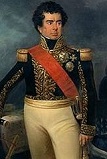
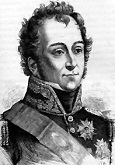
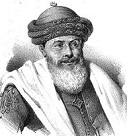


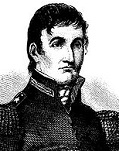






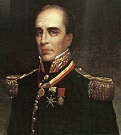




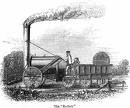













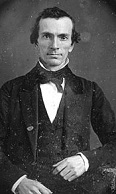
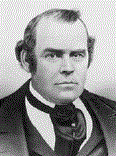

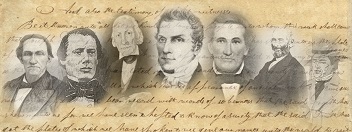




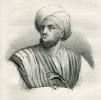


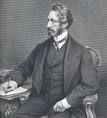














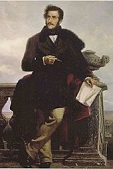




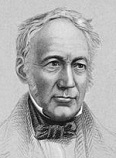
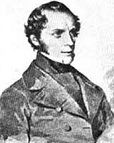
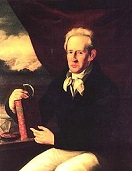






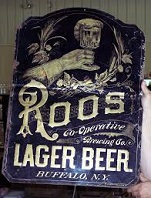
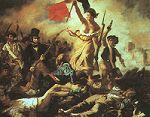

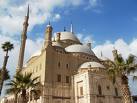
1830 Pop. of Great Britain: 13.9M. The Fifth (5th) U.S. Census reports a total pop. of 12,866,020 (7.4 per sq. mi.); New York City: 197K; this is the decade in which the U.S. passes Britain in pop. There are now 26 steam cars in London; between this year and 1860 1.5M Germans emigrate to the U.S. By this year there are 200 gas plants in Britain. The Revs. of 1830 incl. "Romantic nationalist" revs. in Belgium and Netherlands, more revs. in Poland and Switzerland, and the July Rev. in France. On Jan. 6 Yale-educated middle-of-the-roader (epileptic) Henry Baldwin (1780-1844) of Penn. (who finds slavery morally repugnant but legal) becomes the 21st U.S. Supreme Court justice (until Apr. 21, 1844), giving it eight members again; in 1832 a seizure leaves him a little deranged, and he becomes the first justice to pub. his dissenting opinions, later becoming the lone dissenting vote in the Amistad case. On Jan. 19-27 the Hayne-Webster Debate in the U.S. Senate before Senate pres. John C. Calhoun sees newlywed (2nd marriage) U.S. Sen. (Whig-Mass.) (1827-41) Daniel Webster (1782-1852) triumphantly debate with U.S. Sen. (D-S.C.) (1823-32) Robert Young Hayne (1791-1839) over protectionist tariffs, turning into a debate over the States' Rights doctrine, causing Webster, who takes the anti side to become the Cicero of America and the #1 spokesman for the Union with "the most eloquent speech ever delivered in Congress" on Jan. 26, with the immortal phrases that the U.S. govt was "made for the people, made by the people, and answerable to the people", and "Liberty and Union, now and forever, one and inseparable", which are later copied by Pres. Lincoln in his Nov. 19, 1863 Gettysburg Address; "This government, Sir, is the independent offspring of the popular will. It is not the creature of State legislatures; nay, more, if the whole truth must be told, the people brought it into existence, established it, and have hitherto supported it, for the very purpose, amongst others, of imposing certain salutary restraints on State sovereignties"; "When my eyes shall be turned to behold for the last time the Sun in heaven, may I not see him shining on the broken and dishonored fragments of a once glorious Union; on States dissevered, discordant, belligerent; on a land rent with civil feuds, or drenched, it may be, in fraternal blood! Let their last feeble and lingering glance rather behold the glorious ensign of the republic, now known and honored throughout the Earth, still full high advanced, its arms and trophies streaming in the original lustre, not a stripe erased or polluted, nor a single star obscured, bearing for its motto, no such miserable interrogatory as 'What is all this worth?' nor those words of delusion and folly, 'Liberty first and Union afterward'; but everywhere, spread over all the characters of living light, blazing on all its ample folds, as they float over the sea and over the land, and in every wind under the whole heavens, that other sentiment, dear to every true American heart, - Liberty and Union, now and forever, one and inseparable!" On Feb. 3 the London Protocol of 1830, issued by Britain, France, and Russia negates the Greek Repub. and constitution, and declares Greece an autonomous kingdom under their united protection, setting the N frontier just N of the Gulf of Corinth, pissing-off the Greeks and spawning unrest and protests; meanwhile Prince Leopold of Saxe-Coburg, already in line to become king of Belgium, turns down the throne of such a piss-poor country, and Joannes Capodistrias becomes a dictatorial schmuck, causing his assassination next year. On Mar. 26 The Book of Mormon: An Account Written by the Hand of Mormon upon Plates Taken from the Plates of Nephi is pub. by Egbert Bratt "E.B." Grandin (1806-45) of Palmyra, N.Y., with author, er, translator Joseph Smith Jr. uttering the soundbyte: "I told the brethren that the Book of Mormon was the most correct of any book on earth, and the keystone of our religion, and a man would get nearer to God by abiding by its precepts, than by any other book"; too bad, it riles-up the locals, who organize a boycott, causing Grandin to suspend pub. until Martin Harris (1783-1875) sells his farm for $3K to pay him; in Sept. local freethinker Abner Cole (1783-1835) begins pub. the weekly Palmyra Reflector on Grandin's press, giving him access to the unbound sheets, allowing him to reprint mocking excerpts until Smith threatens him with a copyright lawsuit; in 1999 a first ed. is sold for $58K, and another in 2007 for $180K. On Mar. 26 the The Book of Mormon: An Account Written by the Hand of Mormon upon Plates Taken from the Plates of Nephi by Joseph Smith Jr. is pub. by Egbert Bratt "E.B." Grandin (1806-45) of Palmyra, N.Y.; too bad, it riles-up the locals, who organize a boycott, causing Grandin to suspend pub. until Martin Harris (1783-1875) sells his farm for $3K to pay him; in Sept. local freethinker Abner Cole (1783-1835) begins pub. the weekly Palmyra Reflector on Grandin's press, giving him access to the unbound sheets, allowing him to reprint mocking excerpts until Smith threatens him with a copyright lawsuit; in 1999 a first ed. is sold for $58K, and another in 2007 for $180K. All New Ugly Betty and Gray's Anatomy on French TV? On Apr. 1 La Silhouette pub. a satirical woodcut of reactionary king (since 1824) Charles X (1757-1836), which slips by censors, causing a firestorm of controversy and getting the editor 6 mo. and a 1K franc fine, although the artist Charles Philipon slides by; to get by censors, the mag. begins pub. innocuous prints with loaded political commentary; finally, on July 25 Charles X issues the Fatal Decrees, suspending freedom of the press, leading to the July Monarchy (Rev.) (2nd French Rev.) (Trois Glorieuses) in Paris on July 26-29, which causes him to abdicate within three days and flee for England; on Aug. 2 French dauphin (since 1824) (last) Louis Antoine, Duc d'Angouleme (eldest son of Louis XVI's youngest brother the Comte d'Artois and Princess Marie Therese of Savoy) becomes king Louis XIX (1775-1844) at Rambouillet after Charles X signs his act of abdication, and 20 min. later he signs his own act of abdication (shortest-reigning monarch on record until ?), turning his crown over to the Bourbon line's last hope, Henri of Artois, Duc de Bordeaux, Comte de Chambord (Henri V) (1820-83) (who injured his foot falling from a horse in Austria, causing him to walk with a limp), who lasts until Aug. 9, when the nat. assembly deposes him and he goes into exile with his grandfather Charles X and mother the Duchess of Berry in Venice, beginning long lame negotiations to regain the French throne; oh yes, Marie Therese Charlotte (1778-1851), the first-squirt daughter of Louis XVI and Marie Antoinette became queen of France for 20 min. too; meanwhile Casimir Delavigne and Daniel Auber compose the song La Parisienne, which becomes almost as popular as the Marseillaise, and follow it up with La Varsovienne for the Poles; liberal leader Francois-Rene de Chateaubriand refuses to swear allegiance to Louis-Philippe, ending his political career, causing him to withdraw from public life and begin writing his memoirs, which become his most famous work after his death. We all have internal plumbing, but for some of us it can be a problem? Most of them pesky Injuns is exterminated, and whites are breeding like rabbits, so it's time for a new homegrown American prophet who sanctifies the breeding of white rabbits, with himself as the new Abraham? On Apr. 6 the Church of Jesus Christ of Latter-day Saints (originally the Church of Christ until May 1834, then the Church of the Latter Day Saints until Apr. 26, 1838) is founded in Fayette, N.Y. by six men led by studly white Joseph Smith Jr. (1805-44) (whose portrait bears a striking resemblance to Elvis Presley (1935-77)?) with the pub. of his allegedly lost and refound true history book titled The Book of Mormon, with a preface containing the solemn, foolproof Testimony of the Three Witnesses on June 28, 1829, incl. David Whitmer (1805-88), Martin Harris (1783-1875), and Oliver H.P. (Hervy Pliny?) Cowdery (1806-50) (the first baptized Mormon, who is named the Second Elder, then ordained as Smith's "assistant-president" on Dec. 5, 1834), who each have a separate vision of the angel presenting the gold plates to them on a table (but don't actually see them in real life?), signing a statement that incl. the soundbyte: "And we declare with words of soberness, than an angel of God came down from heaven, and he brought and laid before our eyes, that we beheld and saw the plates, and the engravings thereon; and we know that it is by the grace of God the Father, and our Lord Jesus Christ, that we beheld and bear record that these things are true"; Harris issues a prophecy that "[Andrew] Jackson would be the last president that we would have; and that all persons who did not embrace Mormonism in two years' time would be stricken off the face of the earth", adding that Palmyra, N.Y.. will be the New Jerusalem, with streets paved with gold; the preface also contains the Testimony of the Eight Witnesses that they personally saw and handled Smith's gold pates, incl. four sons of Peter Whitmer Sr. (1773-1854), incl. Christian Whitmer (1798-1835), Jacob Whitmer (1800-56), John Whitmer (1802-78), and Peter Whitmer Jr. (1809-36), and Hiram Page (1800-52), brother-in-law of 5th brother David Whitmer (1805-88) ("I could not feel more satisfied and at rest if the entire Whitmer family had testified" - Mark Twain), and three Smiths, incl. brothers Hyrum Smith (1800-44) and Samuel Harrison Smith (1808-44), and daddy Joseph Smith Sr. (1771-1840), who is baptized on Apr. 6, causing Smith Jr. to utter the soundbyte: "Oh my God, I have lived to see my father baptized into the true church of Jesus Christ"); the statement signed by the Eight Witnesses reads: "Be it known unto all nations, kindreds, tongues, and people, unto whom this work shall come: That Joseph Smith, Jun., the translator of this work, has shewn unto us the plates of which hath been spoken, which have the appearance of gold; and as many of the leaves as the said Smith has translated we did handle with our hands; and we also saw the engravings thereon, all of which has the appearance of ancient work, and of curious workmanship. And this we bear record with words of soberness, that the said Smith has shewn unto us, for we have seen and hefted, and know of a surety that the said Smith has got the plates of which we have spoken. And we give our names unto the world, to witness unto the world that which we have seen. And we lie not, God bearing witness of it"; the entire Whitmer family joins the LDS Church, with their Whitmer Log House in Fayette, where Joseph Smith Jr. and his wife Emma lived for 6 mo. in 1829 becoming the first HQ of the LDS Church; in Aug. Hiram Page is discovered by Joseph Smith Jr. to be using a black seerstone to receive revelations for the LDS Church, claiming to receive details of the org. and location of Zion, pissing-off Smith, who receives a revelation at a church conference in Sept. to send Oliver Cowdery to him to tell him that his revelations are of the devil, getting the conference to vote unanimously that Smith is the church's sole revelator, after which Page burns his revelations and grings the stone to powder; sole revelator Smith announces that the Second Coming of Christ will be near the town of Independence in Jackson County, Mo., which is the land of their inheritance despite others ("your enemies") now holding the land, causing immigrants to begin arriving next year; Mormonism owes everything to the magic gold plates which Smith allegedly dug up, translated, then decided to give back before anybody (except 11) can see them, detailing how the ancient Jews under Nephi (who is white?) sailed to America and brought the Old Testament with them, after which they were visited by Ivory-Soap-white Jesus Christ before the sinful and unbelieving Indians crushed them and reverted to devil worship, getting turned dark (red) as a judgment from God, and all in 15 books with uncool lame names such as Nephi, Enos, Jarom, Omni, Mosiah, Alma, Helaman, Mormon, Ether and Moroni, full of lame stale King James style language, replete with mistakes in the correct usage of thee, thou, thine, etc.? - all without knowing a word of Hebrew or Aramaic, nyuk nyuk? On Apr. 7 Capt. Joseph White (b. 1748) is found murdered in his home in Salem, Mass., and when nobody can solve it, Daniel Webster (after returning from the Senate, which adjourns its first session on May 31) takes it on, and in Aug. secures the conviction of Frank Knapp, followed in Nov. by his brother Joe Knapp, who did it for the old fart's inheritance. On Apr. 13 Pres. Andrew Jackson gives a toast at the annual Thomas Jefferson birthday dinner, opposing the nullifiers of S.C., with the soundbyte: "Our Federal Union, it must be preserved." On Apr. 17 conservative Gen. Joaquin Prieto defeats liberal gen. Freire at the Battle of Lircay, ending the Chilean Civil War of 1828, causing the nat. congress to confirm Prieto as pres. next Sept. 18 (until Sept. 18, 1841), with Diego Portales as vice-pres. He freed a lot of people but the good die young? A little unstable around the middle are we? On Apr. 27 Simon Bolivar (b. 1783) relinquishes power after failing to pacify the separatist factions, then dies on Dec. 17 after liberating six countries and seeing his rule challenged all over Greater (Grand) Colombia; on May 6 Venezuela dissolves Greater Colombia, secedes, and sets up a repub. under dictator gen. Jose Antonio Paez Herrera (1790-1873), who has himself elected pres. (until 1846), and whose govt. slides into decades of revolt, dictatorship, and corruption; Ecuador follows suit and declares independence from Spain with British backing, proclaiming a new 1830 Ecuadorian Constitution giving the vote only to men with education and property, and declaring all Indios wardens of the Roman Catholic clergy; Ecuador goes on to have 48 presidentes and 18 constitutions during its first 131 years as a repub.; poor widowed Colombia suffers an economic collapse, causing a military coup in May led by gen. Rafael Jose Urdaneta y Faria (1788-1845), whho becomes pres. #4 of Gran Colombia on Sept. 5 (until Apr. 30, 1831). On May 3 Sir Robert Peel, 1st Baronet (b. 1750) dies, and his son Sir Robert Peel, 2nd Baronet (b. 1788) takes his seat as MP for the family borough of Tamworth. White is right, so you have to move left, or, You're all just nothing, just nothing? On May 28 after efforts are led by U.S. Sen. (Whig-Tenn.) (1825-40) Hugh Lawson White (1773-1840) to pass it, Pres. Andrew Jackson signs the U.S. Indian Removal Act, requiring all native tribes (esp. the Cherokee) to relocate to the "Great American Desert" W of the Mississippi River, appropriating $500K for the purpose; in the summer Pres. Jackson gives the Chickasaw, Cherokee, Choctaw, and Creek tribes a Great White Ultimatum to move to territories across the Mississippi; on Sept. 27 the Treaty of Dancing Rabbit Creek is signed by U.S. rep John R. Coffee (1772-1883) (lifelong friend of Andrew Jackson) and the Choctaw tribe, led by mixed-race (French father) head chief (since Mar. 15) Greenwood LeFlore (Le Fleur) (1800-65), becoming the first removal treaty under the Indian Removal Act, ceding 11M acres E of the Mississippi River to the future state of Miss. in exchange for 15M acres of Indian territory in the future state of Okla., allowing white settlement of the Yazoo River Valley and the founding of the town of Greenwood, Miss. 96 mi. N of Jackson, Miss. and 130 mi. S of Memphis, Tenn.; Choctaw chief Nitikechi calls their 1831 removal a "trail of tears and death"; by 1835 94 removal treaties are negotiated, most under duress, and Jackson announces success. On June 1-9 Joseph Smith Jr. drafts the Articles and Covenants of the Church of Christ in Fayette, N.Y., calling himself and Oliver Cowdery "apostles of Jesus Christ" and "elders of this church", also mentioning the new office of deacon; on June 9 Smith presides over the church's first gen. conference, and performs his first miracle, the exorcism of Newel Knight (1800-47), who later becomes one of the church's first branch presidents; on June 30-July 1 after Martin Harris goes around Palmyra bragging about it, Smith is tried in Colesville, N.Y. for it, and for scrying, but is acquitted, causing a mob to chase them out of Colesville toward Harmony on July 6. On June 12 after stealing excerpts of "Jo Smith's Gold Bible" from the E.B. Grandin Press and pub. them in Jan., the Palmyra Reflector pub. The Book of Pukei by freethinker Abner Cole (1783-1835) (under the alias Obadiah Dogberry Esq.) satiring the Book of Mormon, dissing the treasure-digging activities of Smith and Walters the Magician (Luman Walters), who allegedly carries a Latin trans. of Cicero's Orations and claims it is a record of the Native Ams. and hidden treasure; "The Magician led the rabble unto a dark grove, in a place called Manchester, where after drawing a Magic circle, with a rusty sword, and collecting his motley crew of latter-demallions, within the centre, he sacrificed a Cock (a bird sacred to Minerva) for the purpose of propiciating the prince of spirits"; when they realize he's a fraud, he "took his book, and his rusty sword, and his magic stone, and his stuffed Toad, and all his implements of witchcraft and retired to the mountains near Great Sodus Bay", after which "It came to pass, that when the mantle of Walters the Magician had fallen upon Joseph, sirnamed the prophet, who was the son of Joseph", "I looked, and behold a little old man stood before me, clad, as I supposed, in Egyptian raiment, except his Indian blanket, and moccasins — his beard of silver white, hung far below his knees. On his head was an old fashioned military half cocked hat, such as was worn in the days of the patriarch Moses - his speech was sweeter than molasses, and his words were the reformed Egyptian", telling Joseph that "thou art chosen to interpret the book, which Mormon has written, to wit, the gold Bible", promising to give him a breast plate and "an assistant, even Oliver, the pedagogue." On June 14 after a French armada of 600 ships under Adm. Guy-Victor Duperre (Duperré) (1775-1846) arrives, the French Conquest of Algeria begins when a a force of 34K soldiers under Gen. Louis-Auguste-Victor, Count de Ghaisnes de Bourmont (1773-1846) begins the Invasion of Algiers, landing at Sidi Ferruch (Fredj) 17 mi. W of Algiers, which is met by 19K Ottoman troops, 7K Turkish Janissaries, and 17K Berber Kabyles, who are defeated on June 19 at the Battle of Staoueli (Staouéli); on July 5 the French conquer and occupy the N African city of Algiers, causing Ottoman dey #29 of Algiers (since Mar. 1818) Hussein (Husayn) Dey (1765-1838) to go into exile in Naples, Italy in the French ship Jeanne d'Arc with his family and his personal wealth and harem intact, and the Janissaries to flee to Turkey, ending 313 years of Ottoman rule (since 1671), ending the threat of the Barbary pirates and the perfidy of the Brits who pay them tribute and encourage them to prey on French ships?; too bad, the French loot Algiers of 50M francs of assets while arresting and killing Algerians for arbitrary reasons, turning the Algerian people against them permanently; after the July Rev. Gen. de Bourmont refuses to swear allegiance to Louis Philippe and is sacked from the army; the French Foreign Legion (Legion Etrangere) is founded to help police French colonial possessions in North Africa, esp. Algeria; a person from any nation except France can join and keep their identity secret while serving under French officers; it is disbanded in 1940-5 after they end up being stationed in Calvi, Corsica, and Marseille. On June 26 demented, overstuffed, overindulged king (since Jan. 29, 1820) George IV (b. 1762) dies of a stomach hemorrhage, and his 65-y.-o. brother (3rd son of George III) William IV (1765-1837) ("the Sailor King") is crowned (54th British monarch) (until June 20, 1837); in June a Speech by the Duke of Wellington in Parliament signals that the Tories are not amenable to a reform of the electoral system. On July 26-29 the July Rev. (2nd French Rev) (Trois Glorieuses) in Paris overthrows Bourbon monarch Charles X; on Aug. 9 everybody-get-down Louis Philippe I, Duke of Orleans (1773-1850) (son of Louis Philippe Joseph, duke of Orleans, who was executed in 1793 during the Terror) becomes the "Citizen King" of France (until Feb. 24, 1848) with the support of the Marquis de Lafayette and the chamber of deputies, which proclaims him "king of the French, by the grace of God and the will of the people"; power changes hands from the Bourbon to the Orleans family, and the title of dauphin (begun in 1349) is discontinued; a classic Lord Acton case study, he starts out slow and seemingly incorruptible, holding open court in his family residence of Palais Royal in Paris, but soon becomes the only man in his world as he raises the bar and consolidates his power; meanwhile Charles Philipon, back in biz, founds La Caricature, working with Honore Daumer et al., taking Louis-Philippe on next, portraying his face in the shape of a pear, which catches on. Ahhh, me-time? On Aug. 25 after French tenor Adolphe Nourrit (1802-39) sings the leading role in Daniel Auber's 1828 grand opera La Muette de Portici (The Mute Girl of Portici) (AKA Masianello) at the Theatre de La Monnaie in Brussels, which incl. the new Marseillaise-like anthem Amour Sacre de la Patrie (Sacred Love of the Fatherland), a riot begins, launching the Belgian Rev. of 1830 (ends Aug. 12, 1831) against the Dutch, with workers rioting and attacking the homes of govt. officials, escalating into civil war; on Sept. 23 (a.m.) 6K Dutch troops under Prince Frederick march into Brussels and are surprised by a fusillade of fire; on Sept. 26 after they fail to retake Brussels in bloody street fighting, the liberal bourgeoisie establish a provisional govt. under Charles Latour Rogier (1800-85); on Oct. 4 Roman Catholic Belgium declares independence from Protestant Netherlands, rejecting the artificial union forced on them by the 1815 Congress of Vienna, pissing-off the Dutch, who on Oct. 27 bombard Antwerp, causing British PM Wellington, one of the statesmen responsible for the union to call the London Conference of reps. from Britain, France, Prussia, Austria, and Russia, which arranges an armistice; on Nov. 10 the Belgian nat. congress proclaims a constitutional monarchy and deposes William I, and on Dec. 20 the London Conference recognizes Belgian independence, with the independent duchy of Brabant divided into the Dutch province of Northern Brabant (mainly Flemings) and the Belgian province of Antwerp and Brabant; the nat. congress asks the duke of Nemours (son of Louis-Philippe) to be their first king, but it doesn't work out, and they end up asking Prince Leopold of Saxe-Coburg; meanwhile, seeing a new buffer between the Huns of C Europe and the good guys, new British foreign minister Lord Palmerston sides with France against Russia, Austria, and Prussia on Belgium's side at the London Conference, and war looms; the borders of the province of Liege (Liège) are a copy of the entire country's borders? On Aug. 28 Tom Thumb, built by Peter Cooper (1791-1883), the first U.S.-built steam locomotive to operate on a common-carrier railroad goes on a trial run between Baltimore, Md. and Ellicott Mills, and loses a race with a horse-drawn railroad carriage; 2-story Mount Clare Station, the first railroad station in the U.S. is built for it in Baltimore. The first Iron Horses pull open-air cars though tunnels excavated through solid rock? On Sept. 15 spurred by the need to transport cotton, the Liverpool and Manchester Railway (the first British railway to link two populous towns) is officially opened after eight years of planning and construction to a crowd of 500K-1M at both terminals and along the track; Tory PM Duke of Wellington presides over the ceremonies marking what the press calls a "great national undertaking", financed in 1828 with £100K of public funds; inventor George Stephenson (1781-1848) engineers the lead train, Northumbrian, followed by seven others: Phoenix, North Star, Rocket, Dart, Comet, Arrow and Meteor; the trains reach a thrilling speed of 24 mph; liberal Tory MP William Huskisson (b. 1770) is killed by the Rocket after his train Northumbrian stops for water, and he ignores instructions to stay in his carriage, leaving to speak with the Duke of Wellington and is struck, mangling a leg and dying of blood loss, becoming the first railway accident victim. On Sept. 26 after Joseph Smith Jr. receives revelations giving him exclusive authority to receive revelations for the LDS Church and to issue commandments to the church on any subject ("all things unto God are spiritual"), the Second LDS Church Conference is held, and in Oct. the first Mormon Lamanite Mission is sent to preach to the devil-plagued Lamanites (Native Ams.), consisting of Oliver Cowdery and John Whitmer, who convert 130 within three weeks; while passing through Kirtland, Ohio, they convert former Campbellite minister Sidney Rigdon (1793-1876) and 20 members of his Disciples of Christ congregation, followed by hundreds more in the Western Reserve area of Ohio, more than doubling the LDS movement's size, after which Cowdery heads W of the Mississippi River and Rigdon heads to Fayette, N.Y.; meanwhile in Oct. Burlington, N.Y.-born Disciples of Christ minister Parley Parker Pratt Sr. (1807-57), who was converted by reading the Book of Mormon, and was baptized on Sept. 1 by Oliver Cowdery in Seneca Lake then baptizes his brother Orson Pratt Sr. (1811-81) on Sept. 19 arrives in Fayette, N.Y. and meets Joseph Smith Jr., getting permission to join the mission; after being converted by Pratt, converting Sidney Rigdon (1793-1876) and 130 members of his congregation within three weeks, after which Rigdon arrives in Fayette in Dec., and Smith compares him to John the Baptist and makes him his new scribe, dictating the lost Prophecy of Enoch before receiving a revelation in late Dec. that the church HQ must be moved to Kirtland to await Cowdery's return; Pratt goes on to become one of the first members of the Quorum of the Twelve Apostles in 1835, becoming known as "the Apostle Paul of Mormonism" for his leadership of the Quorum's successful mission to Great Britain in 1839-41; after being murdered in Alma, Ark. ("Spinach Capital of the World") on May 13, 1857 by the estranged husband of his 12th wife, he leaves 30 children, which multiply to 30K-50K by 2011, becoming the great-great-grandfather of Mitt Romney and great-great-great-grandfather of Utah Gov. Jon Huntsman Jr; thus the Latter Day Saint Movement is founded; Mormo is a name for the god of the living dead, and "Mormon" means gates of hell in Chinese?; the new cult of Moronism, er, Moroniism, er, Mormonism soon riles up the other Bible-thumping Christian sects with its promotion of a new black-bound ersatz Bible copyrighted by them, and its claim that its people are the true saints and their org. the true Church; even worse, the doctrine that Jehovah was once a white man and worked his way up to Creator, and that this evolutionary process can be followed by true believers (white males only), who get to become gods complete with their own planets, with their descendants becoming angels (white, of course), which therefore makes it not only okay but holy for future Jehovahs to marry and bed as many hot white babes as possible and keep them barefoot and pregnant, with manly Elvis J. Smith leading the way with a flock of wives; "What man is God once was; what God is man may become"; the white supremacist racism jumps out in several places, e.g.: "And behold they were as white as the countenance and also the garments of Jesus; and behold the whiteness thereof did exceed all the whiteness, yea, even there could be nothing upon earth so white as the whiteness thereof" (3 Nephi 19:25); "O my brethren, I fear that unless ye shall repent of your sins that their skins will be whiter than yours, when ye shall be brought with them before the throne of God" (Jacob 3:8); maybe it only means white as in pure of heart, duh?; "And he had caused the cursing to come upon them, yea, even a sore cursing, because of their iniquity. For behold, they had hardened their hearts against him, that they had become like unto a flint; wherefore, as they were white, and exceedingly fair and delightsome, that they might not be enticing unto my people the Lord God did cause a skin of blackness to come upon them. And thus said the Lord God: I will cause that they shall be loathsome unto thy people, save they shall repent of their iniquities. And cursed shall be the seed of him that mixeth with their seed; for they all be cursed even with the same cursing... And because of their cursing which was upon them, they did become an idle people, full of mischief and subtlety" (2 Nephi 5:21-24) - a lame attempt at giving divine sanction to white supremacy so that the de-redskinned North Am. continent can be populated by white rabbits, while reconciling the growing gaps between the Bible and Science, trying to cover-up for the the Bible's lack of awareness of the existence of America, and explain the disturbing question of how, if Jesus wanted his gospel to be spread to all nations before he returns, all them red people got saved or deserved to get damned before greedy cross-toting whitey finally stumbled in with paintings of a white Christ in 1492, and even worse, the wrong brand of Christ, the Roman Catholic one, hurry on in now and fill up the vacuum? The real authors of the Book of Mormon are Solomon Spalding (1761-1816), whose unpublished work was taken over and modified by 37-y.-o. history and Bible expert Sidney Rigdon (1793-1876) and perhaps 24-y.-o. schoolteacher Oliver Cowdery (1806-50), with poorly educated but charismatic 25-y.-o. Smith set up as a dummy corporation to launder it as an ancient document dug up on never-seen gold plates?; he really started with a polished ms. first, developed by others who lurked in the background, then pretended to discover the plates and translate them second to launder the authorship while leaving him in control as The Man? He would hide one page at the bottom of his hat along with some metal plates and a fluorescent rock, then take his magic stone and insert it so everybody can see, then duck his head in and peep at the ms. and read it one line at a time until the page was exhausted, then call it quits for the day? In Sept. after the U.S. Navy makes plans to scrap the 44-gun War of 1812 frigate USS Constitution (Old Ironsides) (launched 1797), the Boston Daily Advertiser pub. an editorial calling for it to be saved, after which Oliver Wendell Holmes Sr. pub. the poem Old Ironsides on Sept. 16, causing them to change their minds; it becomes the oldest commissioned ship on Earth still afloat until ?. On Oct. 28 after saving $350 to purchase his freedom and then being told the price had increased to $1K, black slave Rev. Josiah Henson (1789-1883) escapes with his wife and four children from slaveowner "Mr. Amos R." in Daviess County, Ky., rowing aross the Niagara River from Buffalo to Canada, then to the underground railroad mecca of Kent County, Ontario; in 1833 when Canada officially abolishes slavery he settles S of the Sydenham River near Dresden, Ont., and establishes the 200-acre British-Am. Inst. for escaped slaves in 1841; Harriet Beecher Stowe (1811-96) reads The Life of Josiah Henson, Formerly a Slave, Now an Inhabitant of Canada, Narrated by Himself, pub. by the Anti-Slavery Society of Boston, Mass. in 1849, invites Henson to her home in Andover, Mass., and uses him as the basis of her 1852 world-shaking bestseller Uncle Tom's Cabin; or, Life Among the Lonely, which takes on the horrible wave of hate afflicting black-skin-hating whites that turns them into devils. On Oct. 31 (Oct. 18 Old Style) Peter I (b. 1748) dies, and his 17-y.-o. nephew Rade Petrovic becomes Peter II Petrovic-Njegos (1813-51), bishop-prince of Montenegro, the last of the Vladikas Dynasty, getting Peter I canonised as a saint, then going on to unite the seven clans and two hill tribes, oust the Venetian-appointed gov. Vukolaj Radonjic, centralize the govt., institute a senate, abolish blood feuds, open schools, and become known as a great poet on the side; in 1833 he introduces the country's first taxes - like trying to make hillbillies pay whiskey taxes? On Nov. 6 the Republica Oriental del Uruguay is founded, with Montevideo (founded 1726) as capital, and Gen. Jose Fructuoso Rivera y Toscana (1784-1854) as pres. #1 (until Oct. 24, 1834); two parties take turns running the country (into the ground?), the right-wing conservative Partido Nacional (Blancos) (Whites), and the moderate libeal Partido Colorado (Colorados) (Reds); Colorado Rivera is a brilliant military leader but proves an inept political one? On Nov. 8 Francis I (b. 1777) dies, and his son Ferdinand II (1810-59) becomes Bourbon king #4 of the Two Sicilies (until May 22, 1859), going on to try to play both sides by working for reform while remaining attached to the ideals of enlightened despotism; too bad, the romance doesn't last. On Nov. 15 the Duke of Wellington's govt. is defeated in a vote in the House of Commons, and William IV asks Whig leader Charles Grey, 2nd Earl Grey (Viscount Horwick) (1764-1845) to form a new govt., and on Nov 22 he becomes British PM (until July 9, 1834), ending 60 years of Tory control of the Commons, allegedly receiving a gift of Earl Grey Tea from a Chinese mandarin, containing the key ingredient of oil of bergamot (cross between pear lemon and Seville orange); John Charles Spencer, 3rd Earl Spencer (AKA Viscount Althorp) (1782-1845), known for working to improve bankruptcy laws becomes Whig leader of the Commons; the Tories split into the Ultras and the Conservatives (really moderates), the latter group headed (although he refuses to be its leader) by Sir Robert Peel, and using the name conservative to mean that they will consider reforms but still want to conserve all that they believe is best in society; Lord Palmerston becomes foreign minister (until 1841); the magnificent dandies centered around George IV become unfashionable, go bankrupt and flee to Paris to write their memoirs; Scottish MP Henry Peter Brougham is raised to 1st Baron Brougham, and made lord chancellor on Nov. 22 (until Nov. 1834), going on to sponsor abolitionist legislation. On Nov. 22 Snell's Kusnacht Memorial, a liberal constitution is accepted at a public meeting in Zurich, Switzerland, establishing an electoral system giving the countryside two-thirds of the votes and the city one-third. On Nov. 29 the Poles in Warsaw begin the November Uprising (Cadet Rev.) against partition and Russian rule (ends Oct. 21, 1831). On Nov. 30 Pope (since 1829) Pius VIII (b. 1761) dies. On Dec. 4 Jose Maria Conejo becomes pres. of El Salvador again (until Apr. 3, 1832). On Dec. 7 Pres. Andrew Jackson delivers his Second Annual Message to Congress, arguing his right to use the veto at will. On Dec. 7 the first issue of the pro-Jackson Washington Globe, ed. by by Francis Preston Blair Sr. (1791-1876) carries advertisements and is sold by subscription. On Dec. 10 the Deep Freeze of 1830-1 hits NE U.S., incl. Boston, Mass.; "God save the poor" writes Emerson. On Dec. 16 after being hired by former Lexington, Ky. horse trainer Denton Offutt to work at his gen. store in New Salem, Ill., 21-y.-o. Abraham Lincoln helps set the value of a stray mare, and walks several mi. to return change to a customer he overcharged, earning the nickname "Honest Abe" - as the pressure builds, who will remain in the fight for the title, and whose dream will come to an end? Mexican vice-pres. Gen. Bust A Move, er, Anastasio Bustamante (1780-1853) leads a revolt against pres. Mexican pres. Vicente Guerrero, and has him executed, becoming pres. (until 1833). U.S. pres. Andrew Jackson authorizes $100M for public engineering projects incl. roads, railroads and canals for the opening up of the Am. West. The Tithe War (ends 1833) erupts in Ireland over the paying of tithes by Roman Catholics to support the Protestant Anglican Church, with cruelties practised on both sides. Limping silk stocking man Charles Maurice de Talleyrand (1754-1838) becomes Louis Philippe's ambassador in London. Francisco Morazan becomes pres. of the Central Am. Confederation (until 1840). The civil war in Chile causes itinerant commissions of justice to be created to deal with rural banditry (until 1832). Mysore in India becomes a British possession. Ottoman Sultan (1808-39) Mahmud II proclaims Serbia an autonomous vassal state, with Prince (since Nov. 6, 1817) Milos Obrenovic I as hereditary supreme chief; a metropolitanate of Belgrade is established, independent of the patriarch of Constantinople; it takes until 1878 to achieve full independence. Am. Protestants begin setting up Christian missionary schools in the Ottoman Empire, stepping up activity in 1870 and reaching 430 schools in 1914 with 23.5K students; meanwhile the French set up even more schools, with 90K students by 1914 - Muhammad rolls over in his grave? Bog iron deposits are discovered on the St. Joseph River in Mishawaka, Ind., causing the town of St. Joseph Iron Works to be founded next year, which is merged with Indiana City and two other small towns in 1833. Banker-economist Thomas Attwood (1783-1856) founds the Birmingham Political Union to lobby for direct representation in parliament for it and other large towns; after getting the 1832 Reform Act passed in Mar. 1831, he becomes an MP on Dec. 12, 1832 (until 1839). Lit. critic Francis Jeffrey resigns from the Edinburgh Review to become lord advocate, and in 1834 is created Lord Jeffrey and appointed judge of the Court of Session. Harvard grad. Lemuel Shaw (1781-1861) becomes chief justice of the Mass. Supreme Court, going on to write 2K+ majority opinions and settle whole areas of U.S. law; Oliver Wendell Holmes calls him "the greatest magistrate which this country has produced." A law is passed by Ga. requiring whites squatting in Cherokee territory to obtain a license from them first; two New England missionaries refuse and are sentenced to four years hard labor, causing them to appeal to the U.S. Supreme Court. The Waco (Huaco) (Hueco) tribe of Caddoan Indians (located near modern-day Waco, Tex.) are almost wiped out by the wacked-out Cherokees, and the remainder end up in a rez in 1855. Ibadan in Nigeria ("town at the junction of the savannah and the forest") is founded as a military camp (modern pop. 1.7M). The town of Oxford, Miss. is founded, named so as to convince the legislature to make it the home of the U. of Miss. AKA Ole Miss, which it does in 1848; it later becomes William Faulkner's adopted hometown. The pop. of Gibraltar receives a charter of justice assuring civil liberty. The problem of too many gringos flocking into Texas prompts the Mexican govt. to forbid further immigration and move troops to the frontier in a vain attempt to stop the flow of illegal aliens - they should know? After calling W N.Y. the "burned-over district" because of all the revivals, Charles G. Finney preaches in Rochester, N.Y. for 6 mo., ushering in the Great Revival of 1831-2. In summer the first great Rendezvous for mountain men fur traders is held in the summer in Riverton, Wyo. at the confluence of the Big and Little Wind Rivers; in summer 1832 the Rendezvous at Pierre's Hole is held at the W foot of the Teton Mts. in Teton County, Idaho. Warren, Mich. near Detroit is founded as Beeb's Corners, a carriage stop between Detroit, Mich. and Utica, N.Y., becoming home to Big Boy Restaurants and the Cadillac Div. of GM. About this time the word "Hoosier" is first used to refer to inhabitants of Indiana. By this year English thinkers and statesmen begin to lose faith in Britain's imperial mission, and regard the colonies as a burden that should be gotten rid of ASAP, while promoting their welfare until they can assume independence (as long as they do their part to prop up the British empire economically); Edward Gibbon Wakefield (1796-1862) founds a society to promote systematic colonization via emigration of free white colonists to S Australia and New Zealand. The Taj Mahal is sold to a British merchant, who buys wrecking machinery, intending to dismantle and ship it stone by stone to England, but finds it too expensive? The U.S. Postal Service is the country's largest employer, with one post office per 1.5K Americans - the assault rifle still hasn't been invented? Former U.S. pres. J.Q. Adams is elected to the U.S. House of Reps. from Mass. The Royal Geographic Society is founded in London, England. The Museum of Science is founded in Boston, Mass. British (Cornish) explorer Richard Lemon Lander (1804-34) and his brother John explore the Niger River down to the Gulf of Guinea, becoming the first Euros to canoe down the river to its delta - the original meadowlark lemon and the harlem globetrotters? The French Order of St. Michael (founded 1469) is disbanded. Scottish Presbyterian minister Edward Irving (1792-1834), whose Chalcedonian Chapel in London (with 1st cent. Christian doctrines mixed with Roman Catholic rites) has 1K+ members begins preaching that Christ will return in two phases, the first one being a secret rapture before the Antichrist comes, getting accused of heresy in 1833 and forming his Irvingites sect (Holy Catholic and Apostolic Church) before dying prematurely in 1834; his ideas gain a following in the U.S. and England, incl. later the Jehovah's Witnesses. Chile begins exporting nitrates, going from 300 tons this year to 1.5M tons in 1900. The British govt. passes the Beerhouse Act of 1830, allowing small householders to open beershops after paying two guineas for a license, causing hundreds of new cheap brewhouses and breweries to spring up, and the avg. yearly beer consumption to increase from 426M gal. in 1829 to 526M in 1830, causing King William IV to become "the most popular monarch among pub names"; London (pop. 2M) has 12 major porter breweries, providing 85% of the beer consumed in the city, while pale ales esp. from Burton begin gaining in popularity, passing them up by the 1850s; by 1841 45.5K new licenses have been issued; the act is repealed in 1993. The super-rich Rothschild family invests big bucks into a brewery for bottom-fermented beer in Cologne, Germany; too bad, lack of refrigeration causes the brewery to fail, and it is converted to a sugar factory. The weekly newspaper The Barnstable Patriot is founded in Barnstable, Mass., going on to bill itself as "an independent voice since 1830". Early in this decade the Bowery Boys, a loose gang of anti-Irish anti-Roman Catholic nativists based in the Bowery (Five Points) neighborhood of Manhattan, N.Y. (known for wearing stovepipe hats, red shirts, and dark trousers tucked into their boots as homage to volunteer firemen) fights the tide of Irish immigrants, incl. the Dead Rabbits, fighting 200+ battles in 1934-44, incl. the Dead Rabbits Riot of July 4-5, 1857, culminating in an all-out street war during the New York City Draft Riots of July 13-16, 1863, as portrayed in the 2002 Martin Scorsese film "The Gangs of New York". The Ulster Gaelic Society is founded in Northern Ireland, launching the Gaelic Revival. About this time a London merchant receives a letter from a firm in Hawick in SE Scotland offering to sell "tweels", and he misreads it and thinks it's the trade name for cloth from the Tweed River, causing the name "tweed" to be coined. In this decade ladies' fashions in Europe and America get more risque, with shorter skirts, huge sleves, and large hats ornamented with flowers and ribbons; men begin wearing stiff collars. In this decade the U.S. Army builds Ft. Myers in SW Fla. as a base of operations against the pesky Seminoles. In this decade and next New England minister Sylvester Graham (1794-1851), father of the Graham cracker pub. a journal in Boston campaigning against tea, coffee, tobacco, booze, meat, sex, women's corsets, and feather beds, gaining thousands of followers; ironically, Graham crackers are bad for diabetics? Danish ballet master and choreographer August Bournonville (1805-79), son of French ballet master Antoine Bournonville takes over the Royal Danish Ballet. Tours-born Honore (Honoré) de Balzac (1799-1850), known for drinking up to 50 cups of coffee a day for inspiration begins La Comedie (Comédie) Humaine, a plan to write approx. 40 novels with a common theme, pioneering realism, ending up with 91 finished works incl. novels, stories, and essays, and 46 unfinished works. Besancon-born Victor Marie Hugo (1802-85), known for writing in the nude so he can't be tempted to leave home bursts on the French scene with a spectacular output of novels, plays and poetry in his own anti-classical Romantic style, which makes him the #1 guy for three gens. of Frogs. In this decade white blackface comedian Thomas Dartmouth "Daddy" Rice (1808-60) of New York City becomes popular playing Jim Crow and singing the 1828 song Jump, Jim Crow, by Sigmund Romberg, with lyrics by Rida Johnson Young, with the lyrics "Weel about and turn about and do jis so,/ Eb'ry time I weel about I jump Jim Crow", later giving its name to Southern segregation laws. The periodical Godey's Lady's Book is founded in Philadelphia, Penn. (until 1898), becoming the first U.S. women's mag., limited to fashion and etiquette. The Nazarene Brotherhood (founded 1810) is disbanded. English atomic theory man John Dalton becomes one of the eight foreign associates of the French Academy of Sciences, receiving a British govt. pension in 1833. Jacob Roos (-1867) founds the first (2nd or 3rd?) brewery in Buffalo, N.Y.; in 1867 it is taken over by his son George Roos, reaching 20,750 barrels/year in 1888; in 1893 it is acquired by Leonard Burgwerger, who renames it the Iroquois Brewing Co., surviving Prohibition and producing 50K barrels/year in 1952; in Mar. 1955 it merges with Frankenmuth Brewing Co. to form Internat. Breweries Co., with distribution in eight U.S. states incl. Ohio, Mich., and Fla.; it closes in 1971. Architecture: The Glyptothek (Gr. "glyphein" = "to carve" sculpture gallery in Munich, Germany (begun 1816), the earliest special museum bldg., designed by Leo von Klenze (1784-1864) is finished, housing the ancient Greek and Roman sculptures of Bavarian king Ludwig I. The Ottoman-style Great (Alabaster) Mosque of Mohammed Ali in Cairo, built by Mohammed Ali Pasha (Mehmet Ali) is begun (finished 1848). George Stephenson's Canterbury and Whitstable Railway Line in Kent, England opens (until 1953). The carriage road across St. Gotthard's Pass in Switzerland (begun 1820) is finished. Inventions: The first Lawnmower is invented by Edwin Beard Budding of England; it is imported to the U.S. in 1855. English adm. ("the Sea Wolf") Thomas Cochrane, 10th Earl of Dundonald (1775-1860) develops Compressed Air for use in engines - he should think of using it in diving? English optician Joseph Jackson Lister (1786-1869) develops an achromatic lens for microscopes, getting rid of the colored halos surrounding objects and making them effective for the first time, even though it takes decades before skeptics accept microscope evidence as scientific proof. James Perry of England receives a patent for a machine-made steel point pen with a center hole at the top of a central slit plus additional slits on each side; next year William Joseph Gillott stamps the nibs from sheets of rolled medal. Poor French Parisian chemistry student Marc Charles Sauria (1812-95) invents the phosphorus-based Friction Match after changing the sulfur-reeking antimony sulfide of British chemist John Walker with white phosphorus, and the latter patents it for him and puts it into production; by the time of his death 3M of his matches are produced worldwide; too bad, the 1906 Internat. Berne Convention outlaws white phosphorus in 1906 - the Saurian conspiracy? Augustus Siebe (1788-1872) of Germany invents the first Closed Diving Suit, made of rubberized fabric. French tailor Barthelemy (Barthélemy) Thimonnier (1793-1857) patents the first practical Sewing Machine on July 17, using a hook-tipped needle and foot treadle, and receives a contract from the French army to make uniforms; too bad, local tailors fearing for their livelihood burn his plant down and put him out of biz. In this decade Glasgow-born Scottish chemist Andres Ure (1778-1857) invents the bi-metallic Thermostat (Gr. "thermos" + "statos" = hot + stationary). The first Plimsoll (Plimsole) Shoes with canvas upper and rubber sole are sold as beachwear by the Liverpool Rubber (later called Dunlop) Co.; they are called sand shoes until the 1870s; named after the marking between the shoe and sole which resembles the Plimsoll line on a ship's hull marking the legal loading limit. The first elevators are used in factories. Skis are introduced to the U.S. by Scandinavian immigrants to the midwest. Science: Scottish botanist Robert Brown (1773-1858) discovers the cell nucleus in plants, along with Brownian Motion. French naturalists Georges Cuvier (1769-1832) and E. Gouvion Saint-Hillaire discuss the latter's theory of unity of plan in organic composition - which would be better, an oak or an oat? German botanist Johann Friedrich Christian Hessel (1796-1872) proves that crystals can have 37 different kinds of symmetry. French mathematician Adrien-Marie Legendre roves Fermat's Last Theorem for the exponent n=5. German industrialist-scientist Baron Karl von Reichenbach (1788-1869), who founded the first modern metallurical co. in the Black Forest region of S Germany in the 1820s, and runs his own Frankeinstein lab at Reisenberg Castle discovers paraffin, and begins distilling coal and wood tar to see what else he can come up with - mwuhahaha? French chemist Pierre-Jean Robiquet determines the chemical structure of amygdalin (from apricot pits). Swedish chemist Nils Gabriel Sefström (1787-1845) discovers the element Vanadium (#23) (V); in 1801 Spanish-Mexican mineralogist Andres Manuel del Rio Fernandez (1764-1849) (Andrés Manuel del Río Fernández) discovered it and called it erythronium; in ? Friedrich Wohler proves that it is the same as vanadium. Music: Daniel Auber (1782-1871), Fra Diavolo (opera) (Opera-Comique, Paris) (Jan. 28); libretto by Eugene Scribe; based on the life of early 19th cent. Naples bandit Michele Pezza; his biggest hit. Vincenzo Bellini (1801-35), I Capuleti ed i Montechhi (The Capulets and the Montagues) (opera) (Mar. 11) (La Fenice, Venice). Gaetano Donizetti (1797-1848), Anna Bolena (Dec. 26) (Teatro Carcano, Milan); libretto by Felice Romani; about Henry VIII's 2nd wife Anne Boleyn; first of four operas about the English Tudors; his first internat. hit, performed throughout Europe. Jacques Fromental Halevy, Attendre et Courir (opera); La Langue Musicale (opera); Manon Lescaut (ballet). Sarah Josepha Hale (1788-1879), Mary Had a Little Lamb in Philadelphia on Jan. 23; written for Mary Elizabeth Tyler (1806-89) of Sterling, Mass., who had the big experience around 1815; the poem, an authentication letter and a piece of wool from the famed lamb are put up for auction by Sotheby Parke Bernet in New York City in Jan. 1975, but there are no takers? Heinrich Marschner (1795-1861), Des Falkners Braut, Op. 65 (opera). Felix Mendelssohn (1809-47), Songs Without Words (8 vols.) (1830-45); become the most popular pieces for piano. Johann Strauss I (1804-49), Galop de la Carreras, Op. 29a; Tivoli Slide, Op. 39. Nonfiction: Bronson Alcott (1799-1888), Observations on the Principles and Methods of Infant Instruction; how he teaches young children by conversing with them at his Boston school (1828-36). Asher Benjamin (1773-1845), The Practical House Carpenter. Karl Ludwig Borne (1786-1837), Briefe aus Paris (1830-3). George Bush (1796-1859), The Life of Mohammed: Founder of the Religion of Islam, and of the Empire of the Saracens; by a Presbyterian Bible scholar and ancestor of U.S. presidents George H.W. Bush and G.W. Bush; calls Muhammad a "remarkable man" and "irresistibly attractive", and attributes his success to the dismal state of Christianity in his day. William Cobbett (1763-1835), Rural Rides; popular travel book about the English countryside. George Colman the Younger (1762-1836), Random Records (autobio.). Auguste Comte (1798-1857), Cours de Philosophie Positive (6 vols.) (1830-42); Positivism hits the catwalk with the Law of the Three States. Ludwig Feuerbach (1804-72), Gedanken uber Tod und Unsterblichkeit. John Galt (1779-1839), The Life of Lord Byron; first full-length bio. William Martin Leake (1777-1860), Travels in the Morea: With a Map and Plans. Sir Charles Lyell (1797-1875), The Principles of Geology (1830-3); expounds and expands James Hutton's uniformitarian theory, trashes the Bible-based catastrophist position, and flips the ultimate bird at Jehovah by dividing the geological system into Eocene, Miocene, and Pliocene - plumbing is a mercurial mistress? Thomas Robert Malthus (1766-1834), A Summary View of the Principle of Population; takes on critics. Thomas Moore (1779-1852), Life of Lord Byron [1788-1824]. August Friedrich Pott (1802-87), Etymologische Forschungen auf dem Gebiet der Indogermanischen Sprachen (Etymological Researches on the Origins of the Indo-European Language) (1830-6); develops the idea of the Indo-European language group, becoming the #1 work on philology until Franz Bopp's "Comparative Grammar" (1833) - that's right, Pott and Bopp? Thomas Southwood Smith (1788-1861), A Treatise on Fever; links poverty with epidemic fever; becomes the std. authority. Istvan Szechenyi (1791-1860), Credit; calls on Hungarian nobles to give up feudal privileges incl. tax exemption to help modernize Hungary. Richard Whately (1787-1863), On the Errors of Romanism Traced to their Origin in Human Nature. Thomas Whittemore (1800-61), The Modern History of Universalism (2 vols.) (vol. 1 in 1860). Joseph Emerson Worcester (1784-1865), Comprehensive Pronouncing and Explanatory Dictionary of the English Language; pub. a year after his abridgement of former boss Noah Webster's 1828 "American Dictionary of the English Language", sticking to London pronunciation and refusing to simplify spelling, it begins the "Dictionary Wars", becoming the father of collegiate dictionaries. Music: Hector Berlioz (1803-69), Symphonie Fantastique, Op. 14 (An Episode in the Life of the Artist) (Dec.) (Paris Conservatoire); tells of a young, unhappy, suicidal lover (himself) who "poisons himself with opium" in the "depths of despair" of "hopeless love"; Paganini declares him a genius and gives him 20K francs; incl. 1st Movement, 2nd Movement, 3rd Movement, 4th Movement, 5th Movement. Thomas Hastings (1784-1872) of the U.S. composes the music for the hymn Rock of Ages. Art: Jean-Baptiste-Camille Corot (1796-1875), Chartres Cathedral (Cathedrale de Chartres). Eugene Delacroix (1798-1863), Liberty Leading (Guiding) the People. Samuel Palmer (1805-81), Cornfield by Moonlight. John Rubens Smith (1775-1849), West Front of the U.S. Capitol. Plays: Alexandre Dumas pere (1802-70), Christine (Comedie-Francaise). Victor Marie Hugo (1802-85), Hernani (verse tragedy); strained plots, sentimental soap opera, and grandiloquent oratory is topped by the famous "battle" (fist fights) that disrupts the premiere, marking a watershed in the history of the French Romantic movement? James Kirke Paulding (1778-1860), The Lion of the West; satire of Davy Crockett as Nimrod Wildfire; biggest hit on the Am. stage until "Uncle Tom's Cabin". Poetry: Pierre Jean de Beranger, Chanson Nouvelles. Theophile Gautier (1811-72), Premieres Poesies. Heinrich Heine (1797-1856), Reisebilder Dritter Teil; disses August von Platen for his homosexuality. Oliver Wendell Holmes Sr. (1809-94), Old Ironsides (Sept. 16); "Ay, tear her tattered ensign down!/ Long has it waved on high,/ And many an eye has danced to see/ That banner in the sky". Alphonse de Lamartine (1790-1869), Harmonies Poetiques et Religieuses. August von Platen (1796-1835), Die Abbassiden (1830-4); epic fairytale. Johan Ludvig Runeberg (1804-77), Lyric Poems. Alfred, Lord Tennyson (1809-92), Poems, Chiefly Lyrical (debut); incl. Mariana, about an isolated woman lamenting her lack of connection with society and wishing for death; The Kraken ("Far below the thunders of the upper deep;/ Far, far beneath in the abysmal sea/ His ancient, dreamless, uninvaded sleep/ The kraken sleepeth."). Emma Hart Willard (1787-1870), Rocked in the Cradle of the Deep. Novels: Michael Banim (1796-1874), The Denounced; or the Last Baron of Crana. Edward George Bulwer-Lytton (1803-73), Paul Clifford; becomes infamous for its opening line "It was a dark and stormy night; the rain fell in torrents...", later made famous by Snoopy and a U.S. writing contest. John Galt (1779-1839), Lawrie Todd; Southennan (3 vols.). Theodore Edward Hook (1788-1841), Maxwell. G.P.R. James, Richelieu. Charles Nodier (1780-1844), Histoire du Roi de Boheme et de ses Sept Chateaux. James Kirke Paulding (1778-1860), Chronicles of the City of Gotham. Jane Porter (1776-1850) (ed.), Sir Edward Seaward's Diary; written by her brother Dr. William Ogilvie Porter. Seba Smith (1792-1868), The Fictional Letters of Major Jack Downing (1830-). Stendhal (1783-1842), Le Rouge et le Noir: Chronique du XIX Siecle (The Red and the Black: A Chronicle of the 19th Century); title refers to the tension between the clerical and secular interests of the protagonist; brilliant handsome studly Napoleon-worshiping seminary student Julien Sorel rises from his peasant birth in French Restoration society by adopting their code of hypocrisy, until he flies too high and attempts to murder jealous high-born ex-lover Madame de Renal for high-born new lover Mathilde de la Mole, then purposely blows his trial with a speech blaming the class society and threatening a new French Rev.; "He was born in the wrong time and place. He had a noble soul"; "I obeyed conventions I had no respect for. I tried to kill the only woman who will mourn my death." Births: Am. poet ("Unofficial Poet Laureate of the South") Paul Hamilton Hayne (d. 1886) on Jan. 1 in Charleston, S.C.; educated at Charleston College; friend of Henry Timrod (1828-67). Am. Rockefeller Co. co-founder and Fla. tycoon ("Father of Miami, Fla.") Henry Morrison Flagler (d. 1913) on Jan. 2 in Hopewell, N.Y.; born poor; starts out making $5 a mo. at age 14. German-Am. landscape painter Albert Bierstadt (d. 1902) on Jan. 8 in Solingen, Germany; emigrates to the U.S. in 1833. German pianist-conductor Baron Hans Guido von Bulow (Bülow) (d. 1894) on Jan. 8 in Dresden; student of Franz Liszt and Clara Schumann's father Friedrich Wieck; 1st husband (1857-68) of Liszt's daughter Cosima Wagner (1857), who leaves Robert Wagner for him; decides on a music career after hearing the 1850 debut of Richard Wagner's "Lohengrin". Am. Repub. politician James Gillespie Blaine (Gael. "slender") (d. 1893) on Jan. 31 in West Brownsville (near Pittsburgh), Penn.; educated at Washington and Jefferson College; moves to Augusta, Maine in 1854; U.S. Rep. (1863-76), Speaker of the House (1869-76); U.S. Sen. (1876-81). English Conservative PM (1885-6, 1886-92, 1895-1902) Robert Arthur Talbot Gascoyne-Cecil, 3rd Marquess of Salisbury (d. 1903) on Feb. 3 in Hatfield, Hertfordshire; last British PM to sit in the House of Lords, and first British PM of the 20th cent.; educated at Eton College, and Christ Church, Oxford U. Turkish Ottoman sultan #32 (1861-76) Abdul Aziz (Abdulaziz) I (d. 1876) on Feb. 9/18 in Istanbul; 2nd son of Mahmud II (1785-1839); brother of Abdul Mejid I (1823-61). Am. brewer (Freemason) Henry Weinhard (d. 1904) on Feb. 18 in Wurttemberg, Germany; grows up in Lindenbronn; emigrates to the U.S. in 1851. Czech "A Village Novel" novelist Karolina Svetla (Johanna Rottova) (d. 1899) on Feb. 24. Spanish navy capt. and historian Caesare Fernandez (Cesáreo Fernández) Duro (d. 1908) on Feb. 25 in Zamora. Am. physician and anti-abortion activist Horatio Robinson Storer (d. 1922) on Feb. 27 in Boston, Mass.; educated at Harvard U. Irish Celtic scholar Whitley Stokes (d. 1909) on Feb. 28 in Dublin; son of William Stokes (1804-78); grandson of Whitley Stokes (1763-1845); brother of Margaret McNair Stokes (1832-1900); educated at St. Columba's College. Scottish marine zoologist (oceanography pioneer) Sir Charles Wyville Thomson (nee Wyville Thomas Charles Thomson) (d. 1882) on Mar. 5 in Bonsyde, Linlithgow, West Lothian; educated at the U. of Edinburgh; knighted in 1876. English banker-economist (bimetallist) Ernest Julius Seyd (d. 1881) on Mar. 7 in Germany. Portuguese "Ramos de Flores" #1 poet Joao de Deus Ramos (d. 1896) on Mar. 8 in San Bartholomeu des Messines; educated at the U. of Combra. Brazilian mystic religious leader Antonio Conselheiro (Anthony the Counselor) (Antonio Vicente Mendes Maciel) (d. 1897) on Mar. 13 in Wuixeramobim. German "Children of the World" writer (Jewish) Paul Johann Ludwig von Heyse (d. 1914) on Mar. 15 in Berlin. English explorer (Australia) rear adm. John Moresby (d. 1922) on Mar. 15 in Allerford, Somerset; son of Adm. Fairfax Moresby (1786-1877). French geographer-anarchist Jean Jacques Elisee (Élisée) Reclus (d. 1905) on Mar. 15 in Sainte-Foy-la-Grande, Gironde. French "La Cite Antique" historian Numa Denis Fustel de Coulanges (d. 1889) on Mar. 18 in Paris; of Breton descent. Austrian poet Robert Hamerling (d. 1889) on Mar. 24 in Kirchenberg am Waldviertel; member of the student rev. of Vienna in 1848-9. Am. co-founder of Phoenix, Ariz. John W. "Jack" Swilling (d. 1878) on Apr. 1 in Anderson, S.C. English inventor ("Father of the Bicycle Industry") James Starley (d. 1881) on Apr. 21 in Albourne, Sussex; uncle of John Kemp Starley (1854-1901). English naval historian (first) Sir John Knox Laughton (d. 1915) on Apr. 23 in Liverpool; educated at Caius College, Cambridge U.; knighted in 1907. Am. Socialist Wobbly labor organizer ("the Miner's Angel") Mary Harris "Mother" Jones (d. 1930) on May 1 in Cork, Ireland. French Raoult's Law chemist Francois-Marie Raoult (d. 1901) on May 10 in Fournes. Hungarian composer Karl (Carl) Goldmark (d. 1915) on May 18 in Keszthely-am-Plattensee. Am. Pres. Lincoln's bodyguard John Frederick Parker (d. 1890) on May 19 in Winchester, Va. Am. Civil War Union gen. and Repub. Penn. gov. (1879-83) Henry Martyn Hoyt (d. 1892) on June 8 in Kingston, Penn.; grandfather of Elinor Wylie (1885-1928). Polish pianist-teacher Theodor (Theodore) Leschetizky (Leschetitzky) (Teodor Leszetycki) (d. 1915) on June 22 in Lancut (Austrian Poland); leaves in St. Petersburg 1852-78, then Vienna from 1879 - next to lesbian in the dictionary? Am. sculptor John Quincy Adams Ward (d. 1910) on June 29 in Urbana, Ohio; pupil of Henry Kirke Brown. Am. asst. secy. of state #6, #11 (1861-9, 1877-9) Frederick William Seward (d. 1915) on July 8 in Auburn, N.Y.; son of William H. Seward Sr. (1801-72). French "Bather in the Woods" Impressionist-Pointillist anarchist painter Jacob Abraham Camille Pissarro (d. 1903) on July 10 in Charlotte Amalie, St. Thomas, Virgin Islands; Portuguese Sephardic Jewish father, Dominican mother; father of Lucien Pissarro (1863-1944); goes to Paris in 1855 and studies under Jean Corot of the Barbizon School; only painter to have his work displayed in all the Impressionist exhibits - not that he sells many? English London Natural History Museum, Manchester Town Hall Victorian Gothic Revival architect (Quaker) (pioneer in structural ironwork) Alfred Waterhouse (d. 1905) on July 19 in Aigburth, Liverpool; brother of Edwin Waterhouse (1841-1917) and Theodore Waterhouse (1838-91). English "Apu Ollantay" geographer-explorer-writer Sir Clements Robert Markham (d. 1916) on July 20 in Stillingfleet, Yorkshire. Am. Bausch & Lomb co-founder John Jacob Bausch (d. 1926) on July 25 in Wurrtemberg; emigrates to the U.S. in 1849; collaborator of Henry Lomb (1828-1908). Am. painter Francis Bicknell Carpenter (d. 1900) on Aug. 6 in Homer, N.Y. English MP gen. Sir Henry Marshman Havelock-Allan, 1st Baronet (d. 1897) on Aug. 6 in Cawnpore, India; son of Gen. Sir Henry Havelock (1795-1857). Austrian "Emperor Waltz" six-decker Hapsburg emperor (1848-1916) Franz (Francis) (Ferenc) Joseph (Jozsef) (Josef) "Franzl" (d. 1916) on Aug. 18 in Vienna; eldest son of Archduke Franz Karl (1802-78) (younger son of Emperor Franz) and Princess Sophie of Bavaria (1805-72); nephew of Ferdinand I (1793-1875); 2nd-longest Euro reign (68 years) after Prince Johannes II of Liechtenstein (1858-1929) (70 years 3 mo.) and Louis XIV of France (1661-1715) (54 years). U.S. Maj. Gen. George R. Crook (d. 1890) on Sept. 8 near Taylorsville, Ohio. Mexican pres. (1876-80, 1884-1911) Gen. Jose de la Cruz Porfirio Diaz Mori (d. 1915) on Sept. 15 in Oaxaca; of Mixtec, Spanish, and Japanese ancestry. Am. socialite Caroline Webster Schermerhorn "Lina" Astor (d. 1908) on Sept. 22 in New York City; of Dutch descent; wife (1853-) of William Backhouse Astor Jr. (1830-92); lives in a brownstone at 350 5th Ave., future site of the Empire State Bldg.; creates the "List of 400" of elite New York Society; mother of John Jacob Astor IV (1864-1912), who goes down with the Titanic. Am. "The holy lamps of Tibet are primed with Astral Oil" Standard Oil magnate Charles Pratt (d. 1891) on Oct. 2 in Watertown, Mass. Am. automobile engine inventor George Brayton (d. 1892) on Oct. 3 in R.I. Spanish queen (1833-68) Isabella (Isabel) II (d. 1904) on Oct. 10 in Madrid; daughter of Ferdinand VII (1784-1833) and his 4th wife; niece of Don Carlos (1788-1855). Am. suffragist atty.-politician Belva Ann Bennett Lockwood (d. 1917) on Oct. 24 in Royalton, N.Y; educated at Syracuse U.; first woman to practice before the U.S. Supreme Court, and first to be nominated for U.S. pres. Am. Civil War Union gen. Oliver Otis Howard (d. 1909) on Nov. 8 in Leeds, Maine; educated at Bowdoin College, and West Point; co-founder of Howard U and pres. from 1869-74. Am. businessman and Repub. politician ("The Bonanza King of Leadville") ("Silver Dollar Tabor") Horace Austin Warner ("Haw") Tabor (d. 1899) on Nov. 26 in Holland, Vt.; husband (1857-83) of Augusta Pierce Tabor (1833-95), and (1883-99) Elizabeth McCourt "Baby Doe" Tabor (1854-1935). English painter-sculptor (gay?) Frederick Leighton, 1st Baron Leighton (d. 1896) on Dec. 3 in Scarborough, North Riding of Yorkshire; educated at Univ. College, London; knighted in 1878; created baronet in 1886; created baron on Jan. 24, 1896, one day before his death, causing his peerage to become extinct; lover of Henry William Greville? Danish Hirschsprung Disease physician Harald Hirschsprung (d. 1916) on Dec. 14 in Copenhagen; first Danish pediatrician (1870). English poet Christina Georgina Rossetti (d. 1894) on Dec. 5 in London; younger daughter of Gabriele Rossetti; sister of Dante Gabriel Rossetti. U.S. Sen. (D-Mo.) (1879-1903) George Graham Vest (d. 1904) on Dec. 6 in Frankfort, Ky.; educated at Transylvania U. Am. poet ("the Nun of Amherst") ("the Belle of Amherst") ("Founding Mother of American Poetry") (recluse) (agoraphobic) Emily Elizabeth Dickinson (d. 1886) on Dec. 10 in Amherst, Mass.; educated at Amherst Academy, and Mount Holyoke Female Seminary; likes to wear white clothing, and rarely leaves her bedroom. Hawaiian king #5 (1863-72) Kamehameha V (Lot Kapuaiwa) (d. 1872) on Dec. 11 in Honolulu; grandson of Kamehameha I the Great (1738-1819). Am. Civil War Confed. gen. Joseph Orville "Jo" Shelby (d. 1897) on Dec. 12 in Lexington, Ky. Hungarian PM (1875-90) Kalman Tisza de Borosjeno (d. 1902) on Dec. 16 in Geszt; father of Istvan Tisza (1861-1918). Scottish "Dreamthorp" poet Alexander Smith (d. 1867) on Dec. 31. Am. Baptist minister (freed slave) Anthony Burns (d. 1862) in Stafford County, Va. French novelist-diarist-art critic Jules Alfred Huot de Goncourt (d. 1870) in Paris; collaborator-brother of Edmond Louis Antoine Huot de Goncourt (1822-96). Scottish naturalist and marine biologist Sir Charles Wyville Thomson (d. 1882). British Col. William "Pasha" Hicks (d. 1883). Am. bartender ("Father of American Mixology") ("Jupiter Olympus of the Bar") Jeremiah P. "Jerry" Thomas (d. 1885) in Sackets Harbor, N.Y. English landscape painter John William Inchbold (d. 1888). Egyptian khedive (1863-79) Ismael (Ismail) (Isma'il) (d. 1895); son of Ibrahim Pasha (1789-1848); father of Tawfik Pasha (1852-92). Manx poet Thomas Edward Brown (d. 1897). Russian landscape painter Aleksei Savrasov (d. 1897). Am. "The Horse in Motion" photographer Eadweard Muybridge (Edward James Muggeridge) (d. 1904) in Kingston-on-Thames, England; emigrates to the U.S. at an early age. Deaths: English celeb Elizabeth Cary, Lady Amherst (b. 1740) on May 22 in London; buried in Sevenoaks, Kent. English geographer Maj. James Rennell (b. 1742) on Mar. 29 in London. French writer-educator Comtesse de Genlis (b. 1746) on Dec. 31. Am. Quaker minister Elias Hicks (b. 1748). Bavarian Illuminati founder Adam Weishaupt (b. 1748) on Nov. 18 (d. 1811?) in Gotha, Saxe-Coburg-Gotha. Am. free mulatto Rev. War solcier Bazabeel Norman (b. 1750) on July 17 in Roxbury Township, Ohio. British industrialist-politician Sir Robert Peel, 1st baronet (b. 1750) on May 3 in Drayton Manor. German anatomist Samuel Thomas von Sommering (b. 1755) on Mar. 2 in Frankfurt. French prince Louis Henri of Bourbon-Conde (b. 1756) on Aug. 30; found hanged, ending the Conde line; victim of a plot to replace his will in favor of new French Messiah the Duke of Bordeaux (b. 1820) in favor of one favoring the Duke of Aumale, son of Louis-Philippe? British adm. Sir Eliab Harvey (b. 1758) on Feb. 20 in Rolls Park, Chigwell, Essex. Amerindian leader Red Jacket (b. 1758). Prussian Gen. Ludwig Yorck von Wartenburg (b. 1759). Montenegran prince-bishop (St.) Peter I (b. 1760); hardly any other saints were born during his lifetime; call the number below to see if your ancestor qualifies? Italian pope (1829-30) Pius VIII (b. 1761) on Nov. 30 in Rome. French gen. Laurent de Gouvin-Saint-Cyr (b. 1764) on Mar. 17 in Hyeres. Swiss political philosopher Henri-Benjamin Constant de Rebecque (b. 1767) on Dec. 8. French mathematician-physicist Jean Baptiste Fourier (b. 1768) on May 16 in Paris. U.S. First Lady #5 (1817-25) Elizabeth Kortright Monroe (b. 1768) on Sept. 23 in Oak Hilla, Va. English portrait painter Sir Thomas Lawrence (b. 1769). English Tory MP William Huskisson (b. 1770) on Sept. 15 (railway accident). French Napoleonic Wars gen. Dominique Joseph Rene Vandamme (b. 1770) on July 15 in Cassel (throat cancer); "If I had two of you, the only solution would be to have one hang the other" (Napoleon); "If I were to launch a campaign against Lucifer in Hell, I would give you the command of the vanguard" (Napoleon). Sicilian Bourbon king (1825-30) Francis I (b. 1777) on Nov. 8. English essayist-critic William Hazlitt (b. 1778) on Sept. 18. Peruvian pres. #2 (1822-3), #8 (1827-9) Gen. Jose de Lamar (b. 1778) on Oct. 11 in San Jose, Costa Rica. Am. writer-ed. William Tudor (b. 1779) on Mar. 9 in Rio de Janeiro, Brazil (fever). South Am. soldier-statesman ("Liberator of South America") Simon Bolivar (b. 1783) on Dec. 17 in Colombia (TB); liberated six countries; on July 17, 2010 Venezuelan scientists exhume and examine his remains on the orders of Venezuelan pres. Hugo Chavez to check his theory that he was murdered. South Am. liberator Antonio Jose de Sucre (b. 1795) on June 4 in Berruecos, Colombia. Am. anti-slavery activist David Walker (b. 1796) on Aug. 6 in Boston, Mass.



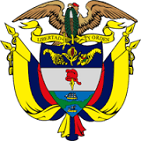





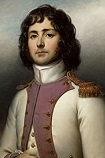

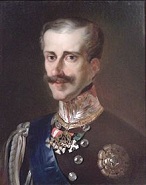






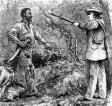













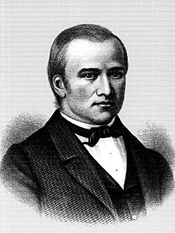





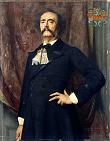

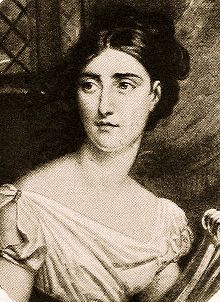





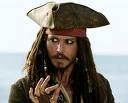


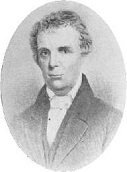
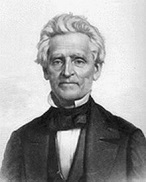
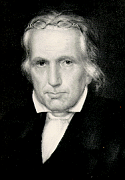


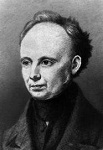
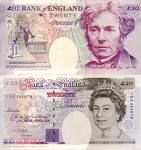




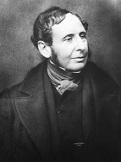
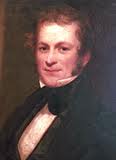








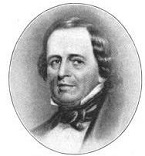
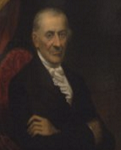



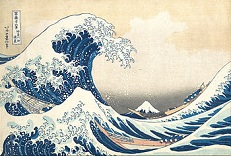
1831 German emigration to the U.S.: 15K (increases to 43K in 1841). People copulate and defecate, spreading disease to live? Between this year and 1866 there are three cholera pandemics in Europe, all originating in India, spreading to to Europe; the first one, which began in 1826 in the Ganges River Delta in India spreads to China (1828), Japan, Poland (Feb.), Russia (Mar.), Istanbul (July 26), Hungary, Germany, and Egypt, reaching Britain in Oct. On Jan. 1 Boston, Mass. abolitionists William Lloyd Garrison (1805-79) and Isaac Knapp (1808-58) begin pub. The Liberator (until Dec. 29, 1865), a broadside against slavery as an institution, using Christian principles, with the slogan, "I will be heard", and a cool graphic masthead with "Thou shalt love thy neighbor as thy self"; it never attains a circ. over 3K, but is extremely influential, immediately causing the state of Ga. to offer a $5K reward for Garrison's arrest, plus tons of death threats - that Playboy-under-the-bed feel, so bon ton to pass around? On Feb. 2 after a 54-day conclave, Mauro (Bartolomeo Alberto) Capellari is elected Pope (#254) Gregory XVI (1765-1846) (until June 9, 1846). On Feb. 5 Dutch naval lt. Jan Carolus Josephus van Speijk (Speyk) (b. 1802) blows up his ship in Antwerp harbor to prevent its capture by the Belgians. On Feb. 9 Joseph Smith Jr. receives a revelation to institute the Law of Consecration, instructing the church to keep goods "in my storehouse, to administer to the poor and the needy", On Mar. 13 conservative Casimir Pierre Perier (Périer) (1777-1832) becomes council pres. in Paris, keeping the repubs. down while restoring France's credit in Europe; too bad, he falls ill next spring during a cholera outbreak, and dies six weeks later on May 16. On Mar. 18 the U.S. Supreme (Marshall) Court rules 4-2 in Cherokee Nation v. Georgia that the Cherokees are a "domestic nation", not a typical foreign state, and that they have "an unquestionable right" to their lands; they actually ignore their plea to issue an injunction to the state of Ga. to not interfere with their rights by claiming that they have no jurisdiction over a foreign nation, while at the same time acknowledging that it is a dependent nation with a relationship to the U.S. like that of a "ward to its guardian". On Mar. 19 the City Bank on Wall Street in New York City is robbed of $245K by Edward Smith, who spends $60K before he is caught and sentenced to five years in Sing Sing - this could start a trend? In Mar. Joseph Smith Jr. proclaims that Christ's New Jerusalem will be sited on the Mo.-Kan. border in Jackson County, Mo., with the capital in Independence, Mo.; on Aug. 2 he holds a ceremony there, telling church members to buy up as much land as possible, helping lay the logs for the first house, with the first log caried by 12 men representing the Twelve Tribes of Israel; too bad, the locals don't like them, confusing them with abolitionists, giving them until Nov. 6, 1833 to skedaddle, then ordering the stragglers out on Nov. 23, 1833; after the last Mormons leave Mo. in mid-1839, they don't start returning until 1867; meanwhile he moves the church HQ from Palmyra, N.Y. to Kirtland, Ohio E of Cleveland (until 1837). On Apr. 7 after being harassed by his parliament, Brazilian king (since 1822) Pedro I abdicates in favor of his 5-y.-o. son Pedro (Peter) II (the Magnanimous) (1825-91) (until Nov. 15, 1889), then sails to Portugal to fight his usurper brother Dom Miguel and restore Maria II da Gloria. On Apr. 11 the Salsipuedes (Sp. "get out if you can") Massacre in Uruguay sees bola-carrying mounted Charrua Indians invited to a meeting with pres. Fructuosa Rivera's brother Bernabe, then you know what, exterminating the tribe, after which there is a govt. coverup, the remaining handful taken to Paris in 1833 as circus attractions. On Apr. 27 Charles Albert (1798-1849) of the line of Savoy-Carignan becomes king of Sardinia-Piedmont (until Mar. 23, 1849), Macedonian-born Albanian-speaking viceroy (since 1805) Mehmet (Mohammed) (Muhammad) Ali (1769-1849) demands the Ottoman Empire give him control of Arab Greater Syria (Syria Vilayet and Alepoo Vilayet) as a reward for his assistance against Greece in Crete, which is refused, resulting in the First Egyptian-Ottoman (Turco-Egyptian) (Syrian) War (ends 1833). In Apr. reps. of Austria, Russia, France, Prussia, and England meet in Rome to reform the Papal States, and on May 21 issue a memorandum, which is grudgingly carried out by Pope Gregory XVI, with exceptions, causing the Papal States to go into revolt. On May 5, 1831 the Detroit Free Press (originally Dem. Free Press and Mich. Intelligencer until 1835) is founded in Detroit, Mich. by Detroit mayor #1 (since 1824) John R. Williams (1782-1854) and his uncle Joseph Campau (1769-1863), becoming a backer of the Dem. Party; in 1940 it is acquired by the Knight Newspapers (Knight Ridder), becoming a morning newspaper competing with the evening The Detroit News; it goes on to win 10 Pulitzer Prizes and promote the motto "On Guard for 186 Years" (2017). On May 24 Pres. Andrew Jackson appoints his old La. friend Edward Livingston (1764-1836) (former mayor of New York City in 1801-3) as U.S. state secy. #11 (until May 29, 1833); meanwhile William Cabell Rives (1793-1868) of Va. negotiates a treaty with France agreeing to pay them 1.5M francs in satisfaction of French claims in return for 25M francs from them as indemnity for French spoilations of U.S. shipping during the Berlin and Milan decrees, and in 1835 Livingston is appointed minister to France to get the terms fulfilled, and when they renege he closes up shop and returns. On May 26 after the Polish Diet declares Polish independence, the Russians defeat them in the Battle of Ostroleka, and crush the November Uprising (begun 1830), launching a vicious Russification program; on Sept. 16 French foreign minister Horace Francois Bastien Sebastini de La Porta (1771-1851) utters the soundbyte "The most perfect order prevails in Warsaw"; Warsaw U. is closed for over 20 years; Warsaw rock star Frederic Chopin (b. 1810) moves to Paris. On June 4 Prince Leopold of Saxe-Coburg is elected king Leopold I (1790-1865) of Roman Catholic-friendly Belgium, and is inaugurated on July 21 (until Dec. 10, 1865), declaring Belgium separate from the Netherlands; the London Conference approves the selection, and on June 26 draws up the Eighteen Articles regulating the secession, splitting the Grand Duchy of Luxembourg in two, with the larger part going to Belgium and the smaller to the Netherlands, pissing-off William I, who less than two weeks later breaks the armistice and invades Belgium on Aug. 2-12 in the Ten Days Campaign, until they are stopped by a French army led by Marshal Etienne Maurice Gerard (Gérard) (1773-1852), ending the 1830 Belgian Rev.; Leopold rules with a clerical-liberal coalition that is paranoid about Dutch invasion, leading to strong militarism and tolerance of multilingualism, with French being #1 in popularity; meanwhile the costly Dutch occupation of Luxembourg and Flemish-dominated Limburg is paid for by Java gov.-gen. Count Johannes van den Bosch (1780-1844), who lowers taxes in exchanges for control of 20% of Java land, allowing him to raise crops of coffee, sugar, and indigo to ship back via the Dutch Trading Co. On June 7 the British House of Commons passes Lord John Russell's Reform Act, abolishing all "nomination" boroughs and extending the franchise, but the Whig-dominated House of Lords defeats it; Lord Grey's govt. resigns in protest, and eventually William IV is forced to ask him back and create a large number of new Whig peers to get it passed. On July 20 Md.-born Roger Brooke Taney (1777-1864) becomes U.S. atty. gen. #11 (until Nov. 14, 1833), beginning his rise to U.S. chief justice on Mar. 28, 1836, which is hampered by being Roman Catholic in a WASP society, but made up for by being on the side of the crackers. In July 1after being forced out of Ohio and Penn. in the late 18th cent., with one band moving to Mo. and becoming known as the Absentee Shawnee, another band of the Shawnee Tribe moves to Indian Territory, while another moves in Aug. to Kansas, only to have their lands drastically reduced in 1854 and broken up into individual allotments in 1858; during the U.S. Civil War many fight for the Union, gaining the name Loyal Shawnee, returning to Kansas only to find that white settlers have taken over 130K acres of their land, leaving them 70K, of which 20K are given to the Absentee Shawnee; in 1861 after Kan. becomes a state, the whites demand that they all be removed, and in 1869 the Loyal Shawnee make an agreement with the Cherokee Nation to receive citizenship and allotments of land in Craig County, Okla. and Rogers County, Okla. in NE Okla. (named after Will Rogers' father Clem Vann Rogers), becoming known as the Cherokee Shawnee. In Aug. black slave preacher "the Prophet" Nat Turner (1800-31) leads a slave rebellion in Va. with as many as 80 followers, moving for 12 hours from farm to farm in Southampton County and murdering 55 whites, mostly women and children, while the men are attending a religious revival; the militia suppresses the insurrection, and a reign of terror against blacks follows; the incident causes a slavery debate in the Va. House of Delegates next Jan., with an abolition resolution by Thomas Jefferson Randolph narrowly rejected, after which Southern sentiment for abolition evaporates as the news that niggers are indeed savage apes out to murder them freaks the whites out bigtime, and hardens their resolve to keep them down - they don't remember the Wat Tyler Rebellion of 1381? On Sept. 11 the Anti-Masonic Party holds the first-ever nat. pres. nominating convention in the U.S. in Baltimore, Md., and issues the first written platform, nominating William Wirt (1773-1834) (atty. gen. under Monroe and J.Q. Adams) (a Freemason?) for pres., and making hay of Jackson's support for Masonry. On Sept. 15 the British-built steam locomotive John Bull begins operation in the U.S.; it is still operating on Sept. 15, 1981, becoming the oldest operational U.S. steam locomotive. On Nov. 21 after a civilian-military govt. coup to reestablish a constitutional govt., Domingo de Caycedo (Caicedo) y Sanz de Santamaria (1783-1843) becomes pres. #1 of the new (Oct. 20) Repub. of New Granada (ends Apr. 11, 1858 1858), with capital at Santa Fe de Bogota, comprising modern-day Colombia and Panama plus portions of surrounding countries, with a red-blue-yellow flag; gen. Jose Maria Ramon Obando del Campo (1795-1861) becomes vice-pres. #1; on May 9, 1834 the new Colombian Coat of Arms is adopted, featuring a cool Andean condor (symbolizing freedom) holding a ribbon saying "Libertad y Orden" (Liberty and Order); too bad, it goes through 17 presidentes by 1858. In Nov. the Nat. Repub. (Anti-Jacksonan) Party (now perceived as the party of the moneyed aristocracy) hold their Nat. Convention in Baltimore, Md., and choose Henry Clay, dissolving in 1833 after he loses to Jackson. In Nov. Ark. blacksmith James Black (1800-72) makes the first 15-in. Bowie Knife (Arkansas Toothpick) for its designer, white slaver and frontiersman Col. James "Jim" Bowie (1796-1836) (or his brother Rezin), who embarks on an exploration of the SW U.S.; "could give a man of squeamish constitution the colic" (Davy Crockett). The original Skipper and Gilligan set out for Christmas '31? On Dec. 27 (Tues.) (11:00 a.m.) after having his interest in natural studies piqued by Cambridge botanist John Stevens Henslow (1796-1861), young biologist and bird shooter Charles Darwin (1809-82) sets out in HMS Beagle, captained by Robert FitzRoy (1805-65) (introduced to him by Henslow) for a 5-year cruise to Patagonia in South Am., New Zealand, and Australia (ends Oct. 2, 1836) to study flora and fauna and gather info. (ends 1836); his 17-day stay on the Galapagos Islands in fall 1835 takes him over the top, esp. the Galapagos tortoise, and the "obvious" natural selection among the 13 (14?) (15?) species of Darwin's finches (actually, passerine birds not related to finches), and his revulsion at the "hideous-looking" Galapagos marine iguana, with the soundbyte: "They are as black as the porous rocks over which they crawl and seek their prey from the Sea. Somebody calls them 'imps of darkness'. They assuredly well become the land they inhabit" (actually they eat seaweed); it takes for 1973 for a real scientific study of Darwin's finches to be made by Peter and Rosemary Grant - evolution or devolution? On Dec. 28 after the USS Lexington (built 1825) under Capt. Silas M. Duncan (1788-1834) sails to the Falkland Islands to investigate reports of three U.S. sealing ships destroyed, it wipes out the Argentine settlement of Puerto Soledad on East Falkland, declaring the islands "free of all government", which gives the Brits a free hand to move in. On Dec. 31, (Sat.) (Jan. 1, 1832?) the Disciples of Christ (Christian Church) is formed at the High St. Meeting House in Lexington, Ky. by a handshake between Port Tobacco, Md.-born Barton Warren Stone (1772-1844) and Sullivan County, Tenn.-born John "Raccoon" Smith (1784-1868) to go back to the Biblical roots, merging the Second Great Awakening Restoration (Stone-Campbell) Religious Reform Movement of County Down, Ireland-born Am. Presbyterian minister Thomas Campbell (1763-1854) and his County Antrim, Ireland-born son Alexander Campbell (1788-1866), composed mainly of Bible-thumping Baptists. In Dec. Central Am. Federation pres. Francisco Morazan transfers the capital from Guatemala City to San Salvador, but after opposition by pres. Jose Maria Cornejo leaves on Jan. 6, 1832 to Honduras to wait for troops from Nicaragua to return with. Greek pres. Count Ioannaes Kapodistrias (b. 1776) is assassinated, and a civil war breaks out in Greece (until 1832). The impoverished silk weavers of Lyons, France revolt against mechanisation and lower wages - it's all about who you know? Mass demonstrations in Switzerland lead to dem. reforms and expansion of the voting franchise. Anti-black riots in Providence, R.I. end up with four whites being killed by the militia. The British begin a drive to exterminate the Thugee cult in India, devoted to the goddess Kali, known for murders and robberies in the name of their religion, causing the term Muslim, er, "thug" to be coined. The U. of Parma in Italy is closed to foreign students, and falls into decay before being revived in 1854. The red-white colors of the Polish Flag are officially adopted, based on the white eagle of Poland and the white knight (pursuer) of Lithuania who rides a white horse, all on a red shield; it takes until 1919 to adopt the flag itself. Gen. Sir Richard Bourke (1777-1855) becomes gov. of New South Wales, Australia (until 1837); free land grants are ended, and a min. price of 5 shillings/acre is set to finance public works and white immigration. Former U.S. pres. John Quincy Adams becomes U.S. Rep. from Mass. The Eaton Affair of 1829 works out for Van Buren? After attacking Jackson's spoils system, John C. Calhoun resigns as U.S. vice-pres., and Martin Van Buren and Thomas Eaton resign from the Jackson cabinet, allowing Jackson to ask for the resignations of other members, incl. three Calhoun supporters; Jackson then nominates Van Buren as U.S. minister to Great Britain, but the Senate rejects him, so Jackson picks him for his vice-pres. and eventual successor; Penn. Federalist rep. (since 1820) James Buchanan (b. 1791) goes Dem. and becomes U.S. minister to Russia (until 1833); on Mar. 13, 1832 the term "kitchen cabinet" is coined in an article in the Calhounite Telegraph by U.S. Sen. (D-Miss.) (1830-5) George Poindexter (1779-1853) for Pres. Jackson's ginger group of intimate advisers, incl. Washington Globe ed. (1830-49) Francis Preston Blair (1791-1876). Sam Houston's own little affair works out for him too? Sam Houston returns to Tenn. for his mother's funeral, then accompanies a Cherokee delegation to Washington, D.C. to see Pres. Jackson and champion their rights; Ohio Rep. William Stanberry denounces Houston and the Jackson admin. in the House, and accuses Houston of dishonesty, then two weeks later they cross paths on Pennsylvania Ave., and Stanberry aims a pistol at Houston's buckskin-coated chest and pulls the trigger, but it misfires, and Houston disarms him, lifts his feet in the air and "struck him elsewhere"; Houston is arrested and tried for contempt before the House of Reps., causing a nat. sensation as he hires Francis Scott Key as his atty. but steals the show with lofty oratory that causes Shakespearean actor Junius Brutus Booth (1796-1852) to push through the crowd and embrace him; he is acquitted, saying "They gave me a national tribunal for theatre, and that set me up again." The Crows and Blackfeet engage in a fierce battle near the Wyo. border, and the Crows credit their V to their adopted chief, Va.-born mulatto mountain man Jim Beckwourth. Genoan-born Italian patriot Giuseppe Mazzini (1805-72), who has worn black since 1821 and swears to continue until Italy is unified and independent moves to Marseilles and founds Young Italy (Italian Youth) (Giovine Italia) to work for unification and nat. independence. The Nottingham Riot in England sees the pop. of the lace manufacturing town known for having the worst slums in the British Empire outside India riot in protest of the Duke of Newcastle's opposition to the Reform Act of 1832, setting fire to his residence Nottingham Castle. The First British-Ashanti War (begun 1823) ends with a treaty accepting the Pra River as the border, bringing 30 years of peace. George (Taufa'ahau) Tupou I (1797-1893) founds the Tupou Dynasty in Tonga (the Friendly Islands), taking the name George I, going on to consolidate the kingdom by conquest - rock rock, everybody rock, take it rooster? Zurich promulgates the Constitution of 1831 based on Snell's principles. U.S. copyright protection is extended to 28 years, renewable for 14 more - who could live longer than that? The name of the city of Thang Lo is changed to Hanoi - they don't hang low they hang hi? The city of Kansas City (originally just Kansas) (named after the Kansas Indians) (modern-day. pop. 481K/2.4M) is founded at the confluence of the Missouri and Kansas Rivers by a group of Mormons from N.Y., building the first school in Kan. Territory until they are chased out by mobs in 1833, after which the Kansas Town Co. is formed to settle the area; it is incorporated as a town on June 1, 1850, and as a city on Mar. 28, 1853, going on to become the largest city in Mo. Denison U. (originally Granville Lit. and Theological Inst.) in Granville, Ohio is founded on Dec. 13 by John Pratt, becoming the 2nd Baptist college W of the Allegeny Mts. after Georgetown College (founded 1829), and Ohio's 2nd liberal arts college. New York U. (NYU) in New York City is founded by Swiss-born U.S. Treasury secy. #4 (1801-14) Albert Gallatin (1761-1849); the first 100 students occupy rental quarters until the first bldg. is purchased on Washington Square in 1837. Wesleyan U. is founded in Middletown, Conn. by thee Methodist Episcopal Church, becoming the first U.S. college named after John Wesley, and of the Little Three (top U.S. liberal arts colleges) after Williams College (founded 1793) and Amherst College (founded 1821). French Versailles court auditor Alexis Charles Henri Clerel (Clérel) de Tocqueville (1805-59) visits the U.S. for 9 mo. to gather info. on prisons, and ends up an Am. groupie, writing a fanzine? French-born Am. explorer U.S. Army Capt. Benjamin Bonneville (1796-1878) of the U.S. Army heads an expedition guided by Jim Bridger (ends 1836) to explore the Intermountain West between the Rocky Mts. and Calif., and finds them not all flat; Bonneville Salt Flats are later named after him by geologist Grove Karl Gilbert. Enderby Land, a region of NE Antarctica opposite the S tip of Africa is discovered. The first U.S.-built locomotive to pull a passenger train makes its first run; the first U.S. railroad honeymoon trip is made by Mr. & Mrs. Pierson of Charleston, S.C. The British Assoc. for the Advancement of Science is founded to professionalize the discipline, based on the Gesellschaft Deutscher Naturforscher. Scottish theologian John McLeod Campbell (1800-72), minister of Row near Helensburgh since 1825 is deposed by the Gen. Assembly for heresy for preaching the universality of atonement. Am. make-the-world-go-away-and-get-it-off-my-shoulder Millennium Fever Baptist preacher William Miller (1782-1849) begins his preaching career; meanwhile competitor Joseph Smith moves to Kirtland, Ohio to meet girls, er, spread his new religion - any nubile young women wanting to be, er, converted? Scottish physicist Sir David Brewster (1781-1868) almost loses his sight when a chemical experiment blows up in his face - like a kaleidoscope? Mary Willis Marshall (nee Ambler), wife (since 1782) of U.S. chief justice John Marshall (d. 1835) dies, and his health declines. After being orphaned at age two, taken in by John and Frances Allan of Richmond, Va., then kicked out because of his gambling debts, attending the U. of Va. for one year before running out of money, enlisting in the U.S. Army in 1827 under an alias, Boston, Mass.-born Edgar Allan Poe (1809-49) is expelled from West Point after 6 mo. for alcoholism, declaring his desire to become a writer and poet. The Congregational Union of England and Wales is founded. The Garrick Club in London is founded for the promotion of lit. and drama. The Detroit Free Press and Michigan Intelligencer is founded. Finnish nationalist intellectuals found the Finnish Lit. Society, led by philologist Elias Lonnrot (Lönnrot) (1802-84). Hungarian child prodigy pianist Franz Liszt (1811-86) hears Niccolo Paganani play violin in Paris in Sept., turning him on, after which he practices 24/7 to become the #1 piano virtuoso, transposing Hector Berlioz's "Symphonie Fantastique" next year and becoming a star. Black Hermitage Syrah (Shiraz) grapes are brought to Australia from France and Spain by James Busby (1801-71) of Scotland, who goes on to become "the Father of the Australian Wine Industry". Architecture; Mount Auburn Cemetery on the border between Cambridge and Watertown, Mass. (4 mi. W of Boston) is dedicated by U.S. Supreme Court justice Joseph Story, starting a rage for beautiful naturalistic landscaped rural cemeteries and parks. The remains of George Washington are removed to a plain brick tomb a few hundred yards from Mt. Vernon mansion near a wooded ravine. Inventions: French physicist Antoine Cesar Becquerel (1788-1878) invents the electromagnetic balance. James Bogardus (1800-74) of New York City invents a mechanized engraving machine for engraving dies for bank notes. Samuel Guthrie (1782-1848) of N.Y. (inventor of percussion powder, which makes the flintlock musket obsolete, plus a process for converting potato starch into molasses in 1830), Justus von Liebig (1803-73) of Germany, and Eugene (Eugène) Soubeiran (1797-1859) of France independently discover Chloroform (CHCl3). Walter Hancock (1799-1852) of England begins the first regular steam carriage service between Stratford and London in his 10-seater self-propelled steam carriage The Infant (built 1829); after taking an experimental trip to Brighton on Oct. 31, 1832, he begins regular service between London Wall and Paddington via Islington in his new steam carriage The Enterprise - the original Star Trek? Am. physicist Joseph Henry (1797-1878) invents the electric bell; he uses silk from his wife's stockings to wrap wire for the poles of his horseshoe magnet, which is able to lift one-third ton. Robert Hall McCormick (1780-1846) of Walnut Grove, Va. invents the Mechanical Reaper, and his son Cyrus Hall McCormick (1809-84) markets it, turning wheat farming into a big agribusiness; he receives a patent on June 21, 1834, and leaves it to his son, who later claims he invented it? The slow-burning safety fuse is invented by ?, along with a method of exploding several blasting charges simultaneously by means of electrically-fired blasting caps. Science: Michael Faraday (1791-1867) of England discovers Electromagnetic Induction. Scottish-born British explorer Sir John Ross (1777-1856) and his nephew Sir James Clark Ross (1800-62) discover the location of Earth's magnetic North Pole near Ellesmere Island in Canada; starting in 1904, the pole begins shifting NE at about 9 mi. a year, speeds up again in 1989, and by 2007 is heading toward Siberia at 34-37 mi. a year. The Wollaston Medal, named after English chemist-physicist William Hyde Wollaston (1766-1828) (made of palladium, a metal he discovered) is founded by the Geological Society of London; the first one goes to William "Strata" Smith (1769-1839), whose pub. of the first geological map in 1801 causes pres. Adam Swedgwick to call him "the Father of English Geology". Nonfiction: Thomas Carlyle (1795-1881), Characteristics. Albert Gallatin (1761-1849), Considerations on the Currency and Banking System of the United States. Christian Dietrich Grabbe (1801-36), Comedy, Satire, Irony and Deeper Meaning; disses Germany's fascination with Shakespeare. George Grote (1794-1871), Essentials of Parliamentary Reform. Charles Knowlton (1800-50), The Fruits of Philosophy, or the Private Companion of Young Married People; advocates birth control, getting him jailed in Taunton, Mass. Alphonse de Lamartine (1790-1869), Sur la Politique Rationnelle. Jules Michelet (1798-1874), Introduction a l'Histoire Universelle; uses the anti-rationalist approach of Giambattista Vico, preferring imagination to analysis, displaying "the peculiar visionary qualities which made Michelet the most stimulating, but the most untrustworthy (not in facts, which he never consciously falsifies, but in suggestion) of all historians." (Encyclopaedia Britannica, 11th ed.). Sir Francis Palgrave (1788-1861), A History of the Anglo-Saxons. Omar ibn Said (1770-?), Autobio. of Omar ibn Said, Slave in North Carolina; ed. John Franklin Jameson; only Arabic autobio. written by a slave in the U.S. known as Morro or Uncle Moreau, who was abducted from West Africa in 1807; acquired by Am. Muslim Derrick Beard (1969-2018), who leaves it to the Library of Congress. John Greenleaf Whittier (1807-92), Legends of New England. William Youatt (1776-1847), The Horse: With a Treatise on Draught; becomes std. textbook. Music: Daniel Auber (1782-1871), Le Philtre (comic opera) (Opera Comique, Paris); stars Adolphe Nourrit; after Gaetano Donizetti trans. the libretto into Italian, it becomes the hit "L'Elisir d'Amore". Vincenzo Bellini (1801-35), La Sonnambula (opera) (Mar. 6) (Teatro Carcano, Milan); libretto by Felice Romani; stars Giuditta Angiola Maria Constanza Pasta (nee Negri) (1797-1865) as Amina, and Giovanni Battista Rubini as Elvino; Amina's line "Ah! Non credea mirarti/ Si pesto estingo, o fiore" (I did not believe you would fade so soon, oh flower!" is inscribed on Bellini's tomb in the Catania Cathedral in Sicily; Norma (opera) (Dec. 26) (La Scala, Milan); libretto by Felice Romani; written (like La Sonnambula) especially for Giuditta Pasta, a role that becomes a favorite for sopranos Jenny Lind and Lilli Lehmann, and is later owned by Maria Callas. Frederic Chopin (1810-49), Revolutionary Etude, Op. 10, No. 12; composed after witnessing the 1830 bombardment of Warsaw. Louis Herold, Zampa (Paris, Opera-Comique). Giacomo Meyerbeer (1791-1864), Robert le Diable (Robert the Devil) (opera) (Paris Opera) (Nov. 21); libretto by Eugene Scribe and Casimir Delavigne; the 2nd grand opera after Daniel Auber's "La Muette de Portici"; makes him a superstar; incl. Idole de Ma Vie. Thomas Moore (1779-1852), Life of Lord Edward Fitzgerald. Samuel Francis Smith (1809-95) writes the lyrics to My Country, 'Tis of Thee to the tune of America, becoming a U.S. nat. anthem until 1931. Mary Somerville (1780-1872), Celestial Mechanism of the Heavens. Istvan Szechenyi (1791-1860), The World. Art: Jean-Baptiste-Camille Corot (1796-1875), View of the Forest of Fontainebleau. Eugene Delacroix (1798-1863), Le 28 Juillet 1830. Katsushika Hokusai (1760-1849), Thirty-Six Views of Mount Fuji; incl. The Great Wave Off Kanagawa. Jean Louis Ernest Meissonier (1815-91), The Visit to the Burgomaster (Les Bourgeois Flamands); his first "miniature in oil". Plays: Cogniard Brothers, La Cocarde Tricolore; introduces the term "chauvinism" - it's everything I wanted, this is just for men? Alexandre Dumas pere (1802-70), Antony. Franz Grillparzer (1791-1872), Des Meeres und der Liebe Wellen. Mariano Jose de Larra (1809-37), No Mas Mostrador (Apr. 27) (first play). Poetry: Karl Immermann (1796-1840), Merlin; his masterpiece? Giacomo Leopardi (1798-1837), I Canti; first complete ed. of his poems. August von Platen (1796-1835), Polenlieder; cheers the Poles in their struggle against the Russians. Edgar Allan Poe (1809-49), Poems of Edgar A. Poe; incl. To Helen (in honor of Jane Stanard, mother of a childhood friend), Israfel. Johan Ludvig Runeberg (1804-77), The Grave in Perrho. Novels: Honore de Balzac (1799-1850), La Peau de Chagrin. Michael Banim (1796-1874), The Smuggler. Jules Amedee Barbey d'Aurevilly (1808-89), Le Cachet d'Onyx (first novel). Adelbert von Chamisso (1781-1838), Frauenliebe und Frauenleben. Benjamin Disraeli (1804-81), The Young Duke (novel #2). Susan Edmonstoune Ferrier (1782-1854), Destiny. John Galt (1779-1839), Bogle Corbet, or The Emigrants (3 vols.); The Lives of the Players. Nikolai Gogol (1809-52), Evenings in a Farm near Dikanka (1831-2) (stories); makes him an instant star. Victor Marie Hugo (1802-85), The Hunchback of Notre-Dame (Notre Dame de Paris) (Jan. 14); Paris in the time of Louis XI starting on Epiphany (Jan. 6), 1482, the Feast of Fools; hunchback bellringer Quasimodo, Gypsy babe Emeralda, Capt. Phoebus, Pierre Gringoir, Archdeacon Claude Frollo; the criminal Truands and their Court of Miracles led by King Clopin Trouillefou; "Maitre Jacques Coppenole"; "A Tear for a Drop of Water"; "His cathedral was enough for him. It was peopled with marble figures of kings, saints, and bishops who at least did not laugh in his face and looked at him with only tranquility and benevolence. The other statues, those of monsters and demons, had no hatred for him - he resembled them too closely for that. It was rather the rest of mankind that they jeered at"; "Great edifices, like great mountains, are the work of the ages"; the popularity of the book spurs rebuilding efforts, with Jean-Baptiste-Antoine Lassus and Eugene Viollet-le-Duc selected as architects, who design and build the 300-ft. spire in 1859, which burns in Apr. 2019. James Kirke Paulding (1778-1860), The Dutchman's Fireside (2 vols.). Thomas Love Peacock (1785-1866), Crotchet Castle; novel #6. Alexander Pushkin (1799-1837), The Belkin Tales (The Tales of the Late Ivan Petrovich Belkin) (first novel). Jules Sandeau (1811-83) and George Sand (1804-76), Rose et Blanche; pub. under alias J. Sand, causing his liberated Parisian lover Madame Dudevant (known for wearing men's clothes and smoking cigars) to adopt the alias George Sand. Karl Spindler (1796-1855), Der Invalide. Births: Am. historian-librarian Justin Winsor (d. 1897) on Jan. 2 in Boston, Mass.; educated at Boston Latin School. and Harvard U.; Harvard U. librarian 1877-97; founder of the Am. Library Assoc. (1876). German postmaster Heinrich von Stephan (d. 1897) on Jan. 7 in Stolp (Slupsk), Pomerania, Prussia; co-founder of the First Internat. Postal Union (1874). U.S. Sen. (R-Minn.) (1889-95) and Rep. (1879-85) William Drew Washburn (d. 1912) on Jan. 14 in Livermore, Maine; brother of Elihu B. Washburne (1816-87) and Cadwallader Washburn (1818-82); educated at Bowdoin College. Am. Western gunslinger Joseph Alfred "Jack" Slade (d. 1864) on Jan. 22 in Carlyle, Ill. German botanist (founder of modern mycology) Henrich Anton de Bary (d. 1888) on Jan. 26 in Frankfurt-am-Main. Am. "Hans Brinker" writer-ed. Mary Elizabeth Mapes Dodge (d. 1905) on Jan. 26 in New York City. Am. musical instrument manufacturer Franz Rudolph Wurlitzer (d. 1914) on Jan. 30 in Schoneck, Saxony; emigrates to the U.S. in 1853; father of Henry Eugene Wurlitzer (1871-1928), Rudolph Henry Wurlitzer (1873-1948) and Farny Reginald Wurlitzer (1883-1972). Czech architect Josef Hlavka (Hlávka) (d. 1908) on Feb. 15 in Prestice, Bohemia; educated at the Technical U. of Prague, and Academy of Fine Arts. Russian "Lady Macbeth of Mtsensk" novelist Nikolai Semyonovich Leskov (d. 1895) on Feb. 16 in Gorokhova, Orel (Oryol); model for Anton Chekhov. French dramatist-librettist Henri Meilhac (d. 1897) on Feb. 21 in Paris; collaborator of Ludovic Halevy (1834-1908). Am. Rocky Mountain News founder-ed. William Newton Byers (d. 1903) on Feb. 22 in Ohio. German statesman and chancellor (1890-4) Count Georg Leo von Caprivi (Kopriva) de Caprera de Montecuccoli (d. 1899) on Feb. 24 in Charlottenburg. English "Buddhism in Christendom" writer (Buddhist) Arthur Lillie (nee George Arthur Howard) (d. 1911) on Feb. 24 in North End, Fulham. Am. Pullman Sleeping Car inventor George Mortimer Pullman (d. 1897) on Mar. 3 in Brockton, N.Y.; starts out manufacturing coffins - natural progression? U.S. 5'5" Civil War Union maj. gen. Philip Henry "Little Phil" Sheridan (d. 1888) on Mar. 6 in Albany, N.Y.; Irish immigrant parents; #34 of 52 in the 1853 West Point class; "A brown, chunky little chap, with a long body, short legs, not enough neck to hang him, and such long arms that if his ankles itch he can scratch them without stooping" (Abraham Lincoln). Am. historian James Phinney Baxter (d. 1921) on Mar. 23 in Gorham, Maine; grandfather of James Phinney Baxter III (1893-1975). Scottish chemist Archibald Scott Couper (d. 1892) on Mar. 31 in Kirkintilloch, East Dunbartonshire. English heavyweight boxing champ (1861-2) James "Gypsy Jem" Mace (d. 1910) on Apr. 8 in Beeston. Am. Baptist minister (founder of Shaw U.) Henry Martin Tupper (d. 1893) on Apr. 11 in Monsn, Mass. Am. Civil War Union gen. and railroad exec Grenville Mellen Dodge (d. 1916) on Apr. 12 in Putnamville (near Danvers), Mass.; educated at Norwich U. Belgian painter-sculptor Constantin Meunier (d. 1905) on Apr. 12 in Etterbeek, Brussels. Scottish mathematical physicist Peter Guthrie Tait (d. 1901) on Apr. 28 in Dalkeith; educated at Peterhouse College, Cambridge U. Am. beer entrepreneur Joseph Schlitz (d. 1875) on May 15 in Mainz, Germany; emigrates to the U.S. in 1850. Am. musician-physicist-inventor David Edward Hughes (d. 1900) on May 16 in Bala, Wales; emigrates to the U.S. at age 7. British naval vice-adm. and historian-critic-inventor Philip Howard Colomb (d. 1899) on May 29 in Knockbrex, Dumfries and Galloway, Scotland. Am. Civil War Confederate Gen. John Bell Hood (d. 1879) on June 1 (June 29?) in Owingsville, Ky. Scottish "Maxwell's Laws of Electromagnetism" physicist James Clerk Maxwell (d. 1879) on June 13 in Edinburgh; educated at the U. of Edinburgh, and Trinity College, Cambridge U.; takes the first color photo in 1861. Am. "Life in the Iron Mills" novelist-journalist Rebecca Blaine Hardind Davis (d. 1910) on June 24 in Washington, Penn.; grows up in Wheeling, W. Va.; educated Washington Female Seminary. Hungarian violinist-composer Joseph Joachim (b. 1907) on June 28 in Kittsee (near Bratislava), Slovakia; founds the Joachim Quartet in 1869; lifelong friends with Johannes Brahms, who writes his Concerto for him; later, when Joachim's marriage is crumbling and Brahms fails to side with him, the latter attempts to patch things up by writing his Double Concerto (violin-cello). Am. educator Daniel Coit Gilman (d. 1908) on July 6 in Norwich, Conn.; educated at Yale U. (Skull & Bones); classmate of Andrew Dickson White; pres. #1 of Johns Hopkins U. (1875-1901) and the Carnegie Inst. (1901-). German sculptor Reinhold Begas (d. 1911) on July 15 in Berlin; son of Karl Begas (1794-1854); student of Christian Daniel Rauch and Ludwig Wilhelm Wichmann. Persian Qajar shah #4 (1848-96) Nasser ed-Din (al-Din) Shah Qajar (d. 1896) on July 16 in Tabriz; son of Mohammad Shah Qajar (1808-48); father of Mozaffar al-Din Shah Qajar (1853-1907); first shah to be photographed and to write a diary. French mathematician (modern slide rule w/runner inventor) Victor Mayer Amedee (Amédée) Mannheim (d. 1906) on July 17 in Paris. Chinese Manchu Qin emperor #7 (1850-61) Qing Xian Feng (Hsien-fung) (Chin. "universal prosperity") (real name Yizhu) (d. 1861) on July 17 in Beijing; 4th son of Dao Guang (1782-1850) and imperial concubine Quan (1808-40). Japanese emperor #121 (1846-67) Komei (Osahito) (d. 1867) on July 22; 4th son of Ninko (1800-46). French-Am. African explorer-anthropologist Paul Belloni du Chaillu (d. 1903) on July 31 in Paris (New Orleans, La.?) (Reunion Island?); mulatto mother?; spends his youth in Gabon, then emigrates to the U.S. in 1852. English Biblical and Shakespearean scholar William Aldis Wright (d. 1914) on Aug. 1 in Beccles; educated at Trinity College, Cambridge U. English "Life of Christ" Anglican cleric-writer (headmaster of Marlborough and dean of Canterbury) Frederic William Farrar (d. 1903) on Aug. 7 in Bombay, India; educated at King's College, London; known for his sordid financial affairs; likes to write standing up. British Liberal-turned-Conservative politician George Joachim Goschen, 1st Viscount Goschen (d. 1907) on Aug. 10 in London; educated at Rugby School, and Oriel College, Oxford U.; created viscount in 1900; father of George Joachim (1866-1952). Russian mystic Theosophical Society co-founder Madame Helena (Elena) Petrovna Blavatsky (nee Hahn) (d. 1891) on Aug. 12 (July 30 Old Style) in Ekaterinoslav (Dnepropetrovsk), Ukraine; daughter of Col. Peter von Hahn (Gan) (1798-1873) and Elena Andreyevna Fadayeva (1814-43); sister of Vera Zhelikhovsky (1835-96); first cousin of Count Sergei Witte (1849-1915); settles in the U.S. in 1873 after 20 years of extensive travels to India, Tibet et al., where she becomes a spiritualist and decides to bring it back to the so-very-shallow white world. Austrian geologist Eduard Suess (d. 1914) on Aug. 20 in London, England; grows up in Prague and Vienna; father of Franz Eduard Suess (1867-1942), father of Hans Suess (1909-93). U.S. First Lady (1877-81) (abolitionist) (teetotaler) "Lemonade" Lucy Ware Webb Hayes (d. 1889) on Aug. 28 in Chillicothe, Ohio; daughter of Dr. James Webb and Maria Cook, who inherit 15-20 slaves and set them free; wife of Pres. Rutherford B. Hayes; educated at Ohio Wesleyan U. (first First Lady to graduate from college); converts her husband to the abolitionist cause; most popular White House hostess since Dolley Madison. French "La Tosca", "Fedora" dramatist Victorien Sardou (d. 1908) on Sept. 5 in Paris; in 1895 G.B. Shaw coins the term "Sardoodledom" for his empty contrived dramatic machinery. French sculptor-painter Jean Alexandre Joseph Falguiere (Falguière) (d. 1900) on Sept. 7 in Toulouse. French Provençal (Provencal) Felibrige poet Frederic (Frédéric) Mistral (d. 1914) on Sept. 8 in Maillane, Bouches-du-Rhone; Chilean poet Gabriel Mistral (1889-1957) names herself in his honor. German "Stopfkuchen" novelist-painter ("the Charles Dickens of Germany") Wilhelm Raabe (d. 1910) (AKA Jakob Corvinus) on Sept. 8 in Escherhausen, Brunswick. U.S. Civil War Union maj. gen. and U.S. war secy. #28 (1868-9) John McAllister Schofield (d. 1906) on Sept. 29 in Gerry, N.Y. English dept. store ("universal provider") pioneer William Whiteley (d. 1907) on Sept. 29 in Purston, Yorkshire. Am. journalist Edwin Lawrence Godkin (d. 1902) on Oct. 2 in Moyne, County Wicklow, Ireland; founder of "The Nation" (1865); educated at Queen's College, Belfast; emigrates to the U.S. in 1856. German mathematician Julius Wilhelm Richard Dedekind (d. 1916) on Oct. 6 in Braunschweig, Brunswick. German ambassador (Constantinople, 1878-81) (London, 1885-1901) Melchior Hubert Paul Gustav Graf von Hatzfeldt zu Trachenberg (d. 1901) on Oct 8 in Dusseldorf; "the best horse in the diplomatic stable" (Bismarck). Am. "Ramona" (1884) poet-novelist and Am. Indian rights activist Helen Maria Hunt Fiske Jackson (d. 1885) on Oct. 15 in Amherst, Mass. German Kaiser #2 (1888) Frederick (Friedrich) "Fritz" III (d. 1888) on Oct. 18 in Potsdam, Prussia; son of Wilhelm I (1797-1888) and Augusta of Saxe-Weimar (1811-90). English jurist-historian (Positivist philosophy leader) Frederic Harrison (d. 1923) on Oct. 18 in London; educated at King's College and Wadham College, Oxford U. Am. classical scholar Basil Lanneau Gildersleeve (d. 1924) on Oct. 23 in Charleston, S.C.; educated at Princeton U. Am. paleontologist Othniel Charles Marsh (d. 1899) on Oct. 29 in Lockport, N.Y.; educated at Yale U.; rival of Edward Drinker Cope (1840-97). German physiologist Carl (Karl) von Voit (d. 1908) on Oct. 31 in Amberg. Am. "Atlantis", "Ragnarok" Repub.-Dem.-Ind.-People's Party politician-writer ("Greatest Failure Who Ever Lived") ("Prince of Cranks") ("Apostle of Discontent") ("Sage of Nininger") (king of 19th cent. conspiracy theorists) Ignatius Loyola Donnelly (d. 1901) on Nov. 3 in Philadelphia, Penn; promotes the killer theories that Shakespeare's plays were written by Sir Francis Bacon, that the Flood and the destruction of Atlantis, along with the extinction of the mammoth were caused by a near-collision of Earth with a comet, and that explains where gravel deposits come from; tries to found his own town called Nininger. British "Anna and the King of Siam" governess Anna Harriet Leonowens (Anna Harriet Emma Edwards) (d. 1915) on Nov. 5; claims to be born in Carnarfon, Wales of Army Capt. Thomas Crawford, but really is born in India of Army Sgt. Thomas Edwards and partly-East Indian mother Mary Anne Glasscott; in 1845 her older sister Eliza Julia marries British civil servant Edward John Pratt, who have son Edward Pratt Jr., father of William Henry Pratt AKA Boris Karloff - sounds like a great movie, Anna and the Frankenstein King of Siam? Am. knuckle coupler inventor Eli Hamilton Janney (d. 1912) on Nov. 12 in Loudon County, Va. U.S. Civil War brig. gen. Stephen Hinsdale Weed (d. 1863) on Nov. 17 in Potsdam, N.Y.; son of John Kilbourne and Charity Winslow Weed. U.S. Repub. pres. #20 (1881) and Civil War maj. gen. (lefty) James Abram Garfield (d. 1881) (whose portrait bears a striking resemblance to actor Paul Newman?) on Nov. 19 in Orange (Cuyahoga County) (near Cleveland), Ohio; first lefty U.S. pres. (next Hoover); 5th and last U.S. pres. born in a log cabin (after Jackson, Polk, Buchanan, Lincoln); 2nd U.S. pres. to be assassinated (after Lincoln); first sitting member of the U.S. House to be elected pres. (until ?); at 18 mo. his father dies; at age 17 works on a freighter in the Great Lakes, followed by a canal boat in the Erie Canal, then becomes a traveling preacher, attends Ohio's Geauga Seminary for two years, and graduates from Williams College in Mass., becoming a prof. of classics and principal of Western Reserve Eclectic Inst. in Ohio. English Liberal MP and playwright (agnostic) Henry Du Pre Labouchere (Labouchère) (d. 1912) on Nov. 31 in London; nephew of Henry Labouchere, 1st baron Taunton (1798-1869); educated at Eton School, and Trinity College, Cambridge U.; husband (1887-) of Henrietta Hodson (1841-1910); shares Northampton with atheist Charles Bradlaugh, calling himself "the Christian member". British Liberal Unionist politician (Unitarian) Jesse Collings (d. 1920) on Dec. 2 in Littleham-cum-Exmouth, Devon. Am. Civil War Union brig. gen. Joshua Woodrow Sill (d. 1862) on Dec. 6 in Chillicothe, Ohio. German banker-philanthropist (Jewish) Baron Moritz von Hirsch auf Gereuth (d. 1896) on Dec. 9 in Munich; grandfather is the first Jewish landowner in Bavaria; father is banker to the Bavarian king; created baron in 1869. Am. "O Little Town of Bethlehem" composer Lewis Henry Redner (d. 1908) on Dec. 15 in Philadelphia, Penn. Am. Colo. cattle rancher John Wesley Iliff Sr. (d. 1878) on Dec. 18 in McLuney, Ohio; father of John Wesley Iliff Jr. (1877-9) and William Seward Iliff; namesake of Iliff School of Theology, and Iliff, Colo. English "Fly Leaves" poet ("Father of the University School of Humor") Charles Stuart Calverley (Blayds) (d. 1884) on Dec. 22 in Martley, Worcestershire; educated at Harrow School, and Balliol College, Oxford U., and Christ's College, Cambridge U.; first to win the chancellor's prize in Latin verse at Oxford and Cambridge. English "The Autobiography of Mark Rutherford" novelist Mark Rutherford (William Hale White) (d. 1913) on Dec. 22 in Bedford; father William White is a Nonconformist doorkeeper at the House of Commons. Am. Mormon fundamentalist founder John Wickersham Woolley (d. 1928) on Dec. 30 in Newlin, Penn.; father of Lorin Calvin Woolley (1856-1934). Chinese sirhak scholar O Kyong-sok (Gyeong-seok) (d. 1879). Am. Hunkpapa Lakota Sioux holy man Sitting Bull (Tatanka Yotanka) (nee Jumping Badger) (d. 1890) near the Grand River, Dakota Territory; son of Returns-Again. Russian vodka manufacturer Pyotr Arsenievich Smirnov (d. 1898). English liberal orator Joseph Cowan II (d. 1900); son of Sir Joseph Cowan (1800-73). British mathematician Edward John Routh (d. 1907). Deaths: Am. printer Isaiah Thomas (b. 1749) on Apr. 4 in Worcester, Mass. Am. financier-philanthropist Stephen Girard (b. 1750) on Dec. 26 in Philadelphia, Penn.; leaves a $7.5M fortune, largest in the U.S., the bulk designated for philanthropic purposes, incl. improved police and municipal improvements in Philly, and for the erection of a school for "poor, white, male orphans", with all ministers of any sect excluded from entering the premises or working in it, which freaks the heirs, causing them to contest it in court in 1836, going all the way to the U.S. Supreme Court, where Daniel Webster makes a famous Plea for the Christian Religion in 1844 but loses, and Girard College is founded in 1848. Am. "Hartford Wits" poet-atty. John Trumbull (b. 1750) on May 11. French pianoforte maker Sebastian Erard (b. 1752) on Aug. 5 in Paris. German Sturm und Drang dramatist F.M. von Klinger (b. 1752) on Feb. 25 in Dorpat. Am. Rev. officer Nathaniel Rochester (b. 1752) on May 17 in Rochester, N.Y. English poet-historian William Roscoe (b. 1753) on June 30 in Toxteth, Liverpool. Am. writer Miss Hannah Adams (b. 1755) on Dec. 15 in Brookline, Mass. English "Lady Macbeth" actress Sarah Siddons (nee Kemble) (b. 1755). Dutch poet Willem Bilderdijk (b. 1756) on Dec. 18 in Haarlem. Austrian-born French composer and pianoforte maker Ignaz Pleyel (b. 1757) on Nov. 14 near Paris; the #1 composer in Europe between Haydn and Beethoven ends up being forgotten. Prussian PM Karl vom Stein (b. 1757) on June 29 in Selm. U.S. pres. #5 (1817-25) James Monroe (b. 1758) on July 4 (3:15 p.m.) in New York City; 3rd U.S. pres. to die on Independence Day (John Adams (1735-1826), Jefferson); first (only?) pres. to have a foreign capital city named after him (Monrovia, Liberia, 1847). French botanist Louis-Marie Aubuert du Petit-Thouars (b. 1758) on May 12 in Paris. Am. black clergyman Richard Allen (b. 1760) on Mar. 26 in Philadelphia, Penn. Prussian field marshal August Neidhardt von Gneisenau (b. 1760) on Aug. 23 in Posen. Am. famous wife (of Adm. Horatio Nelson) Frances Nisbet (b. 1761) on May 4 in London. Am. White House architect James Hoban (b. 1762) on Dec. 8 in Washington, D.C. English Baptist minister Robert Hall (b. 1764) on Feb. 21 in Scottish engineer William Symington (b. 1764) in London. Am. botanist Zaccheus Collins (b. 1765). Russian adm. Dmitry Senyavin (b. 1763) on Apr. 17 in St. Petersburg. Argentine gen. Juan Antonio Alvarez de Arenales (b. 1770) on Dec. 4 in Moraya, Bolivia. German philosopher Georg Wilhelm Friedrich Hegel (b. 1770) on Nov. 14 in Berlin: last words: "Only one man understood me... and he didn't understand": "We learn from history that we do not learn from history"; "Nothing great in the world has been accomplished without passion"; "Philosophy is the history of philosophy"; "Philosophy, as the thought of the world, does not appear until reality has completed its formative process, and made itself ready. History thus corroborates the teaching of the conception that only in the maturity of reality does the ideal appear as counterpart to the real, apprehends the real world in its substance, and shapes it into an intellectual kingdom. When philosophy paints its grey in grey, one form of life has become old, and by means of grey it cannot be rejuvenated, but only known. The owl of Minerva takes flight only when the shades of night are gathering"; "The power of the Spirit is only as great as its expression, its depth only as deep as it dares to spread out and lose itself in its exposition"; "What experience and history teach us is this, that people and governments have never learned anything from history, or acted on principles deduced from it" - keep on dancin' and a-prancin', do the jerk? German physicist Thomas Johann Seebeck (b. 1770) on Dec. 10 in Berlin. English machine tool inventor Henry Maudslay (b. 1771) on Feb. 14 in Lambeth, London. French mathematician Sophie Germain (b. 1776) on June 27 in Paris. Greek statesman John Capodistrias (b. 1776) on Oct. 9 in Nafplion; assassinated on the steps of the Church of Saint Spyridon by Konstantis Mavromichalis, brother of imprisoned Mani Peninsula Bey Petrobey Mavromichalis, who is KIA, and his son Georgios, who is executed by firing squad. German "History of Rome" historian Barthold Georg Niebuhr (b. 1776) on Jan. 2 in Bonn. Prussian gen. and military historian Carl von Clausewitz (b. 1780) on Nov. 16 in Breslau; leaves 10 vols. of collected works, incl. "On War" (Vom Kriege), the first 3 vols., which are edited by his wife Countess Marie von Brul and pub. in 1832-5. Mexican pres. #2 (1829) gen. Vicente Guerrero (b. 1782) on Feb. 14 in Cuilapan, Oaxaca. Am. frontiersman Jedediah Smith (b. 1798) on May 27 in N.M. Territory near modern-day Ulysses, Grant County, Kan. (KIA by Comanches).






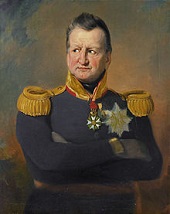










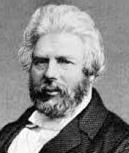









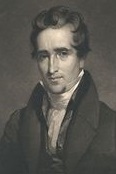

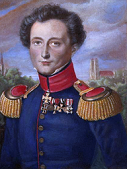
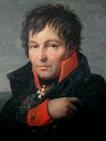
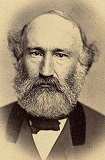
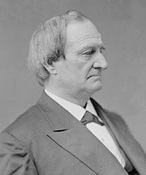
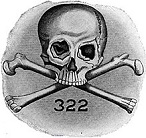



















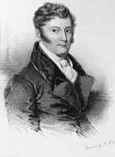

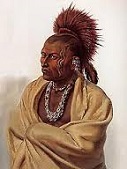
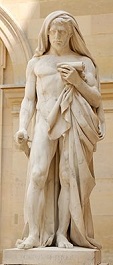
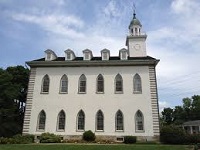
1832 The first U.S. cholera epidemic occurs in New York City; the European cholera pandemic reaches Scotland. After reaching one-third of the pop. of the Am. colonies by 1750, then accelerating in 1830, there are 10K+ German immigrants in the U.S., with immigration accelerating after the failed Revs. of 1848, reaching 200K by 1854, and 5M by 1900, bringing German culture with them, incl. love of beer, sauerkraut, bowling, the tuba, the Christmas tree, Santa Claus, and the Easter Bunny, along with a tradition of organized recreation on Sundays, which was forbidden by the Puritans, going on to found the first kindergarten and introduce physical and vocational education along with gymnasiums into public schools; in the late 19th cent. mass German immigration into New York City makes it the hub of bowling in the U.S. On Jan. 25 U.S. Sen. (DR-N.Y.) (1831-3) William Learned Marcy (1786-1857) gives a most williamly and marcily learned speech in the U.S. Senate defending his boss Pres. Jackson and his political patronage policies, with the immortal soundbyte: "We can see nothing wrong in the maxim that to the victors belong the spoils of the enemy", giving Jackson's "Spoils System" a name at last; big man Marcy resigns from the Senate and is elected N.Y. gov. #11, serving from Jan. 1, 1833 until Dec. 31, 1838. On Feb. 28 after El Salvadorian pres. Jose Maria Cornejo and Manual Jose Arce proclaim the separation of El Salvador from the Central Am Federation, federation troops under pres. Francisco Morazan attack San Miguel, El Salvador; on Mar. 17 the towns of Chalatenango in Metapan in El Salvador proclaim loyalty to the federation; on Mar. 14 the Battle of Jocoro is a V for the federals, followed by another V on Mar. 28 in San Salvador; Cornejo is taken POW, and Morazan takes control of El Salvador, calling for elections, which on July 25 elect Mariano Prado as pres. and Joaquin de San Martin as vice-pres. (until July 1, 1833); meanwhile the Insurrection of the Nonualcos ("mutes") (ends 1833) in El Salvador against forced labor, land seizure, oppressive taxes and landlords is led by Nonualco chief Anastasio Martir "Indio" Aquino (1792-1833), who assembles an army of 2K-5M men armed mostly with lances instead of firearms, attacking the hacienda in Jalponguita and advancing along the Comalapa and Lempa Rivers. On Mar. 8 Joseph Smith Jr. establishes the First Presidency (Quorum of the Presidency of the Church), the highest governing body of the LDS Church, consisting of Jesse Gause (785-1836) (until Dec. 3) and Sidney Rigdon (1793-1876) (until summer 1844); on Mar. 18, 1833 Rigdon is promoted from Second to First Counselor in the First Presidency. On Mar. 9 Abraham Lincoln (1809-65), who moved to New Salem, Ill. in Sangamon County in 1831 makes his first political speech while running for the state assembly; he loses, but plans to run again; meanwhile he works as a rail-splitter, postmaster, storekeeper, surveyor, and Indian suppresser. On Mar. 10 law prof. Jose Ignacio de Marquez Barreto (José Ignacio de Márquez) (1793-1880) of the Moderate Liberal Party becomes pres. of New Granada (Colombia) (until Oct. 7). On Mar. 17 the Siebener Concordat of the liberal Swiss cantons vows to mutually guarantee their new constitutions and begin action to revise the federal pact to make the central govt. stronger, causing the conservative cantons to create the League of Sarnen to resist them and maintain the 1815 status quo. This is the world we live in, let's make it a place worth living in, yah, or, Where's your crown? On Mar. 22 One-Man God Squad Johann Wolfgang von Goethe (b. 1749) dies in Weimar, and due to an excess of educated German males resulting from decades of compulsory school attendance that causes a rush into "free professions", the cream of the poets and novelists of Germany, incl. Paris exiles Heinrich Heine (1797-1856) and Karl Ludwig Borne (Börne) (Borne) (1786-1837), Christian Ludolf Weinbarg (1802-72), Karl Ferdinand Gutzkow (1811-78)>, Heinrich Laube (1806-84), Theodor Mundt (1808-61), Karl Immermann (1796-1840), Karl Georg Buchner (Büchner) (1813-37), Georg Friedrich Rudolph Theodor Herwegh (1817-75), Ferdinand Freiligrath (1810-76), Willibald Alexis (Georg Wilhelm Heinrich Haring) (Häring) (1798-1871), Adolf Glassbrenner (1810-76), and August Heinrich Hoffmann von Fallersleben (Hoffmann von Fallersleben) (1798-1874) form the old-people-shouldn't-drive Young Germany Movement, which attacks the reactionary govt., the Church, and apolitical Romanticism, promoting democracy, socialism, rationalism, separation of church and state, emancipation of the Jews, and increased rights for women, getting their pubs. banned in Dec. 1835 by the Frankfurt Bundestag; meanwhile Heinrich Heine (1797-1856), his brain squirming like a toad with the 1830 July Rev. skipped to Paris last year and gave up Romanticism for a more killer on the road mentality, staying there for life with his illiterate Paris shop girl babe Crescence Eugenie "Mathilde" Mirat, making only two short visits to Germany; too bad, after the wet dream year of 1848, the Young Germans turn old in a flash and descend into Schopenhauer-quoting pessimism? I have an army, do you? You show me yours and I'll show you mine? On Mar. 23 the U.S. Supreme (Marshall) Court rules 6-1 in Worcester v. Ga. that Ga. cannot pass a law making it a crime for non-Native Ams. to trespass on Native Am. lands, declaring that the U.S. govt. is the sole authority to deal with Native Am. nations, and that the embattled Cherokee Nation is a "distinct political community" within which Ga. law has no force, founding the doctrine of tribal sovereignty, pissing-off Pres. Jackson, who sides with Georgia and utters the soundbyte: "Marshall has made his decision, now let him enforce it", allowing Ga. to keep squeezing the hapless Cherokees - wait until the 1960s for the Court to get its racial decisions enforced by a U.S. pres.? On Mar. 24 a mob in Hiram, Ohio tars and feathers Mormon leaders Joseph Smith Jr. and Sidney Rigdon. On May 9 the Treaty of Payne's Landing in Fla. is signed by the U.S. and several Seminole chiefs, who agree to move W to Creek land in Ark. by Jan. 1, 1836 if suitable new land is found; in Oct. seven chiefs leave to tour it; the U.S. Senate ratifies the treaty in Apr. 1834. On May 14 after Sac (Sauk) chief Black Hawk (1767-1838) leads his British Band of about 50 Sac and Fox Indian warriors across the Mississippi River into Ill. to attack white settlers in the lands purchased for peanuts (stolen) from them, the Battle of Stillman's Run (Sycamore Creek) (Old Man's Creek) in Stillman Valley, Ill. sees 275 Ill. militia led by Mass.-born Maj. Isaiah Stillman (1793-1861) attack the redskins even though they carry a white flag, then flee in panic after 12 are killed, spreading news among the whites of a terrible massacre, and starting the Black Hawk War; after being defeated near the Wisconsin River on July 21, the Battle of Bad Axe on Aug. 1-2 is a thinly-disguised genocide of the Fox and Sauk nations in Ill. and Wisc., as starving Indians incl. women and children are massacred while attempting to flee back across the Mississippi River; Maj. Isaiah Stillman, Jefferson Davis of the regular army, and Capt. Abraham Lincoln of the Ill. volunteers participate; on Aug. 27 Black Hawk is captured, and his people settle on a rez in Iowa near Ft. Des Moines (Fr. "of the monks"); to rub it in James G. Edwars later suggests calling Iowa the Hawkeye State in honor of Black Hawk. On May 21 after 17 years in Europe, New York City-born writer Washington Irving (1783-1859) returns to New York City, and in the summer he goes on a surveying mission deep into Indian Territory (modern-day Okla.) with U.S. commissioner on Indian affairs Henry Leavitt Ellsworth, Charles La Trobe, and Count Albert-Alexandre de Pourtales, returning to pub. the bestseller A Tour on the Prairies, containing the first pub. description of the area around Stillwater, Okla., "a glorious prairie spreading out beneath the golden beams of an autumnal sun. The deep and frequent traces of buffalo, showed it to be a one of their favorite grazing grounds." On May 21-23 the Democratic-Republicans (modern Democrats), the party of the common man hold their 1832 Dem. Nat. Convention in Baltimore, Md. and renominate Andrew Jackson as pres., with Martin Van Buren of New York as vice-pres.; the Democrats never officially adopt a donkey as their emblem, but it fits? On May 27 mass demonstrations of 20K+ are held in Hambach, Germany at the ruins of Hambach Castle in favor of liberalism and nationalism - visit your pharmacist and just say, "Oops, I crapped my pants"? The original Rael? In May the new free-love Saint-Simonian Socialist religous sect of Barthelemy (Barthélemy) Prosper Enfantin (1796-1864) (who wears a breast badge titled "Pere", claims to be the Chosen of God, and sends emissaries out looking for his Female Messiah) is shut down by the French govt., and he ends up going to Egypt, where he tries to stir up interest in starting a Suez Canal before returning to France and going bourgeois. On May 16 council pres. (since Mar. 13, 1831) Casimir Pierre Perier (b. 1777) dies, and on June 5-7 the June Paris Uprising (Rebellion) sees student-led republicans unsucessfully revolt against Louis-Philippe; portrayed in Victor Hugo's 1862 novel "Les Miserables". On June 6 English utiliarian founder Jeremy Bentham (b. 1748) dies, and on June 9 English physician Thomas Southwood Smith (1788-1861) publicly dissects him at the Webb St. School of Anatomy in London, arguing for the use of corpses for medical dissection and causing the 1832 Anatomy Act to be passed, permitting the state to seize unclaimed corpses from workhouses and sell them to surgical schools to prevent grave robbery. On June 7 the First Reform Act (Great Reform Act of 1832) (1832 Representation of the People Act), supported by Lord Brougham is finally passed in Britain, extending the franchise from 500K to 1M upper-middle class voters (still, only one in seven adult males qualify); each county in England and Wales now sends (instead of two and one) a number of reps. proportional to its pop.; the Irish Reform Act 1832 is also passed, giving Ireland 105 seats in Commons, and the £10 franchise is introduced in boroughs as well as the counties; Ireland continues to send two reps and Scotland one from each county. On June 10 the Battle of Anahuac near Anahuac, Tex., followed on June 25-26 by the Battle of Velasco in Fort Velasco, Tex. are the first blood drawn in the deteriorating peace between Texas and Mexico. On June 28 Egyptian forces under Mehmet Ali's eldest son Ibrahim Pasha (1789-1848) retake Damascus, which has been under Egyptian control since 1516 (until 1841), giving them control of all of Syria, after which they halt while Mehmet Ali tries to negotiate with the sultan, and when that fails, they march into Anatolia, threatening Konya, which is captured on Nov. 21, causing Sultan Mahmud II to send a large army to stop them. On June 28 the Germanic Confederation adopts the Six Articles, reasserting absolute sovereign authority of federal over state law, and threatening any liberal and radical activists with stern measures, beginning with the prohibition of all public meetings combined with police surveillance in July. On July 21 the Greek War of Independence (begun Mar. 6, 1821) ends after Bavarian teeny-bopper Otho, 2nd son of Louis I of Bavaria is offered the Greek throne by the great Euro powers, and (being young and romantic?) he accepts. On Oct. 7 gen. Francisco Jose de Paula Santander y Omana (Francisco José de Paula Santander y Omaña) (1792-1840) of the Liberal Party becomes pres. #5 of New Granada (Colombia) (until Apr. 1, 1837). In Oct. the nullificationists win the S.C. state elections, and a state convention meets in Nov., overwhelmingly adopting an Ordinance of Nullification on Nov. 24, forbidding collection of the duties after Feb. 1; John Caldwell Calhoun (1782-1850) is elected to the U.S. Senate, causing him to resign from the vice-presidency (first to resign from that position) on Dec. 28 in order to defend nullification on the Senate floor, where he becomes a leader in the states-rights movement and one of the "great triumvirate" of U.S. political orators along with Clay and Webster. On Nov. 15 after the Dutch leave a garrison in the citadel, led by David Hendrik, Baron Chasse (Chassé) (1765-1849), allowing them to bombard the town, the Siege of Antwerp by the French under Marshal Gerard begins, taking the citadel on Dec. 23 and returning it to Belgium; leaving the Belgium independent, although a formal treaty is not signed until 1839; Leopold I gives France several cannon in gratitude, and offers Gerard a sword of honor; a French monument to the dead is sculpted in 1897, but Antwerp refuses it, and it is placed in Tournai. On Nov. 26 the first public streetcar service begins in New York City, charging 12.5 cents. In Nov. the Andrew Jackson/Martin Van Buren ticket wins 55% of the nat. vote, with 219 electoral votes to Henry Clay's 49 and William Wirt's 9. On Dec. 2 Sam Houston is commissioned by Pres. Jackson to negotiate treaties with the Indian tribes in Texas for the protection of U.S. traders, and decides to move there, settling in a subdivision of Coahuila province of the 11-y.-o. Mexican Repub. (pop. 8M), containing 20K Anglos and 5K Hispanics; J.Q. Adams later claims that Houston and Pres. Jackson were in a conspiracy to steal Texas for the U.S. On Dec. 4 U.S. Pres. Andrew Jackson gives his Fourth Annual Message to Congress, announcing his attention to enforce the tariff but asking them to lower the rates; on Dec. 10 Jackson issues the Anti-Nullification Proclamation, prepared by secy. of state Edward Livingston, decrying the claim by states that they can nullify federal laws as an "impractical absurdity", saying, "Be not deceived by names: disunion by armed force is treason"; he then sends Gen. Winfield Scott with federal soldiers to Charleston Harbor to reinforce Ft. Moultrie and Castle Pinckney. On Dec. 21 the Egyptians under Ibrahim Pasha defeat the Turks at the Battle of Konya in Asia Minor 150 mi. S of Ankara on the W edge of the Plain of Lycaonia, opening their way to Istanbul, causing the sultan to beg for help from Britain and France, who turn him down because they're preoccupied in Belgium, leaving him no choice but to approach former enemy Russia, which unexpectedly accepts, sending 18K-40K men, which causes the Egyptians to back down and begin negotiating with the sultan; for this Greek ally Nicholas I of Russia forces the Turks to give him shipping rights - the road is clear for the Onassises? On Dec. 27 while living in Kirtland, Ohio, Mormon founder Joseph Smith Jr. announces a revelation calling upon church members to restore the practice of worshiping in temples, fulfilling Malachi 3:1, with the soundbyte: "Establish a house, even a house of prayer, a house of fasting, a house of faith, a house of learning, a house of glory, a house of order, a house of God"; the Kirtland Temple is dedicated on Mar. 27, 1836, becoming their first; after "Doctrines and Covenants" 109:20 specifies: "No unclean thing shall be permitted to come into thy house to pollute it", only adult males who have been ordained to the Melchizedek Priesthood are allowed to enter a temple, along with their wives, but only after receiving a Temple Recommend issued by the bishop or stake pres. after a solemn worthiness interview, featuring 14 questions; meanwhile Joseph Smith Jr. and Sidney Rigdon receive a revelation about the Three Degrees (Kingdoms) of Glory (Three Heavens) for people after they are resurrected from the spirit world, incl. the celestial kingdom, terrestrial kingdom, and "telestial kingdom"; those who have committed the unpardonable sin will be banished to outer darkness with Satan as Sons of Perdition. Mamluk rule of Iraq (since 1747) is ended with the overthrow of the Mamluk ruler, and it comes under direct Turkish rule. The Algerians under Sufi Muslim leader Abdelkader ibn Muhieddine El Djezairi (1808-34) begin a revolt against the French. Muslim Caucasian resistance Ghazi Mollah dies at the Battle of Gimry, and only two Murids escape, incl. new Caucasian imam #3 (until 1859) Shamil (Schamyl) (1797-1871), who becomes leader of the resistance. Britain occupies the Falkland Islands - I don't feel any happier, how about you? Louis Philippe fortifies Vincennes, France and turns it into a military depot with a large barracks, fortress and prison, whic later hosts noble notables incl. Henry IV, the Great Conde, Cardinal de Retz, Mirabeau, Duc d'Enghien, and even Mata Hari. The Irish Parliament is reformed to increase the number of members from 100 to 105 and give the middle class more power vis a vis the pro-English aristocracy. The New England Anti-Slavery Society in Boston, Mass. is founded by William Lloyd Garrison, demanding immediate and complete emancipation. Congress authorizes a commissioner of Indian affairs to direct the U.S. Bureau of Indian Affairs. The pillory (pilori) (carcan) (pranger) is abolished in France, followed by England in 1837, and the U.S. in 1839, except for Delaware, which keeps it until 1905. Ecuador annexes the Galapagos Islands. In 1832 the word "socialism" comes into use in England and France. The city of Fort Pierre, S.D. (modern-day pop. 2K) is founded as a trading post by St. Louis, Mo.-born fur trader Pierre Chouteau Jr. (Pierre Cadet Chouteau) (1789-1865) on the N side of the mouth of the Bad River to replace Fort Tecumseh (founded 1817). The Star-Ledger (originally the "Newark Daily Advertiser", then the "Newark Star-Eagle") is founded in Newark, N.J., becoming the largest newspaper in N.J., reaching a modern-day circ. of 114K daily and 359K on Sun. Swiss-born Barbizon School painter Johann Karl (Carl) (Jean-Charles) Bodmer (1809-93) accompanies German explorer Prince Alexaner Philipp Maximilian zu Wied-Neuwied (1782-1867) on an expedition down the Missouri River, painting Indian life all the way. The first horse-drawn trolleys begin operation in New York City. The first French railroad line (from St. Etienne to Andrézieux) (opened 1828) begins carrying passengers. The school board of Lancaster, Ohio attempts to block a railroad from coming to town with its learned observation: "Railroads and telegraphs are impossible and rank infidelity. If God had intended his intelligent creatures should travel at the frightful speed of 16 miles an hour by steam, he would clearly have foretold it in the holy prophets. It is a device of Satan to lead immortal souls down to Hell." The town of Broken Arrow, Okla. in NE Okla. is founded by Creeks expelled from Ala. along the Trail of Tears, who call it Rekackv (pr. thlee-KAWTCH-kuh), meaning broken arrow; in 1902 the Missouri-Kan.-Tex. Railroad builds a new town 5 mi. to the N (18 mi. SE of Tulsa). The town of Downers Grove, Ill. (modern-day pop. 48K) is founded by N.Y. evangelist Pierce Downer; the town's name is spelled with an apostrophe until 1873. Burgos, once the capital of Castile-Leon becomes the capital of the province of Burgos. The city of Saint (St.) Paul, Minn. (originally named Pig's Eye) (modern-day pop. 285K/3.5M) is first settled by 1-eyed Pierre "Pig's Eye" Parrant (Parent); it is incorporated on Mar. 4, 1854. Ft. Pierre Chouteau (later Ft. Pierre) in S.D. on the Missouri River 200 mi. E of Rapid City and 4 mi. S of the geographic center of N. Am. is founded, named after French Creole fur trader Jean Pierre Chouteau Sr. (1758-1849), who with his half-brother Rene August Chouteau Jr. (1749-1829) (founder of St. Louis, Mo.) are known as "the river barons", holding monopoly rights in the fur trade with the Osage. British explorer Brian Houghton Hodgson (1800-94) pub. his experiences in N Nepal incl. the first report of the Yeti, which he concludes is an orangutan; the term "Abominable Snowman" is coined in 1921. Henry Schoolcraft returns to N Minn. (1st time 1820) and discovers the true source of the Mississippi River in Lake Itasca (Lat. "veritas caput" = true head) in NW Minn.; later Schoolcraft River, the first major tributary is named in his honor. Future British Queen Victoria writes about her delight in her German Christmas tree, complete with lights, ornaments, and presents underneath; after her 1841 marriage to Prince Albert, the Christmas tree custom begins to spread, and in 1848 the Illustrated London News pub. an image of the British royal family with their Christmas tree at Windsor Castle, creating a sensation, causing it to be repub. in the U.S. in 1850, doing ditto; by the 1870s Christmas trees are common in the U.S. The Campbellites and Stoneites join in fellowship with a handshake, becoming known as the Stone-Campbell Movement and calling themselves the Church (Disciples) of Christ. After converting to Methodism in 1823, then reading the Book of Mormon in 1830, Whittingham, Vt.-born traveling carpenter Whittingham, Vt.-born Brigham Young (1801-77) (four brothers) joins the LDS Church, and travels to Upper Canada as a missionary, losing his first wife (since Oct. 8, 1824) Miriam Angeline Works (1806-32) a few mo. after they are baptized; after becoming a polygamist, he marries 54 more, fathering 59 children by 16 of them, of which 46 reach adulthood, later claiming that when he first heard about plural marriage "It was the first time in my life that I desired the grave" - bring 'em young, bring 'em old? After a dispute over Phi Beta Kappa awards, the Order of the Skull & Bones secret society is founded at Yale U. by William Huntington Rusell (1809-85) and Alphonso Taft (1810-91), going on to develop a rep for association with the power elite and being associated with the 13 Family Bloodlines of the Illuminati; only 15 white male Yale seniors, are invited each year, and initiates must swear an oath of secrecy in the Skull and Bones Tomb, where meetings are held every Thur. and Sun. evening; Masonic-type initiation rites incl. kissing a skull, which was dug up in WWI by a group of Army volunteers from Yale stationed at Ft. Sill, Okla., who believe it to be the skull of Geronimo, which was was buried there in 1909; it goes coed in 1992; members (Bonesmen) incl. U.S. Pres. William Howard Taft, U.S. Chief Justice Morrison R. Waite, U.S. Pres. George H.W. Bush, U.S. Pres. George W. Bush, CIA founder James Jesus Angleton, Time Life founders Henry Luce and Briton Hadden, U.S. Sen. John Kerry, Morgan Stanley co-founder Harold Stanley, and FedEx founder Frederick W. Smith. Millard Fillmore is elected to the U.S. House of Reps. from N.Y.'s 32nd District, taking office next Mar. 4 (until Mar. 3, 1843). Scottish-born William Chambers of Glenormiston (1800-83) founds the weekly 1-penny Chambers's Edinburgh Journal, which is joined by his brother Robert Chambers (1802-71), and becomes a success, reaching a circ. of 84K; in 1854 it becomes "Chambers's Journal of Literature, Science and the Arts"; it folds in 1956. Revivalist Charles G. Finney settles down in New York City, where he becomes pastor of the Second Presbyterian Church, moving to the Broadway Tabernacle in 1835-7, then becoming prof. of theology at Oberlin College in Ohio, rising to pres. in 1851-66. Harriet Beecher Stowe's father moves from Conn. to Cincinnati, Ohio, and she visits plantations in Ky., confirming her opposition to slavery, going on to marry Calvin Stowe and have six children before writing her Big Two in 1852 and 1856. John James Audubon lives in the Audubon House in Key West, Fla. while painting the wildlife of the Florida Keys. Robert Smith Surtees (1803-64) of Durham becomes ed. of the New Sporting Mag. in England (until 1837), contributing humorous articles about the sporting experiences of a cockney grocer named Jorrocks, which are a big hit. Amalie Sieveking (1794-1859) founds the Women's Assoc. for the Care of the Poor and the Sick to send bourgeois women into the homes of lower-middle-class families to teach them virtue and cleanliness. Charles Philipon founds Le Charivari. Presbyterian Lane Theological Seminary in Walnut Hills, Cincinnati, Ohio is founded, with Lyman Beecher (1775-1863) as pres. #1, who takes the pro-slavery side in divisive debates in 1834, refusing to let African-Am. take classes, resulting in the Lane Rebels, incl. 50 students, a prof., and a trustee being dismissed and heading for Oberlin College; also in 1834 Beecher pub. the anti-Catholic tract "A Plea for the West", after which the Ursiline Sisters convent is burned. Am. physician Samuel Gridley Howe founds Perkins Inst. for the Blind in Boston, Mass., named after wealthy blind Boston merchant Col. Thomas Handasyd Perkins (1764-1854), later made famous by Hellen Keller. The Penny Mag. is founded in England to bring knowledge to da pooh people. M. Welte and Sons is founded in Vohrenbach in the Black Forest of Germany by Michael Welte to produce high quality musical instruments, going on to produce orchestrions (music roll machines) starting in 1850. Architecture: The Maine State Capitol in Augusta, designed by Charles Bulfinch of Boston is built. Moritz von Schwind (1804-71) decorates the Tieck Room in the Royal Palace of Vienna (1832-4). Inventions: James Bogardus (1800-74) of New York City invents the Eccentric Universal Mill, used for grinding lenses and finishing ball bearings. The Cigarette is invented by an Egyptian artilleryman in the Egyptian-Turkish War after first inventing the use of paper tubes for holding cannon gunpowder rounds. Walter Hunt (1796-1859) of New York City invents a true sewing machine, introducing an eye-pointed needle and interlocked stitch, but refuses to apply for a patent because of fear of "injuring society" by throwing seamstresses out of work (either that or he gets snubbed by a few investors); meanwhile he has many other inventions under development, incl. the safety pin (which he sells for $400), knife sharpener, fountain pen, street sweeping machine, revolver, and repeating rifle. Irish inventor John Howard Kyan (1774-1850) patents the Kyanizing Process for preserving wood, canvas, cloth etc. using a solution of bichloride of mercury. Belgian physicist Joseph Antoine Ferdinand Plateau (1801-83) invents the Phenakistoscope (spindle-viewer), the first moving picture device. Austrian Jewish confectioner Franz Sacher (1816-1907) of Vienna invents Sachertorte chocolate cake with apricot jam for Austrian chancellor Klemens Wenzel von Metternich, making Vienna famous as the place to get your sugar and chocolate fix along with your caffeine and tobacco fix; it is later served at the Hotel Sacher. English physicist William Sturgeon (1783-1850) invents the first DC Electric Motor with a Commutator. Science: Hungarian mathematician Janos Bolyai (1802-60) pub. his system of non-Euclidean geometry. Michael Faraday pub. a pictorial representation of electric and magnetic lines of force, introducing the Field Concept into physics, showing radial instead of straight field lines, rocking the scientific world. French mathematician Evariste (Évariste) Galois (b. 1811) dies on May 31 in Paris after a duel, leaving revolutionary papers giving necessary and sufficient conditions for the solution of equations by radicals using invariant (normal) subgroups, founding mathematical Group Theory; super-mathematician Gauss looks the stuff over and shrugs it off? English physicist Joseph Henry (1797-1878) discovers self-induced currents (inductance). English paleontologist Gideon Algernon Mantell (1790-1852) discovers the Hylaeosaurus in Tilgate Forest, England, becoming the 3rd dinosaur to be named. Baron Karl von Reichenbach discovers creosote in coal tar, along with pittacal (Gr. "tar + beautiful"), the first synthetic dye to be produced commercially, after he tries putting creosote on posts to keep dogs from pissing on them, and notes a dark blue deposit when they do it anyway; yellow crystalline eupittone is obtained from the oxidation of pittacal - dog piss jokes here? Weber's Law of just-noticeable differences is pub. by German physicist Wilhelm Eduard Weber (1804-91). German chemists Friedrich Wohler (Wöhler) (1800-82) and Justus von Liebig (1803-73) pub. a collaborative study of oil of bitter almonds (benzaldehyde), establishing the existence of organic radicals. Nonfiction: Louis Agassiz (1807-73), Researches on Fossil Fishes (5 vols.) (1832-42); prof. of natural history at the U. of Neuchatel (1832-46). William Alexander Alcott (1798-1856), The Young Man's Guide. Albert Barnes (1798-1870), Notes on the New Testament, Explanatory and Practical (6 vols.) (1832-51); bestseller (1M copies). Andres Bello (1780-1865), Principios de Derecho Internacional (Principles of Internat. Law). Cesare Cantu (1804-95), La Lombardia nel Secolo XVII; pisses-off the Austrians, getting him imprisoned for over a year, during which he writes a novel about a fellow prisoner using a toothpick and carbon black (pub. 1838). Thomas Carlyle (1795-1881), Sartor Resartus (The Tailor Retailored) (Boston); preface by Ralph Waldo Emerson; first pub. in Fraser's Mag. (1833-4); an unnamed editor attempts to introduce the British public to Diogenes Teufelsdrockh, German philosopher of clothes, known for his outlandish philosophy, a disguised attack on Utilitarianism and commercialization of society; the "Everlasting No", the "Centre of Indifference", and the "Everlasting Yea". Carl von Clausewitz (1780-1831), On War (Vom Kriege) (3 vols.) (posth.); ed. and pub. by his wife Countess Marie von Bruhl (1779-1836); a prof. soldier, disciple of Prussian Gen. Gerhard Johann David Waitz von Scharnhorst (1755-1813) who spent most of his life fighting Napoleon while educating himself on history, art, and science gives his analysis of war based on a dialectical method, with the gen. message being that "the conduct of war could not be reduced to universal principles", and that war belongs fundamentally to the social realm, not the realms of art or science; "War is not merely a political act, but also a real political instrument, a continuation of political commerce, a carrying out of the same by other means", i.e., an instrument of Politik (policy + politics); the two main objectives of war are to achieve limited aims, and to disarm the enemy (render him politically helpless or militarily impotent); all else being equal, the war will tend to favor the side with the stronger emotional or political motivations, and the defender; discusses "military genius", "critical analysis", "the fascinating trinity" (Wunderliche Dreifaltigkeit), "absolute or ideal war" vs. "real war", "the fog of war"; strategic and operational "centers of gravity"; "the culiminating point" of the offensive or the victory; never uses the term "total war", but later disciples read it between the lines; meanwhile the work makes him "the preeminent military and political strategist of limited war in modern times." (Robert Osgood) - pull up to the boy's club in one of these? ?, Boswell's Johnson. Walter Cooper Dendy (1794-1871), On the Phenomena of Dreams and Other Transient Illusions. John Bovee Dods (1795-1872), Twenty-Four Short Sermons on the Doctrine of Universal Salvation. William Dunlap (1766-1839), History of the American Theatre. Johann Peter Eckermann (1792-1854) (ed.) Goethe's Nachgelassene Schriften (Goethe's Last Writings) (1832-3). Anselm von Feuerbach (1775-1833), Kasper Hauser, Beispiel eines Verbrechens am Seelenleben des Menschen. Erik Gustaf Geijer (1783-1847), Svenska Folkets Historia (3 vols.) (1832-6); Swedish history until 1654. Washington Irving (1783-1859), A Tour on the Prairies; incl. the first pub. description of the area around Stillwater, Okla., "a glorious prairie spreading out beneath the golden beams of an autumnal sun. The deep and frequent traces of buffalo, showed it to be a one of their favorite grazing grounds." Adoniram Judson, The New Testament in Burmese; first-ever. Richard Lemon Lander (1804-34), Journal of an Exhibition to Explore the Course and Termination of the Niger. Harriet Martineau (1802-76), Illustrations of Political Economy (1832-4); makes her a celeb. and gains her entrance into the circle of Thomas Malthus, Thomas Carlyle, Henry Milman, and George Eliot. Barthold Georg Niebuhr (1776-1831), Roman History, Vol. 1 (posth.). Sir Francis Palgrave (1788-1861), The Rise and Progress of the English Commonwealth. Isidore Geoffrey Saint-Hilaire (1805-61), Histore Generale et Particuliere des Anomalies de l'Organisation chez l'Homme et les Animaux (1832-7); giant work on teratology (monsters). Philip Stanhope, 5th Earl Stanhope (1805-75), History of the War of the Succession in Spain. Alexis de Tocqueville (1805-59), Du Systeme Penitentiaire aux Etats-Unis et de son Application. Frances Trollope (1780-1863), Domestic Manners of the Americans (2 vols.); nets him £900 the first year in royalties, but he ends up bankrupt in England by 1834, fleeing to Belgium to avoid prison. Richard Whately (1787-1863), A View of the Scripture Revelations Concerning a Future State; advances the belief in Christian mortalism (soul sleep). Music: Hector Berlioz (1803-69), Symphonie Fantastique, Op. 14 (rev. version) (Paris). Frederic Chopin (1810-49), Etude Op. 10, No. 3 (Tristesse); his most beautiful melody, he thinks. Gaetano Donizetti (1797-1848), L'Elisir d'Amore (comic opera) (May 12) (Teatro della Canobbiana, Milan); libretto by Felice Romani; written in six weeks; becomes the most performed opera in Italy in 1838-48; incl. the tenor aria Una Furtiva Lagrima (A Secret Tear). Jacques Fromental Halevy, La Tentation (opera). Ferdinand Herold, Le Pre aux clercs (Paris). Felix Mendelssohn (1809-47), The Hebrides Overture (Fingal's Cave); inspired by Fingal's Cave, the Scottish side of the Giant's Causeway on Staffa (Pillar) Island. Filippo Taglioni, La Sylphide; the first Romantic ballet, written for his daughter Marie, who dances the title role in a new costume that features a light white skirt ending halfway between knee and ankle, leaving arms, neck and shoulders bare. Art: George Catlin, Portrait of Chief Lone Horn [1790-1875]; chief of the Minneconjou Teton Lakota in S.D.; wears a single shell (horn) around his neck as an heirloom from his father. John Constable (1776-1837), Waterloo Bridge from Whitehall Stairs. Ando Hiroshige (1797-1858), Fifty-three Stages of the Tokaido (Ukiyoe). Jean-Baptiste Roman (1792-1835), L'Innocence (sculpture); a nude girl holds a lizard, symbol of innocence; Caton d'Utique lisant le Phédon avant de se donner la mort (sculpture); finished by his friend Francois Rude (1784-1855); Cato of Utica Reading the Phaedo of Plato on the Death of Socrates Before Committing Himself to Death (sculpture); finished by his friend Francois Rude; big hit among French revolutionaries. John Trumbull (1756-1843), Death of General Montgomery. Plays: Casimir Delavigne (1793-1843), Louis XI. Alexandre Dumas pere and Gaillardet, Teresa la Tour de Nesle. Johann Wolfgang von Goethe (1749-1832), Faust, Pt. 2 (posth.) (Pt. 1 in 1808); about medieval magician Johann Faust; a poodle turns into something evil?; Goethe's masterpiece; the first great work of modern lit.?; "Wenn ihr's nicht fühlt, ihr werdet's nicht erjagen" (If you don't feel it, you'll never get it). Victor Hugo (1802-85), The King Amuses Himself (Le Rois s'Amuse); the source for Verdi's Rigoletto. Karl Immermann (1796-1840), Alexis (tragedy). Fanny Kemble (1809-93), Francis the First. Poetry: J.Q. (John Quincy Adams (1767-1848), Dermot MacMurrogh; about mean Henry II; associates the Roman Catholic Church with English aggression; the first U.S. pres. to publish poetry. Adolf Ivar Arwidsso (1791-1858), Ungdoms Rimfront. Theophile Gautier (1811-72), Albertus. Leigh Hunt (1784-1859), Poetical Works. Adam Mickiewicz (1798-1855), The Books of the Polish Nation and of Polish Pilgrimage. Novels: Karl Almqvist (1793-1866), The Book of the Thorn-Rose; a group of romances which make him an instant hit, which is good since in 1813 he left his secure Swedish civil job to start his own hippie, er, cooperative commune in Varmland, which went bust; too bad, after years on top, in 1851 he gets charged with forgery and murder and takes a hike to the U.S, where he ekes out a living under an alias until 1865, then moves to Bremen, eking on under the name C. Westermann until his death - you're dangerous baby, zow? Honore de Balzac (1799-1850), Le Colonel Chabert. Jules Amedee Barbey d'Aurevilly (1808-89), Lea (Léa). Edward George Bulwer-Lytton (1803-73), Eugene Aram. Benjamin Disraeli (1804-81), Contarini Fleming (autobio. novel). John Galt (1779-1839), The Member; The Radical; Stanley Buxton (3 vols.). Washington Irving (1783-1859), The Alhambra. John Pendleton Kennedy (1795-1870), Swallow Barn (first novel); rural Va. life. Nikolaus Lenau (1802-50), Gedichte (Stuttgart); dedicated to Gustav Schwab (1792-1850). Samuel Lover (1797-1868), Legends and Stories of Ireland (first book); illustrated with his own etchings. Charles Nodier (1780-1844), La Fee aux Miettes; Souvenirs de Jeunesse. James Kirke Paulding (1778-1860), Westward Ho! Silvio Pellico (1788-1854), Le Mie prigioni. George Sand (1804-76), Indiana (first solo novel, under her real name Amantine Aurore); Valentine. Charlotte Elizabeth Tonna (1790-1846), Combination (first novel). Frances Trollope (1780-1863), The Refugee in America. Alfred de Vigny (1797-1863), Stello; a philosophical dialogue between Dr. Noir (the Black Doctor) and Stello that examines the relation of poetry to society and concludes that the poet is doomed to be regarded with suspicion in every social order and must "separate poetic life from political life". Births: Am. Army scout Thomas Jefferson "Tom" Jeffords (d. 1914) on Jan. 1 in Chautauqua County, N.Y.; friend of Cochise. French engraver-illustrator Paul Gustave Louis Christophe Dore (Doré) (d. 1883) on Jan. 6 in Strasbourg. Am. "Ragged Dick" dime novelist (child pederast?) Horatio Alger Jr. (d. 1899) on Jan. 13 in Chelsea, Mass.; descendant of Pilgrim Robert Cushman; grows up in Marlborough, Mass.; educated at Harvard U. British diplomat Horatio Nelson Lay (d. 1898) on Jan. 23 in Forest Hill, Kent. French Impressionist "Olympia", "Luncheon on the Grass" painter Edouard Manet (d. 1883) on Jan. 23 in Paris; studies in the Ecole des Beaux-Arts under Thomas Couture; influenced by but does not exhibit with the Impressionists; turns everyday scenes into caricatures of the future big screen of cinema using simple colored areas and summary brush strokes used in small sketches; his favorite model is Victorine Meurent (1844-1927). Am. atty.-diplomat Joseph Hodges Choate Sr. (d. 1917) on Jan. 24 in Salem, Mass.; educated at Harvard U. U.S. Supreme Court justice #53 (1892-1903) George Shiras Jr. 9d. 1924) on Jan. 26 in Pittsburgh, Penn.; educated at Ohio U., and Yale U. English "Alice's Adventures in Wonderland" 6'0" mathematician-logician-writer-poet Lewis Carroll (Charles Lutwidge Dodgson) (d. 1898) on Jan. 27 in Daresbury, Cheshire; educated at Rugby School, and Oxford U.; deaf in one ear; has a stammper; teaches math at Oxford; likes to write standing up; good photographer who likes to take pictures of you-know-who (Alice Liddell). Am. Civil War Confed. brig. gen. and Dem. gov. #53 of Ga. (1886-90) John Brown Gordon (d. 1904) on Feb. 6 in Upson County, Ga. English "On Megrim" migraine physician Edward Liveing (d. 1919) on Feb. 8 in Nayland, Suffolk; brother of George Downing Liveing (1827-1924); educated at King's College, London, and Caius College, Cambridge U. U.S. Sen. (R-Colo.) (1879-85) and chemist Nathaniel Peter Hill (d. 1900) on Feb. 18 in Montgomery, N.Y.; educated at Brown U. Am. Methodist Episcopal bishop John Heyl Vincent (d. 1920) on Feb. 23 in Tuscaloosa, Ala.; founder of the Chautauqua Assembly (1874). Am. Arctic explorer-physician Isaac Israel Hayes (d. 1881) on Mar. 5 in Chester County, Penn.; educated at the U. of Penn. Spanish "The Three-Cornered Hat" novelist-politician Pedro Antonio de Alarcon y Ariza (d. 1891) on Mar. 10 in Guadix (near Granada); councilor to Alfonso XII. Am. statesman John Owens Dominis (d. 1891) on Mar. 10 in Schenectady, N.Y.; husband (1862-91) of Hawaiian Queen Liliuokalani (1838-1917). French chemist Charles Friedel (d. 1899) on Mar. 12 in Strsbourg; educated at the U. of Strasbourg, and Sorbonne; student of Louis Pasteur; father of Georges Friedel (1865-1933). Am. "Testimonies Concerning Slavery" abolitionist humanist journalist-historian (Unitarian) Moncure Daniel Conway (Gael. "holy river") (d. 1907) on Mar. 17 in Falmouth, Stafford County, Va.; wealthy slaveholder father; educated at Dickinson College, and Harvard U.; husband of Ellen Davis Dana (-1897). Am. Civil War Union Gen., atty., Ind. state rep., judge, U.S. postmaster gen. #31 (1883-4), U.S. treasury secy. #35 (1884), U.S. secy. of state #33 (1893-5) Walter Quintin Gresham (d. 1895) on Mar. 17 near Lanesville, Ind. Hungarian traveler-writer (Jewish) Armin Vambery (Hermann Bamberger) (d. 1913) on Mar. 19 in Duna-Szerdahely; masters 12 languages by age 16. French vice-adm. Abel-Nicolas Georges Henri Bergasse Dupetit Thouars (d. 1890) on Mar. 23 in Bordeaux-Les-Rouches; maternal nephew of Abel Aubert Dupetit Thouars (1793-1864). Scottish painter Sir William Quiller Orchardson (d. 1910) on Mar. 27 in Edinburgh; descended from the Urquhartsons of Loch Ness. U.S. rep. (D-Tex.) (1883-92) and U.S. sen. (D-Tex.) (1892-9) Roger Quarles Mills (d. 1911) on Mar. 30 in Todd County, Ky. French PM (1879-81, 1883-5) Jules Francois Camille Ferry (d. 1893) on Apr. 5 in Saint Die (Vosges). U.S. Supreme Court justice #54 (1893-5) Howell Edmunds Jackson (d. 1895) on Apr. 8 in Paris, Tenn.; grows up in Jackson, Tenn.; educated at West Tenn. College, and U. of Va. English Wimshurst Machine inventor James Wimshurst (d. 1903) on Apr. 13 in Poplar. German "Max and Moritz" caricaturist-painter-poet (inventor of the comic strip?) Wilhelm Busch (d. 1908) on Apr. 15 in Wiedensahl (near Hanover). Spanish dramatist Jose (José) Echegaray y Eizaguirre (d. 1916) on Apr. 19 in Madrid. U.S. First Lady (1881) (Disciples of Christ) Lucretia Rudolph Garfield (d. 1918) on Apr. 19 in Garrettsville, Ohio; wife (1858-) of Pres. James Garfield. Am. journalist-politician and U.S. agriculture secy. #3 (1893-7) (founder of Arbor Day) Julius Sterling Morton (d. 1902) on Apr. 22 in Adams, N.Y.; raised in Detroit, Mich.; educated at the U. of Mich; father of Joy Morton (1855-1934). Am. Western historian and art collector Hubert Howe Bancroft (d. 1918) on May 5 in Granville, Ohio. German mathematician-physicist Carl Gottfried Neumann (d. 1925) on May 7. German mathematician Rudolf Otto Sigismund Lipschitz (d. 1903) on May 14. Am. meatpacking king Philip Danforth Armour (d. 1901) on May 16 in Stockbridge, N.Y.; brother of Herman Ossian Armour (1837-1901); father of Jonathan Ogden Armour (1863-1927). Am. architect William Robert Ware (d. 1915) on May 27 in Cambridge, Mass.; Unitarian minister father; educated at Harvard U.; first architecture prof. at MIT (1865); inventor of instant-runoff voting (1870). English "The Light of Asia" poet Sir Edwin Arnold (d. 1904) on June 10 in Gravesend, Kent; father of Edwin Lester Arnold (1857-1935); educated at University College, Oxford U. German internal-combustion engine inventor Nikolaus August Otto (d. 1891) on June 10 in Hozhausen an der Haide, Nassau; father of Gustav Otto (1883-1926). English chemist-physicist Sir William Crookes (d. 1919) on June 17 in London; educated at the Royal College of Chemistry; knighted in 1897; inventor of the Crookes (cathode ray) tube, radiometer, and spinthariscope (scintillation counter); discoverer of the element thallium. Am. politician and U.S. solicitor gen. #1 (1870-2) and U.S. treasury secy. #30 (1874-6) Benjamin Helm Bristow (d. 1896) on June 20 in Elkton, Ky.; educated at Jefferson College, Penn. Cuban Platt Amendment pres. #1 (1902-6) gen. Tomas (Tomás ) Estrada Palma (d. 1908) (b. 1835?) on July 9 near Bayamo. Am. astronomer Alvan Graham Clark (d. 1897) on July 10 in Fall River, Mass.; son of Alvan Clark (1804-87). Am. Theosophical Society co-founder Col. Henry Steel Olcott (d. 1907) on Aug. 2 in Orange, N.J.; first well-known person of Euro ancestry to convert to Buddhism, which he revives in Sri Lanka; educated at CCNY, and Columbia U. German psychologist ("Father of Experimental Psychology") Wilhelm Maximilian Wundt (d. 1920) on Aug. 16 in Neckarau, Baden. Am. inventor-balloonist ("America's 1-Man Civil War Air Corps") Thaddeus Sobieski Constantine "T.S.C." Lowe (d. 1913) on Aug. 20 in Jefferson Mills, N.H. Spanish pres. #4 (1873-4) Emilio Castelar y Ripoli (d. 1899) on Sept. 7 in Cadiz. Welsh lyric poet-musicologist ("the Robert Burns of Wales") John Ceiriog Hughes (d. 1887) on Sept. 25 in Llanarmon Dyffryn Ceiriog; #1 19th cent. Welsh poet. Am. architect ("Father of the American Skyscraper") William Le Baron Jenney (d. 1907) on Sept. 25 in Fairhaven, Mass.; educated at Harvard U. British field marshal (1895-) Frederick Sleigh "Bobs" Roberts, 1st Earl Roberts of Kandahar, Pretoria and Waterford (d. 1914) on Sept. 30 in Cawnpore, India; educated at Eton College, and Sandhurst; created baron in 1892 - bloody bloody pip pip and all that rot? U.S. First Lady (1889-92) Caroline Lavinia Scott Harrison (d. 1892) on Oct. 1 in Oxford, Ohio; wife (1953-) of Pres. Benjamin Harrison. Am. "Marching Through Georgia", "Kingdom Coming", "My Grandfather's Clock" composer-songwriter Henry Clay Work (d. 1884) on Oct. 1 in Middletown, Conn. German botanist Julius von Sachs (d. 1897) on Oct. 2 in Breslau, Prussia (Wroclaw, Poland). English anthropologist ("Father of Cultural Anthropology") (Quaker) Sir Edward Burnett Tylor (d. 1917) on Oct. 2 in Camberwell, London; knighted in 1912. U.S. Civil War Brig. Gen. Joseph Fulton Boyd (d. 1907) on Oct. 4 in Ohio. Am. "What a Friend We Have in Jesus" hymnodist-atty. Charles Crozat Coverse (d. 1918) (AKA C.O. Nevers, Karl Reden, E. C. Revons, Lesta Vese) on Oct. 7 in Warren, Mass.; eduated at Albany Law School. Am. Ariz. pioneer "Lord" Phillip Darrell Duppa (d 1892) on Oct. 9 in Kent, England; educated at Cambridge U.; emigrates to the U.S. in 1863. English poet-critic Theodore Watts-Dunton (d. 1914) on Oct. 12 in St. Ives, Huntingdonshire; friend of Algernon Charles Swinburne (1837-1909), whom he rescues from alcoholism, and Dante Gabriel Rossetti (1828-82). Am. orchestra conductor-violinist Leopold Damrosch (d. 1885) on Oct. 22 in Posen, Prussia; emigrates to the U.S. in 1871; father of Walter Damrosch (1862-1950). Am. Civil War Union gen. (inventor of asphalt pavement) William Woods Averell (d. 1900) on Nov. 5 in Cameron, N.Y. Am. Mormon leader Joseph Smith III (d. 1914) on Nov. 6 in Kirtland, Ohio; eldest surviving son of Joseph Smith Jr. (1805-44) and Emma Hale Smith (1804-79). Am. "A History of the Warfare of Science with Theology in Christendom" historian-educator and ambassador (to Russia and Germany) Andrew Dickson White (d. 1918) on Nov. 7 in Homer, N.Y.; educated at Hobart College, and Yale U. (Skull & Bones); classmate of Daniel Coit Gilman; co-founder and pres. #1 of Cornell U. (1866-85). French "Monsieur Lecoq" detective novelist Emile Gaboriau (d. 1873) on Nov. 9 in Saujon, Charente-Maritime. Am. physician Mary Edwards Walker (d. 1919) on Nov. 6 in Oswego, N.Y.; educated at Syracuse Medical College. Swedish Arctic (Northeast Passage) explorer Baron Nils Adolf Erik Nordenskjold (Nordenskjöld) (Nordenskiöld) (d. 1901) on Nov. 18 in Helsinki, Finland; uncle of Otto Nordenskjold (1869-1928). Am. pioneer (founder of Ft. Myers, Fla.) Manuel A. Gonzalez (d. 1902) on Nov. 24 in Asturias, Spain; emigrates to the U.S in 1846; becomes U.S. citizen in May 1859. English "Who's afraid of" writer-critic-philosopher and mountaineer Sir Leslie Stephen (d. 1904) on Nov. 28 in Kensington Gore, London; son of Sir James Stephen (1789-1859); educated at Eton College, King's College, London, and Trinity Hall, Cambridge U.; husband of Harriet Marian (1840-75) (daughter of William Makepeace Thackeray), and Julia Prinsep Jackson (1846-95); father of Laura Makepeace Stephen (1870-1945), Vanessa Bell (1879-1961), Thoby Stephen (1880-1906), Virginia Woolf (1882-1941), and Adrian Stephen (1883-1948); ed. #1 of "Dictionary of National Biography" (1885-91). Am. eyebrow and makeup-free eternal spinster "Little Women" novelist Louisa May Alcott (d. 1888) (AKA A.M. Barnard) on Nov. 29 in Germantown (near Philadelphia), Penn.; 2nd of four daughters of Transcendentalist philosopher Bronson Alcott (1799-1888); tutored by Ralph Waldo Emerson and Henry David Thoreau - do they teach her by conversing with her? Norwegian "Peasant Novels" poet-dramatist Bjornstjerne Martinus Bjornson (d. 1910) on Dec. 8 in Kvikne (near Trondheim). English "The Young Buglers" children's adventure novelist George Alfred Henty (d. 1902) on Dec. 8 in Trumpington, Cambridgeshire. French Eiffel Tower engineer ("the Magician of Iron") Alexandre Gustave Eiffel (Bonickhausen dit Eiffel) (d. 1923) on Dec. 15 in Dijon. Austrian archduke Ferdinand Maximilian Joseph (d. 1867) in Vienna; emperor of Mexico 1864-7. English painter Rebecca Solomon (d. 1886). Turkish statesman and field marshal Gazi ("victorious") Osman Nuri Pasha (d. 1900) in Tokat. French-German physicist-acoustician Rodolphe Koenig (d. 1901). Am. tinsmith (Mason jar inventor) John Landis Mason (d. 1902) in Vineland, N.J. English Cardinal (1893) and archbishop #3 of Westminster (builder of Westminster Cathedral) Herbert Vaughan (d. 1903). English logician-educator Thomas Fowler (d. 1904); friend of Lewis Carroll. English writer Edward James Stephen Dicey (d. 1911) in Leicestershire; educated at Trinity College, Cambridge U.; brother of Albert Venn Dicey (1835-1922). English children's writer Hesba Stretton (d. 1911). English philosopher (forerunner of Pragmatism) Shadworth Hollway Hodgson (d. 1912). Deaths: Am. Rev. War gen. Thomas "Gamecock" Sumter (b. 1734) on June 1; last surviving officer of the Am. Rev. War. Am. Rev. leader Charles Carroll of Carrollton (b. 1737) on Nov. 14 in Baltimore, Md.; last surviving signer of the DOI. English utilitarianism founder Jeremy Bentham (b. 1748) on June 6: "The greatest happiness of the greatest number is the foundation of morals and legislation." German poet #1 Johann Wolfgang von Goethe (b. 1749) on Mar. 22 in Weimar; last words: "Please close the window" or "More light"?; "No people are more hopelessly enslaved than those who falsely believe they are free"; "America, you have it better than our continent, the old one"; "We do not have to visit a madhouse to find disordered minds; our planet is the mental institution of this universe"; "If I were God, the suffering of the world would break my heart" (Psalms 69:20). Italian "Gradus ad Parnassum" pianist-composer Muzio Clementi (b. 1752) on Mar. 10 in Evesham, England. Am. poet-journalist ("Poet of the American Revolution") Philip Morin Freneau (b. 1752) on Dec. 18 in Matawan, N.J. Prussian statesman Christian von Haugwitz (b. 1752) on Feb. 9 in Venice, Italy. Italian anatomist Antonio Scarpa (b. 1752) on Oct. 30 in Pavia (bladder infection). German-born Am. frontier hero Phillip Hamman Sr. (b. 1753) on Aug. 3 near Fackler, Ala. English poet-naturalist George Crabbe (b. 1754) on Feb. 3 in Trowbridge. French pet Philibert Louis Debucourt (b. 1755) on Belleville. French physician-chemist Jean-Antoine Chaptal (b. 1756) on July 30 in Paris. German composer-conductor Karl Friedrich Zelter (b. 1758) on May 15 in Berlin; friend and musical adviser of Goethe. Am. shipping investor Isaac Wright (b. 1760) on Aug. 9 (cholera). German publisher Johann Friedrich Cotta (b. 1764) on Dec. 29 in Stuttgart. German statesman-writer Friedrich von Gentz (b. 1764) on June 9 in Vienna, Austria; "a wretched scribe" (Napoleon). Russian mathematician Timofei Osipovsky (b. 1765) on June 12 (June 24 Old Style) in Moscow. French economist Jean-Baptiste Say (b. 1767) on Nov. 15 in Paris. Italian composer Bonifacio Asioli (b. 1769) on May 18 in Coreggio - get your bony face out of my what? French scientist Baron Georges Cuvier (b. 1769) on May 13 in Paris (cholera). Spanish gen. Francisco Ballesteros (b. 1770) on June 29 in Paris (exile). Scottish "Ivanhoe" novelist Sir Walter Scott (b. 1771) on Sept. 21 in Melrose; buried in Dryburgh Abbey (founded 1150) in Berwickshire on the Tweed River along with his son-in-law John Gibson Lockhart: "Oh what a tangled web we weave when first we practice to deceive" - unwept, unhonored, and unsung? Spanish tenor composer-teacher Manuel Garcia (b. 1775) on June 2 in Paris. Am. frontiersman Maj. Andrew Henry (b. 1775) on Jan. 10 in Washington County, Mo. French Gen. Pierre Yrieix Daumesnil (b. 1776) on Aug. 17 (cholera). German physician (phrenology co-founder) Johann Kaspar Spurzheim (b. 1776) on Nov. 10 in Boston, Mass. (typhoid); dies on his first U.S. tour. French conservative statesman Casimir Pierre Perier (b. 1777) on May 16 in Paris. Karl Christian Friedrich Krause (b. 1781) on Sept. 27. German superstar actor Ludwig Devrient (b. 1784) on Dec. 30. German composer Friedrich Kuhlau (b. 1786) on Mar. 12. Danish philologist and comparative linguist Rasmus Rask (b. 1787). French Rosetta Stone decipherer Jean-Francois Champollion (b. 1790) on Mar. 4 in Paris. French Saint-Simonian technocrat Saint-Amand Bazard (b. 1791). Greek anti-Turk rev. leader Demetrios Ypsilanti (b. 1793). French physicist Nicolas Leonard Sadi Carnot (b. 1796) on Aug. 24 in Paris. French Group Theory mathematician Evariste Galois (b. 1811) on May 31 in Paris; dies of wounds from a duel - the good die young? French king of Rome (Napoleon's son) Napoleon II, duke of Reichstadt (b. 1811) on July 22 in Vienna; dies as a prisoner of Metternich in the Schonbrunn Palace; buried in the crypt of the Capuchin Church in Vienna; Hitler personally returns his remains to Paris on Dec. 15, 1940.
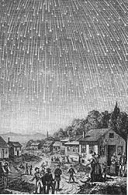
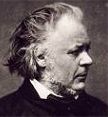









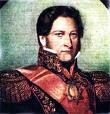







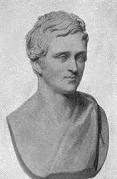



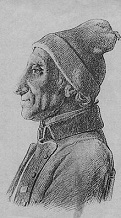





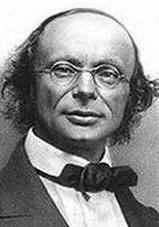
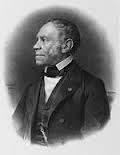



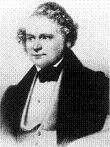
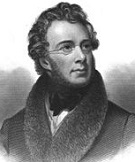

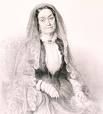



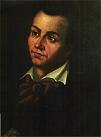





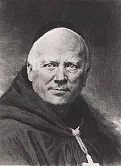




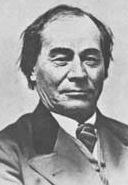
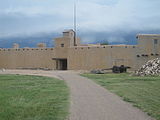
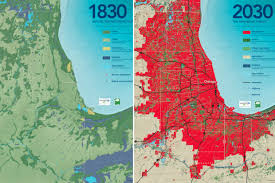
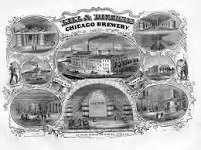
1833 On Jan. 1 the Indianapolis Journal prints the poem The Hoosier's Nest by John Finley (1797-1863) of Richmond, Ind., after which Ind. becomes known as the Hoosier State. In Jan. Honore (Honoré) Daumier (1808-79) is released from jail after serving a 6-mo. term for caricaturing King Louis-Philippe as Gargantua in a poster. In Jan. Pres. Jackson requests Congress to pass a U.S. Force Bill, authorizing him to use the U.S. army in S.C. against the nullificationists; before a mini-Civil War starts, the Clay Compromise, brokered by Tenn. Sen. Hugh Lawson White is reached when Henry Clay on Feb. 12 proposes a plan to reduce the tariff in half gradually by 1842; on Mar. 1 both the Force Bill and Tariff of 1833 pass in Congress, causing the S.C. convention to meet and rescind nullification, but only after nullifying the Force Bill, to save Southern face. On Feb. 15 (early a.m.)_ after taking Zacatecoluca, Anastasio Aquino and his rebels attack and sack San Vicente, El Salvador while Aquina goes to the Church of Nuestra Senor de Pilar and crowns himself king of the Nonualcos with a crown from an image of St. Joseph; on Feb. 16 after being proclaimed CIC of the liberation army, he issues the Declaration of Tepetitan (Tepetitán), ordering the death penalty for joining the govt. forces, and abolishing govt. taxes and forced labor, abolishing all debts contracted before the rebellion; too bad, the govt. strikes back, and after futile attempts to reach an agreement they attack the rebels at Santiago Nonualco with 5K men, defeating the rebels, who are being decimated by disease; Aquina flees, but after the govt. offers amnesty to anybody who betrays him, he is captured on Apr. 23, taken to Zacatecoluca, tried and convicted, and executed by firing squad in San Vicente on July 24, with his head displayed in an iron cage with the title "Example for rebels", which he becomes, but not in the way the govt. wants. On Feb. 16 the U.S. Supreme (Marshall) Court rules unanimously in Barron v. Baltimore that the Bill of Rights cannot be forced on the states, painting a target on their foreheads and leading to the 14th Amendment (1866) and the Incorporation Doctrine based on the Due Process Clause to short-circuit it. On Feb. 27 in Kirtland, Ohio, Joseph Smith Jr. issues A Word of Wisdom, counseling against the use of strong or hot drinks and tobacco by Mormons - interferes with the sex drive? On Mar. 2 after being asked by Pres. Jackson to investigate the nat. bank for concealed empty vaults, the U.S. House of Reps. passes a resolution affirming that govt. deposits are safe, which only causes Jackson to intensify his war on the "hydra of corruption", which has grabbed "almost entire dominion over the circulating medium, and with it, power to increase or diminish the price of property and to levy taxes on people in the shape of premiums and interest"; by the end of the year 23 "pet" state banks receive federal govt. deposits, pissing-off the Rothschild internat. banking family, who retaliate by restricting the money supply, causing a depression, which only makes Jackson more determined to beat them. On Mar. 4 U.S. Dem. pres. #7 (since Mar. 4, 1829) Andrew Jackson (1767-1845) is inaugurated for a 2nd term in the 12th U.S. Pres. Inauguration in the House chamber of the U.S. Capitol in Washington, D.C.; Kinderhook, N.Y.-born Martin (nee Maarten) Van Buren (1782-1862) ("the Little Magician") becomes the 8th U.S. vice-pres. (until Mar. 4, 1837); on May 29 Irish-born Philly atty. William John Duane (1780-1865) is appointed U.S. treasury secy. #11, but is dismissed on Sept. 22 for refusing Jackson's demand to transfer U.S. govt. deposits from the U.S. Bank to private banks, citing lack of authority from Congress; the Whig Party is formed to oppose "King Jackson" and his populist Dem. Party by Nat. Repubs. and Anti-Masonic dropouts, soon splitting into the Conscience Whigs in Northern states, who morally oppose slavery, and the Cotton Whigs in Southern states, who let their consciences relax when it comes to the New England textile industry. On Mar. 28 after a 3-hour, er, several-mo. tour, conferring with the Creeks, the seven Seminole chiefs sign the Treaty of Fort Gibson at Ft. Gibson in Ark. Territory that their new land is acceptable; too bad, when they return, they renege, claiming trickery or coercion, with Seminole leader Osceola uttering the soundbyte: "The white man shall not make me black. I will make the white man red with blood, and then blacken him in the sun and rain... and the buzzards live upon his flesh." In the spring England, France, and Russia conclude an armistice with Egypt for the evacuation of Anatolia (Asia Minor); Mehmet Ali now rules all of Egypt and Syria, and is proclaimed as the "Alexander of two horns", founding a dynasty that rules Egypt until 1952. On Apr. 1-3 the lily white Anglo Convention of 1833 in San Felipe drafts a constitution for Texas to be submitted to the Mexican Congress; on Oct. 1 it calls for the formation of a separate (as in gringo) state of Texas within the Mexican Repub. On Apr. 3 internat. liberals attempt to seize Frankfurt, Germany and dissolve the Diet, causing the Diet to appoint a central commission to crack down on them in June. On Apr. 22 Kalamazoo College in Kalamazoo, Mich. (original name Mich. and Huron Inst.)) is founded by a group of Baptist ministers; in 1837 it is renamed the Kalamazoo Lit. Inst.; in 1840 it merges with the U. of Mich.; in 1842 James Stone becomes pres. #1 (until 1863), adding a theological seminary and female dept., hosting the intial meeting in his home that founds the Repub. Party. On Apr. 29 the U. of Zurich is founded in Zurich, Switzerland from a merger of Huldrych Zwingli's Carolinum (founded in 1525) with a new faculty of philosophy, becoming the first univ. in Europe founded by a state rather than a monarch or a church; in 1839 German theologian David Friedrich Strauss (1808-74), author of The Life of Jesus, Critically Examined (1833-5), denying his divine nature becomes prof. of theology, causing a firestorm of controversy, causing him to be pensioned before he can conduct classes; in 1847 women are allowed to attend philosophy lectures, and admitted in 1866; in 1901 a veterinary medicine faculty is added (2nd oldest in the world). On May 11 the Lady of the Lake strikes an iceberg on her voyage from England to Quebec, killing 215. On May 21 the Dutch are forced by the British and French to sign an armistice of indefinite length preserving the status quo. On May 27 17-y.-o. Prince Otho (Otto), 2nd son of Louis I of Bavaria arrives in Nauplia to become King Otto (Otho) I (1815-67) of Greece (until Oct. 23, 1862), with a Bavarian regency; too bad, the Greek treasury in 1832 only contained $300, causing Greece to accept a 60M franc loan from France, Russia, and Britain, with Britain using its third as a club to force Otho in, and the rest of the cent. is all about Greece being unable to pay the loan back, getting in deeper and relinquishing control over its financial affairs to its creditors; the Bavarian regents refuse to grant a Greek constitution, levy excessive taxes, and attempt to set up a centralized foreign-run bureaucracy, pissing-off the Greeks. In May after Anglo-French diplomatic pressure to make the sultan order the Russians to withdraw from Istanbul, along with guarantees against further Egyptian invasion, the Convention (Peace Treaty) of Kutahya (Kütahya) is signed, ending the Egyptian-Ottoman War (begun 1831), ceding the Ottoman provinces of Syria and Adana to Egypt, with Ibraham Pasha as gov.-gen.; too bad, the settlement satisfies neither party, leading to a new war in 1839. On June 30 Spanish king (since Mar. 19, 1808) Ferdinand VII (b. 1784) abrogates the (Hillary-ous?) males-only Salic Law in favor of his infant daughter Isabella (the infanta or crown princess), then dies on Sept. 29, after which Isabella II (1830-1904) is proclaimed queen of Spades, er, Spain (until 1868), with her mother Maria Christina as regent; too bad, on Sept. 29 the First Carlist War in Spain begins (ends Aug. 31, 1839) (known for a series of battles beginning with A)? when the liberals back Isabella II while the reactionaries back Ferdinand VII's brother Don Carlos Maria (1788-1855), who at first can't actively participate since he's involved in the Portuguese civil war until next year. On July 8 in return for the Russian military aid against Mehmet Ali, the 8-year Treaty of Hunkar Iskelesi (Unkiar Skelessi) ("Sultan's Pier") is signed by the Ottoman Empire and Russian Empire, making the Ottoman Empire a protectorate of Russia, with a secret article signed by the sultan promising to close the Dardanelles to foreign warships upon Russian request; the treaty pisses-off the other Euro powers, waking Britain up to "the importance of the Ottoman Empire's geographical, political, and economic position in Europe", causing them to protest, claiming violation of the Anglo-Ottoman Treaty of 1809, with the soundbyte: "If the stipulations of that treaty should hereafter lead to the armed interference of Russia in the internal affairs of Turkey, the British government will hold itself at liberty to act upon such an occasion, in any manner which the circumstances of the moment may appear to require", causing Britain to adopt of policy of preserving, protecting, strengthening, and reforming the Ottoman Empire, increasing trade and strengthening the British fleet in the Levant, and sending military-naval missions to the sultan to make up for former neglect; France issues a similar statement, but doesn't actively intervene; Russian adm. Mikhail Petrovich Lazrev (1788-1851) signs for Russia, and is appointed military gov. of Sevastopol and Nikolayev. On July 11 Sable-surSarthe-born French Benedictine monk-priest Dom Prosper Louis Pascal Gueranger (Guéranger) (1805-75) and four other priests refound the 11th cent. Priory of Solesmes in NW France as an abbey and head of the French Congregation of the Order of St. Benedict, going on to revive the Tridentine Mass in France and become the author of "The Liturgical Year" and back Pope Pius IX's claims to papal infallibility and the dogma of the Immaculate Conception. On July 14 the Oxford (Tractarian) Movement, an attempt to return to the foundations of the Anglican Church begins (ends 1845) with a sermon by Anglican clergyman John Keble (1792-1866) on English nat. apostasy; Anglican theologian John Henry Newman (1801-90) begins pub. the 90 Tracts for the Times (ends 1841), calling for a return to early Roman Catholic doctrines and practices in the Church of England; in 1835-6 Christ Church canon Edward Bouverie Pusey (1800-82) joins - are you a new man or a pusey? We Americans don't have the amenities at home that you Brits afford us here? On July 26 while white Americans cower in fear of freeing black slaves for fear of racial amalgamation, the Whig-dominated British House of Commons, enjoying a comfortable remoteness from its black slaves passes the Slavery Abolition Act (introduced by colonial secy. Lord Stanley and supported by Lord Brougham), giving all British slaves their freedom starting next Aug. 1 and compensating slave owners to the tune of £20M, which takes 40% of Britain's nat. budget, and the loan isn't paid off until 2014; it is given royal assent on Aug. 28; the British Anti-Slavery Society is disbanded; lifelong English abolitionist leader William Wilberforce (b. 1833) hears the good news before dying on July 29, his last words being: "Thank God that I should have lived to witness a day in which England was willing to give twenty millions sterling for the abolition of slavery"; too bad, the law is initially applied only in the West Indies, and it goes on in Sierra Leone until Jan. 1, 1928; on Dec. 4 William Lloyd Garrison, returning from a trip to England with his batteries recharged helps found the Am. Anti-Slavery Society in Philadelphia, Penn., and becomes its pres. in 1843-65. In July Dom Pedro (Pedro I) arrives in Lisbon and defeats Dom Miguel (Miguel I), who flees for Austria, and Maria II da Gloria is restored as queen, along with liberal govt., with Pedro as regent, going on to appropriate Church property and dismiss clergy; poet Visconde de Almeida-Garrett, who returned from exile last year to oust Pedro becomes interior minister, followed by Cortes member, going on to become the grand old man of Portuguese theater. On Aug. 12 the "Windy City" of Chicago, Ill. (Algonquian "place of the wild onion or garlic") (modern-day pop. 2.6M/9.8M) on the lower W shore of Lake Michigan near a portage between the Great Lakes and the Mississippi River watershed is incorporated as a town with a pop. of 200, growing to 4K by 1840; the city of Chicago is incorporated on Mar. 4, 1837. On Aug. 18-Sept. 12 (25 days) the 7-passenger Canadian ship SS Royal William becomes the first ship to cross the Atlantic Ocean (Pictou, N.S. to Gravesend, England) entirely under steam power, fudging it with sails during boiler maintenance. On Sept. 18 after a summit meeting by Emperor Francis I of Austria, Tsar Nicholas I of Russia, and the Crown Prince of Prussia, Austrian chancellor Prince Clemens von Metternich and Russian foreign minister Count Karl Robert von Nesselrode sign the Munchengratz (Münchengrätz) Convention, soon joined by Prussia, pledging a "principle of union" to oppose further expansion by Mehmet Ali and to maintain Ottoman integrity on the theory that a sovereign threatened with revolt can call upon them for help; Metternich tries in vain to get Britain and France to join. In Sept. Pres. Jackson begins removing govt. money from the Bank of the U.S. and depositing it in selected state banks, causing outraged political enemy Sen. Henry Clay of Ky. to submit a resolution of censure. On Nov. 11 a Camden & Amboy train carrying former U.S. pres. J.Q. Adams and 23 other passengers to Washington, D.C. breaks an axle and derails near Hightstown, N.J., becoming the world's first train wreck, and the first with passenger fatalities; Adams' car is ahead of the one that derails, and he is uninjured, continuing the trip the next day, becoming the first U.S. pres. to get involved in a train accident; Cornelius Vanderbilt is a passenger. On Nov. 15 N.Y.-born Benjamin Franklin Butler (1795-1858) becomes U.S. atty. gen. #12 (until July 4, 1838). On Dec. 18 Joseph Smith Sr. (1771-1840) is ordained as the LDS Church's first Presiding Patriarch in Kirtland, Ohio., with his adoring son Joseph Smith Jr. likening him to Adam, the first Biblical patriarch, with the soundbyte: "So shall it be with my father; he shall be called a prince over his posterity, holding the keys of the patriarchal priesthood over the kingdom of God on earth, even the Church of the Latter Day Saints"; when he dies in Nauvoo, Ill. on Sept. 14, 1840 his eldest son Hyrum Smith (1800-44) becomes Presiding Patriarch #2 (until June 27, 1844). In Dec. Portsea, Portsmouth-born Charles John Huffam Dickens (1812-70) pub. his first fictional piece Mr. Minns and His Cousin (A Dinner at Poplar Walk) in Old Monthly Mag., going on to pub. Sketches by Boz (short stories) in Old Monthly Mag. and Morning Chronicle. William IV grants Hanover a new liberal 1833 Hanover Constitution. Mexican gen. ("the Eagle") Antonio Lopez de Santa Anna (1794-1876) drives gen. Anastasio Bustamante into exile, and is elected pres. of Mexico (1833-5, 1842-4, 1846-7, 1853-5), while the country simmers on the verge of civil war. An English army occupies the Falkland (Malvinas) Islands. After leaving office, Argentine dictator gov. #13 (1829-32) Juan Manuel Jose Domingo Ortiz de Rosas (1793-1877) leads the Expedition of the Desert against the Indians of the Pampas in order to help big ranchers grab Indian lands. Obscenely conservative Chile proclaims a new constitution with a powerful senate of landed aristocrats, with voting restricted to the propertied and literate, and gives the executive the right to impose states of siege, which it does in 1835, 1840, 1846, and 1858; meanwhile trade with Peru is renewed. The Al Maktoum Dynasty of the Al-Falasi section of the Bani Yas tribe begins ruling Dubai (Al Wasl) on the Persian Gulf (until ?), known for its pearls. The Mashpee Revolt in Cape Cod, Mass. (ends 1834) begins after part-Pequot Methodist minister William Apess ()Apes) (1798-1839) leads local Mashpee Wampanoags in a protest against the taking of their land by local whites, becoming a rare Indian V. Federal debtors prisons are abolished in the U.S., leaving it to the states. Tuskegee, Ala. is founded by Creek War veteran Gen. Thomas Simpson Woodward; it is incorporated in 1843, becoming the largest city in Macon County. The Methodist Christian Advocate and Herald pub. a phony letter from an educated Wyandot Indian claiming that the Western tribes crave Christian conversion (don't they always ask "how"?); by the end of the year the Methodist Missionary Society establishes a mission in the Willamette Valley in Oregon Territory, stimulating white immigration - stories like this just make you feel good at the end of the night? Britain passes the Irish Church Temporalities (Ireland) Act, abolishing the church cess (tax paid to support the Irish Protestant Church) with a graduated income tax; the Irish Catholic Church is reorganized, and 10 bishoprics are abolished; in 1838 the tithe is turned into a land tax paid by the landlords, taming agitation only until the rents rise, causing Ireland to become known as rent-racked. Britain passes the Factory Act of 1833 (introduced by Lord Ashley, earl of Shaftesbury) to protect underage textile workers; below 9 years of age children cannot be employed, between the ages of 9-13 they are limited to 9 hours a day, and between 13-18 to 12 hours; the central govt. appoints all inspectors; Ashley now works to protect women as well as children in factories. German watchmaker Karl Wilhelm Naundorff (1785-1845) claims to be the French dauphin Louis Charles de Bourbon (Louis XVII), and both the dauphin's nurse and Louis XVI's minister of justice back him up, but his alleged sister refuses to see him; he claims that Gen. Paul Barras had switched him and then smuggled him out of prison, and files a civil suit to claim his title, which results in his +expulsion from France to London, where an attempt is made on his life; he dies nine years later in Holland, with his descendants continuing the law suit. Hog cholera is first reported in the U.S. in S Ohio. Scottish explorer Capt. Sir Alexander Burnes (1805-41) crosses the Hindu Kush mountain range. The Cumberland Road reaches Columbus, Ohio (on the Scioto River), which is incorporated next year. Its 20-year charter up once again for renewal by Parliament, the British East India Co. loses its last monopoly of trade over China. The ruined Mediterrean seaport of Bougie, 115 mi. E of Algiers is captured and renovated by the French. Judge Henry Perrine plants the first avocado tree in Fla. The greedy Mexican rancheros in Callif. get the Mexican govt. to confiscate the Franciscan missions, exile the friars, and grant 700 huge new ranchos of 4.5K to 50K acres each along the coast; the death rate among Indian slave laborers is 2x that of slaves in the Deep South. The Gen. Trades Union is founded in New York City by delegates from nine craft trades, causing an increase in labor militancy, incl. 40+ strikes, enrolling 60% of journeyman laborers by 1936; too bad, the 1837 panic causes it to disband. The Agents Gen. for the Crown Colonies (Crown Agents) is founded in London to act as financial agents to govt. and public authorities inside and outside Britain. Mass. becomes the last state to discontinue tax support for its Congregationalist churches, although it still requires a declaration of Christian faith for office holders. Liverpool-born Oxford-educated William Ewart Gladstone (1809-98) enters Parliament at the age of 24 as a High Tory (pro-landed gentry Conservative) for Newark. Harvard awards an honorary degree to Pres. Jackson, which pisses-off his Harvard-grad. rival John Quincy Adams. Joliet, Ill. is settled, and named in 1845 in honor of French Canadian explorer Louis Joliet, who passed through in 1673; it later becomes the site of the Ill. State Penn. of Blues Brothers fame, as well as the Roman Catholic College of St. Francis (1925) - full of nuns of ruler knuckle-rapping fame? Haverford College in Haverford, Penn. is founded by the Quakers, becoming their first univ. in the U.S. Oberlin College (Collegiate Inst.) in Ohio is founded by Presbyterian ministers John Jay Shipherd (1802-44) and Philo Stewart, named after Alsatian minister Jean-Frederic Oberlin (1740-1826); in 1835 abolitionist Asa Mahan (1799-1889) becomes pres. #1, getting the school to open admissions to students of all races in 1837, becoming the first U.S. multiracial college; on Sept. 6, 1837 it becomes the first college in the U.S. to go coed. Neofytas Vamvas founds the first modern Greek gymnasium in Syros. The first tenements are erected in New York City. German economist Friedrich List (1789-1846) (not to be confused with Hungarian pianist Franz Liszt) advocates the extension of the German railroad system. The HMS Beagle anchors at Goeree Tierra del Fuego. Eliza Bowen Jumel (1769-1865), widow of wealthy French merchant Stephen Jumel marries Aaron Burr in the Tea Room of the Morris Mansion in New York City (160th St. and Edgecombe Ave.), built in 1765 by British Loyalist Capt. Roger Morris and used as HQ during the Am. Rev. by Am. Gen. George Washington and British Gen. Sir Henry Clinton; too bad, after he loses some of her money in Texas land speculation, she separates from him for life without a formal divorce, moving to New York City. Charity bazaars become popular in England. Edmund Ruffin (1794-1865) of Va. begins pub. the Farmer's Register. Starving but cunning English linguist George Henry Borrow (1803-81) is hired by the British and Foreign Bible Society in London to trans. the New Testament into the Manchu language, which he does this year after learning the language in 19 wks.; too bad, the Chinese govt. forbids its importation - hun how? Henry William Herbert (1807-58), who emigrated to the U.S. from England in 1831 founds Am. Monthly Mag., editing it until 1836, writing under the alias Frank Forester to hide his snooty Herbert/Carnarvon/Pembroke lineage, writing on sports and outdoor life, then historical novels. The Knickerbocker (New-York Monthly) mag. is founded in New York City by Charles Fenno Hoffman (1806-84) (until 1865); the Knickerbocker Group of regular writers incl. William Cullen Bryant, Henry Wadsworth Longfellow, Oliver Wendell Holmes, and James Russell Lowell. The New York Sun, the first successful penny daily begins pub. on Sept. 3 (until 1952), with the slogan "It Shines For All"; it begins pub. again in 2002 (until ?). After his mag. Don Quixote (founded 1831) is suppressed for rev. tendencies, German humorist Adolf Glassbrenner (1810-76) begin pub. Berlin Wie es ist Undtrinkt in 30 parts (1833-49), followed by Buntes Berlin in 44 parts (1837-58), satirizing Berlin life. Jean Baptiste Pitois et al. of the French ministry of public education create two committees to pub. all hitherto suppressed documents on the history of France incl. Victor Hugo, Jules Michelet, and Baron Emmanuel Rey, digging up juicy stuff on the Crusades, Knights Templar, and Priory of Sion. After getting tired of fighting the Violin Makers' Guild and moving to the U.S., C.F. Martin & Co. is founded in New York City by German immigrant Christian Frederick Martin Sr. (1796-1873) to manufacture guitars, becoming the first in the U.S.; in 1838 it moves to Nazareth, Penn.; in 1916 it introduces the dreadnought guitar; in 1921 it begins producing steel-string guitars insted of catgut, expanding to ukuleles; it produces only 182 guitars in 1901, increasing to 56,422 in 2000, producing their 500,000th in 1990, and 1 millionth in 2004. William Haas and Conrad Sulzer found the first commercial brewery in Chicago, Ill. (pop. 200), producing 600 barrels of ale their first year; Chicago mayor #1 (1837-8) William Butler Ogden (1805-77) is the initial financial backer, later supplying the land for the John A. Huck brewery (1847); in 1839 after walking from Louisville, Ky., English immigrant William Lill (-1875) buys into it, and after Haas and Sulzer quit he partners with Alsaice-Lorraine immigrant Michael Diversey (-1869), changing the co. name to the Chicago Brewery (AKA Lill and Diversey Brewery Co.), becoming the largest brewery W of the Atlantic seaboard by 1857, producing 45K barrels/year in 1861, with their most popular brand being Lill's Cream Ale; too bad, it burns down in the 1871 Great Chicago Fire. Architecture: 180' x 135' x 15' adobe brick Bent's Fort (begun 1828) is built in Otero County, SE Colo. along the Santa Fe Trail by St. Louis, Mo.-brn William Wells Bent (1809-69) and Ceran de Hault de Lassus de St. Vrain (1802-70) to trade with Southern Cheyenne and Arapaho Plains Indians and trappers for buffalo robes, becoming the only privately-owned fort in the Am. West, and the only major permanent white settlement on the Santa Fe Trail between Missouri and the Mexican settlements, becoming a major trading center and rendezvous point for fur trappers; it is abandoned in 1849 during a cholera epidemic among Plains Indians, and burned in 1852 by Bent, who builds a new stone fort in Big Timbers near modern-day Lamar, Colo., which in 1860 becomes Ft. Wise, renamed Fort Lyon in 1862, and replaced in 1867 by a new Fort Lyon near modern-day Las Animas, Colo.; Bent's Old Fort is designated a nat. historic site on June 3, 1960. Sports: The Olympic Club of Philly organizes two Town Ball (baseball) teams. Inventions: The modern Tower of Babel? Charles Babbage (1791-1871) of England invents the Analytical Engine, the first large scale digital calculating machine (computer); he never gathers enough funds to build it; in 1991 it is built according to his specs, and works. Carl Friedrich Gauss (1777-1855) and Wilhelm Eduard Weber (1804-91) of Germany invent the Electromagnetic Telegraph, testing it up to 9K ft. English scientist Samuel Hunter Christie (1784-1865) invents the Wheatstone Bridge for the precise comparison of electrical resistances, capacitances, and inductances; it is not used until 1843 by Sir Charles Wheatstone, (prof. at King's College, London since 1834), who ends up getting credit for it. Science: On Nov. 12/13 (night) the Great Leonid Meteor Storm of 1833 sees meteor showers all over North Am. E of the Rocky Mts. at a rate of 240K in 9 hours, sparking a serious scientific study of meteor showers; Leonid meteor showers radiate from the Constellation Leo, and are associated with Comet Temple-Tuttle, recurring about every 33 years, occuring on Nov. 6-30 with peak on Nov. 17; Uncompaghre Ute chief Ouray is born this night, his name meaning "arrow". English astronomer Sir George Biddell Airy (1801-92) proves an inequality in the motions of Venus and Earth that extends over 240 years, getting the Royal Astronomical Society's gold medal and a promotion to astronomer royal in 1835 (until 1881). English physician Marshall Hall (1790-1857) discovers the nervous reflex, founding the field of Neurology. French chemist Anselme Payen (1795-1871) proves that the fermentation of starch in grain to sugar is catalyzed by the watery material surrounding the grain, which contains no living microorganisms, calling the active principle "diastase" (from Gr. "separation"), which eventually causes all organic catalysts to be named with the suffix "-ase". Czech physiologist Jan Evangelista Purkinje (1787-1869) discovers the sweat glands of the skin - purkinjolating the sweat? Nonfiction: John Quincy Adams (1767-1848), Letters on Freemasonry; to William L. Sloan; calls Freemasonry's secret vows a threat to the social order - even though they believe in forever and have a Hell of a band? William Beaumont (1785-1853), Experiments and Observations on the Gastric Juice and the Physiology of Digestion; his observations of a patient with gunshot wounds that allowed him to peep into his stomach. Asher Benjamin (1773-1845), Practice of Architecture: Containing the Five Orders of Architecture and an Additional Column and Entablature. Franz Bopp (1791-1867), Comparative Grammar of the Sanscrit, Zend, Greek, Latin, Lithuanian, Gothic, German, and Sclavonic Languages (Vergleichende Grammatik) (3 vols.) (1833-53); postulates a lost "Indo-Germanic" proto-language - and keeps white supremacists dreaming of a White Christmas? Rev. John Newton Brown (1803-68), The New Hampshire Baptist Confession. Marie-Antoine Careme (1784-1833), L'Art de la Cuisine Francaise (5 vols.) (1833-4) (posth.); Charles Maurice de Talleyrand's chef founds haute cuisine. Mathew Carey (1760-1839), Appeal to the Wealthy of the Land, Ladies as Well as Gentlemen, on the Character, Conduct, Situation, and Prospects of Those Whose Sole Dependence for Subsistence is on the Labour of Their Hands. Lydia Maria Child (1802-80), An Appeal in Favor of that Class of Americans Called Africans - shut up and let me go? Davy Crockett (1786-1836), Autobiography. Isaac D'Israeli (1766-1848), The Genius of Judaism. Johann Gustav Droysen (1808-84), The History of Alexander the Great; idealizes his power and success Hegel-style, founding a new German historical school. John Galt (1779-1839), Autobiography (2 vols.). Carl Friedrich Gauss (1777-1855), Intensitas vis Magnetica Terrestris ad Mensuram Absolutam Revocata; proposes a system of absolute units for the measurement of terrestrial magnetism. Abraham Geiger (1810-74), Was Hat Mohammed aus dem Judenthume Aufgenommen? (What has Muhammad taken from Judaism?); prize-winning doctoral thesis shows how large parts of the Quran were taken from or based on the Talmud and other rabbinic lit.; English trans. pub. in 1896 as "Judaism and Islam". Black Hawk (1767-1838), The Autobiograpy of Black Hawk. Heinrich Heine (1797-1856), Geschichte der Neueren Schonen Literatur in Deutschland (2 vols.); De l'Allemagne (On Germany) (2 vols.); pub. in 1834 in German in 2 vols., The Romantic School (Die Romantische Schule), and On the History of Religion and Philosophy in Germany, an attack on Madame de Stael's "De l'Allemagne" (1813), which disses her view of Germany as a land of "poets and thinkers", and claims that pantheism is returning after cents. of Christian suppression; "Christianity - and that is its greatest merit - has somewhat mitigated that brutal Germanic love of war, but it could not destroy it. Should that subduing talisman, the cross, be shattered, the frenzied madness of the ancient warriors, that insane Berserk rage of which Nordic bards have spoken and sung so often, will once more burst into flame. This talisman is fragile, and the day will come when it will collapse miserably." Charles Lamb (1775-1834), Essays of Elia (2nd series). H.F.R. de Lamennais, Paroles d'un Croyant; goes completely Socialist and argues the case of the poor and downtrodden. Heinrich Laube (1806-84), Das Neue Jahrhundert (2 vols.) (first book); incl. "Polen", "Politische Briefe"; disses the political regime, getting him 9 mo. in prison in Berlin. William Forster Lloyd (1795-1852), Two Lectures on the Checks to Population; introduces the Tragedy of the Commons, its overuse by its commoners. Bon Louis Henri Martin (1810-83), Histoire de France (15 vols.) (1833-6); 4th ed. (19 vols.) (1861-5); covers from the earliest times to the 1789 French Rev., becoming the #1 history of France of the 19th cent. Harriet Martineau (1802-76), Poor Laws and Paupers; Illustrations of Taxation. Johannes Peter Muller (1801-58), The Handbook of Human Physiology (1833-40). Josiah Priest (1788-1861), American Antiquities and Discoveries in the West; claims that mounds found in Ohio and N.Y. couldn't have been built by the "bloodthirsty savages, bent on the destruction of all but their own race", but by the descendants of the Ten Lost Tribes of Israel, contradicting himself by claiming that Noah visited America on his Ark and viewed them; a source for the Book of Mormon? Joseph Story (1779-1845), The Conflict of Laws; Commentaries on the Constitution of the United States; pro-federalism and anti-states rights. Istvan Szechenyi (1791-1860), Stadium. Robert Southey (1774-1843) (ed.), The Works of William Cowper [1731-1800] (15 vols.) (1833-1837); Lives of the British Admirals, with an Introductory View of the Naval History of England (5 vols.) (1833-40); repub. as "English Seamen" in 1895. Music: Daniel Auber (1782-1871), Gustave III (opera) (Feb. 27). Vincenzo Bellini (1801-35), Beatrice di Tenda (opera) (Mar. 16) (La Fenice, Venice). Frederic Chopin (1810-49), Twelve Etudes, Op. 10. Gaetano Donizetti (1797-1848), Lucrezia Borgia (opera). Jacques Fromental Halevy, Les Souvenirs de Lafleur (opera); Ludovic (begun by Ferdinand Herold). Heinrich Marschner (1795-1861), Hans Heiling (opera) (Berlin) (May 24); his biggest hit, making him #1 in Euro Romantic opera until Richard Wagner. Felix Mendelssohn (1809-47), Italian Symphony, Op. 90 (London). William Sandys (1792-1874), Christmas Carols Ancient and Modern; launches a revival of the Christmas carol; incl. The First Noel, I Saw Three Ships (Come Sailing In), Hark! the Herald Angels Sing, God Rest You Merry, Gentlemen (mentioned in Charles Dicken's 1843 "A Christmas Carol"). Art: Patrick Branwell Bronte, The Bronte Sisters Anne, Emily and Charlotte. William Collins (1788-1847), Rustic Civility. Ralph Eleaser Whiteside Earl, Andrew Jackson; dressed in his general's regalia for the Jefferson Day celebration of Apr. 13, 1830. Eugene Deveria (1805-65), Antoine Julien Meffre-Rouzan. J.M.W. Turner, Venetian Pictures (Royal Academy, London). Plays: Robert Browning (1812-89), Pauline: A Fragment of a Confession; his first dramatic monologue. Casimir Delavigne (1793-1843), Les Enfants d'Edouard. Alexandre Dumas pere (1802-70), Angele. Joseph von Eichendorff (1788-1857), The Wooers (Die Freier) (romantic comedy) (first performed 1849). Alexander Griboedov (1795-1829), The Woes of Wit (verse comedy) (posth.); satire on Moscow life; big hit, his only hit, ding ding. Victor Hugo (1802-85), Marie Tudor; Lucrece Borgia. Johann Nestroy, Lumpaziva Gabundus (farce). August von Platen (1796-1835), Die Liga von Cambrai (last play). A.W. von Schlegel, Ludwig and Dorothea Tieck, and W. von Baudissin (tr.), The Complete Works of Shakespeare (trans. into German) (begun 1794). Eugene Scribe (1791-1861), Bertrand et Raton, ou l'Art de Conspirer (comedy) (Theatre Francais, Paris). Poetry: William Lisle Bowles, St. John in Patmos. John Galt (1779-1839), Poems. Henry Wadsworth Longfellow (1807-82), Outre-Mer (debut). Winthrop Mackworth Praed (1802-39), Trash (Penzance); dedicated cynically to his political opponent James Halse, who beat him for a seat in Parliament. Alexander Pushkin (1799-1837), Angelo. Alfred, Lord Tennyson (1809-92), Poems; incl. St. Simeon Stylites, The Lotos-Eaters, The Lady of Shalott, about a mysterious lady who lives on a castle on an island in a river which flows to Camelot, and continually weaves images on her loom without looking through the window, being cursed to view the outside only through a mirror; when handsome knight Lancelot passes, her mirror cracks, and she is expelled, drifting down the river, and dying before finding him; revised in 1842; "I am half sick of shadows"; "But Lancelot mused a little space/ He said, 'She has a lovely face;/ God in his mercy lend her grace./ The Lady of Shalott.'"; after critics diss it, he doesn't pub. again for 10 years; meanwhile on Sept. 15 his Cambridge poet chum Arthur Henry Hallam (1811-33), who is engaged to his sister Emilia dies of a cerebral hemorrhage in Vienna, messing him up for life, causing him to spend 17 years writing his memorial, then naming his eldest son Hallam Tennyson (1852-1928) after him. Novels: Honore de Balzac (1799-1850), Eugenie Grandet. Steen Steensen Blicher (1782-1848), Samlede Noveller og Skizzer (1833-6) (short stories). Edward George Bulwer-Lytton (1803-73), Godolphin; bestseller. Charles Dickens (1812-70), Sketches by Boz (short stories); pub. in "Old Monthly Mag." and "Morning Chronicle"; incl. Mr. Minns and His Cousin (A Dinner at Poplar Walk), his first pub. piece of fiction. Benjamin Disraeli (1804-81), Alroy. Joseph von Eichendorff (1788-1857), Dichter und Ihre Gesellen; Viel Larmen um Nichts. John Galt (1779-1839), Eben Erskine, or The Traveller (3 vols.); The Ouranoulagos, or The Celestial Volume; The Stolen Child; Stories of the Study (3 vols.). Theodore Edward Hook (1788-1841), Love and Pride. Charles Lamb (1775-1834), Last Essays of Elia. Heinrich Laube (1806-84), Das Junge Europa (3 vols.) (1833-7); incl. "Die Poeten", "Die Krieger", "Die Burger". Alfred de Musset (1810-57), Gamiani, or Two Nights of Excess; pub. anon.; a lesbian erotic novel modeled on his lover (1833-5) George Sand, about horny young stud Alcide, who peeps on Countess Gamiani and her young lover Fanny in bed, then joins them, doing it then sharing dirty stories; the most important work of erotic fiction of the cent., showing girls having fun with men and other girls - don't musset up? Alexander Pushkin (1799-1837), Eugene Onegin; a verse novel, pioneering the Pushkin Sonnet; bored St. Petersburg dandy Eugene Onegin inherits a landed estate from his uncle and moves to the country, befriending his neighbor, starry-eyed poet Vladimir Lensky, who is engaged to Olga Larina, whose sister Tatyana gets a crush on Onegin and writes him a letter, then meets him to tell him, causing him to deliver Onegin's Sermon rejecting her condescendingly but politely, after which Lensky tries to get them to hook up at a ball, causing him to get even by going after Olga, pissing him off and causing him to challenge Onegin to a duel, only to be killed; after returning to St. Petersburg, he encounters Tatyana married to an old fart general, and falls in love with her, but she rejects him. George Sand (1804-76), Lelia; Andrea; Mattea; Kouroglu (Epopee Persane); < ahref="">Leone Leoni; Lelia; shocks Victorian society by advocating the same standard of morality for both sexes; "To be lover, courtesan, and mother... these are three conditions of a woman's fate which no woman escapes, whether she sells herself in a market of prostitution or by a marriage contract"; " I remember the burning nights I passed against a man's flanks in close embrace with him... One day I felt so worn-out with loving that I stopped suddenly. When I saw how easily this bond was broken, I was astonished at having believed in its eternal quality." John Sterling (1806-44), Arthur Coningsby. Births: Norwegian linguist Sophus Bugge (d. 1907) on Jan. 5 in Laurvik; father of Alexander Bugge (1870-1929). Irish rev. leader Thomas Joseph Kelly (d. 1908) on Jan. 6 in Mountbellow, County Galway; educated at St. Jarlath's College. Welsh "The Epic of Hades", "Love's Suicide" poet Sir Lewis Morris (d. 1907) on Jan. 23 in Carmarthen, Carmarthenshire; educated at Jesus College, Oxford U.; knighted in 1895. English maj. gen. Charles George "Chinese" Gordon (Pasha) (of Khartoum) (d. 1885) on Jan. 28 in Woolwich, London; educated at Taunton School, and Woolwich Royal Military Academy. Am. Civil War Confed. cavalry Gen. James Ewell Brown "Jeb" "Beauty" "Knight of the Golden Spurs" Stuart (d. 1864) on Feb. 6 in Patrick County, Va. Am. Dem. politician and U.S. chief justice #8 and assoc. justice #50 (1888-1910) Melville Weston Fuller (d. 1910) on Feb. 11 in Augusta, Maine; educated at Bowdoin College, and Harvard U. Swiss pacificist journalist Elie (Élie) Ducommun (d. 1906) on Feb. 19 in Geneva. Scottish spiritualist-medium Daniel Dunglas Home (d. 1886) (pr. like Hume) on Mar. 20 in Currie (near Edinburgh). French electrical engineer Hippolyte (Francois-Hypolite) Fontaine (d. 1910) on Apr. 12 in Dijon. Am. bare-knuckle boxer ("the Benicia Boy") John Camel Heenan (d. 1873) on May 2 in Troy, N.Y. German mathematician Lazarus Immanuel Fuchs (d. 1902) on May 5. German "Brahms' Lullaby" composer-pianist Johannes Brahms (d. 1897) on May 7 in Hamburg; 2nd son of slum musician Jacob, who teaches him violin and cello before paying for piano teachers; at age 20 becomes the piano accompanist of violinist Eduard Remenyi (1830-98). U.S. Supreme Court justice #44 (1877-1911) John Marshall Harlan (d. 1911) on June 1 in Boyle County, Ky.; son of a slaveholder; educated at Transylvania U; first Supreme Court justice to earn a modern law degree. British "Everything's all Sir Garnet" field marshal Sir Garnet Joseph Wolseley, 1st Viscount Wolseley (d. 1913) on June 4 in Golden Bridge House, County Dublin, Ireland; created viscount in 1885. French portrait painter Leon Joseph Florentin Bonnat (d. 1922) on June 20 in Bayonne. English Mormon Godbeites sect founder (1868) William Samuel Godbe (d. 1902) on June 26 in Middlesex; French Huguenot descent mother. Belgian "Pornocrates" Symbolist painter-engraver Felicien (Félicien) Rops (d. 1898) on July 7 in Namur; inventor of the deshabille (half-nude). Am. Freethinker agnostic atty.-orator ("The Great Agnostic") Col. Robert Green "Col. Bob" Ingersoll (d. 1899) on Aug. 11 in Dresden, N.Y.; father John Ingersoll is an abolitionist Presbyterian preacher; spoils his golden future in politics by giving golden-tongued speeches for secular humanism, rationalism, and freethought (supply caps if you're a true believer), virtually founding the 19th cent. British-Am. Freethought movement. U.S. pres. #23 (1889-93) and Civil War brig. gen. (Presbyterian) Benjamin Harrison (d. 1901) on Aug. 20 in North Bend, Ohio; great-grandson of DOI signer Benjamin Harrison (1726-91); grandson of U.S. pres. #9 William Henry Harrison (1773-1841); son of U.S. Sen. John Scott Harrison; the ultimate establishment figure, he grows up on a 2K-acre estate with 8 siblings, graduates from Miami U. in Ohio in 1852, then becomes an atty. in Indianapolis, Ind., followed by the Indiana Supreme Court in 1860. English economist and Liberal MP (blind) Henry Fawcett (d. 1884) on Aug. 26 in Salisbury; educated at the U. of Cambridge; husband (1867-) of Millicent Fawcett (1847-1929); blinded in a shooting accident in 1858. German kindergarten pioneer Margarethe Meyer-Schurz (nee Meyer) (1833-76) on Aug. 27 in Hamburg. English Pre-Raphaelite painter and designer Sir Edward Coley Burne-Jones (d. 1898) on Aug. 28 in Birmingham; educated at Exeter College, Oxford U.; pupil of Dante Gabriel Rossetti; created baronet in 1894. Italian pacifist journalist Ernesto Teodoro Moneta (d. 1918) on Sept. 20 in Milan; wins 1907 Nobel Peace Prize, then turns hawk in WWI. Am. "Swingin' Round the Cirkle" humorist (not a Supreme Court case) Petroleum V. Nasby (David Ross Locke) (d. 1888) on Sept. 20 in Vestal, N.Y. British MP (1880-91) and crusading secularist atheist-freethinker ("the Robert Ingersoll of England") Charles Bradlaugh (d. 1891) on Sept. 26 in Hoxton, London. French Neoclassical sculptor Henri Michel Antoine Chapu (d. 1891) on Sept. 29 in Le Mee-sur-Seine, Seine-et-Marne. Canadian Liberal Ontario PM #2 (1871-2) Dominick Edward Blake (d. 1912) on Oct. 13 in Adelaide, Ont. Australian "Bush Ballads and Galloping Rhymes" poet-politician-jockey Adam Lindsay Gordon (d. 1870) on Oct. 19 in Fayal, Azores. U.S. Page Act Rep. (R-Calif.) (1873-83) Horace Francis Page (d. 1890) on Oct. 20 near Medina, N.Y. Swedish chemist-engineer, dynamite king and philanthropist Alfred Bernhard Nobel (d. 1896) on Oct. 21 in Stockholm; his father Immanuel Nobel (1801-72) invents a land mine which is used underwater by the Russians against the British in the Crimean War. Am. Uncompahgre Ute chief Ouray ("arrow") (d. 1880) on Nov. 12/13 in N.M.; born during a Leonid meteor shower, causing him to be given the name "arrow"; husband (1859-) of Chipeta (White Singing Bird) (1843-1924). Am. nurse Sally Louisa Tompkins (d. 1916) on Nov. 9 in Poplar Grove, Va. Norwegian "The Gilje Family" realist novelist-dramatist Jonas Lauritz Idemil Lie (d. 1908) on Nov. 6 in Modum, Eiker; educated at the U. of Christiania; one of the Four Greats. Am. stage actor (#1 U.S. actor and Hamlet of the 19th cent.?) Edwin Thomas Booth (d. 1893) on Nov. 13 in Belair, Md.; son of Anglo-Am. actor Junius Brutus Booth (1796-1852); brother of actor Junius Brutus Booth Jr. (1821-83) and actor-assassin John Wilkes Booth (1838-65); saves Abe Lincoln's son Robert on a train platform in Jersey City, N.J. a few weeks before the assassination. German historian-psychologist-philosopher-sociologist Wilhelm Dilthey (d. 1911) on Nov. 19 in Wiesbaden-Biebrich, Nassau (Hesse); educated at Heidelberg U., and U. of Berlin; holds Hegel's chair in philosophy at the U. of Berlin. Am. Lincoln assassination conspirator Dr. Samuel Alexander "His Name is Mud" Mudd (d. 1883) on Dec. 20 in Charles County, Md.; educated at Georgetown U., and U. of Md. Am. S.C. Johnson & Son founder Samuel Curtis Johnson Sr. (d. 1919) on Dec. 24 in Elyria, Ohio; father of Herbert Fisk Johnson Sr. (1868-1928). German Schlieffen Plan field marshal Alfred Graf von Schlieffen (d. 1913) on Dec. 28 in Berlin. U.S. army Capt. William Judd Fetterman (d. 1866) in New London, Conn.?; of Penn. Dutch descent. Am. inventor-industrialist Benjamin Franklin Sturtevant (d. 1890) in Norridgewock, Maine. German inventor (founder of the world's first engine factory) Eugen Langen (d. 1895). Anglo-Am. "Pilgrims Going to Church", "The Scarlet Letter", "Return of the Mayflower" painter George Henry Boughton (d. 1905) near Norwich, England; emigrates to the U.S. in 1839; grows up in Albany, N.Y.; moves to London in 1861. Am. "Variorum Shakespeare" scholar Horace Howard Furness (d. 1912) in Philadelphia, Penn.; son of William Henry Furness (1802-96). French sculptor Emile Louis Picault (d. 1915). English photochemist Sir Henry Enfield Roscoe (d. 1915); knighted in 1884. Deaths: English religious writer-philanthropist Hannah More (b. 1745) on Sept. 7 in Clifton: "The world does not require so much to be informed as reminded." French mathematician Adrien-Marie Legendre (b. 1752) on Jan. 10 in Paris. Belgian prince Auguste Marie Raymond d'Arenberg (b. 1753). German economist August Friedrich Wilhelm Crome (b. 1753) on June 11 in Rodelheim. British gen. Sir Banastre Tarleton, 1st baronet (b. 1754) on Jan. 15 in Leintwardine, Herefordshire. Spanish chemist Fausto de Elhuyar (b. 1755) on Feb. 6 in Madrid. British adm. Edward Pellow, 1st viscount Exmouth (b. 1757) on Jan. 23 in Teignmouth, Devon. Italian engraver Raffaello Sanzio Morghen (b. 1758) on Apr. 8 in Florence. English evangelical abolitionist politician William Wilberforce (b. 1759) on July 29; dies a hero, and is buried in Westminster Abbey; too bad, slavery goes on well into the next cent.; the Wilberforce Monument in Victoria Square is erected in 1834. U.S. treasury secy. #2 (1795-1800) Oliver Wolcott Jr. (b. 1760) on June 1 in New York City. German-born Russian chemist Gottlieb Kirchhoff (b. 1764) on Feb. 14 in St. Petersburg. French photography pioneer Joseph-Nicephore Niepce (b. 1765) on July 5 in Saint-Loup-de-Varennes, Saone-et-Loire. Am. judge John Overton (b. 1766) on Apr. 12 in Nashville, Tenn. English dramatist-composer Charles Dibdin the Younger (b. 1768) on Jan. 15. British engineer-inventor Richard Trevithick (b. 1771) on Apr. 22 in Dartford (pneumonia). Am. Gen. John Coffee (b. 1772) on July 7 in Florence, Ala.; namesake of Coffee County, Ala., Coffee County, Tenn., Coffeeville, Ala., Coffee Springs, Ala., Coffeeville, Miss., and Fort Coffee, Okla. English archeologist Godfrey Higgins (b. 1772) on Aug. 9 in Cambridge. Indian Hindu leader Ram Mohan Roy (b. 1772) on Sept. 27 in Stapleton, Bristol, England (meningitis). Am. statesman-orator John Randolph of Roanoke (b. 1773) on May 24 in Philadelphia, Penn.; frees his slaves in his will and provides for their settlement in a free colony; is buried facing W so that he can keep on eye on his enemy Henry Clay. U.S. Commodore William Bainbridge (b. 1774) on July 27 in Philadelphia, Penn. German printing press inventor Friedrich Gottlob Koenig (b. 1774) on Jan. 17 in Wurzburg. German jurist-reformer Anselm von Feuerbach (b. 1775). British adm. Sir Henry Hotham (b. 1777) on Apr. 19. French chef Marie-Antoine Careme (b. 1784) on Jan. 12 in Germany. Spanish Bourbon king #5 (1808, 1813-33) Ferdinand VII (b. 1784) on Sept. 29 in Madrid. English-born Am. printer Robert Hoe (b. 1784) on Jan. 4 in Westchester County, N.Y. English actor Edmund Kean (b. 1787) on May 15; dies 2 mo. after collapsing onstage on Mar. 25 playing Othello in Covent Garden, London. Persian prince Abbas Mirza (b. 1789) on Oct. 25. Salvadoran rebel leader Anastasio Aquino (b. 1792) on July 24 in San Vicente (executed). English poet Arthur Henry Hallam (b. 1811) on Sept. 15 in Vienna (brain hemorrhage); freaks out his buddy Arthur Lord Tennyson, whose sister Emilia Tennyson he was engaged to.
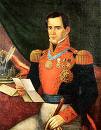



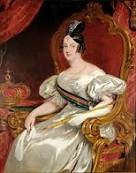
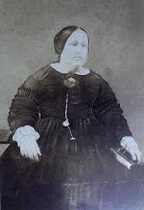
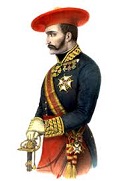





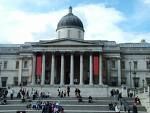



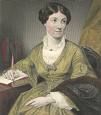






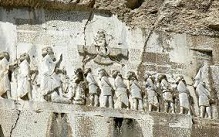





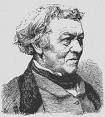








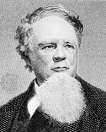

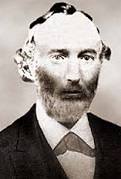

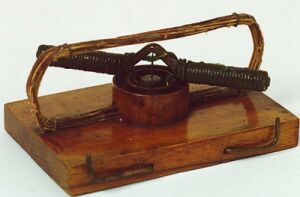



1834 The Poor Law Amendment Act is passed in Britain, attempting to reform the 1601 Elizabethan act, which had backfired as dimwitted justices of the people begin allowing able-bodied men to receive relief along with the truly needy, causing taxation for poor relief to triple since 1783; a central admin. is created, and to receive relief a person now has to reside in a poorhouse - and beg for porridge like Oliver Twist? The 1834 U.S. Recession is caused by Nicholas Biddle's Second Bank of the U.S. in order to force Pres. Jackson to re-charter it? On Jan. 20 the liberal Swiss cantons adopt the Articles of Baden, supporting freedom of worship and secular education, widening their quarrel with the conservative cantons to religious matters. In Jan. Robert Owen (1771-1858) et al. found the Grand Nat. Consolidated Trades Union; it collapses in Oct. On Feb. 12 LDS high priest (since July 28, 1832) Sidney Rigdon charges fellow high priest (since June 3, 1831) Martin Harris before the Kirtland High Council in Kirtland, Ohio of saying that "Joseph [Smith] drank too much liquor when he was translating the Book of Mormon and that he wrestled with many men and threw them"; also that Harris "exalted himself above Bro. Joseph, in that he said bro. Joseph knew not the contents of the Book of Mormon until after it was translated"; after he is forgiven, on Feb. 17, 1834 he is ordained a member of the Kirtland High Council, consisting of 12 men headed by the First Presidency, becoming the Mormon church's chief judicial and legislative body until the High Council of Zion is created in Jackson County, Mo., later Far West, Caldwell County, NW Mo., founded in Aug. 1836 by Mormon leaders W.W. Phelps and John Whitmer. On Feb. 22 Sultan Mahmud II issues the Firman (Decree) of 1834, eliminating arbitrary tax collection practices by his functionaries. On Mar. 6 the city of York in Ontario, Canada (pop. 10K) on the NW shore of Lake Ontario (modern-day pop. 2.7M/5.9M) is incorporated as Toronto (Iroquois "tkaronto" = "place where trees stand in water"), with William Lyon Mackenzie (1795-1861) becoming mayor #1 next year. On Mar. 18 six laborers in Dorset, England are sentenced to seven years banishment to a penal colony in Australia for forming a trade union, although the official charge is making secret oaths; they become known as the Tolpuddle Martyrs. On Mar. 28 Henry Clay's resolution of censure against Pres. Jackson passes in the U.S. Senate; instead of destroying Jackson, it causes him to respond on Apr. 15 with a justification of his actions of removing federal deposits from the Bank of the U.S. and an extreme statement of executive power - get off my Bach? On Apr. 20 Spain passes the Estatuto Real, dividing the country into 49 admin. provinces and giving the Cortes financial power, with the royal govt. retaining the right of dissolution and control of the ministry; the liberals split into the Moderados and the Progresistas, the first group having been been giving amnesty beforehand, and the second given amnesty afterward because of their insistence on restoring the 1812 charter - we are the champions? On Apr. 22 Daniel O'Connell introduces a measure to repeal the Union of Britain and Ireland, beginning a long struggle for home rule. On Apr. 22 the Battle of Alasua (Altsasu) is a V for the Carlists under Gen. Tomas de Zumalacarregui over the Liberals under Gen. Vicente Genar de Quesada, after which the unit called the Guias de Navarra is formed from Liberal POWs. On May 19 the 1834 Arab Revolt in Palestine begins (ends Aug.) after new Damascus gov. Mustafa Pasha increases the taxes in Palestine by 10x and orders one-fifth of all fighting-age Muslims conscripted, into the Egyptian army of Mehmet Ali, causing Qasim al-Ahmad to rally the Arab clans (peasants and Bedouins) and notify Egyptian officials that they won't supply any more troops, causing Mehmet Ali's son Ibraham Pasha to send troops, after which Qasim leads his forces from Nablus, aided by the Abu Ghosh clan, entering Jerusalem on May 31, driving out the Ottoman garrison and capturing the citadel, then expelling all non-Arabs from the city until Sidon gov. Abdallah Pasha arrives with 2K troops and seven cannons, bombarding the city from the Mount of Olives for a week before the rebels force them to accede to their demands to lower the taxes, leave Jerusalem in the hands of Arab officials, and pledge non-interference, becoming the first modern example of Arab solidarity in Jerusalem, raising Arab consciousness. On May 26 Miguel I of Portugal is finally defeated, ending the Miguelite Wars (begun 1828), and he abdicates, leaving Maria II da Gloria (1819-53) as sole ruler (until Nov. 15, 1853); she is acclaimed on Sept. 20. On May 28 Portugal abolishes monasteries, and also abolishes trade corporations and guilds to allow free trade; meanwhile radicals call a constituent assembly to write yet another constitution. On May 31 Mexican pres. Antonio Lopez de Santa Anna (1794-1876) dissolves the Mexican Nat. Congress, abolishes the federal constitution, and becomes dictator of a centralized state, dressing up like a peacock and calling himself the Napoleon of the West while cushing all opposition, which causes many Texas Anglos to grumble for independence, though at first moderates like Stephen Fuller Austin (1793-1836) (who founded the first Anglo colony in Texas in the 1820s) prevail, and they adopt a Declaration of Causes for Taking Up Arms Against Mexico, pledging to fight to restore the Mexican constitution; Santa Anna moves his army into Texas to disarm them, shots are fired, but he stands down when they Texians vote down a declaration of independence and set up a provisional state govt. In May-June Joseph Smith Jr. leads the Zion's Camp Mormon military legion from Kirtland, Ohio to Clay County, Mo. in an unsuccessful attempt to regain land taken from Mormons by non-Mormon settlers, chickening-out when he sees the superior numbers of the Mo. militias and faces a cholera epidemic, disbanding on July 25, after which Smith uses participation in the expedition as a basis for selecting future church leaders; Benjamin Winchester (1817-1901), the youngest adult member of Zion's Camp goes on to become an original member of the Quorum of the Seventy, ed. of The Gospel Reflector (first independent Mormon periodical) (1841), and a pres. of a large church branch in Philly before splitting with the Brighamites and joining the Rigdonites, then ultimately chucking Mormonism completely; in 1842 he pub. Synopsis of the Holy Scriptures, and Concordance, the first categorization of Bible verses from a Mormon perspective, followed in 1843 by A Brief History of the Priesthood from the Beginning of the World to the Present Time, the first book focusing on the Mormon priesthood. On July 16 Liberal William Lamb, 2nd Viscount Melbourne (1779-1848) becomes British PM (until Nov. 14). On July 18 French gen. Etienne Maurice Gerard becomes French PM #13 (until Nov. 10). On Aug. 14 Richard Henry Dana Jr. (1815-82) sails on the brig Pilgrim to Calif., returning in Sept. 1836 on the Alert after witnessing a flogging aboard the Pilgrim that pisses him off, later writing the classic Two Years Before the Mast (1840). On Aug. 28 new Greek king Otto, son of King Ludwig of Bavaria officially inaugurates the Parthenon as an ancient monument, staging an elaborate reconstruction of an ancient ceremony and riding on horseback with his regents, court, and bodyguards while soldiers from the Nat. Guard lead a procession of elders, teachers, guild officers, and other notables, and 60 Athenians march holding olive branches, while on the Acropolis, Athenian maidens, dressed in white and carrying bows of myrtle unfurl a banner displaying the image of Athena; after reaching the citadel, Otto is presented with keys to the gate and escorted into the Parthenon by German neoclassical architect Franz Karl Leopold "Leo" von Klenze (1784-1864), sitting on a throne covered in laurel, olive, and myrtle while Klenze delivers a rousing patriotic address advocating the restoration of the Parthenon and the obliteration of every trace of Ottoman Turkish influence, with the soundbyte: "All the remains of barbarity will be removed"; Klenze then asks Otto to sanctify the first marble drum to be restored to the "reborn Parthenon", which the king does, tapping 3x on a white marble column segment set before him. In Aug. Parliament frees all child slaves under age six in the West Indies, and sets the rest free after six years of "apprenticeship". On Sept. 24 king (since Oct. 12, 1822) Pedro I (b. 1798) dies in Lisbon of TB after putting his 15-y.-o. daughter Maria II de Gloria back on the Portuguese throne; British Foreign Secy. Lord Palmerston negotiates the Quadruple Alliance between England, France, Spain, and Portugal to support Queen Maria II of Portugal and Queen Isabella of Spain against the pretenders to their thrones - now if anybody out there can sing or dance or tell jokes? In Sept. the Otago Fish Incident sees customs officers of Port Louis seize 23 barrels of fish from New Zealand and auction them off, after which the British govt. hornswaggles them into getting a refund; meanwhile the East India Co. monopoly of the China trade (begun 1694) is abolished, while friction between Britain and China increases over dopium, er, opium. On Oct. 16 the Palace of Westminster in London, England (home of the British Parliament) burns down after the burning of exchequer tally sticks gets out of hand. On Oct. 23 shah (since June 17, 1797) Fath Ali (b. 1772) dies, and his son Abbas Mirza (gov. of Azerbaijan) decides to let his own son Mohammad Shah Qajar (1808-48) become Qajar shah #3 (until Sept. 1848); Ali Mirza (-1835), one of Fath Ali's many sons seizes the throne for 40 days before being deposed by Mirza Abolghasem Ghaem Magham Farahani (1779-1835), who is made PM after Ali Mirza is pardoned, only to be executed next June 28 at the instigation of Haji Mirza Aqasi (1783-1848), who becomes PM in his place (until 1848). On Oct. 27 the Battle of Allegria de Alava (Alegría de Álava), the first battle of the First Carlist War in Chinchetru near Allegria de Alava (Alegria-Dlantzi), Alava, Spain is a V for the Carlists under Basque Gen. Tomas de Zumalacarregui e Imaz (Tomás de Zumalacárregui) (1788-1835) and Manuel Iturraide over the Liberals (Isabelinos or Cristinos) under Manuel O'Doyle, who lose 600 casualties. On Oct. 28 the Pinjarra (Bindjareb) Massacre in SW Australia stinks up the British name; meanwhile the South Australia Colonisation Act is passed by the British Parliament, allowing establishment of a colony there. In Nov. Abraham Lincoln (b. 1809) is elected to the Ill. legislature as a Whig, becoming the party's floor leader - the Big Whig? On Dec. 9, 1834 the Hundred Days begin (ends Apr. 8, 1835) following the Nov. 14 dismissal of Lord Melbourne's ministry (begun July 16) by William IV over Irish church policy after the king invites the Duke of Wellington to replace him, and he declines and suggests Sir Robert Peel (1788-1850), who is on holiday in Italy but is tracked down on Nov. 25 and returns to take up his new posts of PM and chancellor of the exchequer on Dec. 9; on Dec. 18 he issues the Tamworth Manifesto in an attempt to get reelected, laying down the principles of the modern British Conservative Party, accepting the 1832 Reform Act as "a final and irrevocable settlement of a great constitutional question" while distancing it from the brand of conservatism of "Old Tory" Wellington, with the motto "Reform to survive" while avoiding "a perpetual vortex of agitation" from unnecessary change. On Dec. 25 Christmas Day becomes a bank holiday in England; Boxing Day (St. Stephen's Day) (Dec. 26) is added in 1871. Slavery is abolished in Mauritius, and Indian laborers begin to be imported to work the sugar plantations. Daniel O'Connell's motion to repeal the Union with Great Britain is defeated by 523-38 - in 1719 they said inseparable, and they meant it? The British discover tea plants growing in Assam, NE India, incorporating the hilly forested Meghalaya (Sans. "abode of clouds") (wettest region of India) into Assam in 1835. Joseph Smith Jr. is visited by an angel, who reveals the Doctrine of Plural Marriage (Polygamy) to him; later, on the third and final visit he brandishes a sword and "said I was to obey that principle or he would slay me" - did the sword appear from between his legs? The beginning of Monday Night Raw and Friday Night Smackdown starring JBL, Eddie Guerrero, and Rey Mysterioso? Wyoming is settled at Ft. Laramie on the W bank of the Laramie River 2 mi. above its juncture with the North Fork of the Platte River, which starts out as a trading post founded by Sublette and Campbell, and becomes "the Mother Fort of the West" - a good way to control autoclaustrophobia without Bluetooth? Reformed Napoleonic marshal Jean-Baptiste Drouet, Count d'Erlon is appointed gov.-gen. of Algeria (until 1835). Najid ruler (since 1822) Turki bin Abdullah bin Muhammad (b. 1755) is assassinated in Riyadh by his distant cousin Mushari ibn Abd al-Rahman ibn Mushari, and his son Faisal ibn Turki (1785-1865) becomes Wahabi Saudi emir (imam) #7 of Arabia in Riad (until 1865), facing opposition from the Ottomans, with Egyptian gov. of Arabia Khurshid Pasha supporting rival and puppet Khalid ibn Saud ibn Abd al-Aziz, who forces him to flee Riyadh to the Bedouins then Cairo for protection (until 1843). Sikh ruler Ranjit Singh captures Peshawar from Afghani ruler Dost Mohammed along with fertile land near the Indus River, hurting the Afghani economy but making the remainder of the country easier to defend. The tax on glass is repealed in Ireland, allowing Guinness to switch from stoneware to glass for its Guinness Stout. The German Zollverein (custom union) is formed by W German states under Prussian tutelage, creating a free trade zone; after an unsuccessful attempt by smaller states to create their own custom unions, the Big Z expands by 1844 to all of Germany except German Austria, Hanover, Oldenburg, Mecklenburg, and the three Hanse cities; too bad, failure to adopt a common currency and uniform weights and measures keeps Germany from unifying. Manila, Philippines opens to internat. commerce. Indiana Indian fighter Henry Dodge (1782-1867) is sent with the U.S. Dragoons by Pres. Andrew Jackson to the Front Range of Colo. on a peace mission (ends 1835). The infamous Spanish Inquisition, authorized by Pope Sixtus in 1478 is officially ended for the last time - until next time? Portugal's liberal govt. sets up a state school system, but the absolutists begin persecuting schoolteachers and closing down schools because of their liberal views. The HQ of the Sovereign Military Order (Knights) of Malta (Knights of St. John) (Hospitallers) moves to Rome, becoming the world's smallest nation. St. Helena, Napoleon's regal funspot is brought under direct English crown rule under the 1833 India Act. Sunjo (b. 1790) dies, and next year Honjong II (-1849) becomes Yi king of Korea (until 1849). New Jersey and New York sign an agreement over Ellis Island. Dutch farmers from Cape Colony begin to settle N of the Orange River; the Sixth Kaffir War between the Bantus and the white settlers on the E frontier of the Cape Colony begins (ends 1835). Grosse Isle on the St. Lawrence River at the entrance to Quebec, Canada becomes a quarantine island, and ends up being choked with sick, starving Irish during the Great Potato Famine. Roane County, Tenn.-born trapper Joseph Reddeford "Joe" Walker (1798-1876) et al., who set out in 1832 with Benjamin Bonneville on a trapping expedition in the Am. West, killed a bunch of helpless Digger Indians, visited Yosemite and became the first Euros to see the waterfalls, followed by the redwood forests, then holed up in Monterey, Calif. from Nov. 1833-Jan. 13, 1834 discovers 5,250 ft. alt. Walker Pass in the S Sierra Nevada Mts. at the S end of the San Joaquin Valley, which later becomes a major gringo gateway into Calif. during the Calif. Gold Rush. Mass. ice harvester Capt. Nathaniel Jarvis Wyeth (1802-56) (the original Capt. James T. Kirk?) leads 21 men from Independence, Mo. to the Am. Northwest along the Platte River; after half of the men turn back, Wyeth and 11 men reach Ft. Vancouver on the Columbia River; in 1839 ornithologist John Kirk Townsend (1809-51) pub. Narrative of a Journey Across the Rocky Mountains to the Columbia River, and a Visit to the Sandwich Islands, a narrative of the journey which paints such a rosy picture that "Oregon fever" spreads through the Am. Midwest, causing thousands to set out from Independence singing "O Susanna, don't you cry for me". The remaining piece of Plymouth Rock in Plymouth's town square, which had been chiseled down by souvenir hunters is moved to the front of the new Greek revival Pilgrim Hall, the first public museum in the U.S.; once again it breaks in two as it's being moved, but is cemented back together - comments? The Nat. Trades' Union is founded in the U.S. to federate citywide labor unions, becoming the first U.S. nat. labor federation. Lyman Beecher et al. deliver a series of anti-Catholic sermons that cause a mob to attack and burn the Ursuline Convent in Charlestown, Mass. Scottish agnostic Thomas Carlyle (1795-1881) moves to Cheyne Row, Chelsea, London, becoming known as "the Sage of Chelsea", gathering a lit. circle incl. John Stuart Mill, John Sterling, Leigh Hunt, and Harriet Martineau. Norbich, er, Norwich, England economics writer Harriet Martineau (1802-76) visits the U.S. (until 1836), returning a fervent abolitionist, and becoming the first to arouse the interest of the British reading public with an article in Westminster Review. After a fly-by-night bank in Mich. uses a wildcat on its worthless notes, such banks become known as wildcat banks. Pres. Jackson requests the U.S. Mint to provide him with pieces of every coin in circulation to present to the king of Siam, causing them to hurriedly mint a batch of Class II 1804 silver dollars; in 1858-60 mint employee Theodore Eckfelt secretly counterfeits more of them and sells them to a Philly coin store, and after finding out the Mint tracks down and destroys all but one of them, causing the last one to become a collector's item going for millions of dollars. Sales of U.S. public lands to speculators rise from 4M acres this year to 15M next year to 20M in 1836. Belgium opens a state-owned railway system, building 336 km of track by 1840 to bring raw materials from Wallonia to the western Flemish regions - that new kingie is working out well? U.S. fur magnate John Jacob Astor retires from the fur-trading biz with a $30M fortune - and zillions of buried crimes? Belgian statistician Adolphe Quetelet (1796-1874), Charles Babbage (1791-1871), Richard Jones, William Whewell, and Thomas Malthus et al. found the Royal Statistical Society (originally London Statistical Society). U.S. Rep. Franklin Pierce (b. 1804), son of N.H. Gov. Benjamin Pierce marries Jane Means Appleton (d. 1863), who dislikes Washington, D.C. and her hubby's dissolute life there; they have 3 sons and no daughters. Synthetic geometry founder Jakob Steiner (1796-1863) of Switzerland is appointed prof. of Berlin U. The Jockey Club (originally the Society for the Encouragement of the Improvement of Horse Breeding in France) is founded in Chantilly, France, going on to become the club for most of the sporting gentlemen of Paris, attracting English as well as French members; in 1833-60 it turns the Champ de Mars in Paris into a horseracing course; in 1863-1913 it has a HQ in the Hotel Scribe next to the Opera Garnier in Paris, where they insist that there be no ballet in the first act so that they can eat dinner, hissing a production of Wagner's "Tannhauser" off the stage in 1861 when he tried it, causing him to refuse to hold another production in Paris. French landscape painter Jean-Baptiste-Camille Corot (1796-1875), after spending 1825-8 in Rome, and returning to Italy this year, finally settles in Ville d'Avray, France, where he becomes BMOC in the landscape biz by 1850, known for his soft brush strokes and silver-gray tones, and generosity with his friends. Austrian ballerina Fanny Elssler (1810-84) makes a sensational debut at the Paris Opera in La Tempete. The Southern Literary Messenger begins pub. in Richmond, Va (ends June, 1864); Edgar Allan Poe becomes a staff writer in 1835. Lloyd's Register of Shipping (pub. since 1764) is placed under control of Lloyd's Register Society. The discovery of an ancient ms. version of most of the Hebrew Bible increases interest in the Bible. Prince of Wales College in Charlottetown, Prince Edward Island, Canada is founded. Tulane U. (originally Medical College of La.) is founded; in 1882 N.J.-born New Orleans merchant Paul Tulane (1801-87) donates $1M, its name is changed to guess what, and it absorbs the State U. of La., with tax-exemption granted. Wake Forest U. in Wake Forest, N.C. is founded, eventually moving to Winston-Salem and becoming coed. Delta Upsilon, the first non-secret Greek fraternity in the U.S. is founded at Williams College in Mass. Marston's Brewery (originally J. Marston & Son) is founded in Burton upon Trent, England by John Marson, producing 3K barrels/year in 1861, and 100K barrels/year in 1898; in the 1830s the Burton Union system is developed, connecting a row of casks via pipes to a common trough to allow excess yeast foam (barm) to be expelled without losing beer, keeping the yeast strains stable for the next cent.; meanwhile chemist C.W. Vincent discovers that the reason water from Burton makes better beer is the sulphate content ("Burton snatch"), causing brewers in other locations to introduce magnesium sulphate. Sports: The first British polo club is founded in Silchar, Assam, India. Architecture: British architect William Wilkins (1778-1839) begins building the National Gallery in Westminster, London. Inventions: In May German-born Moritz Hermann Jacobi (1801-74) of St. Petersburg, Russia constructs the first full-scale practical electromagnetic motor. Brothers Francois and Joseph Blanc of Bordeaux, France subvert the 17902 French nat. mechanical telegraph system by bribing the relay operator in Tours to introduce deliberate errors so they can make money on the govt. bond market, becoming the world's first cyber attack; they are caught in 1836, but there is no law under which they can be convicted. James Chambers of England invents the postage stamp; until now they are engraved on envelopes. Bavarian civil servant Franz Xaver Gabelsberger (1789-1849) pub. his shorthand system. English (York) architect Joseph Aloysius Hansom (1803-82) patents the 2-wheeled 1-horse Hansom Cab in London, known for a low center of gravity and an elevated rear driver's seat. Scottish inventor James Bowman Lindsay (1799-1862) invents galvanic cells that permit continuous electric light, and next July demonstrates an electric light in Dundee, claiming he can read a book at a distance of 1.5 ft. with it in darkness. Newburyport, Mass.-born inventor Jacob Perkins (1766-1849) develops the first workable refrigeration machine using the vapor-compression refrigeration cycle with ammonia, which is patented next Aug. 14; earlier in the decade Perkins developed the Perkins Tube (Heat Pipe), which is later used in central heating systems - is it perkin'? New Orleans, La.-born Creole engineer Norbert Rillieux (1806-94) invents the multiple-effect evaporator for more efficient sugar production; he patents it in 1843. The 4-wheel two-mast 6-sail 20-passenger carriage called L'Eolienne (named after Greek wind god Aeolus) is tested in Paris, but is abandoned when they realize they have no way to stop it. The lively (sleazy?) 2/4-time Polka (Czech. "pulka" = little half [steps]) (Czech. "polka" = Polish woman) (not to be confused with the 3/4-time Swedish polska) is invented by Czech peasant girl Anna Slezak of Labska Tynice? Orange-flavored Triple Sec (triple-distilled) liqueur is invented in Saumur, France by Jean-Baptiste Combier using sun-dried orange skins from Saint-Raphael, Haiti, going on to become a key ingredient in the Margarita. Science: Scottish physician ("Father of Modern Hypnotism") James Braid (1795-1860) coins the term "hypnosis" for animal magnetism or mesmerism. Michael Faraday independently rediscovers self-induced currents. German scientist Friedrich Ferdinand Runge (1795-1853) discovers phenol (carbolic acid). In Mar. British East India Co. archeologist Sir Henry Creswicke Rawlinson (1810-95) arrives at the Behistun Rock (the world's oldest roadside billboard?) in Bistoun 22 mi. E of Kermanshah, Iran in the Alvend foothills of the Zagros Mts. of W Iran, and begins copying the inscriptions (which are in Babylonian, Elamite, and some unknown script) for the next two years; in 1836 he becomes the first to decipher Old Persian cuneiform, ecoming known as "the Father of Assyriology". Theodor Schwann (1810-82) of Germany discovers the catalytic role of pepsin (from Gr. "digestion") in gastric juice - too early to be given the "-ase" suffix. Sir Charles Wheatstone (1802-75) measures the speed of electrical discharge in a conductor using a revolving mirror. The Stuttgart Congress of physicists adopts the proposal of Heinrich Scheibler (1777-1838) for Scheibler's (Concert) Pitch, setting true middle C (C1) at 528 Hz, somewhat higher than the original 500 Hz of Guido d'Arezzo and the classical pitch of 498-515 Hz to accommodate increasingly popular wind instruments. Nonfiction: Francois Arago (1786-1853), Astronomie Populaire. George Bancroft (1800-91), History of the United States (3 vols.) (1837, 1840). Vissarion Belinski (1810-48), Literary Reveries; history of Russian lit. from the early 18th cent. Sir William Betham, The Gael and Cymbri: An Inquiry into the Origin and History of the Irish, Scoti, Britons and Gauls, and of the Caledonians, Picts, Welsh, Cornish and Bretons (Dublin). Christian Leopold von Buch (1774-1853), Theory of Volcanism; claims that granite is formed by volcanic not sedimentary action, refuting the Neptunism (aqueous orgin) theory of Abraham G. Werner. Robin Carver, The Boy's and Girl's Book of Sports (Boston, Mass.); first book on Am. baseball - and it's from Boston not New York? George Combe (1788-1858), Elements of Phrenology; popularizes it in the U.S.; "Phrenology... treats of the faculties of the Human Mind, and of the organs by means of which they manifest themselves; but it does not enable us to predict actions." William Dunlap (1766-1839), History of the Rise and Progress of the Arts of Design in the United States; first history of U.S. art. Michael Faraday (1791-1867), Law of Electrolysis. Henry Hallam (1777-1859), The Remains in Prose and Verse of Athur Henry Hallam, with a Sketch of His Life. Elias Hicks (1748-1830), The Letters of Elias Hicks (posth.). James Hogg (1770-1835), Domestic Manners and Private Life of Sir Walter Scott. James Holman, A Voyage Round the World (4 vols.) (1834-5). In 1834 Eber Dudley Howe (1798-1885), Eber Dudley Howe (1798-1885), Mormonism Unvailed; ed. of the Painesville Telegraph in Painesville, Ohio claims that the Book of Mormon was really written by Ashford, Conn.-born Congregationalist preacher Solomon Spalding (1761-1816) of Conneaut, Ohio, who wrote "The Oberlin Manuscript" in 1809-12, about 24 rolls of parchment allegedly found in a cave on the banks of Conneaut Creek, telling how the ancient Romans discovered America, and that the native Americans are descended from the Ten Lost Tribes of the Hebrews, who came over from Jerusalem under the leadership of Nephi and Lehi, who split into the Nephites and Lamanites, and ended up in several cruel bloody wars, with the large heaps of the dead later becoming Indian mounds; too bad, he never pub. it, but when LDS missionaries Samuel H. Smith and Orson Hyde visited Conneaut, Ohio in 1832, the locals spotted the resemblance with the Book of Mormon, and in 1833 Spalding's brother John Spalding and seven other residents signed affidavits claiming plagiarism; in 1885 the Reorganized Church of Jesus Christ of Latter Day Saints pub. it, followed by the LDS Church in 1886 and 1910. Samuel Augustus Mitchell the Elder, Mitchell's Pocket Map of Michigan. Sir Francis Palgrave, An Essay on the Original Authority of the King's Council. Leopold von Ranke (1795-1886), The Roman Popes, Their Church and State in the 16th and 17th Centuries (1834-6). Henry Schoolcraft (1793-1864), Narrative of an Expedition Through the Upper Mississippi River to Itasca Lake. Mary Somerville, The Connection of the Physical Sciences. Joseph Story (1779-1845), Equity Jurisprudence. Alexis de Tocqueville (1805-59), Democracy in America (La Democratie en Amerique) (2 vols.) (1835, 1840); lionizes Americans and their democracy experiment; "Among a democratic people, where there is no hereditary wealth, every man works to earn a living... Labor is held in honor; the prejudice is not against but in its favor"; "America... the place where the Christian religion has kept the greatest real power over men's souls"; "There are now two great nations in the world, which starting from different points, seem to be advancing toward the same goal: the Russians and the Anglo-Americans... Each seems called by some secret design of Providence one day to hold in its hands the destinies of half the world"; "There is hardly a pioneer hut that does not contain a few odd volumes of Shakespeare"; "The first who attracts the eye, the first in enlightenment, in power and in happiness, is the white man, the European, man par excellence; below him appear the Negro and the Indian. These two unfortunate races have neither birth, nor face, nor language, nor mores in common; only their misfortunes look alike. Both occupy an equally inferior position in the country that they inhabit; both experience the effects of tyranny; and if their miseries are different, they can accuse the same author for them." Frances Trollope (1780-1863), Belgium and Western Germany (2 vols.). Music: Adolphe Adam (1803-56), Le Chalet (opera) (Paris). John Barnett (1802-90), The Mountain Sylph (opera) (New Theatre Royal, London) (Aug. 25); first modern English opera. Hector Berlioz (1803-69), Harold en Italie, Op. 16 (symphony) (Paris); based on Byron's "Childe Harold". Frederic Chopin (1810-49), Fantaisie-Impromptu. Konradin Kreutzer, Das Nachtlager in Granada (The Night Camp at Granada) (opera) (Berlin). Carl Loewe (1796-1869), Die Drei Wunsche (Wünsche) (opera) (Berlin). Thomas Moore (1779-1852), Irish Melodies (1808-34). Art: Honore Daumier (1808-79), Rue Transnonain, 15 Avril, 1834 (lithograph). Eugene Delacroix (1798-1863), The Women of Algiers. The Legislative Body (lithograph). J.A.D. Ingres (1780-1867), Martyrdom of Saint Symphorian. Charles de Steuben (1788-1856), Battle of Tours (632) (1834-7). Gustave Wappers (1803-74), Episode of the Belgian Revolution of 1830; a big hit in Antwerp, getting him appointed court painter to king Leopold I. Plays: Alexandre Dumas pere (1802-70), Catherine Howard. Franz Grillparzer (1791-1872), Der Traum, ein Leben; his first non-tragedy; his masterpiece?; young peasant Rustan discovers the vanity of ambition. Mariano Jose de Larra (1809-37), Macios; based on his novel "El Donce!". Frederick Marryat (1792-1848), Peter Simple; about a young British midshipman during the Napoleonic Wars. Alfred de Musset (1810-57), Lorenzaccio. Poetry: Adolf Ivar Arwidsson (1791-1858), Svenska Fornsanger (3 vols.) (1834-42); Swedish folk songs. James Hogg (1770-1835), Lay Sermons. Count Zygmunt Krasinski (1812-59), Undivine Comedy. Charles Mackay (1814-89), Songs and Poems. Adam Mickiewicz (1798-1855), Pan Tadeusz; epic of the life of the Polish gentry in Lithuania during the Napoleonic War, featuring Jewish innkeeper Jankiel, who plays the dulcimer; his masterpiece? Johan Sebastian Welhaven (1807-73), The Dawn of Norway (sonnets); disses the crudity of Norwegians vis a vis the educated Danish elite, and takes on anti-Danish radical Henrik Wergeland (1808-45). Novels: William Harrison Ainsworth (1805-82), Rookwood (first novel). Honore de Balzac (1799-1850), Pere Gorlot; a doting father rejects his last son for two ungrateful daughters who make rich marriages. Edward George Bulwer-Lytton (1803-73), The Last Days of Pompeii; inspired by Karl Briullov's painting; The Pilgrims of the Rhine. Benjamin Disraeli (1804-81), The Infernal Marriage. Joseph von Eichendorff (1788-1857), Auch Ich War in Arkadien. John Galt (1779-1839), A Contribution to the Greenock Calamity Fund. Joseph Coleman Hart, Miriam Coffin, or The Whale-Fishermen; mentioned in Herman Melville's "Moby-Dick", Ch. 32. Henry William Herbert (1807-58), The Village Inn; or The Adventures of Bellechassaigne (first novel). Yevhen Hrebinka (1812-48), Little Russian Fables. Victor Hugo (1802-85), Claude Gueux; against capital punishment. Leigh Hunt (1784-1859), London Journal. Mariano Jose de Larra (1809-37), El Donce! de Don Enrique el Doliente. John Frederick Denison Maurice (1805-72), Eustace Conway, or the Brother and Sister (first novel). William Hamilton Maxwell (1792-1850), Stories of Waterloo. James Morier, Ayesha the Maid of Kars. Jan Frederik Oltmans (1806-54), Castle Loevenstein in 1570. Alexander Pushkin (1799-1837), The Queen of Spades; a short story about human avarice with supernatural elements, which is turned into an opera by Fromental Halevy in 1850, by Franz von Suppe in 1864, and by Peter Tchaikovsky in 1890, and filmed in 1949 by Thorold Dickinson; German Russian army engineer Hermann is told a story by Tomsky about his grandmother, who learned the secret of the three winning cards from the Count of St. Germain, and pulls a pistol on her to make her tell him, causing her to die of fright, after which she opens her eyes in the coffin and names the cards as three, seven, and ace, but warns him only to play once each night; too bad, he goes to Chekalinsky's salon, and bets on the Queen of Spades rather than the ace, losing everything, after which the Queen winks at him, causing him to go mad and get committed to Room 17 of the Obukhov Insane Asylum, forever mumbling "Three, seven, ace!" George Sand (1804-76), Andre. Charles Sealsfield (Karl Anton Postl) (1793-1864), Der Virey und die Aristokraten; Cooperish tale of Mexico? William Gilmore Simms (1806-70), Guy Rivers; first of a series of Border Romances set in frontier Georgia. Births: French writer (Jewish) Ludovic Halevy (Halévy) (d. 1908) on Jan. 1 in Paris; son of Leon Halevy (1802-83); collaborator of Henri Meilhac (1831-97); father of Elie Halevy (1870-1937). German Doberman Pinscher breeder (tax collector) Karl Friedrich Louis Dobermann (Tobermann) (D. 1894) on Jan. 2 in Apolda, Saxe-Weimar-Eisenach. Australian explorer William John Wills (d. 1861) on Jan. 5 in Totnes, Devon, England. German telephone inventor Johann Philipp Reis (d. 1874) on Jan. 7 in Gelnhausen. English "Cambridge Modern History", "Absolute power corrupts absolutely" historian (Roman Catholic) John Emerich Edward Dalberg-Acton, 1st Baron Acton (d. 1902) (AKA Lord Acton) on Jan. 10 in Naples, Italy; son of Sir Ferdinand Dalberg-Acton, 7th baronet (1801-37); grandson of Sir John Acton, 6th baronet (1736-1811); father of Richard Lyon-Dalberg-Acton, 2nd baron Acton (1870-1924); created baron in 1869. German evolutionary biologist August Friedrich Leopold Weismann (d. 1914) on Jan. 17 in Frankfurt am Main. Norwegian-Am. brewer (in Japan) William Copeland (Johan Martinius Thoreson) (d. 1902) on Mar. 10 in Arendal, Norway; emigrates to the U.S. in the 1840s. English "Onward Christian Soldiers" novelist-poet-hymnodist (Anglican priest) Sabine Baring-Gould (d. 1924) on Jan. 28 in Exeter; educated at Clare College, Cambridge U. French economist Jules Augustin Frederic Regnault (d. 1894) on Feb. 1 in Bethencourt. Russian Periodic Table chemist Dmitri Ivanovich Mendeleyev (Mendeleev) (d. 1907) on Feb. 7 in Tobolsk. German Romantic novelist-historian Julius Sophus Felix Dahn (d. 1912) on Feb. 9 in Hamburg. Hawaiian king #4 (1855-63) Kamehameha IV (Alexander 'Iolani Liholiho Keawenui) ('Iolani = "hawk of heaven") (d. 1863) on Feb. 9 in Honolulu; grandson of Kamehameha I the Great (1758-1819). German-Swiss diphtheria pathologist Edwin Klebs (d. 1913) on Feb. 6 in Konigsberg, Prussia; father of Arnold Klebs (1870-1943). German philosopher-zoologist-artist Ernst Heinrich Philipp August Heinrich Haeckel (d. 1919) on Feb. 16 in Potsdam; first German biologist to support Darwin's Theory of Evolution; a chair in zoology is specially created for him at the U. of Jena in 1865; coiner of the term "World War I" - I don't want to be all by myself anymore? German explorer-surgeon (in C Africa) Gustav Nachtigal (d. 1885) on Feb. 23 in Eichstadt, Saxony; son of a Lutheran pastor. English baritone Sir Charles Santley (d. 1922) on Feb. 28 in Liverpool; brother of Kate Santley (1837-1923). Am. atty. Uriah Milton Rose (d. 1913) on Mar. 5 in Bradfordsville, Ky.; educated at Transylvania U. English "True Humility", "Trilby" novelist-cartoonist (blind in left eye) George Louis Palmella Busson du Maurier (d. 1896) on Mar. 6 in Paris; friend of Henry James; coiner of the expressions "bedside manner", "good in parts", and "curate's egg"; father of Gerald du Maurier (1873-1934) and Sylvia Llewelyn Davis (1866-1910) (father of the five Peter Pan boys); grandfather of Angela du Maurier (1904-2002) and Daphne du Maurier (1907-89). Am. Civil War Union Col. John Charles O'Neill (d. 1878) on Mar. 9 in Drumgallon, County Monaghan, Ireland; emigrates to the U.S. in 1848. German automobile manufacturer (co-founder of Daimler-Benz) Gottlieb Wilhelm Daimler (d. 1900 on Mar. 17 in Schorndorf, Wurttemberg. Am. educator (Harvard Classics ed.) Charles William Eliot [one l] (d. 1926) on Mar. 20 in Boston, Mass.; educated at Harvard U.; pres. #22 of Harvard U. (1869-1909); author of "Dr. Eliot's Five-Foot Shelf of Books". English false claimant to the Tichborne estates Arthur Orton on Mar. 20 in Wapping, London; moves to Australia in 1855 and works in Wagga Wagga, N.S.W. as a butcher asst. under the name Thomas Castro. English Socialist poet and graphic designer (founder of the Arts and Crafts Movement) William Morris (d. 1896) on Mar. 24 in Walthamstow; educated at Oxford U. Am. explorer-geologist John Wesley "Wes" Powell (d. 1902) on Mar. 24 in Mount Morris, N.Y.; educated at Wheaton College, and Oberlin College. Am. "The Lady, or the Tiger?" humorist writer Frank Richard Stockton (d. 1902) on Apr. 5 in Philadelphia, Penn. French mathematician Edmond Nicolas Laguerre (d. 1886) on Apr. 9 in Bar-le-Duc. English merchant Charles Lennox (Lenox) Richardson (d. 1862) on Apr. 16 in London. Am. railroad atty., U.S. Sen. (R-NY) (1899-1911) and wit Chauncy (Lat. "chancellor") Mitchell Depew (d. 1928) on Apr. 23 in Peeksill, N.Y.; educated at Yale U. (Skull & Bones). Am. "High-Handed Outrage at Utica" humorist (America's first stand-up comedian) Charles Farrar Browne (d. 1867) (AKA Artemus Ward) on Apr. 26 in Waterford, Maine; birth name Brown; favorite author of Abraham Lincoln, and the inspiration of Mark Twain. English "Marriage, Totemism and Religion" Liberal MP, banker, archeologist, and polymath scientist t Sir John Lubbock, 4th Baronet and 1st Baron Avebury (d. 1913) on Apr. 30 in London; son of Sir John William Lubbock (1803-65); educated at Eton College; created baron in 1900; coiner of the terms "Paleolithic" and "Neoloithic". German rifle designer Wilhelm Mauser (d. 1882) on May 2 in Oberndorf am Necker, Wurttemberg; brother of Peter Paul Mauser (1838-1914). Danish "Prometheus Unbound", "Life of Christ" painter Carl Heinrich Bloch (d. 1890) on May 23 in Copenhagen; studies with Wilhelm Marstrand; favorite with the Mormons. Am. "Asphodel" writer (bi?) Annie Adams Fields (d. 1915) on June 6 in Boston, Mass.; 2nd wife of James Thomas Fields (1817-81); lover of Sarah Orne Jewett (1849-1909). English Particular Baptist preacher ("the Prince of Preachers") Charles Haddon Spurgeon (d. 1892) on June 19 in Kelvedon, Essex. Am. "Whistler's Mother", "Art for Art's Sake" painter (in England) James Abbott McNeill Whistler (d. 1903) on July 10 in Lowell, Mass.; educated at the U.S. Military Academy; signs his paintings with a butterfly with a stinger tail; lives in Russia in 1842-9. French Protestant missionary (in South Africa) Francois Coillard (d. 1904) on July 17 in Asnieres-les-Bourges, Cher; Huguenot descent parents; educated at Stransbourg U. French Impressionist painter-sculptor Edgar Degas (Hilaire Germain Edgar De Gas) (De Gas) (d. 1917) on July 19 in Paris; Creole mother; known for paintings of ballet dancers; starts out as a historical painter. Am. Roman Catholic Cardinal (1886-) Archbishop of Baltimore (1877-) James Gibbons (d. 1921) on July 23 in Baltimore, Md.; 2nd Am. cardinal after John McCloskey. French Statue of Liberty sculptor (Freemason) Frederic Auguste Bartholdi (AKA Amilcar Hasenfratz) (d. 1904) on Aug. 2 in Colmar, Alsace. English Venn Diagram logician-philosopher John Venn (d. 1923) on Aug. 4 in Hull, Yorkshire; educated at Gonville and Caius College, Cambridge U. Am. Methodist Episcopal Church bishop John Fletcher Hurst (d. 1903) on Aug. 17 in Salem, Md.; educated at Dickinson College, U. of Halle, and U. of Heidelberg. Am. dry goods merchant Marshall Field (d. 1906) on Aug. 18 near Conway, Mass. Am. astronomer-physicist and aviation pioneer (inventor of the bolometer) Samuel Pierpont Langley (d. 1906) on Aug. 22 in Roxbury, Mass.; educated at Boston Latin School, and Harvard U. Am. Battle of Little Bighorn Maj. Frederick William Benteen (d. 1898) on Aug. 24 in Petersburg, Va.; of Dutch descent. German Sprengel Mercury Vacuum Pump chemist Hermann Johann Philips Sprengel (d. 1906) on Aug. 29 in Shillerslage. Italian opera composer Amilcare Ponchielli (d. 1886) on Aug. 31. English "John Inglesant" novelist Joseph Henry Shorthouse (d. 1903) on Sept. 9 in Birmingham. English "Ecce Homo" historian Sir John Robert Seeley (d. 1895) on Sept. 10 in London; educated at Christ College, Cambridge U. German historian Heinrich Gotthard von Treitschke (d. 1896) on Sept. 15 in Dresden. Am. women's activist Abigail Jane Scott Duniway (nee Scott) (d. 1915) on Oct. 22 near Groveland, Tazewell County, Ill.; moves to Ore. in 1853. Am. businessman (Jewish) Levi Zeigler Leiter (d. 1904) on Nov. 2 in Leitersburg, Md. German Zollner Illusion astrophysicist Johann Karl Friedrich Zollner (Zöllner) (d. 1882) on Nov. 8 in Berlin. Japanese samurai Kondo Isami (d. 1868) on Nov. 9 in Chofu, Tokyo. Argentine "Martin Fierro" poet Jose Hernandez (d. 1886) on Nov. 10 near San Martin. U.S. Col. Marcus Albert Reno (d. 1889) on Nov. 15 in Carrollton, Ill. Am. Aunt Jemima model (black) Nancy Green (d. 1923) on Nov. 17 in Montgomery County, Ky.; born a slave. German physicist Georg Hermann Quincke (d. 1924) on Nov. 19 in Frankfurt an der Oder; brother of Heinrich Quincke (1842-1922) - Georg Quincy Atoms? Scottish "The City of Dreadful Night" poet James Thomson (AKA B.V. or Bysshe Vanolis) (d. 1882) on Nov. 23 in Glasgow. German Laspeyres Index economist Ernst Louis Etienne Laspeyres (d. 1913) on Nov. 28 in Halle an der Saale; of Gascon Huguenot descent. French #1 economist (co-founder of Marginalism) ("Father of Gen. Equilibrium Theory") Marie-Esprit Leon Walras (d. 1910) on Dec. 16 in Evreux; son of Auguste Walras (1801-66). Am. cowboy John M. Bozeman (d. 1867) in Pickens County, Ga. Zanzibar sultan #1 (1856-70) (Sunni Muslim) Majid bin Said Al-Busaidi (d. 1870); Ethiopian mother; son of Said bin Sultan (1791-1856). Russian "Prince Igor" composer-chemist Alexander Porfirevich Borodin (d. 1887) in St. Petersburg. Am. "Thoughts Are Things" humorist and New Thought writer Prentice Mulford (d. 1891) in Sag Harbor, N.Y. Czech "Cosmic Stories" journalist-essayist-poet-novelist ("the Czech Dickens") Jan Neruda (d. 1891) in Prague; friend of Vitezslav Halek; Pablo Neruda picks his penname after him. Scottish golfer William "Willie" Park Sr. (d. 1903) in Musselburgh. Am. longevity champ (black) George Robert Robinson (d. 1942); starts life as a Southern slave and lives to age 108. Deaths: London-born Irish independence leader Archibald Hamilton Rowan (b. 1751) on Nov. 1 in Killyleagh Castle, County Down; leaves his autobio., which is pub. in 1840. French Jacquard loom inventor Joseph Marie Jacquard (b. 1752) on Aug. 7 in Oullins. English politician Edward Smith-Stanley, 12th earl of Derby (b. 1752) on Oct. 21. Irish politician Richard Martin (b. 1754) on Jan. 6 in Boulogne, France. English enamel painter Henry Bone (b. 1755) on Dec. 17. English painter-illustrator Thomas Stothard (b. 1755) on Apr. 27. French adm. Jean Baptiste de Nompere de Champagny, 1st duc de Cadore (b. 1756) on July 3 in Paris. French soldier-statesman and Am. Rev. leader Marquis de Lafayette (b. 1757) on May 20; buried in Paris with dirt brought from the 1775 Battle of Bunker Hill. English short jacket model George John Spencer, 2nd earl Spencer (b. 1758) on Nov. 10 in Althorp. British Whig PM (1806-7) William Grenville, 1st baron Grenville (b. 1759) on Jan. 12 in Burnham, Buckinghamshire. Am. expatriate diplomat "Citizen" Edmond Charles Edouard Genet (b. 1763). Anglo-German lithographer Rudolph Ackermann (b. 1764) on Mar. 30 in London. English political economist Thomas Robert Malthus (b. 1766) on Dec. 23 in Bath; the original "pop" star? British-born Australian wool pioneer John Macarthur (b. 1757) on Apr. 10 in Camden. German Protestant theologian-philosopher Friedrich D.E. Schleiermacher (b. 1768). French diplomat Louis Antoine Fauvelet de Bourrienne (b. 1769) on Feb. 7 in Caen. British Blayney's Bloodhounds lt. gen. Andrew Blayney, 11th baron Blayney (b. 1770) on Apr. 8. Persian shah (1797-1834) Fath Ali (b. 1771) on Oct. 23 in Isfahan. French musician Alexandre-Etienne Choron (b. 1771) on June 29 in Paris. U.S. Supreme Court justice (1804-34) William Johnson (b. 1771) on Aug. 11 in New York City. French-born Am. chemical industralist Eleuthere Irenee du Pont de Nemours (b. 1771) on Oct. 31 in Greenville, Del. German lithography inventor Aloys Senefelder (b. 1771) on Feb. 26 in Munich. English poet-critic Samuel Taylor Coleridge (b. 1772) on July 25 in Highgate (heart failure from opium OD): "If men could learn from history, what lessons it might teach us! But passion and party blind our eyes, and the light which experience gives us is a lantern on the stern which shines only on the waves behind." U.S. atty.-gen. #9 (1817-29) William Wirt (b. 1772) on Feb. 18. French comic opera composer Francois-Adrien Boieldieu (b. 1775) on Oct. 8 in Paris. English essayist Charles Lamb (b. 1775) on Dec. 27: "My theory is to enjoy life, but the practice is against it"; "Lawyers, I suppose, were children once." Scottish publisher William Blackwood (b. 1776) on Sept. 16 in Edinburgh. Am. itinerant preacher Lorenzo Dow (b. 1777) on Feb. 2 in Georgetown, D.C.; his first name Lorenzo goes on to become one of the most popular boys names in the U.S. Am. gen. Henry Leavenworth (b. 1783) on July 21 in Cross Timbers, Indian Territory; namesake of Fort Leavenworth, Leavenworth County, and Leavenworth Penitentiary in Kan. Am. naturalist Thomas Say (b. 1787) on Oct. 10 in New Harmony, Ind. Scottish minister Edward Irving (b. 1792) on Dec. 7. Am. atty. Robert Crittenden (b. 1797) on Dec. 18 in Vicksburg, Miss. Brazilian king (1822-31) Pedro I (b. 1798) on Sept. 24 in Queluz Palace, Lisbon. Scottish Douglas fir botanist David Douglas (b. 1799) in Hawaii; falls into a pit and is crushed by a bull? - forgot to duck?

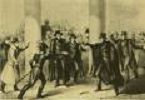




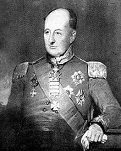
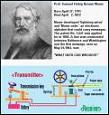







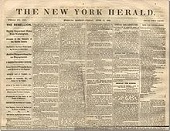


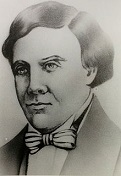
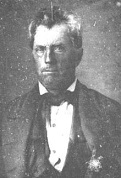














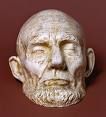



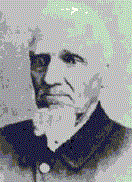
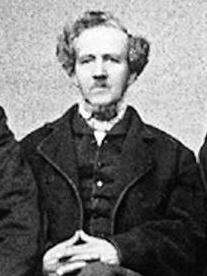
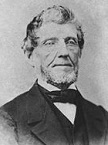
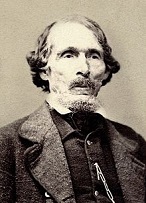



1835 By this year the gringo pop. in Texas has reached 30K, about 10x the number of Mexicans there - it's one on one and the moderator should only be there to blow the whistle? Her Majesty's Most Excellent Drug Pushers carry on? British opium sales in Chin nnnnnnnnnnnnnnnnnnnnnnnnnnnnnnnna rise to 17,257 chests, up from 2,330 in 1788 - feel the kiss, taste the rainbow? There are 1.2K newspapers and penny press pubs. in the U.S. On Jan. 7 Pres. Jackson nominates Princeton-educated James Moore Wayne (1790-1867) (whose sister Mary is the great-grandmother of Girl Scouts founder Juliette Gordon Low) as U.S. Supreme Court justice #23, and on Jan. 9 he is confirmed, and sworn-in on Jan. 14 (until July 5, 1867) to replace H. Brockholst Livingston (1806-33), William Johnson (1804-34) (who resigned on Aug. 4, 1834, one week before dying) and Gabriel Duvall (1811-35) (who resigns on Jan. 14 from deafness), giving the court only five members (Joseph Story, Smith Thompson, John McClean, Henry Baldwin); Wayne goes on to support the Union against the Confederates even though his son Henry C. Wayne becomes a Confed. gen.; he goes on to rule in Louisville, Cincinnati & Charleston Railroad Co. v. Letson (1844) that a citizen of one state can sue a corp. chartered in another state because it is "a person, though an artificial one, inhabiting and belonging to that state, and therefore entitled, for the purpose of suing and being sued, to be deemed a citizen of that state." On Jan. 30 as U.S. pres. #7 (1829-37) Andrew Jackson (1767-1845) leaves the East Portico of the U.S. Capitol in Washington, D.C. after attending the funeral of S.C. Rep. Warren R. Davis, mad unemployed Lancashire, England-born house painter Richard Lawrence (1800-61) (who believes he's really Richard III of England) becomes the first person to attempt to assassinate a U.S. pres. when he fires a pistol at his back, which misfires, after which Davy Crockett et al. wrestle him to the ground while Jackson hits him with his cane, but he pulls out a 2nd pistol and fires at Jackson again, and it misfires again, after which he is arrested; after his defense atty. Francis Scott Key proves him insane, he ends up in mental hospitals for life, ending up in St. Elizabeths Hospital (Govt. Hospital for the Insane), future home of John Hinckley Jr.; after attributing his survival to Divine Providence, Jackson blames the Rothschilds, and Lawrence confirms that powerful banking interests in Europe had hired him to do it?; the odds of two consecutive misfires are 1 in 125K?; in the 1930s researchers at the Smithsonian Inst. examine the two pistols and find them both in good working order - Andy, you forgot your shawl? In Jan. the British gen. election keeps PM (since Dec. 10) Sir Robert Peel's Tories in the minority, and he resigns on Apr. 8; on Apr. 18 William Lamb, 2nd Viscount Melbourne becomes PM again (until Aug. 30, 1841). By Jan. the U.S. federal debt is entirely paid off, thanks to purchases of Western U.S. real estate. On Mar. 2 emperor (since 1806) Francis I (b. 1768) dies, and his eldest, good-natured but feebleminded and epileptic son Ferdinand I (1793-1875) becomes emperor of Austria (until Dec. 2, 1848), with a regent council appointed because of his lack of mental capacity. On Mar. 3 the U.S. Congress approves the establishment of U.S. branch mints in New Orleans, La., Charlotte, N.C., and Dahlonega, Ga. On Mar. 17 Juan Manuel de Rosas becomes dictator gov. #17 of Argentina (until Feb. 3, 1852), working to make the big ranchers richer while ruling the lower classes with an iron fist; meanwhile Rosa's wife Encarnacion (Encarnación) Ezcurra (1795-1838) uses the paramilitary band called the Mazorca (Sociedad Popular Restauradora) (Popular Society for Restoration) to crush opposition and help him rule with an iron hand, creating a cult of personality. On Apr. 8 after gaining seats for his Conservative party but remaining in the minority, then losing a series of votes over Irish church revenues because of the Feb. Lichfield House Compact between Whigs and Irish MPs backed by Daniel O'Connell, which allows O'Connell to push for further reforms, Sir Robert Peel resigns as PM, but continues to be a big man in the House, attracting Sir James Graham and Edward Stanley from the Whigs, plus Benjamin Disraeli and William Gladstone (until Gladstone becomes a Liberal), and getting much of his key legislation passed by the Whigs. On Apr. 20-22 after the Carlists assemble an army of 30K N of the Ebro River, the Battle of Artaza sees 22K Liberal troops under minister of war Jeronimo Valdez decimated by 5K Carlist troops under Basque Gen. Tomas de Zumalacarregui, who hide in the brush in the mountains and ambush them, inflicting 700 casualties; too bad, after being ordered to siege Bilbao to give Don Carlos a seaport to facilitate his recognition by Euro nations, he is wounded in the calf by a musket ball, and has quack doctor Petriquillo treat him, hastening his death on June 24. On May 5 the first railway in continental Europe opens between Brussels and Mechelen. On May 6 the New York Herald newspaper (four pages for a penny), ed. by Scottish-born James Gordon Bennett Sr. (1795-1872) begins pub. in the cellar of #20 Wall St. in New York City, going on to print the first Wall Street financial article and report the first political speech in full, that of John Calhoun on the Mexican War, received by telegraph, making use sensationalism to become the #1 newspaper in the U.S. by 1845, reaching 84K circ. in 1861 before he turns the paper over to his son James Gordon Bennett Jr. in 1866; it ceases pub. in 1924, becoming the namesake of Herald Square (S of Times Square), and acknowledged in the 1904 song "Give My Regards to Broadway" ("Remember me to Herald Square"). On May 20-22 the 2nd 1835 Dem. Nat. Convention in Baltimore, Md. nominates Jackson's hand-picked successor, vice-pres. Martin Van Buren for pres., and Tecumseh-plunking Ky. Rep. Richard Mentor Johnson for vice-pres., despite being resented for keeping mulatto slave Julia Chinn as his common law wife and giving her two daughters; the Whigs, hoping to throw the election into the House of Reps., encourage state legislatures to put up three favorite sons: Sen. Daniel Webster of Mass., Sen. Hugh Lawson White (1773-1840) of Tenn., and Gen. William Henry Harrison of Ind. On June 23 the city of Durban (Zulu "itheku" = bay/lagoon) (modern-day pop. 595K/3.8M) on the Indian Ocean coast of South Africa is founded by 35 Voortrekkers, named after Cape Colony gov. (1834-8) Lt. Gen. Sir Benjamin Alfred d'Urban (1777-1849), going on to become South Africa's busiest port and a center of tourism. On July 8 the Liberty Bell cracks while tolling the July 6 death of Chief Justice John Marshall (b. 1755) (perhaps because so many other justices went with him?). On July 28 Corsican ne'er-do-well Giuseppe Marco Fieschi (1790-1836) fires a 20-gun contraption at Louis Philippe while he's reviewing his troops from a room overlooking the parade, killing 18, incl. a French marshal, and badly injuring himself; the king escapes, and Fieschi is guillotined next year - George Cluny with a fractured rib and a bandaged arm, his girlfriend on crutches? On Aug. 28 (Fri.) the first article in the Great Moon Hoax series by Richard Adams Locke (1800-71) (descendant of British philosopher John Locke) appears in the New York Sun, claiming that a new telescope has revealed that the Moon is inhabited by 4-ft.-tall flying man-bats along with unicorns and beavers; Edgar Allan Poe claims he was plagiarized. On Aug. 30 the city of Melbourne (originally Batmania) (modern-day pop. 4.7M) (named after British PM William Lamb, 2nd Viscount Melbourne) by N.S.W. gov. Sir Richard Bourke) is founded in S Australia by Tasmanian settler John Batman (1801-39), who crossed the Bass Strait and picked a site on the Yarra River, then bought 775 sq. mi. of land around it from the aborigines for clothing, blankets, knives, scissors and tomahawks in Batman's Treaty of June 6, becoming Britain's greatest land grab from helpless natives, declared void by Bourke on Aug. 26; Queen Victoria officially declares Melbourne a city in 1847, going on to become large and wealthy from the 1851 Victorian Gold Rush. In Aug. U.S. Pvt. Kinsley Dalton (namesake of Dalton, Ga.) is killed by Seminoles while carrying mail from Ft. Brooke to Ft. King; in Nov. Chief Charley Emathla surrenders his people at Ft. Brooke, who take ships W to Ark., pissing-off the other chiefs, who kill him. On Sept. 15 HMS Beagle arrives in the Galapagos Islands, and Charles Darwin goes to work. On Sept. 20 the bloody War of Tatters (Ragamuffin War) (Farroupilha Rev.) in S Brazil (ends Mar. 1, 1845) begins with a Republican uprising led by gens. Bento Goncalves da Silva (1788-1847) and Antonio de Souza Neto, supported by Giuseppe Garibaldi of Italy; the Riograndense (Piratini) Repub. is declared next Sept. 11 (ends Mar. 1, 1845). On Oct. 2 the white Anglo Texians of E Texas proclaim their right to secede from Mexico and begin the Texas Rev. (War of Independence) (ends Apr. 21, 1836). On Oct. 2 the DeWitt Colony in Tex., founded in the 1825 by recently-deceased (May 18) Ky.-born Anglo Green DeWitt (1787-1835) fight to keep a cannon donated in 1831 by the Mexicans to protect them from Comanche raids at the Battle of Gonzales, becoming the "Lexington-Concord of Texas" against Mexico; with the slogan "Come and Take It", first used on a banner by Green's wife Sara and daughter Naomi made from a dress. On Oct. 9 the Mexican-held Presidio La Bahia fort in Goliad, Tex. is captured by a group of Texian volunteers. In Oct. 19-y.-o. Trier-born Karl Marx (b. 1818) rejects the lawyer career selected by his lawyer father and moves to the U. of Bonn in the hopes of becoming a prof., gettomg wounded in Aug. 1836 in a duel with a member of the aristocratic Prussian Borussian Korps fraternity before transferring to the U. of Berlin in Oct. 1836, switching from law to study the philosopher G.W.F. Hegel, joining the Young Hegelians in 1837 and ending up dancing in the streets in Nov. 1837, writing to his father that "I wanted to embrace every person standing on the street-corner"; in Apr. 1841 after switching to the U. of Jena, he is awarded a doctorate for his thesis "The Difference Between the Democritean an Epicurean Philosophy of Nature"; too bad, the reactionary policy of the govt. makes him give up his academic career and move to Cologne in 1842 to become a journalist for the radical Rheinische Zeitung, which is banned by the Prussian govt. in 1843, causing him to move to Paris in Oct. 1843, becoming co-ed. of the radical Deutsch-Franzosische Jahrbucher (Deutsch-Französische Jahrbücher), which is banned by German states after one issue, in which he pub. the article "On the Jewish Question", marking his embrace of Communism with its belief that the proletariat are a rev. force. On Nov. 2 Tenn. frontiersman Sam Houston is made CIC of the Texian Army. In Nov. 4 the Battle of Nueces Crossing (Lipantitlan) at Ft. Lipantitlan in SE Texas is a V and morale booster for 60-70 Texians over 90 Mexicans under Cmdr. Nicolas Rodriguez, giving them full control of the Texas Gulf Coast, preventing Mexican reinforcements from arriving by sea and contributing to the final Texian V. On Nov. 26 the immortal Grass Fight of Texas S of San Antonio results when Jim Bowie leads a group of Texians in ambushing a Mexican silver shipment, and it turns out to be grass to feed their horses. On Dec. 5 the Texican army under Gen. Edward "the Old Indian Fighter" Burleson (1798-1851) attacks San Antonio; Samuel Augustus Maverick (1803-70), who moved to San Antonio from S.C. earlier in the year, was captured by the Mexican army, released on a pledge to return the U.S., and reneged (proving that he's an er, maverick?) fights with Burleson. On Dec. 16 the 1835 Great Fire of New York breaks out in New York City, destroying 17 city blocks and 530 bldgs., incl. most of the original New Amsterdam, killing two and doing $20M damage. On Dec. 20 the first Declaration of Independence of the Repub. of Texas is signed in Goliad, Tex. On Dec. 29 the Treaty of New Echota is signed by reps of a minority of Cherokees, giving up their lands in the SE in exchange for new lands in Indian Territory W of the Arkansas River, expenses for transportation, and $5 - their money is no good to the hate-filled whites along the Trail of Tears? Mich. and Ohio almost go to war over the new city of Toledo, Ohio at the W end of Lake Erie at its confluence with the Maumee River on in NW Ohio on the Mich. border (modern-day pop. 287K/608K), founded in 1833; in 1845 the Miami and Erie Canal is completed, causing pop. to grow, becoming known as "the Glass City" for its glass industry. English becomes the official language of India. Liberal Chilean Gen. Freire attempts an invasion of Chile with Peruvian support, causing Chile to declare war on the Peru-Bolivian Confederation (ends 1841), and Gen. Joaquin Prieto to declare a state of siege, giving vice-pres. Diego Portales given wide powers to stifle liberals within the military, causing a revolt in 1837 led by Col. Jose Antonio Vidaurre Garreton (Garretón) (1798-1837), which assassinates Portales in 1837. In Britain the Municipal Corporations Act reorganizes the govt. of the boroughs and towns, eliminating waste and corruption as the new middle class voters created in 1832 chime in and get what they want. James K. Polk of Tenn. becomes speaker of the U.S. House, the first of two terms (until 1839). Sometimes-tragedian George William Frederick Howard, 7th Earl of Carlisle (1802-64) becomes undersecy. of Ireland (until 1841), and likes it so much he comes back as viceroy from 1855-8 and 1859-64; meanwhile he gets interested in juvenile delinquency and establishes a model reformatory on his estate - already he's working overtime? The English Highway Act is passed to improve the roads - how do you like my new car? The Cruelty to Animals Act is passed by the English Parliament, prohibiting the baiting of animals, leading to a decline in the breeding of mastiffs. The German Federal Diet bans the works of Heine, Borne, Gutzkow, and other "Young Germany" writers, causing their income to tank; Heine luckly has his rich Jewish banker uncle, but he marries an extravagant vain French babe, then in 1845 gets a spinal disease which paralyzes him and makes him bedridden in 1848-56, all of which makes him a better writer, causing him to come in #2 behind Goethe? The Sixth Kaffir War (begun 1834) ends with the Bantus getting bent. The Battle of the Macta River in Algeria is a D for the French under gen. ? Trezelon, causing gov.-gen. Jean-Baptiste Drouet to be recalled and replaced. After Serbian prince Milos Obrenovic I's autocratic rule causes a Serbian revolt, a Serbian constitution is proclaimed, pissing-off the Hapsburgs, Ottomans, and Russians, causing it to be withdrawn. The sheikhs of the Pirate Coast of the Arabian Peninsula agree not to engage in any more hostilities at sea with the British. Ang Mey becomes reina of Cambodia (until 1840). The Locofocos, a radical faction of the Dem. Party (originally called the Equal Rights Party) is founded in New York City by journalist William Leggett (1802-39) et al. as a protest against Tammany Hall, gaining their name when a conservative group tries to shut down their meeting by turning off the gas lights, after which they use Locofocos (matches) to light candles; they go on to support laissez-faire, Andy Jackson, Martin Van Buren, and labor unions, and oppose state banks, with members incl. William Cullen Bryant and Walt Whitman, finally melting away in the 1840s. The Bank of Belgium is founded. Halley's Comet appears this year (76.3-year cycle). Bull-baiting becomes illegal in England, but the breeding of tamer bulldogs is continued by fanciers. A second wave of German settlers from the Bohemian Forest begins arriving in the U.S. (until 1850). Lord Brougham discovers the French fishing village of Cannes, builds a harbor and turns it into the sanatorium of Europe, with the "Promenades des Anglais". Oskaloosa, Iowa (Creek "black rain") is settled by Daniel Boone's youngest son Nathan Boone after Stephen W. Kearney sends him to select the site of Ft. Des Moines on a high ridge ("the Narrows") between Skunk river and Des Moines River. Britain begins importing guano from Peru - mustard, hell, that's pure sh--? The first permanent sugar plantation in Hawaii is established in Kauai by William Northey Hooper (1809-78), who leases 980 acres from Kamehameha III and founds Ladd & Co. with William Ladd (1807-63) and Peter Allen (Allan) Brinsmade (1804-59); by 1865 there are sugar plantations on all four main islands. Felix Mendelssohn becomes conductor of the Gewandhaus Orchestra in Leipzig. The first trans. of the Bible into Tahitian is made. The Malagasy Bible is the first vers. pub. for an African country (Madagascar) in movable type. Bethel, Conn.-born Phineas Taylor "P.T." Barnum (1810-91) begins his huckster career by exhibiting Joyce (Joice) Heth (1674-), a black woman alleged to be George Washington's nurse and only 160 years young; one of his most favorite stunts was to display a big sign reading "This Way to the Egress", and when suckers followed it they ended up in the alley, because egress means exit. The expression "L'Art pour l'Art" (Art for Art's sake" is coined by French philosopher Victor Cousin (1792-1867). Charles Darwin writes, "It's not the strongest of the species that survive, nor the most intelligent, but the most responsive to change" - go on, punish yourself? Oberlin College in Ohio begins admitting students of all races. The Agence Havas (later Agence France Presse) is founded by Charles-Louis Havas (1783-1858), becoming the first worldwide info. agency. The first German railway line opens between Nurnberg and Furth; the first cargo is two barrels of beer. This year there are less than 500 mi. of rails on the North Am. continent. The William Penn 4-2-0 (four wheels in front, two driving wheels, no trailing wheels) iron horse is built by the William Norris (1802-67) Locomotive Works in Philadelphia, Penn., and stays in service with various railroads until 1900, getting shipped around the Horn to San Francisco before the construction of the transcontinental railroad. Jonas Hallgrimsson (1807-44) et al. found the periodical Fjoenir (Fjöenir) in Copenhagen to purify the Icelandic language of Danish and German words - take the yellow out of the ice? Galileo's 1632 Dialogue Concerning the Two Chief World Systems is removed from the Vatican's list of prohibited books long after everybody's read it. After Joseph Smith Jr. started out in 1828 claiming to restore primitive Christianity sans priests, hierarchy, or dogmas, inviting anywho who feels called to minister freely, which proved an attractive recruitment formula, he cops-out and claims the need for a hierarchy based on the Pauline model, founding the Quorum (Council) of the Twelve Apostles as a body of "traveling councilors" equal in authority to the First Presidency, with jurisdiction outside areas where the LDS Church is formally organized (AKA Zion), supposed to act as prophets, seers, revelators, evangelical ambassadors, and special witnesses of Jesus Christ; Brigham Young is an original member; after the Three Witnesses pick Brigham's brother Phineas Young (1799-1879) as a member on Feb. 14, Joseph Smith Jr. overrules them and picks his own younger brother William B. Smith (1811-93), who is ordained as an apostle on Feb. 15, starting a simmering feud with Brigham Young; after their 1839-41 mission to England the Twelve Apostles are given charge of church affairs under the direction of the First Presidency; meanwhile on Feb. 28 the Seventy are ordained, followed on Mar. 1 by the First Seven Presidents of the Seventy, which is later called the First Quorum of the Seventy, directed and supervised hierarchically by the Quorum of the Twelve Apostles; the senior pres. of the First Seven Presidents of the Seventy is Brigham's elder brother Joseph Young (1797-1881) (until July 16, 1881). Architecture: Strasbourg-born Swiss wax modeller Madame Marie Tussaud (Anna Maria Grosholtz) (1761-1850) founds Madame Tussaud's Wax Museum on Baker St. in London. 59-ft.-high Denver Windmill in Denver, Norfolk, England is built to grind corn; in 1941 it is hit by lightning, but restored in 2000. A castle is built on the site of Macbeth's Castle in Inverness, Scotland, becoming the admin. offices of Inverness-shire, largest county in Scotland, home of Ben Nevis (4,406 ft.), highest peak in the British Isles, and Glen More (Great Glen), home of Loch Ness Lake, and the place where the Scottish clan system was born in the 12th cent. C.E. and attained its greatest development. Inventions: English locksmith Charles Chubb (1779-1845) of Chubb Locks patents a burglar-proof safe. The most powerful device ever made is in the hands of one man? Samuel Colt (1814-62) of the U.S. invents the automatic revolver, and takes out an English patent for a single-barreled pistol and rifle; on Feb. 25, 1836 he receives a U.S. patent for a firearm with a revolving cylinder (revolver) - too late for Alamo use? Solomon Merrick of Springfield, Mass. patents the first wrench - I thought it was Solomon Monkey? Clark Mills (1815-83) of N.Y. invents a new method of casting from life, and makes a marble Bust of John C. Calhoun which is placed in the Charlestown, S.C. city hall. New York U. art prof. Samuel F.B. Morse (1791-1872) invents and demonstrates the Morse Electric Telegraph based on prior work of Germans Carl Friedrich Gauss and Wilhelm E. Weber; he and his associate Albert Vail (1807-59) build and test it in Speedwell Ironworks in Morristown, N.J.; Morse and Maine Dem. rep. (1833-9) Francis Ormond Jonathan Smith (1806-76) lobby Congress for federal funding to build his telegraph system. English physicist William Henry Fox Talbot (1800-77) takes the earliest known negative photograph using paper coated with silver chloride in a camera obscura, Lacock Abbey, Wiltshire, and later claims to have invented photography ahead of Daguerre; he later waxes the negative, places it over another coated paper, and exposes it to sunlight to produce a positive image, becoming the first to produce multiple copies from one negative, and the first to make paper photographs ("negative positives"), which develops into modern photography, while Daguerrotypes prove to be a dead end? After Robert Anderson of Scotland invents the first crude electric carriage, Sibrandus Stragingh of Groningen, Netherlands makes the first effort to propel railroad vehicles by electric batteries. Science: Swiss naturalist Louis Agassiz names the Great White Shark (known for 2.5 in. teeth) Carcharodon (Gr. "sharp tooth") carcharias after deciding it's related to the 50-ft. extinct shark Carcharodon megalodon, known for 6-in. teeth; too bad, evolutionists later decide that it descended from the medium-sized mako shark. Jons Jakob Berzelius coins the term "catalysis", with the soundbyte: "Catalysts are substances which by their mere presence evoke chemical reactions that would not otherwise take place." English zoologist Edward Blyth (1810-73) begins to pub. articles in the Mag. of Natural History (until 1837), toying with the idea of natural selection, but never going all the way because he clings to Creationism? Augustin Louis Cauchy pub. the first mathematical existence proof for the solution of a differential equation - math is now a profession with its own work product? French physicist Gustave Gaspard de Coriolis (1792-1843) first pub. a description of the curving deflection of winds caused by the Earth's rotation, AKA the Coriolis Effect (counterclockwise in the N Hemisphere). Nonfiction: Ferdinand Christian Baur (1792-1860), Uber die Sogenannten Pastoralbriefe; claims that the false teachers mentioned in 2 Tim. and Titus are the Gnostic Marcionites of the 2nd cent., hence that's when the Pastoral Epistles were written. William Thomas Beckford, Letters from Italy with Sketches of Spain and Portugal. George Borrow (1803-81), Targum, or Metrical Translations from Thirty Languages and Dialects. Henry Charles Carey (1793-1879), Rate of Wages. Gaspard Gustav Coriolis (1792-1843), On the Equations of Relative Motion of a System of Bodies (Sur les Equations de Mouvement Relatif des Systemes de Corps); the Coriolis Effect. F.G. Dahlmann (1785-1860), Politics, traced back to the elements and extents of the given conditions. Charles G. Finney (1792-1875), Lectures on Revivals of Religion. Heinrich Heine (1797-1856), Der Salon (4 vols.) (1835-40). Alphonse de Lamartine (1790-1869), Visit to the Holy Land; or, Recollections of the East (2 vols.). William Martin Leake (1777-1860), Travels in Northern Greece. Nikolai Lobachevsky (1792-1856), Imaginary Geometry; New Principles of Geometry, with a Complete Theory of Parallels. William Holmes McGuffey (1800-73), Eclectic Readers (vols. 1-2 of 6); compiled while a language teacher at Miami U. in Ohio (1826-36); sells 120M copies. Sir Roderick Impey Murchison (1792-1871) and Adam Sedgwick (1785-1873), On the Silurian and Cambrian Systems, Exhibiting the Order in which the Older Sedimentary Strata Succeed each other in England and Wales; defines the succession of Paleozoic strata in Wales, with Murchison defining the Silurian system (1839), and Sedgwick (Charles Darwin's teacher) defining the Cambrian system, laying the foundation for the modern Geological Time Scale; in 1840 after the Great Devonian Controversey, Murchison discovers a new layer between the Silurian and Carboniferous, which he calls the Devonian system. James Kirke Paulding (1778-1860), Life of Washington. Adolphe Quetelet (1796-1874), Sur l'Homme det le Developpement de ses Facultes, ou Essai de Physique Sociale; the theory of probability applied to the statistics of society, which he calls Social Physics, where the "average man" (l'homme moyen) is characterized by the mean values of measured variables following a normal distribution, pissing-off Auguste Comte, who coins the term "Sociology" in opposition. Rebecca Theresa Reed, Six Months in a Convent; sells 200K copies in its 1st mo. Emma Smith (1804-79) (ed.), A Collection of Sacred Hymns, for the Church of the Latter Day Saints; is pub., consisting of 90 hymns selected by Joseph Smith Jr.'s 1st wife Emma Hale Smith Bidamon (1804-79), who was instructed by her hubby 3 mo. after the LDS Church was organized on Apr. 6, 1830 to do it, with the soundbyte: "For my soul delighteth in the song of the heart; yea, the song of the righteous is a prayer unto me, and it shall be answered with a blessing upon their heads"; text revisions for doctrinal purposes are by N.J.-born Mormon hymnodist William Wines Phelps (1792-1872), whose hymn The Spirit of God Like a Fire is Burning is sung at the dedication of the Kirtland Temple in Kirtland, Ohio next Mar. 27; Phelps goes on to be excommunicated on Mar. 17, 1838, reinstated on July 8 by Joseph Smith Jr., then in Nov. 1838 turn rat at Smith's hearings in Richmond, Mo., getting him excommunicated again on Mar. 17, 1839, and reinstated in June 1840 by Smith, becoming a ghostwriter for him in Nauvoo, Ill., then getting excommunicated a 3rd time on Dec. 9, 1847, only to be reinstated on Dec. 11, ending up in Salt Lake City, where he becomes a lifelong good Mormon, leaving a legacy of 14 Mormon hymns, which are all pub. in the Hymns of The Church of Jesus Christ of Latter-day Saints, the official LDS Church hymnal, pub. in 1985. David Friedrich Strauss (1808-74), The Life of Jesus, Critically Examined (Das Leben Jesu, Kritisch Bearbeitet) (2 vols.) (1835-6); 4th ed. 1840, tr. into English by George Eliot in 1846 (3 vols.); says what all the Rationalists have been thinking, rejecting the miracles and Virgin Birth of Christ as myths, and showing that there is no way to construct a historical image of Jesus from the New Testament to serve the Christian faith, although the myths they are based on may contain a kernel of truth, causing a giant reaction in Germany; claims that the Gospels were written late in the 2nd cent. C.E.; "The most pestilential book ever vomited out of the jaws of hell" (Earl of Shaftsbury); Albert Schweitzer later writes that Strauss' works "filled in the death-certificates of a whole series of explanations which, at first sight, have all the air of being alive, but are not really so", dividing the Quest for the Historical Jesus into "the period before David Strauss, and the period after David Strauss"; spawns disciples incl. Bruno Bauer (1809-82), who concludes that Jesus was a 2nd cent. myth stolen from Greek and Roman mythology, with Judaism thrown in; too bad, he couches his book in terms of Hegelian philosophy, causing the Young Heglians to chew him up, starting with Bruno Bauer. Music: Daniel Auber (1782-1871), Le Cheval de Bronze (opera) (Opera Comique, Paris). Vincenzo Bellini (1801-35), I Puritani (opera) (Jan. 24) (Theatre Italien, Paris); his biggest hit; too bad, he dies while composing his next work. Frederic Chopin (1810-49), Ballad No. 1 in G minor, Op. 23 (1835-6). Gaetano Donizetti (1797-1848), Lucia di Lammermoor (tragic opera) (Sept. 26) (Teatro San Carlo, Naples); first with libretto by Salvatore Cammarano; based on Sir Walter Scott's 1819 "The Bride of Lammermoor"; incl. The Mad Scene. Jacques Fromental Halevy (1799-1862), La Juive (opera) (Paris Opera); libretto by Eugene Scribe; the impossible love between a Christian man and Jewish woman; his masterpiece?; L'Eclair (The Lightning Flash) (opera) (Opera Comique, Paris) (Dec. 16); libretto by Jules-Henri Vernoy de Saint-Georges; Halevy plays cello in the orchestra; gives him two Paris hits in the same season. Art: John Constable (1776-1837), The Valley Farm. Jean-Baptiste-Camille Corot (1796-1875), Hagar in the Desert. Sengai Gibon, Six Aged Immortal Poets; humorous. Baron Antoine-Jean Gros (1771-1835), Hercules and Diomedes. Alexander Ivanov, The Appearance of Christ to Mary Magdalene. William Sidney Mount (1807-68), Bargaining for a Horse. J.M.W. Turner, The Grand Canal. Plays: Casimir Delavigne (1793-1843), Don Juan d'Autriche. Christian Dietrich Grabbe (1801-36), Hannibal (tragedy). Johan Ludvig Heiberg, The Elves (comedy). Victor Hugo (1802-85), Angelo, Tyran de Padoue. Angel de Saavedra (1791-1865), Don Alvaro, or The Force of Destiny (Don Alvaro o la Fuerza del Sino); Romanticism goes Spanish? Poetry: Anon., Kathleen Mavourneen; "Kathleen Mavourneen, the grey dawn is breaking,/ The horn of the hunter is heard on the hill." Robert Browning (1812-89), Paracelsus (debut); his first memorable pub., the work of a mind that likes to read arcane books. Franz Grillparzer (1791-1872), Tristia ex Ponto; his misery and despair over his wife Katharina Frohlich and dead mother. Victor Hugo (1802-85), Chants du Crepuscule. Leigh Hunt (1784-1859), Captain Sword and Captain Pen. Alphonse de Lamartine (1790-1869), Voyage en Orient. Elias Lonnrot (1802-84) (ed.), The Kalevala (Kalewala) ("Land of Heroes"); Finnish epic poem in unrhymed trochaic verse, compiled from ancient pre-Christian tales; becomes the nat. epic of Finland and Karelia; 2nd ed. pub. in 1849; spends more lines describing the creation of beer than the creation of the world; about female brewer Osmata's discovery of hops with help from a bee; "Great indeed the reputation/ Of the ancient beer of Kalew,/ Said to make the feeble hardy,/ Famed to dry the tears of women,/ Famed to cheer the broken-hearted,/ Make the aged young and supple,/ Make the timid brave and mighty,/ Make the brave men ever braver,/ Fill the heart with joy and gladness,/ Fill the mind with wisdom-sayings,/ Fill the tongue with ancient legends, Only makes the fool more foolish." Thomas Moore (1779-1852), The Fudge Family in England. William Wordsworth (1770-1850), Yarrow Revisited and Other Poems. Novels: Hans Christian Andersen (1805-75), Fairy Tales Told for Children (May 8); the first four of his 168 dark children's stories, making up such great stuff as the Ugly Duckling, the Princess and the Pea (20 mattresses and 20 featherbeds), the Emperor's New Clothes, and the Little Mermaid (Die Kleine Seejungfrau) (who dissolves into sea foam but is transformed into a daughter of the air), which sound like they're based on old folk tales but aren't? Edward George Bulwer-Lytton (1803-73), Rienzi. Joseph von Eichendorff (1788-1857), Die Meerfahrt. Nikolai Gogol (1809-52), Mirgorod (2 vols.) (short stories); contains the story Taras Bulba, about a 16th cent. Cossack revolting against the Poles, which is so popular that he expands it into a novel pub. in 1842; . Arabesques (short stories), incl. Diary of a Madman; The Nose (short story) (1835-6); about Maj. Kovalyov, whose nose detaches and attains the higher rank of state councillor. John Galt (1779-1839), Efforts by an Invalid. Theophile Gautier (1811-72), Mademoiselle de Maupin (first novel); based on the true story an opera star who disguised herself as a man and was a first-rate swordsmen, setting fire to a convent for the love of another woman before retiring to a convent and dying in her thirties; Madelaine de Maupin disguises herself as a man named Theodore, causing both a man, d'Albert, and his mistress Rosette to fall in love with her; "Everything useful is ugly". Karl Gutzkow (1811-78), Wally, die Zweiflerin (Wally the Doubter); attacks marriage and religion, getting him 3 mo. in priz. and used as an excuse by the govt. to ban the works of Heinrich Heine et al. Henry William Herbert (1807-58), Two Brothers: A Tale of the Fronde. John Pendleton Kennedy (1795-1870), Horse-Shoe Robinson: A Tale of the Tory Ascendency; about the Am. Rev. Augustus Baldwin Longstreet, Georgia Scenes; introduces backwoods lowlife Ransy Sniffle. Mary Russell Mitford (1787-1855), Belford Regis. William Gilmore Simms (1806-70), The Yemassee; The Partisan. Alfred de Vigny (1897-1863), Servitude et grandeur militaires (Glory and Submission: Aspects of Military Life) (3 vols.); semi-autobio. novel about military life. Births: Am. Mitsubishi founder Iwasaki Yataro (d. 1885) on Jan. 9 in Aki, Tosa Province (Kochi Prefecture). Am. baseball hall-of-fame player-mgr. William Henry "Harry" Wright (d. 1895) on Jan. 10 in Sheffield, England; son of cricketer Samuel Wright; emigrates to the U.S. at age 2. Russian composer (Roman Catholic) Cesar Benjaminus Antonovich Cui (d. 1918) on Jan. 18 (Jan. 6 Old Style) in Vilnius, Lithuania; French father, Lithuanian mother; member of The Five. English humorist playwright Tom Hood (d. 1874) on Jan. 19 in Lake House, Wanstead, Essex; son of Thomas Hood (1799-1845); educated at Pembroke College, Oxford U. Hawaiian king #6 (1873-4) ("the People's King") (alcoholic) Lunalilo I (William Charles Lunalilo) (d. 1874) on Jan. 31 in Pohukaina, Honolulu; grandson of Kalaimamahu, half-brother of Kamehameha I; cousin of Kamehameha V; on Nov. 23, 1875 his remains are removed at his request from the Royal Mausoleum in Nu'uanu Valley to the Kawaiaha'o Church; after a 21-gun salute is denied, a thunderstorm emits 21 thunderclaps to make up for it? Indian Muslim leader (founder of the Ahmadiyya sect) Mirza Ghulam Ahmad (d. 1908) on Feb. 18 in Qadian, Punjab. English jurist Albert Venn Dicey (d. 1922) on Feb. 4 in Leicestershire; educated at Balliol College, Oxford U.; brother of Edward Dicey (1832-1911). German plankton zoologist (discoverer of Hensen cells in the ear) Christian Andreas Victor Hensen (d. 1924) on Feb. 10 in Schleswig; coins the term "plankton". Japanese PM #4 (1891-2), #6 (1896-8) Prince (Marquis) Matsukata Masayoshi (d. 1924) on Feb. 25 in Kagoshima, Satsuma. Am. Civil War Union gen. Charles Ewing (d. 1893) on Mar. 6 in Lancaster, Ohio; son of Thomas Ewing Jr. (1789-1871); brother of Ellen Ewing Sherman (1824-88) (wife of William Tecumseh Sherman), Hugh Boyle Ewing (1826-1905), and Thomas Ewing Jr. (1829-96); educated at the U. of Va. Am. astronomer and political economist Simon Newcomb (d. 1909) on Mar. 12 in Wallace, N.S., Canada; suptd. of the U.S. Nautical Almanac Office 1877-97. Italian astronomer Giovanni Virginio Schiaparelli (d. 1910) on Mar. 14; great-uncle of Elsa Schiaparelli (1890-1973). Austrian "Doctrinen", "Bahn Frei" composer-conductor Eduard "Edi" Strauss (d. 1916) on Mar. 15 in Vienna; son of Johann Strauss I (1804-49); brother of Johann Strauss II (1825-99) and Josef Strauss (1827-70). Scottish philosopher Edward Caird (d. 1908) on Mar. 23 in Greenock; brother of John Caird (1820-98); master of Balliol College (1893-1907). Austrian (Carinthian Slovene) Stefan-Boltzmann Law mathematician-physicist Josef Stefan ()d. 1893) in St. Peter, Klagenfurt; educated at the U. of Vienna. Am. painter-muralist-writer John LaFarge (d. 1910) on Mar. 31 in New York City; known for his stained glass windows, murals, and adventures in Japanese art; father of John LaFarge Jr. (1880-1963). Am. financier James "Big Jim" "Diamond Jim" "Jubilee Jim" Fisk Jr. (d. 1872) on Apr. 1 in Bennington, Vt. Czech Maj School realist poet-dramatist-writer Vitezslav Halek (d. 1874) on Apr. 5 in Odolena Voda. Am. brewer George Ehret (d. 1927) on Apr. 6 in Germany; emigrates to the U.S. in 1857. Belgian king (1865-1909) Leopold II (Louis Philippe Marie Victor) (d. 1909) on Apr. 9; son of Leopold I (1790-1865). Am. journalist and railroad tycoon (founder of Edison Gen. Electric Co.) Henry Villard (Ferdinand Heinrich Gustav Hilgard) (d. 1900) on Apr. 10 in Speyer, Palatinate, Germany; emigrates to the U.S. in 1853; husband (1866-) of Helen Frances Garrison (daughter of William Lloyd Garrison); father of Owald Garrison Villard (1872-1949); pres. (1881-) of Northern Pacific Railway; owner of the New York Post. Am. Sioux Indian chief Touch the Clouds (Mahpiya Icahtaya or Iyapat'o) (d. 1905) (1837-9?) on Apr. 19 in S.D.; son of Lone Horn (1790-1875) and Stands on the Ground; brother of Big Foot (1824-90); cousin of Crazy Horse (1842-77). Austrian genre painter Franz Jacob von Defregger (d. 1921) on Apr. 30 in Dolsach, Tirol (Tyrol). Italian archeologist-historian Gian Francesco Gamurrini (d. 1923) in May 18 in Monte San Savino, Arezzo. Am. Protestant Episcopal clergyman (bishop #7 of the Episcopal Diocese of New York) Henry Codman Potter (d. 1908) on May 25 in Schenectady, N.Y.; son of Alonzo Potter; nephew of Horatio Potter, whom he succeeds as bishop of New York in 1887, beginning the building of the supersized Cathedral of St. John the Divine (1892); "More praised and appreciated, perhaps, than any public man in New York City's long list of citizens" (James Sheerin). U.S. Confed. Brig. Gen. Edward Porter Alexander (d. 1910) on May 26 in Washington, Ga. Am. Union Pacific Railroad pres. (1884-90), U.S.Civil War Union col. and historian Charles Francis Adams Jr. (II) (d. 1915) on May 27 in Boston, Mass.; 2nd son of Charles Francis Adams (1807-86), son of John Quincy (J.Q.) Adams (1767-1848); brother of Henry Brooks Adams (1838-1918); educated at Harvard U. English poet laureate (1896-1913) Alfred Austin (d. 1913) on May 30 in Headingley (near Leeds); educated at the U. of London. Italian Pope #257 (1903-14) (St.) Pius X (Giuseppe Melchiorre Sarto) (d. 1914) on June 2 in Riese, Lombardy-Venetia; first pope since Pius V (1566-72) to be canonized. Italian Tuscan grand duke (1859-60) Ferdinand IV of Tuscany (d. 1908) on June 10 in Florence; son of Leopold II (1797-1870). Am. Lincoln assassination conspirator George Andreas Atzerodt (d. 1865) on June 12 in Dorna (Anrode), Germany; emigrates to the U.S. in 1843. Russian pianist-conductor-composer (Jewish) Nikolai Grigoryevich Rubinstein (d. 1881) on June 14 (June 2 Old Style) in Moscow; brother of Anton Rubinstein (1829-94). Am. "Mazeppa" actress-poet-painter Adah Isaacs Menken (d. 1868) on June 15; first woman poet to follow Walt Whitman and use free verse. Am. Folgers Coffee founder (1860) James Athearn "J.A." Folger (d. 1889) on June 17 in Nantucket, Mass. German archeologist Julius Naue (d. 1907) on June 17 in Kothen; student of August von Kreling (1819-76). Am. Log Cabin Syrup founder Patrick James Towle (d. 1912) on June 27 in Troy, N.Y. British field marshal (1903-) ("Defender of Ladysmith") Sir George Stuart White (d. 1912) on July 4 in Portstewart, County Londonderry, Ireland; knighted in 1886. Polish violinist-composer (Jewish) Henri Wieniawski (d. 1880) on July 10 in Lublin; Catholic-convert Jewish father. English jurist Sir Erskine Holland (d. 1926) on July 17 in Brighton, Sussex. Italian "Hymn to Satan" poet Giosue (Giosuè) Alessandro Giuseppe Carducci (d. 1907) on July 27 in Val di Castello, Tuscany. Am. hall-of-fame heavyweight boxing champ (1862-5) Joe Coburn (d. 1890) on July 29 in Middletown, County Armagh, Ireland. French PM #50 (1885-6), #66 (1898) Eugene Henri Brisson (d. 1912) on July 31 in Bourges (Cher). Am. telephone inventor (Quaker) (founder of Western Electric Co.) Elisha Gray (d. 1901) on Aug. 2 in Barnesville, Ohio; educated at Oberlin College. English 6'2" boxer ("the Fighting Sailor") Thomas "Tom" King (d. 1888) on Aug. 14 in Stepney, East London. Am. Bland-Allison Act Dem. politician Richard Parks "Silver Dick" Bland (d. 1899) on Aug. 19 near Hartford, Ohio. Australian cricketer Thomas Wentworth "Tom" Wills (d. 1880) on Aug. 19 near Gundagai, N.S.W.; son of pastoralist Horatio Spencer Wills (-1861). English economist-logician William Stanley Jevons (d. 1882) on Sept. 1 in Liverpool; educated at Univ. College London, and U. of London; first to describe the final (utility) theory of value. French PM #69 (1902-5) (Freemason) Emile (Émile) Justin Louis Combes (d. 1921) on Sept. 6 in Roquecourbe. Am. philosopher (ed, of "Webster's New Internat. Dictionary") (inventor of the divided page) William Torrey Harris (d. 1909) on Sept. 10 in North Killingly, Conn.; educated at Phillips Academy, and Yale U. U.S. atty. gen. #41 (1893-5) and secy. of state #34 (1895-7) Richard Olney (d. 1917) on Sept. 15 in Oxford, Mass.; educated at Brown U., and Harvard U. English "Lady Audley's Secret" novelist Mary Elizabeth Braddon (d. 1915) on Oct. 4 in London; mother of William Babington Maxwell (1866-1938). French pianist-composer (child prodigy) Charles-Camille Saint-Saens (d. 1921) on Oct. 9 in Paris. Am. conductor Theodore Thomas (d. 1905) on Oct. 11 in Esens, Hanover, Germany; emigrates to the U.S. in 1845. German aviation pioneer Paul Haenlein (b. 1905) on Oct. 17 in Cologne. U.S. Dem. vice-pres. #23 (1893-7) Adlai Ewing Stevenson Sr. (d. 1914) on Oct. 23 in Christian County, Ky.; of Scots-Irish descent; grandfather of Adlai Stevenson II (1900-65). German organic chemist Johann Friedrich Wilhelm Adolf von Baeyer (d. 1917) on Oct. 31 in Berlin; educated at Berlin U. Italian physician-criminologist (Jewish) Cesare (Ezechia Marco) Lombroso (d. 1909) on Nov. 6 in Verona; his Lombrosian Method regards the criminal as a distinct, atavistic genetic type that is inherited - this program is real, the help you can get is real? Italian mathematician Eugenio Beltrami (d. 1900) on Nov. 16 in Cremona, Lombardy. Am. celeb Asia Frigga Booth Clarke (d. 1888) on Nov. 19 in Bel Air, Md.; 8th of 10 children born to Junius Brutus Booth (1796-1852) and Mary Ann Holmes; sister of Edwin Booth (1833-93) and John Wilkes Booth (1838-65). Am. Civil War Confed. gen. and Va. gov. (1886-90) Fitzhugh Lee (d. 1905) on Nov. 19 in Clermont, Fairfax County, Va.; son of Commodore Sydney Smith Lee; grandson of Light-Horse Harry Lee (1756-1818); nephew of Robert E. Lee (1807-70). Am. super-miser millionaire ("the Witch of Wall Street") (Quaker) Henrietta "Hetty" Howland Green (nee Robinson) (d. 1916) on Nov. 21 in New Bedford, Mass.; mother of Edward Howland Robinson Green (1868-1936) and Hetty Sylvia Ann Howland Green (1871-1951). English "Etymological English Dictionary" philologist Walter William Skeat (d. 1912) on Nov. 21 in London; educated at Christ's College, Cambridge U.; grandfather of Theodore Cressy Skeat (1907-2003). Scottish self-made millionaire industrialist-philanthropist ("the Star-Spangled Scotsman") Andrew Carnegie (d. 1919) on Nov. 25 in Dunfermline (in E Scotland near the Firth of Forth); emigrates to the U.S. in 1848 and starts out in a cotton mill in Allegheny, Penn. working for $1 a week. Am. "Tom Sawyer", "Huckleberry Finn" humorist novelist Samuel Langhorne Clemens (Mark Twain) (d. 1910) on Nov. 30 [Sagittarius] in Florida, Mo.; born 2 mo. premature, and stays in poor health until age 10; in 1839 moves 25 mi. to Hannibal, Mo., on the W bank of the Mississippi River; quits school in 1848 a year after his father's death, leaving him with a 5th grade education, and works for his brother's newspaper in Hannibal; younger brother Henry dies young in a steamboat accident; older brother Orion he tells to write "The Autobiography of a Coward", along with "Confessions of a Life that was a Failure"; leaves home in 1853 at age 18 and travels 2K mi. in one year, visiting three cities, getting "23 cents per 1,000 ems" for setting type in St. Louis, Philly and New York City; works on a Mississippi steamboat in 1857-61, joins a group of Confed. volunteers for a couple of weeks then heads for Nevada to meet up with Orion, tries silver prospecting, and becomes a newspaper reporter in 1862; in 1863 adopts his penname after the standard steamboat clearance of 2 fathoms (12 ft.) or "mark twain".; in 1864 works for a San Francisco newspaper, then pub. his first book in 1867. Am. Civil War confed. col. William Calvin Oates (d. 1910) on Nov. 30/Dec. 1 in Pike County, Ala. English "Erewhon", "The Way of All Flesh" writer Samuel Butler (d. 1902) on Dec. 4 in Langar (near Bingham), Nottinghamshire; educated at St. John's College, Cambridge U.; grandson of Samuel Butler (1774-1839); goes to New Zealand and raises sheep for five years to avoid his daddy's plan for making him a clergyman. Am. Episcopal bishop Phillips Brooks (d. 1893) on Dec. 13 in Boston, Mass.; great-grandson of Samuel Philips Jr. (1752-1802); lyricist of "O Little Town of Bethlehem" (1868). Am. naturalist Alexander Emanuel Rodolphe Agassiz (d. 1910) on Dec. 17 in Neuchatel, Switzerland; son of Louis Agassiz (1807-73); emigrates to the U.S. in 1849. Am. "The Theology of an Evolutionist" writer-theologian Lyman Abbott (d. 1922) on Dec. 18 in Roxbury, Mass.; son of Jacob Abbott (1803-79); educated at New York U.; father of Lawrence Fraser Abbott (1859-1933). Scottish geologist Sir Archibald Geikie (d. 1924) on Dec. 28 in Edinburgh; brother of James Geikie (1839-1915); educated at the U. of Edinburgh; knighted in 1891. Czech novelist Gustav Pfleger Moravsky (d. 1875) in Karasin. Armenian writer-poet Raffi (Hakob Melik Hakobian) (d. 1888) in Payajouk, Iran. Am. Pres. Lincoln's valet Charles Forbes (d. 1895) in Ireland. Chinese "Great Empress Dowager" (1861-1908) Cixi (Tzu-Hsi) (Tze-Hsi) (Tzi-Hi) (d. 1908) in Peking; born of Manchu parents named Hweicheng of the venerable Nara (Nala) clan. Egyptian PM (1879-81, 1888-91, 1893-4) Riaz (Riyad) Pasha (d. 1911); Circassian parents; Jewish ancestry. Japanese statesman Marquis Kaoru Inouye (d. 1915) in Yamaguchi Province. Am. poet-novelist Harriet Prescott Spofford (d. 1921). Am. bandleader-composer Christopher Bach (d. 1927) in Niederhone, Prussia; emigrates to Milwaukee, Wisc. in 1855. Deaths: Scottish novelist Henry Mackenzie (b. 1745) on Jan. 14 in Edinburgh. English architect John Nash (b. 1752) on May 13 in East Cowes Castle, Isle of Wight. Spanish adm. Juan Ruiz de Apodaca (1754) on Jan. 11 in Madrid. French astronomer Honore Flaugergues (b. 1755) on Nov. 26 (Nov. 20, 1830)? U.S. chief justice (1801-35) John Marshall (b. 1755) on July 6 in Philadelphia, Penn. after a stage coach accident. English abolitionist MP William Smith (b. 1756) on May 31 in London. English always-drinks-free famous brother William Nelson, 1st earl Nelson of Trafalgar (b. 1757) on Feb. 28; brother of adm. Horatio Nelson. English scholar Thomas Taylor (b. 1758) on Nov. 1. English reformer-journalist William Cobbett (b. 1763) on June 18. English candymaker Joseph Storrs Fry (b. 1767). German diplomat-linguist Wilhelm von Humboldt (b. 1767) on Apr. 8 in Tegel (near Berlin). Austrian emperor (1806-35) Francis I (b. 1768) on Mar. 2 in Vienna (pneumonia); last Holy Roman Emperor (1792-1806). Am. politician Philip Jeremiah Schuyler (b. 1768) on Feb. 21 in New York City (TB). Danish-Prussian statesman Christian Gunther von Bernstorff (b. 1769) on Mar. 18. Am. physician Dr. David Hosack (b. 1769) on Dec. 22 in New York City; dies of shock a few days after a fire destroys his personal property valued at $300K. Scottish poet ("the Ettrick Shepherd") James Hogg (b. 1770); leaves A Boy's Song ("That's the way for Billy and me"). French gen. Francois Etienne de Kellermann (b. 1770) on June 2 in Paris. French historical painter Baron Antoine-Jean Gros (b. 1771) on June 25 near Sevres (drowned in the Seine River). Am. celeb slave Sally Hemings (b. 1773) in Charlottesville, Va. English orator Henry Hunt (b. 1773) on Feb. 15. Indian composer Muttusvami Dikshitar (b. 1776) on Oct. 21; last words: "Sive paahi". English comedian-mgr. Charles Mathews (b. 1776) on June 28 in Plymouth. German Orientalist-traveller Julius Heinrich Klaproth (b. 1783) on Aug. 28 in Paris. Italian physicist Leopoldo Nobili (b. 1784) in Florence. Am. DeWitt Colony founder Green DeWitt (b. 1787) on May 18 in Monclova, Mexico (cholera). French sculptor Jean-Baptiste Roman (b. 1792) on Feb. 13 in Paris. English poet Felicia Hemans (b. 1793) on May 16 in Dublin, Ireland. English Shakespeare play forger ("Vortigern") William Henry Ireland (b. 1793) on Apr. 17 in London. German poet-dramatist August von Platen (b. 1796) on Dec. 5 in Syracuse, Sicily. Scottish poet-antiquary William Motherwell (b. 1797). Spanish Basque Carlist gen. Tomas de Zumalacarregui (b. 1788) on June 24 near Bilbao (KIA). Italian composer Vincenzo Bellini (b. 1801) in Puteaux (near Paris) (inflammation of the intestine) - the good die young? Am. Abraham Lincoln's fiancee Ann Rutledge (b. 1813) on Aug. 25 in New Salem, Ill. (typhoid); her death causes Abe Lincoln to go nonlinear and write an anon. poem about suicide in 1838; he keeps his love secret from wife Mary Todd Lincoln, and when he is assassinated his law partner William Herndon spills the beans to her, pissing her off; in 1890 her remains are moved to Petersburg, Ill. to stir up tourism.



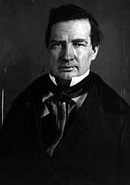
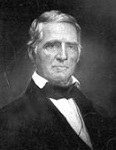
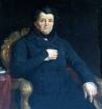



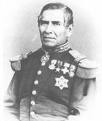

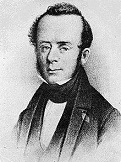

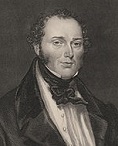



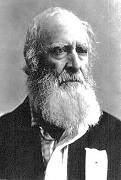






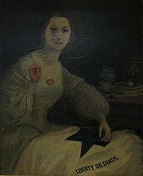



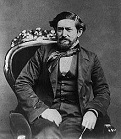

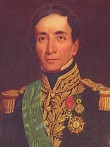






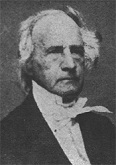

















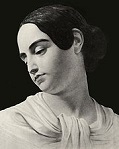
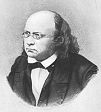
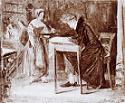


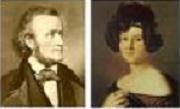
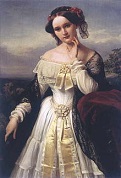

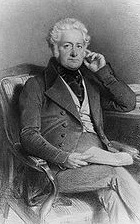


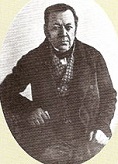


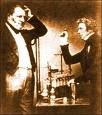
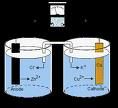
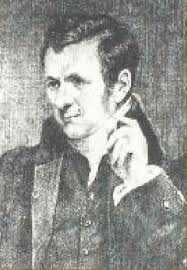
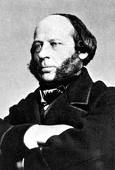

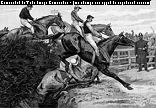
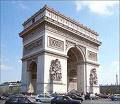
1836 In Rome 4,373 babies are born this year, of which 3,160 are foundlings - it's great to be celibate? On Jan. 16-18 after conquering Legutiano (Villareal de Alava) the Battle of Arlaban (Arlabán) between Alava and Guipuzcoa sees the Liberals under Luis Fernandez de Cordova supported by the British and French driven back by the Carlists with a large number of casualties. In Jan. Charles Darwin (1809-82) encounters his first kangaroo and duck-billed platypus Down Under in Australia; he returns to England from his voyage with a cool collection of specimens from South Am., Australia, the Galapagos, and other Pacific islands, and begins his Journal of Researches in Oct.; stung by the revelations Down Under, "I gradually came to disbelieve in Christianity as a divine revelation." In Jan. Saluda County, S.C.-born lt. col. William Barret "Buck" Travis (b. 1809) leads a small garrison of 30 Texians and U.S. volunteers into the Alamo compound on orders of Provisional Gov. Henry Smith (1788-1851). On Feb. 4 Irish leader Daniel O'Connell (1775-1847) gives his Justice for Ireland Speech in the House of Commons - wake me when it's over? On Feb. 22 French historian Louis-Adolphe Thiers (1797-1877), who started out a radical and turned conservative becomes PM #17 of France (until 1839). In Jan. 1836 Saluda County, S.C.-born lt. col. William Barret "Buck" Travis (b. 1809) leads a small garrison of 30 Texians and U.S. volunteers into the Alamo compound on orders of Provisional Gov. Henry Smith (1788-1851). On Feb. 27 the Battle of San Patricio near San Patricio, Tex. (near the SE coast) is a V for 200 Mexicans under Gen. Jose de Urrea (1797-1849) over 43 Texians under Texian Army co-CIC Francis White "Frank" Johnson (1799-1884), who lose 16 KIA and 24 taken POW, after which Texian Col. James Walker Fannin Jr. (1804-36) is told by survivors that they were all executed, causing him to chuck plans to reinforce the Alamo and secure Presidio La Bahia in Goliad. On Mar. 1-17 after approving the Siete Leyes (Seven Laws), which institute a centralized form of govt. and suspends the 1824 Mexican Constitution, causing civil war to spread across Mexico, with the Repub. of Yucatan, Repub. of the Rio Grande, and Repub. of Texas all scrambling for position, Gen. Antonio Lopez de Santa Anna approaches with an army as 54 delegates of the Convention of 1836, incl. Gen. Sam Houston meet in Washington-on-the-Brazos, Tex. to draw up a constitution; on Mar. 2 (Sam Houston's 43rd birthday) the Repub. of Texas is declared (ends Feb. 19, 1846); Ala. plantation owner Richard Ellis (1781-1846) is elected interim pres., and Lorenzo de Zavala (Manuel Lorenzo Justiniano de Zavala y Sáenz) (1788-1836) interim vice-pres.; meanwhile although Houston orders its Texian defenders to blow it up, the abandoned adobe mission ("nothing but a church... surrounded by poplars" - Houston) called the Alamo (Sp. for poplars) is sieged by 3K-4K Mexican troops led by Gen. Santa Anna, who on Feb. 23 demands surrender, only to be answered with a cannon shot; it is chock-full of 180 colorful gringos, incl. Tenn. frontiersman Davy Crockett (1786-1836) (and his trusty rifle Old Betsy), Col. James Bowie (b. 1796) (bedridden with pneumonia), Penn. surgeon John Purdy Reynolds (b. 1806), N.Y. hatter George C. Kimball (Kimble) (Kimbell) (b. 1803), poet-businessman Micajah Autry (b. 1793) of Tenn., a marksman who is chosen to take Santa Anna out as he walked outside the Alamo wall, and misses; and garrison cmdr. (from S.C.) Lt. Col. William Barret "Buck" Travis (b. 1809), who on Feb. 23 sends local Va.-born resident John William Smith (1792-1845) (mayor #1 of San Antonio in 1837-8) to scout the Mexican Army, and on Feb. 24 he is sent to Gonzales, Tex. with a letter from Travis appealing for aid, returning on Mar. 1; on Mar. 2 (Wed.) (day of the signing of the Tex. Declaration of Independence) local residents John William Smith and S.C.-born Samuel Augustus "Sam" Maverick (1803-70) leave the Alamo carrying a letter from Travis to the Tex. Independence Convention in Washington-on-the-Brazos appealing for aid, arriving on Mar. 5, only to find the convention in recess over the weekend, signing the Texas DOI on Mar. 6 after a special session is convened, too late to prevent the Alamo from falling; on Mar. 3-5 after days of frontal assaults which decimate the completely-surrounded Anglos, Santa Anna sends a letter to Travis demanding surrender or death, and Travis draws a line in the sand with his sword, saying to the men, "Those prepared to give their lives in freedom's cause come over to me", and every man crosses it except Louis (Lewis) "Moses" Rose (1785-1851), who becomes known as "the Coward of the Alamo" and "the Yellow Rose of Texas" (every man that hasn't snuck out yet?); Travis responds to Santa Anna's letter with cannon fire, after which the Mexican army plays the Deguello (Degüello) (Sp. "beheading") bugle call, meaning no quarter to be given; on Mar. 6 (Sun.) (3-6-36) after a 13-day siege, despite fanatical gringo resistance ("Pierce the heart of the enemy as you would a feller that spit in your face, knocked down your wife, burnt up your houses, and called your dog a skunk! Cram his pesky carcass full of thunder and lightning like a stuffed sassidge... nd bite his nose off into the bargain" - Davy Crockett) the Alamo falls on the 3rd assault of the day after the master race defenders run out of ammo and the allegedly inferior but numerically-superior cannon-fodder Mexicans break through the N wall; Santa Anna's English-speaking secy., advisor and interpreter Col. (later Gen.) Juan Nepomuceno Almonte (1803-69) accepts the surrender of the remaining 10-15 Texans, and later helps Santa Anna earn the Texans' goodwill and arranges better surrender terms; Santa Anna heads E for Gonzales; rumors later spread of a cache of gold buried by Col. Bowie in a well; Susanna Wilkerson Dickerson (1814-83) and her baby are the sole adult Anglo survivors, along with about 20 Hispanic women and children and one slave, the rest being put to death and their bodies burned; Mexican losses are 1,544; Davy Crockett pitifully begged for his life?; on Mar. 13 Houston and 188 poorly-equipped men (out of 374 he found on Mar. 6 when the Texians chose him to be their CIC), who set off in early Mar. to save them encounter baby-carrying Dickinson and her servant on the way, hearing her version of the heroic stand, which causes him to begin a series of strategic retreats in despair to E Texas and then to the Gulf Coast, despite grumbles of cowardice from some of his men, and pleas by provisional pres. David Gouverneur Burnet (1788-1870) to fight; meanwhile Burnet moves his govt. to Galveston Island, main port for the Texas navy, and Canadian-born fur trader Michel Branamour Menard (1805-56) buys 4,605 acres on the island for $50K to found the modern Anglo city of Galveston, Tex., which is incorporated in 1839. On Mar. 3 the Nat. Bank of Am. charter expires after Pres. Jackson vetoes its renewal with a speech written by treasury secy. Roger Brooke Taney; anticipating this, state banks expand their discounts, increasing bank circ. from $200M in 1830 to $525M by 1838; there won't be another nat. bank until 1913. On Mar. 15 Roger Brooke Taney (1777-1864) (pr. TAW-nee), pres. Jackson's atty.-gen. (1831-3) and treasury secy. (1833-4) becomes U.S. Supreme Court chief justice #5 and 24th justice of the U.S. Supreme Court (until Oct. 12, 1864), and Philip Pendleton Barbour (1783-1841) of Va. becomes U.S. Supreme Court justice #25 (until Feb. 25, 1841), giving the court six members; Taney becomes the first Roman Catholic justice, causing a big protest; by 2010 the court has no WASP members left, only Roman Catholics and Jews. On Mar. 17 after being appointed by Pres. Sam Houston, Pendleton, S.C.-born Thomas Jefferson Rusk (1803-57) becomes Tex. secy. of war #1, resigning on Nov. 13, 1837 due to domestic problems, going on to become a Tex. rep in 1837-8 and become chmn. of the House Military committee, sponsoring a militia that passes over Houston's veto and being elected its maj. gen.; on Dec. 12, 1838 he is elected chief justice of the Tex. Supreme Court (until June 30, 1840); on Feb. 21, 1846 he becomes a U.S. sen. from Tex. (until July 29, 1857), rising to Senate pres. pro tempore on Mar. 14, 1857. On Mar. 27 the world's first Mormon Temple is dedicated in Kirtland, Ohio., HQ of the Mormon movement in 1831-8 - parking pass for a church? Wanna lose weight while eating the foods you love? On Mar. 27 a detachment of Mexicans under protesting Gen. Jose de Urrea (1797-1849) stage the Massacre of Goliad, massacring 425-445 Texian POWs under orders of Santa Anna, which only makes the Texians madder after 28 escape by faking death; 20 more are spared for medical work after intervention by "Angel of Goliad" Francita Alavez (1816-1906). On Mar. 28 the U.S. signs the Treaty of Washington with the Ottawa and Chippewa, sponsored by Mich. rep. Henry Schoolcraft, ceding 13M acres more to the U.S. On Apr. 3 Moses allegedly appears to Joseph Smith Jr. and Oliver Cowdery in the Kirtland Temple and gives them the "keys of the gathering of Israel from the four parts of the Earth, and the leading of the ten tribes from the land of the north." On Apr. 8 after her first hubby Auguste Charles Eugene de Beauharnais, 2nd Duke of Leuchtenberg (1810-35) (son of Eugene de Beauharnais and grandson of Empress Josephine) dies 2 mo. after the wedding, Maria II of Portugal (b. 1819) marries Prince Ferdinand of Saxony-Coburg-Gotha, who becomes king Ferdinand II (1816-85) (until 1853), and goes on to construct the Romantic Disneyland-like Palacio da Pena summer residence in Sintra in 1842-54, designed by German architect Baron Wilhelm Ludwig von Eschwege (1777-1855). On Apr. 10 the murder of prostitute Helen Jewett ends up exposing the sex industry in New York City after Richard P. Robinson is arrested, put through a high-profile trial and acquitted. On Apr. 11 the city of Newark, N.J on the Passaic River and Newark Bay (modern-day pop. 280K) (incorporated as a town on Oct. 31, 1693) is incorporated as a city, becoming the hub of an industrial center, causing it to be nicknamed "the Brick City". On Apr. 20 Wisconsin Territory (Wisc., Iowa, Minn.) is established by the U.S. Congress, with Henry Dodge (1782-1867) as Dem. gov. #1 on Apr. 30 (until Sept. 13, 1841); the city of Oshkosh on the W shore of Lake Winnebago at the mouth of the Fox River (75 mi. NNW of Milwaukee) (modern-day pop. 66K/160K) is settled about this time, and named in honor of Menominee Indian chief Oshkosh (Ojibwe "claw") in 1840. On Apr. 21 after Maj. Gen. Sam Houston gathers reinforcements, his 900 men, crying "Remember the Alamo! Remember Goliad!", surprise Santa Anna's sleeping (siesta) Mexicans at 4 p.m. at the Battle of San Jacinto on the San Jacinto River near Buffalo Bayou (near modern-day Houston), in a fight which lasts 20 min., and results in Mexican losses of 630 KIA, 208 wounded, 730 taken prisoner vs. Texian losses of 6 (2?) KIA and 13 (30?) wounded; Santa Anna dresses in civies and tries to sneak out, but is captured on Apr. 22, his fine underwear giving him away, not to mention Mexican cries of "El Presidente!" as he is led into camp; he is later rumored to have been preoccupied with mulatto ho Emily West Morgan (Emily of Morgan's Point) (1815-91) in his tent, giving rise to the song The Yellow Rose of Texas (as in high yellow?); Houston is wounded in the right leg, and receives Santa Anna while lying beneath an oak tree, immortalized in the 1890 William Henry Huddle painting Surrender of Santa Anna (housed in the Texas State Capitol in Austin) (Lyndon B. Johnson's great-great-uncle John Wheeler Bunton is shown half-hidden behind a tree trunk); on May 14 after saving him from a lynching, Houston gets Santa Anna to sign the Treaty of Velasco, recognizing Texan independence, with the Rio Grande as the boundary, ending the Texan Rev. (begun 1835), although the Mexican Congress repudiates it; the Lone Star Flag of Tex., designed by Joanna (Johanna) Troutman (1818-79) is first flown over Velasco on Jan. 8; on May 27 Lorenzo de Zavala et al. are appointed by the peace commission to escort Santa Anna back to Mexico City to argue for Texan independence, but the plan is scrapped. On Apr. 23 the U.S. signs a treaty with the Wyandot - did they read the fine print below the dotted line? On May 16 27-y.-o. Edgar Allan Poe (b. 1809) marries his 13-y.-o. first cousin Virginia Eliza Clemm (1822-47), who dies of TB, launching his drunken downhill slide, immortalizing her as Lenore. On May 20 the Irish Constabulary Act reorganizes and extends the central police force - more potato mashers? On June 5 William Grant Broughton (1788-1853) becomes the first and only Anglican bishop of Australia - cheer for the home team, hit a home run? On June 15 "Natural State" Arkansas (Ark.) is admitted as the 25th U.S. (slave) state, and adopts an Arkansas Constitution on Sept. 12; "If I could rest anywhere, it would be in Arkansas, where the men are of the real half-horse, half-alligator breed such as grows nowhere else on the face of the universal earth" (Davy Crockett); in 1881 the legislature passes a resolution that the state's name is to be pronounced like "Arkansaw" not "Arkansas". On June 16 La Presse (conservative), founded by Emile de Girardin (1802-81), and Le Siecle (Siècle) (leftist) (ends 1932), founded by Armand Dutacq launch the cheap press in France - I know you want to hit back, that's the way those things go? On June 23 the U.S. Congress passes the U.S. Deposit (Distribution) Act, distributing the annual surplus of the federal govt. as loans to the states beginning next Jan. 1. In June after Protestant Irish (Cork) MP (since 1832) Feargus Edward O'Connor (1796-1855) is unseated in 1835 for failing to meet property qualifications, pissing him off and causing him to start the Nat. Land Co. (Land Plan), a reform movement to give small landholdings to laoborers, the First Chartist Petition (first pub. in May 1838) is presented to Parliament along with 1.25M signatures, calling for universal male suffrage without a property requirement, salaries for MPs, annual gen. elections and secret ballot, getting the nat. working class Chartist Movement in Britain off to a bang, garnering 1,283K signatures; too bad, they reject it by 235-46, after which many leaders are arrested for calling a gen. strike, and O'Connor gives his Manchester Speech, threatening violence on Sept. 29 if the demands are not met, causing 3K demonstrators led by John Frost (1784-1877) of Blackwood, Caerphilly to march on Newport Prison in Monmouthshire on Nov. 4, hoping to spark a Britain-wide revolt against the govt. and gentry, which the govt. answers by firing on the crowd, killing 24 and wounding 40 - you have no more rights than crap in a toilet in Britain? On July 4 Congress authorizes a new U.S. flag with 25 stars (design #7), which incl. Arkansas - What's that? My Arkansas rat - sick 'em, puss? On July 4 the U.S. Patent Act of 1836 creates the first U.S. Patent Office as a separate org. within the U.S. Dept. of State; while awaiting construction of a new fireproof bldg. for its records, they burn in a fire on Dec. 15 while housed in the Gen. Post Office, and 7K+ patents are permanently lost. On July 11 treasury secy. Roger Brooks Taney's U.S. Specie Circular (Coinage Act) is issued as an executive order by Pres. Jackson, providing that after Aug. 15 the federal govt. will accept only gold and silver in payment for lands, with the exception of actual settlers, who may pay with bank notes; too bad, instead of helping end speculation, it puts all in their hands as they are the only ones who can get their hands on specie, and banks start to call in their loans, avalanching into a panic by next year. On Aug. 11 an article on Mormonism in the Ohio Observer by Truman Coe calls it "one of the most palpable and wide-spreading delusions which this country has ever seen". On Aug. 17 the 1836 British Marriage Act (effective on Jan. 1) introduces civil marriage to Britain, and allows nonconformist ministers to perform them in unconsecrated bldgs; civil weddings for members of the British royal family are made illegal (until 1949); for the first time marriage between a man and his deceased wife's sister is made illegal even though it's not really incest but but but Henry VIII got away with it with Catherine of Aragon then used it as an excuse for a divorce, and it takes until 1907 to repeal that clause; meanwhile those who want to try it begin leaving the country to do it in Norway, Italy et al., and are left alone until the 1861 case of Brook v. Brook decides that since their domiciles are in England that's enough to nix it. On Aug. 26 the town of Houston, Tex. (named after Sam Houston) (modern-day pop. 2.1M/6.3M) is founded on Buffalo Bayou (modern-day Allen's Landing) by Canaseraga Village (modern-day Sullivan), N.Y.-born brothers Augustus Chapman Allen (1806-64) and John Kirby Allen (1810-38) after purchasing 6,642 acres from John Austin's widow Elizabeth E. Parrott for $5K; it becomes the capital of the Repub. of Texas on Nov. 30, and is incorporated next June 5.; meanwhile the Lone Star Repub. drafts a constitution, voting for annexation to the U.S., which balks, fearing a war with Mexico; on Sept. 5 big Anglo hero Sam Houston is elected as pres. #1 of the Repub. of Texas, which is proclaimed on Oct. 1, and he is sworn in on Oct. 22 (until Dec. 10, 1838),; Zavala resigns on Oct. 17; meanwhile the Lone Star Repub. drafts a constitution, voting for annexation to the U.S., which balks, fearing a war with Mexico; on Sept. 5 big Anglo hero Sam Houston is elected as pres. #1 of the Repub. of Texas, which is proclaimed on Oct. 1, and he is sworn in on Oct. 22 (until Dec. 10, 1838),; Zavala resigns on Oct. 17. On Sept. 8 the Transcendental (Hedge) Club is founded in Cambridge, Mass. by Unitarian minister Frederic(k) Henry Hedge (1805-90), meeting in the house of George Ripley (1802-80), and incl. members Ralph Waldo Emerson (1803-82), Amos Bronson Alcott (1799-1888), Sarah Margaret Fuller (1810-50) (teacher at the Temple School in Boston, founded by Alcott in 1834 in a Masonic Temple, which ends up getting closed in 1839 after his eccentric methods and admission of a black student piss the parents off), Theodore Parker (1810-60) et al., all getting turned on by Thomas Carlyle and his fetish for German lit., and rebelling against Puritanism, prefering to dip into vague pantheism, mysticism, idealism, and eclectic orientalism in some kind of undefined effort to perfect themselves, creating funky laid-back new Transcendentalism, which believes in the goodness of man and Nature, and distrusts organized religion, promoting self-reliance. On Sept. 9 Abraham Lincoln (1809-65) receives his law license, and practices law in Springfield, Ill. for the next 20 years (except 1847-9), becoming one of the Long Nine 6-footers (a Whig) who represent Sangamon County, Ill. in the legislature in 1836-7 and help make the county seat of Springfield the state capital. On Oct. 12 after William IV charters it to get around the Canadian govt., Victoria U., Toronto is founded in Toronto, Ont., Canada by the Wesleyan Methodist Church. In Oct. Charles Louis Napoleon Bonaparte (1808-73) (future Napoleon III) secretly returns to France and leads a failed revolt of the Strasbourg garrison, and is banished to New York City (until 1840). On Nov. 3-Dec. 7 after the Nat.-Republican Party of J.Q. Adams, Henry Clay, and Daniel Webster unites with Anti-Masons, Dems. and others alienated by "King Andrew I" and form the Whig Party, and 28 of the 41 Dems. in Congress who had voted to recharter the nat. bank join, the 1836 U.S. Pres. Election sees Martin Van Buren benefit from the deceptively rosy economy (which waits to fall apart until after he takes office) and beat the entire Whig field, receiving 765K popular votes to their 740K, and 170 electoral votes to 73 for Harrison (who supports the use of federal money for internal improvements and the reopening of the Bank of the U.S.), 26 for White, and 14 for Webster (113 total); the first nat. election in which the issue of slavery is important, with Van Buren claiming that Congress has the right to outlaw it in the District of Columbia, but that he personally opposes the move; the Dem. Party of Van Buren, devoted to a small federal govt. that hates banks and tariffs stays intact until at least Pres. Grover Cleveland's admin., when "Great Commoner" William Jennings Bryan wants it have a more active role, starting it on a path leading to FDR's new Deal? In Nov. Russian poet Alexander Pushkin receives a letter naming him to the Most Serene Order of Cuckolds, pissing him off and causing him to seek a duel with the wife-stealer, who turns out to be his brother-in-law Baron Georges-Charles de Heeckeren d'Anthes (d'Anthès) (1812-95) AKA Dantes-Gekkern, a French officer of the Chevalier Guard Regiment who seduced his wife Natalia Nikolayevna Pushkina (Pushkina-Lanskaya) (nee Goncharova) (1812-63), who kills him on Jan. 27, 1837, is imprisoned in Peter and Paul Fortress in St. Petersburg, pardoned by Tsar Nicholas I, and exiled, ending up in France, where he becomes a senator in the Nat. Constituent Assembly in 1852-70; in 1844 Natalia marries Maj.-Gen. Petr Petrovich Lanskoy (1799-1877). On Dec. 28 the Seminoles under their half-English half-Creek leader Osceola (1804-38) massacre U.S. troops under Maj. Dade, starting the Second Seminole War (ends 1842). On Dec. 28 the city Adelaide on the SE coast of South Australia on the Torrens River between Gulf St. Vincent and the Mount Lofty Ranges (modern-day pop. 1.3M) is founded, named after William IV's consort Queen Adelaide; the original pop. of 1K Kaurna (pr. GAR-ner) aborigines lose their way of life within 20 years, and the last surviving full-blood woman named Ivaritji dies in 1931. The U.S. wheat crop fails this year, adding more pressure on the teetering economy; the federal govt. loses $9M in pet banks which close. Mo. Sen. Thomas Hart Benton (1782-1858), who served under Pres. Jackson in the War of 1812 leads a successful movement to have the 1834 censure vote against him expunged from the record, despite speeches by Senate giants Clay, Calhoun and Webster; Jackson calls this the "crowning mercy" of his political life; John Tyler resigns from the U.S. Senate rather than follow instructions from the Va. legislature to vote to expunge Jackson's censure. The first gag rules in the land of free speech? Tired of the flood of antislavery petitions, many from pesky women, the U.S. Congress passes Gag Rules (effective Dec. 4, 1837), the Senate deciding to receive but automatically reject them, and the House deciding to receive but automatically table them; in 1840 the House decides not to receive them at all; after years of efforts by U.S. Rep. (formerly Pres.) J.Q. Adams, Northern Democrats and Northern Whigs end gag rules in 1844. Charleston, S.C.-born Bernard Elliot Bee Sr. (1787-1853) moves to Houston, Tex. and takes part in the Texas Rev., serving as Tex. treasury secy. in 1836, war secy. in 1837-8, and secy. of state in 1839, followed by ambassador to the U.S. in 1980-1, negotiating the treaty recognizing the Texas Repub. and going on to oppose annexation before returning to Charleston, leaving sons sons Hamilton Prioleau Bee (1822-97) and Barnard Elliott Bee Jr. (1824-61), who become U.S. Civil War Confed. gens.; Barnard Bee Jr. becomes one of the first generals KIA in the Civil War after coining the nickname "Stonewall" for Confed. Gen. Thomas J. Jackson; Beeville, Tex.. is later named in papa Bee's honor. After a recommendation from his great-uncle Andrew Jackson, Wilson County, Tenn.-born John Coffee "Jack" Hays (1817-83) is appointed to the Texas Rangers by Sam Houston as a capt., going on to lead a campaign against the Comanche in Tex. alongside Apache Chief Flacco, culminating in the Battle of Plum Creek near Lockhart, Tex. on Aug. 12, 1840. The U.S. Navy appoints the first-ever engineer, followed by the British Navy next year; in 1843 the U.S. Engineer Corps is officially organized. Idaho (Id.) is settled by Presbyterian missionary Henry Harmon Spalding (1830-74) and his wife Eliza Hart Spalding (1807-51), who establish a Nez Perce mission at Lapwai, going on to try to prove that the stone age suckers can feed themselves as good as whites by planting the first lily-white spuds, er, potatoes in Idaho. Peruvian pres. #12 (1834-5) Luis Jose de Orbegoso y Moncada-Galindo, de Burutaran y Morales (1795-1847) and Bolivian pres. #7 (1829-39) Marshal Andres de Santa Cruz y Calahumana (1792-1865) create the Peruvian-Bolivian Confederation, but Santa Cruz is overthrown in 1839 and the confederation disbanded. A revolt in newly independent Uruguay between the Blancos under current pres. (1835-8) Manuel Ceferino Oribe y Viana (1792-1857) and the Colorados under first pres. Jose Fructuoso Rivera breaks out, touching off nearly 50 years of factional strife with occasional armed intervention from Argentina (for the Blancos) and Brazil (for the Colorados). Afghani ruler Dost Mohammed assumes the title of amir (emir) al-mu'minin (cmdr. of the faithful) and declares jihad against the Sikhs, then unsuccessfully attempts to recapture Peshawar. A courthouse is erected in Dahlonega, Ga. in N Ga. to handle the many mine claims caused by the gold rush; meanwhile regional railroad hub Terminus is founded, later being renamed Marthasville and then Atlanta, Ga. Samuel F.B. Morse runs for mayor of New York on the Native Am. (Know Nothing) Party ticket after writing two books claiming that U.S. Roman Catholicism is a plot of foreign monarchs to undermine liberty. The city of Dearborn, Mich. is founded, named ater Am. Rev. War gen. and war secy. (under Pres. Jefferson) Henry Dearborn (1751-1829), later becoming the site for the Ford Motor Co. Tulsa, Okla. is founded in Indian Territory near the Arkansas River by the Lochapoka and Creeks under the Creek Council Oak Tree (Cheyenne and 18th St.) after Chief Tukabahchi is reminded of their old tree in Talisi, Ala., naming the settlement Tallasi (Creek "old town"); more members of the Five Civilized Tribes later settle there, incl. the Cherokee and Osage; it is officially incorporated on Jan. 18, 1898. The trading post later known as Ft. Laramie comes into the possession of the Am. Fur Co. Manchester, Conn. (9 mi. E of Hartford) begins manufacturing silk products, causing the price of mulberry saplings to shoot up from $4 to $30 per hundred. The British introduce tea to India. The U.S. Mint begins issuing the Seated Liberty Dime (until 1891), becoming the first official U.S. dime. A visitor to Lowell, Mass. deplores working conditions in factories. The Patent Arms Manuf. Co. is founded in Paterson, N.J. by Samuel Colt (his first factory) to manufacture revolvers and rifles. Pres. Jackson appoints Robert Mills (1781-1855) as official U.S. architect (until 1851), going on to design Classic Revival bldgs. incl. the Treasury Bldg. (1836), Patent Office Bldg. (1836), Gen. Post Office (1839), and Washington Monument (1848). Williston, Vt.-born Rev. Miron Winslow (1789-1864) sets up a Protestant mission in Madras, India. The great U.S. Drew-Barrymore acting dynasty begins with Clark Kent and Lois Lane in Philly? Child prodigy actress Louisa Lane (1820-97) performs Lady Macbeth at age 16 before marrying Irish actor John Drew (1827-62), managing the Arch Street Theater in Philadelphia, Penn., and having children John Drew Jr. (1853-1927) (Petruchio in "The Taming of the Shrew") and comic actress Georgiana Drew (1856-1893), who in 1876 marries English-born supporting actor Maurice Barrymore, founding the Drew-Barrymore Acting Dynasty. John Brinsmead (1814-98) begins making pianos in London. Plattdeutsch (Low German) revivalist Fritz Reuter (1810-74), a member of the liberal Burschenschaft club is sentenced to death for high treason, but the sentence is commuted to 30 years in a Prussian fortress - things aren't doing well, I want to be free? This is Fritz, Fritz is doing well, very well indeed? Russian writer Nikolai Gogol moves to Rome (until 1848), where he works on his opus "Dead Souls". Austrian ballerina Fanny Elssler (Parisian rival of Marie Taglioni) first dances the Spanish cachucha castanet dance, causing a sensation. A dance known as "The Lancers" becomes the rage in Europe. Super-sensitive precious Danish religious genius Soren Kierkegaard (1813-65), who had a fall from a tree as a boy that messes up his health attends a wedding party for Peter Kierkegaard, where Hans Brochner describes the dude: "He had something quite irregular in his entire form and had a strange coiffure. His hair rose almost six inches above his forehead into a tousled crest that gave him a strange bewildered look"; too bad, next year he meets beautiful babe Regine Olsen (1822-1904), proposes to her in 1840, then suddenly breaks it off in 1841 because of his belief that he is too "melancholy" for her, after which she marries some civil servant and they never speak again - never say cake again? After a stormy courtship, German composer Richard Wagner (b. 1813) marries his first wife, actress Christine Wilhelmine "Minna" Planer (1809-66) in Magdeburg; in 1857 after he begins an affair with younger babe, German poet Mathilde Wesendronck (Agnes Mathilde Luckemeyer) (1828-1902). Congregationalist minister Mark Hopkins (1802-87) becomes pres. of Williams College in Mass (until 1872), turning it into a top center for foreign missionary training. Emory U. (originally Emory College), named after Methodist Episcopal bishop John Emory (1789-1835) is founded in the new town of Oxford, Ga., relocating to Atlanta, Ga. in 1915 after a land grant by Coca-Cola Co. founder Asa Griggs Candler, causing it to become known as the Coca-Cola U. The Du Buque Visitor, the first newspaper in Iowa begins pub. on May 11. English publisher Richard Bentley (1794-18710 begins pub. the lit. mag. Bentley's Miscellany (until 1868), with Charles Dickens as ed. (until 1839), then William Harrison Ainworth (until 1842); going on to pub. stories by Charles Dickens (1812-70) (incl. "Oliver Twist"), Wilkie Collins (1824-89), Thomas Moore (1779-1852), Thomas Love Peacock (1785-1866), and Mrs. Henry Wood, plus the cartoons of John Leech; it also features The Ingoldsby Legends by Rev. Richard Harris Barham (1788-1845). Confiserie Sprungli (Sprüngli) In 1836 Confiserie Sprungli (Sprüngli) (originally David Sprungli & Son) is founded in Zurich, Switzerland by David Sprungli-Schwarz (David Sprüngli-Schwarz) and his son Rudolf Sprungli-Ammann (Sprüngli-Ammann) to produce chocolates; in 1845 they move to the fashionable Paradeplatz; in 1892 Rudolf retires, and the business is split, with elder brother Johann Rudolf receiving the chocolate business under the name Chocolat Sprungli, and younger brother David Robert receiving the confectionery stores; in 1899 the Lindt chocolate factory in Bern is acquired for 1.5M gold francs, founding Lindt & Sprungli (Lindt & Sprüngli); in 1949 Lindt introduces the Lindor truffle ball; in 1952 it introduces the Lindt Gold Bunny hollow milk chocolate rabbit; in 1994 it acquires Austrian chocolate co. Hofbauer Osterreich, makers of the Kufferle (Küfferle) brand; in 1997 it acquires Caffarei of Italy, followed in 1998 by Ghirardelli of the U.S. Sports: On Feb. 23 the first 4 mi. 4 furlong Grand Nat. Horserace is run at Aintree Racecourse in Liverpool, England, and is won by The Duke this year and next, followed by Sir William in 1838 (The Duke was 3rd); there are 16 fences in the course, of which all except the Chair and the Water Jump are jumped twice; the 6th jump known as Beecher's Brook becomes infamous for injuries and fatalities to horses. On July 11-2 the first North v. South Cricket Match is played in Lord's Ground in St. John's Wood, London, ending up as the showcase for the top 22 players in England. The Waterloo Cup is founded by the Nat. Coursing Club for its annual coursing meet on the Altcar Course near Liverpool, where greyhounds chase hares by sight. Architecture: On July 29 the 164' x 148' x 72' (50m x 45m x 22m) Arc de Triomphe (commissioned by Napoleon on Aug. 15, 1806 after the V at the Battle of Austerlitz) on the right bank of the Seine River in Paris is completed at the center of a duodecagonal configuration of 12 radiating avenues. On Dec. 14 neo-classical St. James's Theatre at King St. and Duke St. in St. James's, London, England (cap. 1,200) opens, with a Louis XIV style interior; in 1840-1 it changes its name to Prince's Theatre; it closes on July 27, 1957. Inventions: Bearnaise (Béarnaise) Sauce, consisting of egg yolk and butter flavored with shallots, chervil, and tarragon vinegar, and served on steak is invented by Chef Collinet (inventor of puffed potatoes), and first served at the opening of Le Pavillon Henri IV Restaurant in Saint-Germain-en-Laye near Paris; named after the Bearn region of SW France, where gourmet Henry IV was born; Hollandaise sauce substitutes lemon juice for the tarragon vinegar. Swedish-born Am. inventor John Ericsson (1803-89) patents a screw propeller, which is first used on the London-built SS Francis B. Ogden in 1837. H. Hoare and J. Hascall invent the Combine Harvester. Alonzo Dwight Phillips of Springfield, Mass. on Oct. 24 patents the white phosphorus loco foco or lucifer, the Friction Match, which can be struck on any rough surface, made by hand from chalk, glue, phosphorus, and sulfur; by the 1860s 1M matches a day are being manufactured. English physicist William Sturgeon invents a galvanometer. Science: English astronomer Francis Baily (1774-1844) first observes Baily's Beads during an annual solar eclipse on May 15 in Inch Bonney, Roxburghshire. English scientist John Frederic Daniell (1790-1845) develops the Daniell Cell (AKA Gravity Cell, Crowfoot Dell), a voltaic cell that cures the polarization problem of the Voltaic Pile by isolating the copper and zinc ions from each other with a semipermeable membrane, allowing longer operation. English chemist (in Ireland) Edmund Davey (1785-1857) discovers acetylene gas, recognizing its value as an illuminating gas; too bad, it is forgotten until Marcellin Berthelot rediscovers it in 1860 after a zillion whales are butchered for their lousy tallow. Edward Hitchcock pub. an article about fossil footprints in the Conn. River Valley. Czech physiologist Jan Evangelista Purkinje notes the protein-digesting ability of pancreatic extracts. French physician Etienne (Étienne) Geoffroy Saint-Hilaire (1772-1844) coins the term "phocomelia" for the disorder involving malformation or absence of limbs. German naturalist Karl Friedrich Schimper (1803-67), known for proposing his scientific ideas in poetic form and never getting an academic appointment begins researches into the Pleistocene Epoch - the first beatnik scientist? English physicist William Henry Fox Talbot (1800-77) discovers Talbot's Carpet, an interference pattern created when light passes through a series of parallel slits; in 2013 Martin McCall et al. of Imperial College London use it to create a way to cloak info. in data streams. New York State sponsors a natural history survey (ends 1842), which establishes U.S. geologists as a force; Maine sponsors a geologic survey (ends 1844). Nonfiction: Anon., Awful Disclosures of Maria Monk as Exhibited in a Narrative of Her Suffering During a Residence of Five Years as a Novice and Two Years as a Black Nun in the Hotel Dieu Nunnery at Montreal; anti-Catholic hoax bestseller (300K copies by 1860). Jean-Francois Champollion (1790-1832), Egyptian Grammar (1836-41) (posth.). Rosamond Culbertson, Rosamond; or, A Narrative of the Captivity and Sufferings of an American Female under the Popish Priests in the Island of Cuba, with a Full Disclosure of Their Manners and Customs, Written by Herself (autobio.); a Roman Catholic nun runs away from her convent; bestseller. Johann Gustav Droysen (1808-84), History of Greece (1836-43). Johann Peter Eckermann (1792-1854), Conversations with Goethe (Gesprache mit Goethe) (3 vols.) (1836-48). Ralph Waldo Emerson (1803-82), Nature (Boston). John Forster (1812-76), Lives of the Statesmen of the Commonwealth (1836-9). Albert Gallatin (1761-1849), Synopsis of the Indian Tribes within the United States, East of the Rocky Mountains, and in the British and Russian Possessions of North America. Johann Joseph von Gorres (1776-1848), Christian Mysticism (4 vols.) (1836-42). Heinrich Heine (1797-1856), Die Romantische Schule. Godfrey Higgins (1772-1833), Anacalypsis, An Attempt to Draw Aside the Veil of the Saitic Isis, or An Inquiry Into the Origin of Languages, Nations and Religions (2 vols.) (London) (posth.); his magnum opus; anacalypsis = opposite of apocalypse; unfinished work on the history of religion that claims that the Druids and Jews originated in India, and that Abraham is really Brahma, and that there is a secret "pandeist" global movement. Edward William Lane (1801-76), Manners and Customs of the Modern Egyptians; becomes the std. work. William Holmes McGuffey (1800-73), McGuffey Reader. Augustus De Morgan (1806-71), An Explanation of the Gnomic Projection of the Sphere. Frantisek Palacky (1798-1876), The History of the Bohemian People (5 vols.) (1836-67); covers up to 1526. James Kirke Paulding (1778-1860), View of Slavery in the United States. Constantine S. Rafinesque, The Walum Olum, or Red Score; pub. in Am. Nations mag. by a prof. at Transylvania U. in Lexington, Ky.; an alleged trans. of an ancient history of the Delaware Indians derived from a collection of sticks, describing the crossing of the Bering Strait land bridge. Arthur Schopenhauer (1788-1860), On the Will in Nature (Uber den Willen in der Natur). Richard Penn Smith, Col. Crockett's Exploits and Adventures in Texas, Written by Himself; fake bio. by a newspaper editor that took 24 hours to write. Philip Stanhope, 5th earl Stanhope (1805-75), History of England from the Peace of Utrecht to the Peace of Versailles, 1713-1783 (7 vols.) (1836-53). Music: Adolphe Charles Adam (1803-56), Le Postillon de Lonjumeau (opera) (Opera Comique, Paris). Daniel Auber (1782-1871), L'Ambassadrice (opera) (Opera Comique, Paris). Luigi Cherubini (1760-1842), Requiem in D minor; uses a male choir only after religious ashholes diss his use of females; composes it to be performed at his own funeral. Mikhail Glinka (1804-57), A Life for the Tsar (first Russian opera) (Bolshoi Theatre, St. Petersburg) (Nov. 29); patriot Ivan Susanin fights to expel the Poles for Romanov tsar #1 Michael. Heinrich Marschner (1795-1861), Das Schloss am Atna (opera). Felix Mendelssohn (1809-47), St. Paul (oratorio) (Dusseldorf). Giacomo Meyerbeer (1791-1864), Les Huguenots (opera) (Paris Opera) (Feb.29); libretto by Eugene Scribe and Emile Deschamps; first opera to be performed at the Paris Opera more than 1000x (May 16, 1906); stars Adolphe Nourrit and Cornelie Falcon (as Marguerite de Valis), whose voice fails next Apr.; incl. O Beau Pays. Art: Thomas Cole (1801-48), Destruction. Jean-Baptiste-Camille Corot (1796-1875), Diana Surprised by Actaeon. Pierre Etienne Rousseau (1812-67), La Descent des Vaches (Descent of the Cattle); rejected as junk for the trunk by the Salon, although they like his works of 1831 and 1834, causing years of artistic exile (until 1848) - neither you nor any of your dumb little buddies should attempt any of what you're about to hear? Francois Rude, La Marseillaise (relief sculpture on the Arc de Triomphe). Plays: Casimir Delavigne (1793-1843), Une Famille au Temps du Luther. Alexandre Dumas pere (1802-70), Don Juan de Marana. Nikolai Gogol (1809-52), The Inspector General (The Government Inspector); the greatest Russian (and European) play?; about Klestakhov, who arrives in a small town, is mistaken for a you know what, and offered bribes by local officials to overlook their misconduct? Poetry: Oliver Wendell Holmes Sr. (1809-94), Poems. Count Zygmunt Krasinski (1812-59), Irydion. Alphonse de Lamartine (1790-1869), Jocelyn. Nikolaus Lenau (1805-50), Faust; writes it after spending 1832-3 in New Harmony, Ind. and getting sick of their "Englisches Talergelispel" (eternal lisping of dollars). Karel Hynek Macha (1810-36), Maj (May) (epic poem); classic of Czech Romanticism. Novels: Thomas Carlyle (1795-1881), Sartor Resartus: The Life and Opinions of Herr Teufelsdrockh; written in 1831 and first pub. in Fraser's Mag. in 1833-4; contains his "philosophy of clothes", comments on human society and life in gen., and a semi-autobio. philosophical romance. Charles Dickens (1812-70), Posthumous Papers of the Pickwick Club (The Pickwick Papers) (serialized in 1837); begins as lit. commentary for humorous drawings by Robert Seymour at Chapman and Hall, bringing him instant fame and going internat., with 400K copies/mo. sold; Mr. Samuel Pickwick, pres. of the Pickwick Club, happy-go-lucky medical students Bob Sawyer and Ben Allen. Theodore Edward Hook (1788-1841), Gilbert Gurney. Karl Immermann (1796-1840), Die Epigonen (3 vols.). Frederick Marryat (1792-1848), Mr. Midshipman Easy; autobio. novel by a retired British navy capt. Alfred de Musset (1810-57), The Confession of a Child of the Century (La Confession d'un Enfant du Siècle), an autobio. novel about his 1833-5 love affair with George Sand, filmed in 1999 as "Children of the Century" and in 2012 as "Confession of a Child of the Century". Alexander Pushkin (1799-1837), The Captain's Daughter; about Pugachev's Rebellion of 1773-5. Frances Trollope (1780-1863), The Adventures of Jonathan Jefferson Whitlaw. Births: French realist painter Ignace Henri Jean Theodore Fantin-Latour (d. 1904) on Jan. 14 in Grenoble; known for his flower paintings and group paintings of Parisian artists and writers. his portrait bears a striking resemblance to Hollywood actor Brad Pitt (1963-)? Sicilian Bourbon king #5 (last) (1859-60) Francis II (d. 1894) on Jan. 16 in Naples; son of Ferdinand II (1810-59). Austrian "Venus in Furs" novelist Leopold Ritter von Sacher-Masoch (d. 1895) on Jan. 27 in Lemberg, Galicia (Lviv, Ukraine); great-great-uncle to Marianne Faithfull (1946-); signs a 6-mo. contract with mistress Fanny Pistor in Dec. 8 to be her sex slave; husband (1873-?) of Aurora von Romelin, who doesn't go for the fur thing, causing him to leave her for his asst.; the term "masochism" is coined from his name by sexologist Richard von Krafft-Ebing in 1886. Spanish Romantic poet Gustavo Adolfo Becquer (Bécquer) (d. 1870) on Feb. 17 in Seville. Indian Hindu guru-saint Sri Ramakrishna Paramhamsa (Gadadhar Chattopadhyay) (d. 1886) on Feb. 20 in Kamarpukur, Bengal; teacher of Swami Vivekananda (1863-1902). Am. "Breezing Up" artist Winslow Homer (d. 1910) on Feb. 24 in Boston, Mass. Am. Symbolist painter Elihu Vedder (d. 1923) on Feb. 26 in New York City. U.S. Supreme Court justice #52 (1890-1906) Henry Billings Brown (d. 1913) on Mar. 2 in South Lee, Mass.; educated at Yale U.; classmate of David Josiah Brewer, who calls him Henrietta. Am. Civil War Union gen. and U.S. state secy. #32 (1892-3) John Watson Foster (d. 1917) on Mar. 2 in Petersburg, Ind.; grows up in Evansville, Ind.; educated at Indiana U., and Harvard U. English journalist and household engineer Mrs. Beeton (Isabella Mary Beeton) (nee Mayson) (d. 1865) on Mar. 12 in Cheapside, London; wife of mag. ed. Samuel Orcher Beeton. French painter Jules Joseph Lefebvre (d. 1911) on Mar. 14 in Seine-et-Marne. English "Israel in Egypt" painter Sir Edward John Poynter, 1st Baronet (d. 1919) on Mar. 20 in Paris; educated at Ipswich School and Brighton College; knighted in 1896; created baronet in 1902. Am. Pabst Brewing Co. founder Johann Gottlieb Friedrich "Frederick" Pabst (d. 1904) on Mar. 28 in Nikolausrieth, Saxony, Prussia, Germany; emigrates to the U.S. in 1848. Am. music lover (founder of the Juilliard School of Music) Augustus D. Juilliard (d. 1919) on Apr. 19; born at sea en route from France; French Huguenot immigrant parents from Burgundy. Am. historian-atty. John Codman Ropes (d. 1899) on Apr. 28 in St. Petersburg, Russia; educated at Harvard U. Am. Wichita, Kan. co-founder James R. Mead (d. 1910) on May 3 in New Haven, Vt. Am. Repub. politician (in Ill.) and U.S. House Speaker (1903-11) (Quaker) Joseph Gurney "Uncle Joe" Cannon (d. 1926) on May 7 in Guilford County, N.C. Am. world chess champ #1 (1886-94) (Jewish) William (Wilhelm) Steinitz (d. 1900) on May 17 in Prague, Bohemia; emigrates to the U.S. in 1883; founder of the positional style of play. English chocolatier-philanthropist (Quaker) Joseph Rowntree (d. 1925) on May 24 in York; brother of Henry Isaac Rowntree (1837-83); father of Benjamin Seebohm Rowntree (1871-1954). English feminist physician Elizabeth Garrett Anderson on June 9 in Aldeburgh, Suffolk; sister of Millicent Fawcett (1847-1929); first licensed female physician in Britain (1865), first female member of the British Medical Assoc. (1873), and first female mayor in England (1908). U.S. Repub. treasury secy. #42 (1897-1902) Lyman Judson Gage (d. 1927) on June 28 in DeRuyter, N.Y. British #1 statesman Joseph Chamberlain (d. 1914) on July 8 in Camberwell, London; father of Sir Austen Chamberlain (1863-1937); starts out at the far left of the Liberal Party and moves to the extreme right of the Conservative Party. Polish banker (Jewish convert to Calvinism) Jan Gotlib (Bogumil) (Ivan Sanislavovich) Bloch (d. 1902) on July 24 in Radom; educated at the U. of Berlin. Am. #1 dentist ("Father of Operative Dentistry") Greene Vardiman "G.V." Black (d. 1915) on Aug. 3 in Winchester, Ill. - who wants to bring his bad teeth to a greene black? English "Dorothy Forster" novelist-historian (Freemason) Sir Walter Besant (d. 1901) on Aug. 14 in Portsmouth; educated at King's College, London and Christ's College, Cambridge U.; collaborator of James Rice (1843-82). Am. "Spirit of '76" painter Archibald MacNeal Willard (d. 1918) on Aug. 22 in Bedford, Ohio. Am. "Luck of Roaring Camp", "Outcasts of Poker Flat" writer-poet Francis Bret Harte (d. 1902) on Aug. 25 in Albany, N.Y.; moves to Calif. in 1854. British Liberal statesman and PM (1905-8) Sir Henry "CB" Campbell-Bannerman (d. 1908) on Sept. 7 in Glasgow; son of Sir James Campbell of Stracathro, Forfarshire; educated at the U. of Glasgow, and Trinity College, Cambridge U.; first fird lord of the treasury to be officially called prime minister; first person to hold the positions of PM and father of the house (until ?). Am. railroad financier ("King of the Robber Barons") (Jewish) (agnostic) Jason "Jay" Gould (d. 1892) on Sept. 10 in Roxbury, Queens, N.Y.; partner of Jim Fisk and Daniel Drew; educated at Hobart College. Am. "The Hasheesh Eater" journalist-explorer Fitz Hugh (Fitzhugh) Ludlow (d. 1870) on Sept. 11 in New York City; educated at Princeton U., and Union College. Am. Civil War Union brig. gen. William Jackson Palmer (d. 1909) on Sept. 18 in Leipsic, Del. French feminister writer Juliette Adam (Lambert) (d. 1936) on Oct. 4 in Verberie, Oise. South African Boer gen. Piet Arnoldus Cronje (d. 1911) on Oct. 4 in Transvaal. French "Lilacs" painter James (Jacques Joseph) Tissot (d. 1902) on Oct. 15 in Nantes. Welsh "Rhys Lewis" novelist Daniel Owen (d. 1895) on Oct. 20 in Mold, Flintshire. Am. "Harp of the Winds" landscape painter Homer Dodge Martin (d. 1897) on Oct. 28 in Albany, N.Y.; pupil of James MacDougal Hart. Am. cash register inventor James Jacob Ritty (d. 1918) on Oct. 29 in Dayton, Ohio. U.S. Sen. (R-Ala.) (1868-79) Gen. George Eliphaz Spencer (d. 1893) on Nov. 1 in Champion, N.Y.; founder of Breckenridge, Colo. Am. "The Epicurean" chef Charles Ranhofer (d. 1899) on Nov. 7 in St.-Denis, France; emigrates to the U.S. in 1856; head chef of Delmonico's in New York City (1862-76, 1879-96); first internationally known chef from a U.S. establishment; names a new lobster dish after a sea captain named Ben Wenberg, but gets pissed-off at him and changes the name to Lobster Newberg. Am. game inventor Milton Bradley (d. 1911) on Nov. 8 in Vienna, Maine; grows up in Lowell, Mass. Am. "Story of a Bad Boy" poet-novelist-ed. Thomas Bailey Aldrich (OE "old leader") (d. 1907) on Nov. 11 in Portsmouth, N.H.; ed. of Atlantic Monthly (1881-90). Hawaiian king #7 (penultimate) (last male monarch) ("the Merrie Monarch") Kalakaua I (David La'amea Kamananakapu Mahinulani Naloiaehuokalani Lumialani Kalakaua) (d. 1891) on Nov. 16 in Honolulu; brother of Liliuokalani. English "H.M.S. Pinafor", "The Pirates of Penzance", "The Mikado" playwright-librettist-satirist (Freemason) Sir William Schwenck Gilbert (d. 1911) on Nov. 18 in London; knighted in 1907 collaborator of light opera composer Sir Arthur Seymour Sullivan (1842-1900). Chinese adm. Ding Ruchang (Ting Ju-ch'ang) (d. 1895) on Nov. 18; starts as a cavlary cmdr. until the Battle of the Yalu River in 1894. English dramatist Sir Francis Cowley Burnand (d. 1917) on Nov. 29; ed. of "Punch"; educated at Eton, and Trinity College, Cambridge U.; knighted in 1902. Italian ocarina inventor Giuseppe Donati (d. 1925) on Dec. 2 in Budrio. German "Richard Wagner" portraitist Franz von Lenbach (d. 1904) on Dec. 13 in Schrobenhausen, Bavaria; paints Bismarck 100+ times? German surgeon (founder of aseptic surgery) Ernst Gustav Benjamin von Bergmann (d. 1907) on Dec. 16 in Riga, Latvia. Swiss psychiatrist Johann Gottlieb Burckhardt (d. 1907) on Dec. 24 in Basel. German botanist-explorer Georg August Schweinfurth (d. 1925) on Dec. 29 in Riga (Latvia); first Euro to discover African pygmies. Paraguayan pres. #4 (1870-1) Cirilo Antonio Rivarola Acosta (d. 1878). French "Bell Song" composer-organist Clement Philibert Leo Delibes (d. 1891) in St. German du Val (near Le Mans). English artist John Atkinson Grimshaw (d. 1893). Am. prospector (founder of Juneau, Alaska) Joseph "Joe" Juneau (d. 1899); cousin of Solomon Laurent Juneau (1793-1856). Am. humorist Orpheus C. Kerr (Robert H. Newell) (d. 1901). English architect and furniture designer Charles Locke Eastlake (d. 1906); not to be confused with English painter Charles Lock Eastlake (1793-1865). U.S. Civil War Confed. gen. Joseph Wheeler (d. 1906) near Augusta, Ga. British writer Annie Louisa Walker (d. 1907). English social reformer (Kyrle Society founder) Miranda Hill (d. 1910); sister of Octavia Hill (1838-1912); granddaughter of Thomas Southwood Smith (1788-1861). English painter Sir Lawrence Alma-Tadema (d. 1912) in Dronrijp, Netherlands; educated at the Academy of Antwerp; emigrtes to England in 1869; knighted in 1899; known for great marble textures. English mountaineer (first woman to summit the Matterhorn) Lucy Walker (d. 1916) in Canada; grows up in Liverpool. Swiss chocolatier (inventor of milk chocolate) Daniel Peter (d. 1919). English solar astronomer Sir Joseph Norman Lockyer (d. 1920) in Rugby; knighted in 1897; co-discoverer of helium with Sir Edward Frankland. Deaths: French clergyman Comte Emmanuel Joseph Sieyes (b. 1748). English Orientalist Sir Charles Wilkins (b. 1749) on May 13 in London. U.S. pres. #4 (1809-17) James Madison (b. 1751) on June 28 in Montpelier, Va.; last Am. Founding Father to die: "If men were angels, no government would be necessary"; "I believe there are more instances of the abridgment of the freedom of the people by gradual and silent encroachments of those in power than by violent and sudden usurpations"; "Religious bondage shackles and debilitates the mind"; "A popular government without popular information or the means of acquiring it is but a prologue to a farce or tragedy or perhaps both"; "Knowledge will forever govern ignorance, and a people who mean to be their own governors must arm themselves with the power knowledge gives"; "A government that does not trust its law-abiding citizens to keep and bear arms is itself unworthy of trust." "Who does not see that the same authority which can establish Christianity, in exclusion of all other religions, may establish with the same ease any particular sect of Christians, in exclusion of all other sects?" Am. flagmaker Betsy Ross (b. 1752) on Jan. 30 in Philadelphia, Penn. Austrian composer Johann Schenk (b. 1753) on Dec. 9 in Vienna. Am. politician ("the Rascal of the West") Aaron Burr (b. 1756) on Sept. 14 in a hotel in Port Richmond, Staten Island, N.Y.; "[He had] genius enough to have made him immortal, and unschooled passion enough to have made him infamous." (Woodrow Wilson) English political philosopher ("Apostle of Universal Benevolence") William Godwin (b. 1756). Scottish road engineer John Loudon McAdam (b. 1756) on Nov. 26 in Moffatt. French king (1824-30) Charles X (b. 1757) on Nov. 6 in Gorz, Austria (modern-day Italy) (smallpox). French painter Carle Vernet (b. 1758). Am. atty. William Rawle (b. 1759) on Apr. 12; "The prohibition is general. No clause in the Constitution could by any rule of construction be conceived to give to Congress a power to disarm the people. Such a flagitious attempt could only be made under some general pretense by a state legislature. But if in any blind pursuit of inordinate power, either should attempt it, this amendment may be appealed to as a restraint on both." French "Marseillaise" composer Claude Joseph Rouget de Lisle (b. 1760) on June 26 in Choisy-le-Roi, Seine-et-Oise. English dramatist George Colman the Younger (b. 1762) on Oct. 17 in Brompton, London. German physician Christoph Wilhelm Hufeland (b. 1762) on Aug. 25. Korean scholar Chong Yag-yong (b. 1762); leaves encyclopedic writings on agriculture, economics, and politics. English-born Canadian brewer John Molson (b. 1763) on Jan. 11 in Ste-Marguerite, Quebec. French printer-dramatist Firmin Didot (b. 1764) on Apr. 24 in Paris. Am. statesman Edward Livingston (b. 1764) on May 23 in Rhinebeck, N.Y.; namesake of Livingston, Gutemala et al. English boxing champ Daniel Mendoza (b. 1764) on Sept. 3; dies in poverty. Italian painter Francesco Alberi (b. 1765) on Jan. 24 in Bologna. French mathematician Pierre-Simon Girard (b. 1765) on Nov. 30 in Paris. Am. Va. gov. #22 (1822-25) James Pleasants Jr. (b. 1769) on Nov. 9 in Goochland County, Va. U.S. First Lady (1801-9) Martha Jefferson Randolph (b. 1772) on Oct. 10 in Albemarle County, Va. Scottish philosopher James Mill (b. 1773) on June 23 in Kensington, London. French scientist Andre-Marie Ampere (b. 1775) on June 10 in Marseille. German-born English banker Nathan Mayer Rothschild (b. 1777) on July 28. German Prussian celeb Marie von Bruhl (b. 1779) on Jan. 28. English military engineer John By (b. 1779) on Feb. 1 in Frant, East Sussex. Swaziland king (1815-36) Sobhuza I (b. 1780); his wife Lojiba Simelande rules as regent until 1840. Am. frontiersman politician Davy Crockett (b. 1786) on Mar. 6 in Alamo Mission, San Antonio, Tex. Mexican (Texas) politician Lorenzo de Zavala (b. 1788) on Nov. 15 in Zavala Point, Tex. (pneumonia after his rowboat overturns in Buffalo Bayou). Corsican adventurer Giuseppe Marco Fieschi (b. 1790) on Feb. 19 in Paris, France (guillotined). Am. Texas pioneer Stephen F. Austin (b. 1793) on Dec. 27. Am. big knifeman Col. James Bowie (b. 1796) on Mar. 6 in San Antonio, Tex. (KIA at the Alamo). German dramatist Christian Dietrich Grabbe (b. 1801). Am. Texian Army Col. James Fannin (b. 1804) on Mar. 27 in Fort Defiance, Tex. French-Spanish soprano Maria Malibran (b. 1808). Czech Romantic poet Karel Hynek Macha (b. 1836) on Nov. 6 in Litomence.



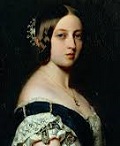





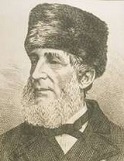





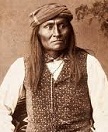








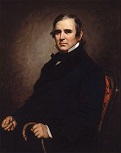




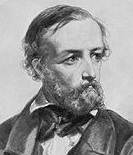







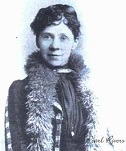







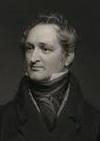
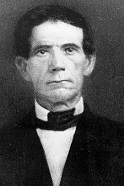
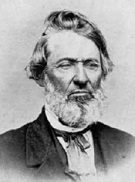
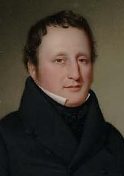

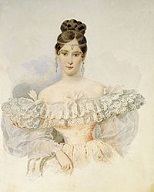
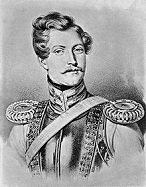






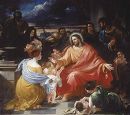



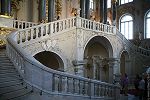
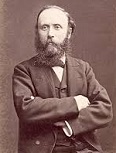
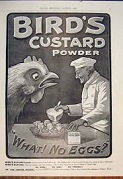


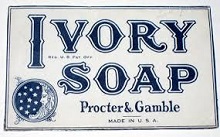
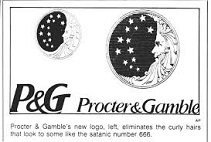
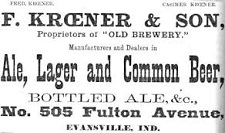

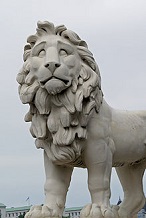
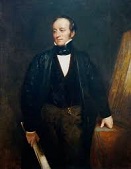
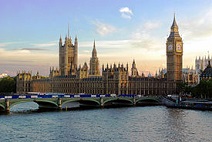
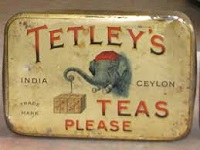
1837 A smallpox epidemic spreads across the North Am. plains, breaking the Mandan and Hidatsa tribes of N.D., reducing the Mandan tribe from 1.6K to 150 members. On Jan. 2 the Kirtland Safety Society "anti-bank" is organized as a joint stock co. by Joseph Smith Jr. and Sidney Rigdon, with Smith as cashier; too bad, it fails in Nov., and Smith is fined for "running an illegal bank", bankrupting several Mormons, who leave the church in disgust at this scammer, causing half of the Quorum of the Twelve Apostles to condemn him, with apostle Heber S. Kimball uttering the soundbyte: "There were not twenty persons on earth that would declare that Joseph Smith was a prophet of God", and a group of Mormons incl. Warren Parish and Martin Harris seizing control of the Kirtland Temple (which becomes the Church of Christ) and excommunicating Smith and Sidney Rigdon, who take off for parts unknown, er, Far West, Mo., taking the Kirtland Camp of several hundred loyal followers with them, incl. the First Seven Presidents of the Seventies, the top-third of the Mormon priesthood hierarchy; on May 11 after declaring that he had no confidence in the church presidency, Smith County, Tenn.-born apostle (since Feb. 15, 1835) William Earl McLellin (1806-83) is excommunicated, and becomes Smith's bitter enemy, ransacking and robbing his home while he's being held in Liberty Jail in Richmond, Mo. over the Safety Society scandal, after which on Dec. 16, 1838 Smith writes a letter from jail comparing McLellin to Balaam of talking ass fame, pissing him off and causing him to ask the sheriff for permission to fight him, but insisting on being given a club while leaving Smith unarmed, getting him turned down; meanwhile after Smith receives a revelation on July 8, 1838 (which ends up in Doctrine and Covenants, Sect. 117, making him immortal), the First Presidency asks Phelps, N.Y.-born Mormon high priest and Kirtland high council member Oliver Granger (1794-1841) (who was baptized in Sodus, N.Y. in 1832 by Brigham Young and ordained by him to be a church elder) to settle the bank's affairs, satisfying the creditors even though much church property is appropriated by squatters, after which Granger stays in Kirtland until his death on Aug. 27, 1841, his funeral attended by a large crowd; meanwhile all of the original Three Witnesses leave the church, causing Smith to call them "too mean to mention, and we had liked to have forgotten them", while in Mar. 1838 ex-church members claim that Harris publicly denied that any of the Three Witnesses had seen the gold plates physically, but only in a vision, causing three apostles and two others to leave the church, while Harris continues to believe in the truth of the Book of Mormon but rejects Smith as a con man. On Jan. 14 the U.S. signs a treaty with the Chippewa, chippin' awa' at their lands in favor of the new "Wolverine State" of Michigan (Mich.) (Chippewa "Michigama" = great lake") (surrounded by four of the five Great Lakes), which on Jan. 26 is admitted as the 26th U.S. state - if you seek a pleasant peninsula, look around you? On Jan. 25 The Times-Picayune (originally The Picayune) newspaper is founded in New Orleans, La. by George Wilkins Kendall (1809-67) et al.; the initial price is one Spanish picayune (half a bit); in 1876 Eliza Jane Nicholson (Holbrook) (nee Poitevent) (1843-96) AKA Pearl Rivers inherits the paper from her hubby, introducing Society Bee columns, children's pages, and the first women's advice column, written by Dorothy Dix, tripling circ. between 1880 and 1890; in 1914 it becomes "The Times Picayune" after merging with the "New Orleans Times Democrat"; it goes on to win the 2006 Pulitzer Prize for its coverage of Hurricane Katrina. In Feb. after pub. a Manifesto on Jan. 22 by leader Pieter Mauritz "Piet" Retief (1780-1838) listing their grievances against the stankin' British, the Star, er, Great Boer Trek in South Africa begins as 10K Star, er, Voortrekkers ("forward trekkers") leave Cape Colony and go NE over Orange River to get away from British rule, arriving on Oct. 5 at the Drakensburg Mts., then crossing over into Natal in Nov.; at first the Zulus seem friendly, but just wait? - I'm not a star I'm a brain surgeon? On Mar. 3 his last day of office, the election of Van Buren a done deal, Old Hickory Pres. Andrew Jackson finally recognizes the Texas Repub. (Sam Houston had fought Indians with him at Horseshoe Bend). The U.S. gets a magician president known for being behind the 8-ball? On Mar. 4 Dem. Kinderhook, N.Y.-born lawyer Martin Van Buren (1782-1862), AKA "Old Kinderhook" (son of a tavernkeeper in Kinderhook, N.Y.), "the Little Magician" (adept political manipulator) (behind the 8-ball?), "the Red Fox of Kinderhook" (bright red hair and sly ways), "the Flying Dutchman", "the Machiavellian Belshazzar", "Little Van" (on the short side), "Martin Van Ruin" (Panic of 1837), "the Sage of Lindenwald", "the American Talleyrand" (devious) becomes the 8th U.S. pres. (until Mar. 4, 1841) in the 13th U.S. Pres. Inauguration on the East Portico of the U.S. Capitol in Washington, D.C. after he and Jackson ride together to the Capitol in a small phaeton built from wood from the USS Constitution drawn by four gray horses; 3rd 1-term U.S. pres., after John Adams (1797-1801) and J.Q. Adams (1825-9); no more 2-term presidents until Grant (1869); first pres. of Dutch ancestry, and first born under the Stars and Stripes; the 8th U.S. pres. and 8th U.S. vice-pres., who lives to see the election of 8 different presidents from 8 different states; first N.Y. gov. to become pres. (Grover Cleveland, Theodore Roosevelt, FDR); First Lady shoulda been Hannah Hoes Van Buren (1783-1819); Richard Mentor Johnson (1780-1850) becomes the 9th U.S. vice-pres. (until Mar. 4, 1841) after being elected by the U.S. Senate (first vice-pres. elected under the provisions of the 12th Amendment until ?) (Richard M., Johnson, 'Dutch' all in this year's White House?); Van Buren's inaugural address is a tribute to his boss Jackson, with the soundbyte: "In receiving from the people the sacred trust twice confided to my illustrious predecessor, and which he has discharged so faithfully and so well, I know that I can not expect to perform the arduous task with equal ability and success. But... I may hope that somewhat of the same cheering approbation will be found to attend upon my path", pledging "to tread generally in the footsteps of President Jackson"; he retains Jackson's entire cabinet; widower Andy Jackson (d. 1845) observes the inauguration of his hand-picked successor, then retires to the Hermitage - Mariiiiiiiiia, Mariiiiiiia, Maria I love you? In May after U.S. state govts. plunge into $170M in debt to finance the building of roads and canals to keep up with New York's Erie Canal, leading by Apr. to the out-of-control monetary system in the U.S. leads to the Panic of 1837 (ends 1842), with inflated land values, paper speculation, and wildcat banking, New York banks suspend specie payments on their bank notes, causing 250 business houses to fail in New York City in three weeks, and eventually half of the 800 U.S. banks to fail; all the national and most of the local trade unions in the U.S. vanish; the panic stimulates emigration W along the Oregon Trail. On Mar. 8 Penn.-born John Catron (1786-1865) of Tenn. becomes U.S. Supreme Court justice #26 (until May 30, 1865); on Sept. 25 Culpeper County, Va.-born Ky.-raised Ala. sen. John McKinley (1780-1852) becomes U.S. Supreme Court justice #27 (until July 19, 1852), giving it nine members for the first time; no more changes until 1841. On Mar. 28 the U.S. officially swindles the Wyandot tribe out of the 3,149 sq. mi. Platte Purchase, which is joined to Mo., making the Missouri River its W boundary. In Mar. Charles Darwin becomes convinced that "transmutation" has been occurring among the Earth's species, but still doesn't know how, causing him to drag his feet and take 20 years to pub. his theory of evolution by natural selection. On Apr. 1 Jose Ignacio de Marquez becomes pres. of Colombia for the 2nd time (until Apr. 1, 1841). On June 5 the city of San Antonio, Tex. (modern-day pop. 1.49M/2.45M) (AKA San Antone) (River City) (Alamo City) (named after St. Anthony of Padua) on the San Antonio River (site of the Alamo) (founded May 1, 1718) is incorporated. Veni, Vidi, Vicki? On June 20 king (since June 26, 1830) William IV (b. 1765) dies of pneumonia, ending the personal union of Great Britain and Hanover (since 1714), and despite nasty rumors that he intended to murder his niece Victoria and seize the British throne, George III's 5th son Ernest Augustus I (1771-1851) becomes king of Hanover (until Nov. 18, 1851); meanwhile in Britain William IV is succeeded by his 18-y.-o. niece (daughter of Duke Edward Augustus of Kent and Princess Victoria Mary Louisa of Saxe-Coburg) Victoria Alexandrina (1819-1901) as Queen of the United Kingdom of Great Britain and Ireland 27 days after her 18th birthday (until Jan. 22, 1901), becoming the 55th British monarch (last to not be the child of a British monarch until ?) (the 4th/5th/6th female British monarch, depending on whether you accept Queen Maud and Lady Jane Grey); the nosegay (tussie-mussie) becomes a popular fashion accessory, along with their floral symbolism; the long long Victorian Age goes in like a lamb as she develops a friendship with Liberal statesman William Lamb, 2nd viscount Melbourne, who broadens her thinking, pissing-off the Conservatives, not to mention her near-scandalous love of late-night parties - want lashes that make a dramatic statement? On July 4 Congress authorizes a new U.S. flag with 26 stars (design #8), which now incl. Michigan; there are no new stars for eight years, despite the courtship of fledgling Texas. On July 14 Chinese Manchu emperor (since 1820) Qin Dao Guan pub. an edict calling for the punishment of opium dealers "without the slightest indulgence" - cut off what and stick it up where? On July 29 and Sept. 29 treaties are signed between the U.S. govt. and the Ojibwa and Dakota nations permitting settlement in the St. Croix River Valley, allowing the founding of Stillwater, Minn.; the river later becomes part of the border between Minn. and Wisc. On Aug. 7 English former actress Harriet Mellon (b. 1777) dies, leaving the £1.8M fortune of her banker ex-hubby Thomas Coutts (1735-1822) to his granddaughter Angela Georgina Burdett-Coutts (1814-1906), who becomes the wealthiest woman in England, becoming an art collector and philanthropist and going on to become the first woman to receive an English peerage in 1871. On Aug. 19 Peter IV's 1826 moderate charter is restored in Portugal. In Aug. the town of Seguin, Tex. in Guadalupe County on the N edge of the South Texas Plains is founded, becoming the home of the Texas Rangers. On Sept. 19 the Battle of Aranzueque in Aranzueque, Spain is a V for the Liberals over the Carlists, ending their Expedicion Real. In the fall one-third of the U.S. work force is jobless, and within two years those with a job receive a wage cut of 30-50%; meanwhile prices soar, and by winter there are 200K homeless people in New York City, and no govt. safety net; in Sept. Pres. Van Buren calls a special session of Congress which votes to postpone indefinitely the distribution of the surplus in case of a future deficit, and approves a new issue of Treasury notes to cover immediate expenses. On Oct. 30 Tsarskoye Selo Railway opens in Russia, linking St. Petersburg and Tsaskoye Selo, becoming the only passenger train line in Russia until the Moscow-St. Petersburg Railway in 1951; it closes in 1899. On Oct. 31 British-Am. candlemaker William Procter (1801-84) and his Irish-Am. soapmaker brother-in-law James Gamble (1803-91) found Procter & Gamble Co. in Cincinnati, Ohio, going on to supply Union soldiers with soap during the U.S. Civil War and invent Ivory brand whipped soap in 1879, with the slogans "It floats" (1891) and "99-44/100 pure" (1895); the logo features Old Man Moon and 13 stars, causing conspiracy theorists to whisper about Satanic connections. On Nov. 6 the abortive Canadian Revolts of 1837-8 (end Dec. 4, 1838) against Britain begin, sparked by attempts to institute U.S.-style govt., starting with the Lower Canada Rebellion (Patriot's War) (La Guerre des Patriotes) (ends Nov. 10, 1838), led by Louis Joseph Papineau (1786-1871), followed on Dec. 7 by the Upper Canada Rebellion, led by Toronto mayor William Lyon Mackenzie (1795-1861) (ends Dec. 4, 1838); on Nov. 25 the 2-hour Battle of Saint-Charles in the Richelieu Valley sees the Patriote rebels led by Thomas Storrow Brown (1803-88) defeated by the govt. of Lower Canada supported by the U.K. govt., causing Brown to flee to Fla. until he is granted amnesty in 1844 and returns to Montreal to work in a hardware store; on Dec. 14 the Battle of Saint-Eustache is a decisive British V over the Patriotes; in Dec. the USS Caroline is set on fire and sunk by Canadian troops while transporting supplies to Canadian insurgents over the Niagara River; British Whig John George "Radical Jack" Lambton, 1st Earl of Durham (1792-1840) is sent to Canada next year as gov.-gen. to investigate the causes, and in 1839 he pub. the Durham Report (Report on the Affairs of British North America), containing the soundbyte "two nations warring within the bosom of a single state", attributing Canada's problems to ethnic rather than economic problems, and recommending a united pip-pip British-run Canada with the goal of assimilating the Frogs, er, French into British culture while limiting their freedom, causing the Province of Canada to be created in 1841 from the former provinces of Lower Canada and Upper Canada; Papineau's nickname of "Bon Jean" is later transformed into Paul Bunyan? On Nov. 7 U.S. abolitionist (Presbyterian minister) Rev. Elijah Parish Lovejoy (b. 1802) is murdered by a mob in Alton, Ill. while trying to defend his printing press, which they throw into the Mississippi River, shocking the U.S. with the news that whites have killed one of their own over the slavery issue; Boston-born Wendell Phillips (1811-84), who became an abolitionist two years earlier after witnessing an attack by a mob of wealthy Bostonians on William Lloyd Garrison gives a big speech denouncing the Alton mob in Boston's Faneuil Hall, gaining him nat. publicity; after hearing of Lovejoy's murder, John Brown (1800-59) publicly vows "Here, before God, in the presence of these witnesses, from this time, I consecrate my life to the destruction of slavery", uttering the soundbyte that slaveholders won't give up their slaves "till they felt a big stick about their heads". On Dec. 25 Zachary Taylor defeats the Seminoles (who claim a V) at the Battle of Lake Okeechobee, and is promoted to brig. gen.; after being tricked with a promise of safe conduct for negotiations Osceola is seized while under a flag of truce and imprisoned at Ft. Moultrie near Charleston Harbor, where he rots and dies next year - where's Daniel Boone when Mingo really needs him? Ernst Augustus (1771-1851) succeeds British king William IV as king of Hanover; he starts out by cancelling the 1833 constitution and dismissing seven profs. of Gottingen U. who protest it, incl. the Grimm brothers Jacob and Wilhelm, Georg Ewald, and Georg Gottfried Gervinus; several of them return after the 1848 get-back-atchya rev. Anastasio Bustamante returns from exile and is reelected pres. of Mexico (until 1842). Rafael Carrera (1814-65) leads a mestizo Indian revolt against the Spanish regime of Central Am. Union pres. Francisco Morazan (ends 1839). Chilean vice-pres. Diego Portales is assassinated at Quillota. William Butler Ogden (1805-77) becomes mayor #1 of Chicago, Ill. (until 1838), later becoming pres. #1 of the Union Pacific Railroad. After Mexico places a bounty on Apache scalps in 1835, Juan Jose Compa, leader of the Coppermine Mimbreno Apaches is killed in the Massacre at Santa Rita del Cobre, causing 6'6" Mangas Coloradas (1793-1863) to step up as new chief, joining with Cuchillo Negro (Sp. "black knife") (Baishan) (1796-1857), chief of the Warm Springs Mimbrenos to siege Santa Rita and slaughter the Mexicans as they flee - you can ring my bell, ring my bell? Well bush my do? Shogun (since 1786) Tokugawa Iyenari (b. 1773) dies, and Tokugawa Ieyoshi (Iyeyoshi) (-1853) becomes shogun #12 of Japan (until 1853), facing sentiment in favor of an imperial restoration along with Western pressure to open the country; meanwhile economic troubles improverish many samurai, turning them into ronin (masterless samurai); meanwhile former policeman Oshio Heihachiro (b. 1793) stages a futile rebellion in Osaka over years of famine and official corruption, and is killed; meanwhile merchant ship USS Morrison, carrying merchants and missionaries from Macao visits Naha in the Ryuku Islands, is bombarded at Edo and Kagoshima, and is snubbed by the xenophobic Japanese - it not only removes surface stains but protects from new stains? King Ferdinand II of the Two Sicilies begins retracting his reforms, going instead for increased centralization. Russian diplomat Ivan Vitkevich visits Afghanistan to compete with Britain for favor. Giuseppe Mazzini becomes an exile in London. Benjamin Disraeli deflowers, er, delivers his maiden speech in the British House of Commons. England introduces official birth registration. There is a typhus epidemic in Philadelphia, and physician William Wood Gerhard (1809-72) becomes the first to establish typhoid fever as a specific disease different from typhus, despite similar symptoms. A fire racks the Hermitage (Winter Palace) in St. Petersburg, and the main white marble staircase is rebuilt by architect Vasily Petrovich Stasov (1769-1848), and called the Ambassadorial Staircase, then later named the Jordan Staircase because on Jan. 6 (Epiphany Day) each year the tsar and his family ceremonially descend it to go get a sip from the polluted Neva River, which they call you know what because it's supposed to be a repeat of Jesus' baptism in the Jordan River. Rama Varma XI dies, and Rama Varma XII (d. 1844) becomes king of Cochin in SW India (until 1844). Portugal enacts tariff legislation. Oman Sultan Sa'id ibn Sultan (d. 1856) makes slave market king Zanzibar his main place of residence, introducing clove, sugar, and indigo cultivation while cooperating with British attempts to end the slave trade - oh man jokes here? The Whitman Mission in Waiilatpu (Cayuse "place of the rye grass"), 6 mi. W of Ft. Walla Walla, Wash. is founded by married Rushville, N.Y.-born Presbyterian missionaries Marcus Whitman (1802-47) and Narcissa Whitman (1808-47), becoming a stopping point on the Oregon Trail; on Mar. 1837 she gives birth to the first white Euro in Oregon Territory, Alice Clarissa Whitman (1837-9), who drowns in the Walla Walla River on June 23, 1839 while getting a drink; on Nov. 29, 1847 they are murdered along with 12 others by Cayuse Indians who believe that a measles epidemic is caused by white poison. Muskingum College in New Concord (60 mi. E of Columbus), Ohio is founded, by the Presbyterian Church USA, becoming home to the Fighting Muskies and the Long Magenta Line; in June 2009 it becomes Muskingum U. French-born Prussian Jew August Belmont Sr. (1813-90) immigrates to New York City as the first U.S. rep. of the Rothschild banking house in Frankfurt, becoming known as the "King of Fifth Avenue", supporting Stephen Douglas and becoming chmn. of the Dem. Nat. Committee, going on to help the Union finance the U.S. Civil War with England and France. The Victorian Era has definitely arrived as an English court rules that Thomas Saverland cannot collect damages from Caroline Newton for biting off part of his nose when he tries to make a pass at her by kissing her; "She is fully entitled to bite his nose, if she pleases", rules the judge; "and eat it up", adds a barrister? John McKay is gibbetted near Perth, Tasmania for murdering Joseph Wilson on what is later named Gibbet Hill, becoming the last case of gibbeting in a British colony. Am. painter Alfred Jacob Miller (1810-74) accompanies Scottish Capt. W.D. Stewart on a hunting trip along the Oregon Trail, and makes sketches which he later turns into oils for Stewart's castle, incl. one of Ft. Laramie showing Indians camped outside while bartering beaver pelts for whiskey and baubles, and another of Ft. William in Okla. doing ditto; over 100 of them end up in the Joslyn Art Museum in Omaha, Neb. The Native Am. Assoc. is formed in Washington, D.C. to foster the patriotism of "real" Americans (white Protestants). The growing Latter-day Saints send a foreign mission to Britain. The U.S. surgeon gen. selects seven new sites for marine hospitals to add to Boston (1799) and Norfolk, Va. (1801), incl. three along the Ohio River, three along the Mississippi River, and one on the Great Lakes; the town of Napoleon, Ark. at the confluence of the Mississippi and Arkansas Rivers gets its start, with big plans for becoming the next St. Louis or New Orleans, only to be destroyed by the U.S. Civil War plus flooding. The city of Toledo, Ohio (modern pop. 300K/650K) on the Maumee River at the W end of Lake Erie is incorporated. John James Audubon visits Houston, Tex. and describes the president's mansion as "a small log house, consisting of two rooms", with a muddy and filthy ground floor where Gov. Houston shares quarters with the surgeon-gen. and all sleep on camp cots. Sir Rowland Hill (1795-1879) brings a list of ideas for postage system reforms before the British govt., changing the practice of collecting postage from the addressee to one of charging one cent to the sender for a postage stamp. U.S. Presbyterians split into old and new school. Friedrich Froebel (Fröbel) (1782-1852) opens the first exclusive kindergarten (Germ. "child's garden") in the village of Blankenburg, Thuringia, Germany, stressing the spontaneous growth of a child through play, and starting a movement which establishes other ones throughout Germany; too bad, his nephew Julius Froebel (Fröbel) (1805-93), a radical prof. in Zurich pollutes his name, causing the Prussian govt. to ban the subversive thingies in 1851. Muhammad ibn Ali as-Senussi (1787-1859) founds the Sunni Muslim Senussi (Sanussi) sect in Mecca as an offshoot of the Salafis, which becomes strong in Sudan and Libya (one-third of the pop. in modern times). Mount Holyoke College (originally Mount Holyoke Female Seminary until 1893) (first member of the Seven Sisters) is founded in South Hadley, Mass. by Mary Mason Lyon (1797-1849) for "adult female youth in the common walks of life", giving the daughters of farmers and artisans a high quality low cost ed., and supplying the U.S. with a steady stream of female teachers, which feminizes the profession, and creates the tantalizing phenomenon of unmarried professional women enjoying autonomy before, ahem, marriage - plus a little lezzie experimentation in the semen-nary? Muskingum U. (originally Muskingum College until June 2009) is founded in New Concord (60 mi. E of Columbus), Ohio by the Presbyterian Church USA, becoming the alma mater of astronaut John Glenn; the alumni are called the Long Magenta Line; sports teams are known as the Fighting Muskies. The Nat. and Capodistrian U. of Athens (originally the Othonian U. until 1862, then the separate Nat. U. and Kapodristian U. until 1932) is founded in Zofrafou, Attica, Greece on May 3 by King Otto, becoming the first univ. in modern Greece, going on to become the 2nd biggest after the Aristotle U. of Thessaliniki. Davidson College is founded in Davidson, N.C. by the Concord Presbytery on 469 acres of land purchased by Am. Rev. War Brig. Gen. William Lee Davidson; on May 5, 1972 women are allowed to enroll; in 2005 the board of trustees votes 31-5 to allow 20% of the board to be non-Christian; in 2007 the need for student loans is eliminated. DePauw U. (originally Indian Asbury U.) is founded in Greencastle, Ind. by the Methodist Episcopal Church, and named after their first Am. bishop Francis Asbury (1745-1816). Marshall U. is founded in Huntington, Va. (modern-day W Va.) by atty. John Laidley (1791-1863) et al., and named after his friend chief justice John Marshall. Charles Lewis Tiffany (1812-1902), future father of artist Louis Comfort Tiffany (1848-1933) founds Tiffany & Co. in New York City, going on to create the first retail jewelry catalog - and become the place to holly golightly? Theophile Gautier begins art-drama critic for La Presse (until 1845) - you pull it out, love of goat god? Lloyd's of London coins the term "A-1" for ships in first class condition. The U.S. House of Reps passes a rule prohibiting the wearing of hats on the floor. The word "ampersand" is coined for the "&", the 27th letter of the alphabet, originally "and per se and"; in Scotland it becomes epershand, for "et per se and". French philosopher Francois Charls Marie Fourier (1772-1837) coins the word "feminism" - who are you to make me choose between my job and my daughter? The term "debutante" begins to be applied to English ladies who are presented to the queen for their "coming out" in society. Everardus Johannes Potgieter (1808-75) founds the review De Gids, which becomes the organ for the Dutch Romantic movement. Alexandre Dumas pere begins his famous collaboration with novelist Auguste Maquet (1813-88), going on to produce a series of French historical novels, incl. "The Count of Monte Cristo" and "The Three Musketeers" - OK, Dumas, Maquet good? The first railroad in Canada begins operation. Birmingham is linked to the Liverpool and Manchester Railway. The city of Atlanta, Ga. (modern-day pop. 420K/6.3M) E of the Chattahoochee River is founded as a transportation hub at of the Western & Atlantic Railroad; in 1842 its pop. of 30 names it Marthasville in honor of the daughter of the Ga. gov.; on Dec. 29, 1847 it is incorporated as Atlanta, short for Atlantica-Pacifica, the name proposed by Georgia Railroad chief engineer J. Edgar Thomson; in 1860 the pop. is 9,554; on Nov. 11, 1864 Union troops burn it to the ground, after which it is slowly rebuilt, replacing Milledgeville as the state capital in 1858, becoming known as the unofficial capital of the New South, and "the City in a Forest" for its dense tree cover, making it the laid-back New York City and Sherwood Forest combined. August Borsig (1804-54) opens an iron foundry and engine factory in Berlin, completing his first locomotive (Borsig 1) in 1840, which defeats a Stephenson locomotive in a speed race. French saddler co. Hermes (Hermès) is founded in Paris by Protestant German immigrant Thierry Hermes (Hermès) (1801-78), going on to become a top fashion label known for its silk scarves (1928) and leather bags, incl. the Kelly Bag (1956) and Birkin Bag (1984). Thomas Holloway (-1883) of England begins selling Holloway's Pills, a cure-all for rheumatism, gout, bronchitis, wounds, scrofula, etc. made of aloes, ginger, and soap; he leaves money in his will to found the Royal Holloway College in Egham, Surrey, and the Holloway Sanatorium in Virginia Water. Joseph Tetley & Co. is founded in Yorkshire, England by pack horse vendor brothers Joseph Tetley and Edward Tetley, selling orange pekoe and pekoe blends, along with Earl Grey tea; in 1856 they move to London; in 1953 they becomes the first co. in the U.K. to sell tea in tea bags; they go on to become the largest tea co. in the U.K. and Canada, and 2nd largest in the U.S.; in 2000 the co. is purchased by the Tata Group. After fleeing to England in 1830, Meaux-en-Brie, France-born Alexis Benoist Soyer (1810-58) becomes head chef of the new Reform Club in London, with a £1K/year salary, becoming the first celebrity chef?, going on to institute innovations incl. gas cooking, cold-water refrigerators, and adjustable ovens; during the Great Irish Famine of 1847 he invents the soup kitchen to serve "famine soup" to the poor; in 1849 he begins marketing his tabletop "magic stove"; during the 1853-6 Crimean War he advises the British army, installing regimental cooks. Brothers-in-law Jacob Rice and Frederick "Fred" Kroener establish the first brewery in Evansville, Ind. on the Wabash & Erie Canal; in 1853 Rice leaves to found the Rice and Cook City Brewery, which in 1885 is renamed F.W. Cook Brewing Co., closing in 1957; meanwhile Rice & Kroener Brewery becomes the Old Brewery, closing in 1884. Watney's Brewery is founded in Victoria, London by James Watney (1800-84) after he partners with his parents in the Stag Brewery in Pimlico; he is succeeded by his sons James Watney Jr. (1832-86) and Norman Watney (1834-1911), who merge in 1898 with Combe Delafield & Co. and Reid & Co., becoming Watney Combe & Reid Co., the largest brewer in London (39.5M gal./year), becoming known for Watney's Red Barrel Pale Ale, which is filtered and pasteurized for export in kegs in 1931, and introduces artificial carbonation to the U.K. in 1936, with the ad slogan "What we want is Watney's"; in the 1930s it becomes one of the top 30 cos. traded on the London Stock Exchange; in 1971 it becomes just Red. Sports: The Castle Garden Boat Club Assoc. of Poughkeepsie, N.Y. becomes the first rowing assoc. in the U.S. The 11-mi. 220-yd. Crick Run Race at Rugby School in Warwickshire, England begins keeping records. Architecture: On May 24 the 12' x 13' South Bank (Red) Lion Coade stone sculpture by William Frederick Woodington (1806-93) is mounted on the parapet of the (Red) Lion Brewery (built in 1718 by Sir John Shorter) of James Goding on the Lambeth (South) Bank of the Thames River near the Hungerford Bridge; in 1924 the brewery is sold to Hoare Brewing Co. of Wapping, and the statue is painted red and mounted beside the entrance to the Festival of Britain near Waterloo Station; in 1966 the paint is stripped, and the statued is moved to a large granite plinth at the S end of Westminster Bridge; his partner ends up painted gold at a gate W of Twickenham Stadium; it was originally made of bronze so that it shone red in the Sun? Buckingham Palace (built 1703) near St. James Park in Westminster, London becomes the official town residence of the British sovereign, replacing St. James's Palace (since 1689). After they burn down in 1834, Westminster, London-born English architect Sir Charles Barry (1795-1860) begins the new Houses of Parliament (Palace of Westminster) on the N bank of the Thames River in Westminster, London; the House of Lords is completed in 1847, the House of Commons in 1852. Fort St. Vrain 7 mi. N of modern-day Fort Vasquez, Colo. at the confluence of St. Vrain Creek and the South Platte River is built by the co. owned by William Bent and Ceran St. Vrain as a fur trading post, going on to employ James Beckwourth, Jean Baptiste Charbonneau (son of Sacagawea) et al. Inventions: Italian astronomer Giovanni Battista Amici (1786-1863) of Florence first uses a hemispheric objective lens in microscopy. English chemist Alfred Bird (1811-78) of London invents Bird's Custard, based on corn flour instead of eggs, which becomes the most popular brand in the U.K., after which he invents baking powder so that his wife can make yeast-free bread - for the birds jokes here? French teacher of the blind Louis Braille (1809-62) invents the Braille Alphabet, which incl. abbreviations for common words - designed and engineered the zoom-zoom way? Sir William Fothergill Cooke (1806-79) and Sir Charles Wheatstone patent an electric telegraph, which is widely used in Britain; meanwhile Charlestown, Mass.-born painter Samuel F.B. Morse (1791-1872) exhibits his electric telegraph at the City College of New York, and invents Morse Code, which he can send at a shocking 10 words per min. French painter Louis Jacques Mande Daguerre (1789-1851) invents the "miraculous" reduced exposure time Daguerreotype process of photography using a silver iodide coating on copper plates, developed with mercury fumes and washed with a salt solution to prevent darkening; he doesn't present it to the public until 1839. Vermont blacksmith Thomas Davenport (1802-51) develops the first DC Electric Motor. Ill. blacksmith John Deere (1804-86) invents a steel-tipped wrought-iron plow, which slowly becomes the standard for the U.S. prairie; his co. logo is in agricultural green and yellow, and features an antlered animal (don't say deeer?); by 1839 he makes a total of 10 plows. Chromolithography is patented by ? Engelmann. Isaac Pitman (1813-97) invents Pitman Shorthand. Rudolphe Toppfer (Töpffer) of Switzerland pub. "The Adventures of Obadiah Oldbuck", becoming the first comic book; in 1842 it becomes the first comic book pub. in the U.S. Science: In July 30-y.-o. Swiss naturalist Louis Jean Rodolphe Agassiz (1807-73) shocks the Swiss Society of Natural Sciences in Neuchatel, abandoning his prepared lecture on Brazilian fossil fish and announcing his new theory that a vast "ocean of ice" had once covered all of Europe and N Asia as far as the Caspian Sea, based on an expedition the previous summer with older friend Jean de Charpentier, where they had found evidence that glaciers move, carrying rocks with them, incl. one incident where Agassiz is lowered into an Alpine glacier too far and almost freezes in meltwater; too bad, the other scientists scoff at any implication that the Biblical Flood doesn't explain all. German mathematician Johann Peter Gustav Lejeune Dirichlet (1805-59) pub. Dirichlet's Theorem on Arithmetic Progressions, that there are infinitely many primes that are congruent to mod d, where a and d are positive and coprime, e.g. a, a+d, a+2d, a+3d..., using Dirichlet L-functions in the proof and describing the difference between absolute and conditional convergence of series, founding Analytic Number Theory; in 1829 he pub. a paper showing the conditions for the convergence of a Fourier series; in 1838-9 he pub. two papers proving the first class number formula for quadratic forms; he goes on to prove Dirichlet's Unit Theorem and Dirichlet's Approximation Theorem for Diophantine equations, define the Dirichlet Probability Distribution and the Dirichlet Process, and give the first modern definition of a function. German histologist Theodor Schwann (1810-82) recognizes that the yeast cell is a living organism, naming it saccharomyces (Gr. "sugar fungus") for its sweet tooth, also recognizing that fermentation is an anaerobic process, helping turn beer brewing into a science. Friedrich Wohler and Justus von Liebig discover the first glycoside, amygdalin. Nonfiction: Bronson Alcott (1799-1888), Conversations with Children on the Gospels. Henry Baldwin (1780-1844), A General View of the Origin and Nature of the Constitution and Government of the United States; tries to steer a course between federalism and states rights, and tries to justify the legality of slavery while decrying its morality, causing critics to confirm their opinion of his lunacy. Jerome Adolphe Blanqui (1798-1854), Histoire de l'Economie Politique en Europe depuis les Anciens jusqu'a nos Jours (History of Political Economy in Europe). Bernhard Bolzano (1781-1848), The Philosophy of Logic (Wissenschaftslehre). Benjamin Bonneville (1796-1878), The Adventures of Captain Bonneville, U.S.A., in the Rocky Mountains and the Far West (2 vols.); ed. by Washington Irving. Thomas Campbell (1777-1844), Letters from the South. Henry Charles Carey (1793-1839), Principles of Political Economy (4 vols.) (1837-40); backs Henry Clay's Am. System of protectionism and govt.-backed developmental capitalism; becomes a std. U.S. textbook until 1973. Thomas Carlyle (1795-1881), The French Revolution: A History (3 vols.); covers from 1789-95, written in exciting present-tense first-person plural style, becoming a big hit and std. work, inspiring Charles Dickens' 1859 novel "A Tale of Two Cities", remaining popular into modern times (most interesting history book ever written?); too bad, he gave the ms. of vol. 1 to friend John Stuart Mill to proofread, but on Mar. 6, 1837 Mill's housemaid mistakenly used it to start a fire, causing Carlyle to have to reconstruct it without notes, making it come out highly quirky, finishing on Jan. 12, 1837; "All eyes are on Robespierre's Tumbril, where he, his jaw bound in dirty linen, with his half-dead Brother and half-dead Henriot, lie shattered, their 'seventeen hours' of agony about to end. The Gendarmes point their swords at him, to show the people which is he. A woman springs on the Tumbril; clutching the side of it with one hand, waving the other Sibyl-like; and exclaims: 'The death of thee gladdens my very heart, m'enivre de joi'; Robespierre opened his eyes; 'Scélérat, go down to Hell, with the curses of all wives and mothers!'" Susannah McGavock Carter, The Housekeeper's Book; recipe for yummy cooked calf's head, "some nice fat about the ear... a tooth in the jaw, called by some the sweettooth... very full of jelly, and the eyes which may be forced from the socket by... a knife... and divided into quarters". Thomas Carlyle (1795-1881), The French Revolution: A History (3 vols.); covers from 1789-95; written in exciting present-tense first-person plural style, becoming a big hit and std. work, inspiring Charles Dickens' 1859 novel "A Tale of Two Cities", remaining popular into modern times (most interesting history book ever written?); too bad, he gave the ms. of vol. 1 to friend John Stuart Mill to proofread, but the latter's housemaid mistakenly used it to start a fire, causing him to have to reconstruct it without notes, making it come out highly quirky?; "All eyes are on Robespierre's Tumbril, where he, his jaw bound in dirty linen, with his half-dead Brother and half-dead Henriot, lie shattered, their 'seventeen hours' of agony about to end. The Gendarmes point their swords at him, to show the people which is he. A woman springs on the Tumbril; clutching the side of it with one hand, waving the other Sibyl-like; and exclaims: 'The death of thee gladdens my very heart, m'enivre de joi'; Robespierre opened his eyes; 'Scélérat, go down to Hell, with the curses of all wives and mothers!'" Jean Baptiste Andre Dumas, Lecons sur la Philosophie Chimique (Lessons on the Philosophy of Chemistry). Ralph Waldo Emerson (1803-82), The American Scholar (Aug. 31); delivered to the Phi Beta Kappa Society at Harvard U. ("America's Intellectual Declaration of Independence" - Oliver Wendell Holmes Sr.), founding the philosophy of Transcendentalism, which believes in the inherent goodness of people and Nature, and distrusts human orgs. incl. organized religion and political parties, preaching independence and self-reliance, "the infinitude of the private man". Asa Gray (1810-88), A Natural System of Botany, or A Systematic View of the Organization, Natural Affinities, and Geographical Distribution of the Northern United States. Henry Hallam (1777-1859), Introduction to the Literature of Europe, in the Fifteenth, Sixteenth and Seventeenth Centuries (4 vols.) (1837-9). Moses Hess (1812-75), Holy History of Mankind. William Forster Lloyd (1795-1852), Lectures on Population, Value, Poor-Law and Rent; first statement of the concept of diminishing marginal utility AKA Gossen's First Law. Samuel Roffey Maitland, Six Letters on Foxe's Acts and Monuments; claims that Foxe's Book of Martyrs is full of moose hockey. Harriet Martineau (1802-76), Society in America. John Ramsey McCulloch (1789-1864), A Descriptive and Statistical Account of the British Empire, Exhibiting its Extent, Physical Capacities, Population, Industry, and Civil and Religious Institutions (2 vols.). Augustus De Morgan (1806-71), Elements of Trigonometry and Trigonometrical Analysis, Preliminary to the Differential Calculus; The Elements of Algebra ? Oliver and ? Boyd, New Edinburgh Almanac; sans prognostications. Mordecai Manuel Noah (1785-1851), Discourse on the Evidences of the American Indians being the descendants of the Lost Tribes of Israel; delights by obliquely backing their Book of Mormon, Sir Francis Palgrave (1788-1861), Truths and Fictions of the Middle Ages: the Merchant and the Friar. Isaac Pitman (1813-97), Stenographic Soundhand; shorthand based on phonetics. Simeon D. Poisson (1781-1840), Recherches sur la Probabilite Des Jugements (Researches on the Probability of Judgments). William Hickling Prescott (1786-1850), The History of the Reign of Ferdinand and Isabella the Catholic (4 vols.). Josef Safarik (1795-1861), Slavic Antiquities; how all Slavs should stick together and multiply. Martin Farquhar Tupper (1810-89), Proverbial Philosophy; big hit in Britain, dud in the U.S.; goes through 40 eds. by 1867, and finally sells 1M copies in the U.S., but by the 20th cent. his work is forgotten; "Well-timed silence hath more eloquence than speech"; "A good book is the best of friends, the same today and forever"; "God, from a beautiful necessity, is Love"; "He who does not tire, tires adversity"; "Prayer is the slender nerve that moves the muscle of omnipotence"; "Pain adds rest unto pleasure, and teaches the luxury of health"; "Memory is not wisdom; idiots can by rote repeat volumes. Yet what is wisdom without memory?"; "Ridicule is a weak weapon when pointed at a strong mind; but common people are cowards and dread an empty laugh." John Lloyd Stephens (1805-52), Incidents of Travel in Egypt, Arabia Petraea, and the Holy Land. Theodore Dwight Weld (1803-95), The Bible Against Slavery: An Inquiry into the Patriarchal and Mosaic Systems on the Subject of Human Rights; pub. anon.; 3rd rev. ed. 1838.; the Bible separates man from animals and things, servants were voluntary, and sold themselves, with runaway servants not to be delivered to their masters, who were not owners; "The spirit of slavery never seeks shelter in the Bible, of its own accord. It grasps the horns of the altar only in desperation - rushing from the terror of the avenger's arm . Like other unclean spirits, it 'hateth the light, neither cometh to the light, lest its deeds should be reproved.' Goaded to phrenzy in its conflicts with conscience and common sense, denied all quarter, and hunted from every covert, it vaults over the sacred inclosure and courses up and down the Bible, 'seeking rest, and finding none.' The law of love, glowing on every page, flashes around it an omnipresent anguish and despair. It shrinks from the hated light, and howls under the consuming touch, as demons quailed before the Son of God, and shrieked, 'Torment us not.' A t last, it slinks away under the types of the Mosaic system, and seeks to burrow out of sight among their shadows. Vain hope! Its asylum is its sepulchre; its city of refuge, the city of destruction. It flies from light into the sun; from heat, into devouring fire; and from the voice of God into the thickest of His thunders." Music: Daniel Auber (1782-1871), Le Domino Noir (opera) (Opera Comique, Paris). John Barnett (1802-90), Fair Rosamund (opera). Hector Berlioz (1803-69), Grande Messe des Morts, Op. 5 (Requiem) (Paris). Gaetano Donizetti (1797-1848), Roberto Devereux (tragic opera) (Oct. 29) (Teatro San Carlo, Naples); libretto by Salvadore Cammarano, based on "Elisabeth d'Anglette" by Francois Ancelot (1829) and "Historie secrete des amours d'Elisabeth et du comte d'Essex" (1787) by Jacques Lescéne des Maisons, based on the life of English queen Elizabeth I's beau Robert Devereux, 2nd Earl of Essex. Albert Lortzing (1801-51), Zar und Zimmermann (Czar and Carpenter) (Leipzig). Samuel Lover (1797-1868), Rory O'Moore, a National Romance; "Now Rory leave off Sir, you'll hug me no more,/ That's eight times today that you've kissed me before;/ Then here goes another, says he, to make sure/ For there's luck to odd numbers says Rory O'Moore". Felix Mendelssohn (1809-47), Symphony No. 3 in A minor, Op. 56 ("Scottish Symphony"); dedicated to Queen Victoria. Art: Benjamin Robert Haydon (1786-1846), Christ Blessing the Little Children - my dad is better than your dad? Alfred J. Miller, Interior View of Ft. William. Poetry: Victor Hugo (1802-85), Les Voix Interieures. Alphonse de Lamartine (1790-1869), La Chute d'un Ange. Edwin Landseer, The Old Shepherd's Chief Mourner. Nikolaus Lenau (1802-50), Savonarola; how tyranny doesn't mix with Christianity. Alexander Pushkin (1799-1837), The Bronze Horseman: A Petersburg Tale; written in 1833; his most popular poem?; about the equestrian statue of Peter the Great in St. Petersburg. Robert Southey (1774-1843), The Poetical Works of Robert Southey, Collected by Himself. John Greenleaf Whittier (1807-92), Abolition Poems. Novels: William Harrison Ainsworth (1805-82), The Admirable Crichton; an admirable butler shipwrecked on an island. Honore de Balzac (1799-1850), Illusions Perdues (Lost Illusions). Sara Coleridge (1802-52), Phantasmion, a Fairy Tale; daughter of Samuel Taylor Coleridge spins some good yarns. Charles Dickens (1812-70), Oliver Twist; or, The Parish Boy's Progress (1837-9); illustrations by George Cruikshank; Noah Claypole, Mr. Brownlow, 4'6" Artful Dodger Jack Dawkins; workhouse boss (constabular beadle) Mr. Bumble ("the law is a ass"), who dishes out oatmeal, and to whom Oliver issues the immortal soundbyte: "Please, sir, I want some more"; dog-kicking Bill Sykes, his mean bulldog Bull's-Eye and his bird Nancy; his boss, Jewish pickpocket gang king Fagin (Gael. "little ardent one") is hanged at the end, which draws such an angry reaction from Londoners that he tones it down in future eds.; Dicken's best friend is Bob Fagin; Oliver is adopted by Mr. Brownlow and ends up well-fed and happy; in 1837-42 Dickens pub. five of the 14 bestselling books in the U.S., capturing the illiterate and literate markets. Benjamin Disraeli (1804-81), Henrietta Temple: A Love Story; Venetia. Joseph von Eichendorff (1788-1857), Das Schloss Durande. Nathaniel Hawthorne (1804-64), Twice-Told Tales (39 tales) (enlarged 1842); incl. The Minister's Black Veil. Henry William Herbert (1807-58), Cromwell. Theodore Edward Hook (1788-1841), Jack Brag. Yevhen Hrebinka (1812-48), Stories of a Pyriatynian. George Sand (1804-76), Les Maitres Mosaites; Mauprat; a retelling of "Beauty and the Beast"; nobleman Bernard Mauprat is raised by feudal kinsmen who turn him into an "enfant sauvage", after which he helps his cousin Edmee escape and falls for her, threatening rape to get her to consent to marriage, ending in a "Red and Black" type trial. Robert Southey (1774-1843), The Doctor; incl. Goldilocks and the Three Bears; in 1837 George Nicol turns it into a poem; in 1849 Joseph Cundall changes the old woman to a pretty little girl. Karl Spindler (1796-1855), Der Konig von Zion (The King of Zion). Births: Russian composer (founder of The Five) Mily (Mily) Alekseyevich Balakirev (d. 1910) on Jan. 2 (Dec. 21, 1836 Old Style) in Nizhni-Novgorod. English "villain in Virginia Woolf's 'A Room of One's Own'" historian (gay) Oscar Browning ("O.B.") (d. 1923) on Jan. 17 in London; educated at Eton College, and King's College, Cambridge U.; lover of Simeon Solomon (1840-1905). Hungarian poet ? (d. 1902) on Jan. 31 in Gyorkony. British "Bacon is Shake-Speare" MP (1895-1906) Sir Edwin Durning-Lawrence, 1st Baronet (d. 1914) in London; brother of Sir Wiliam Lawrence (1818-97) and Sir James Lawrence (1820-97); uncle of Frederick Pethick-Lawrence (1871-1961); educated at London U.; created baronet in 1898. Am. Gallaudet U. founder Edward Miner Gallaudet (d. 1917) on Feb. 5 in Washington, D.C.; son of Thomas Hopkins Gallaudet (1787-1851) and Sophia Fowler Gallaudet (1798-1877); father of Edson Fessenden Gallaudet (1871-1945). Am. Christian evangelist Dwight Lyman Moody (d. 1899) on Feb. 5 in Northfield, Mass.; starts out as a shoe salesman before founding a church in Chicago in 1864; collaborator of Ira D. Sankey (1840-1908). Scottish "Oxford English Dictionary" lexicographer Sir James Augustus Henry Murray (d. 1915) on Feb. 7 in Denholm (near Hawick), Roxburghshire; knighted in 1908. Am. Repub. Los Angeles Times publisher Harrison Gray Otis (d. 1917) on Feb. 10 near Marietta, Medina County, Ohio; not to be confused with politician Harrison Gray Otis (1765-1848). Am. Hudson River School landscape painter-etcher Thomas Moran (d. 1926) on Feb. 12 in Bolton, Lancashire, England; emigrates to the U.S. in 1844; his sketches of Yellowstone help its establishment as a nat. park in 1916. German novelist and Egyptologist Georg Moritz Ebers (d. 1898) on Mar. 1 in Berlin. Am. "The Rise of Silas Lapham" novelist-editor-critic William Dean Howells (d. 1920) on Mar. 1 in Martins Ferry, Ohio; father of John Mead Howells (1868-1959). Canadian "Cosmic Consciousness" psychiatrist Richard Maurice Bucke (d. 1902) on Mar. 18 in Methwold, England; educated at McGill U. U.S. Dem. pres. #22 (1885-9) and #24 (1893-7) ("Uncle Jumbo") Stephen Grover Cleveland (d. 1908) on Mar. 18 in Caldwell, N.J.; son of a strict Presbyterian minister descended from English ancestors, and an Anglo-Irish Protestant and German Quaker mother; distant relation of Gen. Moses Cleaveland (1754-1806) of Cleveland, Ohio fame; the Baby Ruth brand candy bar is allegedly named for his daughter Ruth, not baseball star Babe Ruth. English "Charles Surface" actor-mgr.-surgeon Sir Charles Wyndham (OE "hamlet near the winding way") (Culverwell) (d. 1919) on Mar. 23 in Liverpool; educated at King's College, London; goes from surgeon for the Union army in the U.S. Civil War to actor to mgr.; knighted in 1902. German physiologist Wilhelm Friedrich Kuhne (Kühne) (d. 1900) on Mar. 28 in Hamburg; educated at the U. of Gottingen; coiner of the term "enzyme". Am. naturalist John Burroughs (d. 1921) on Apr. 3 in Roxbury, N.Y. English #1 degenerate poet-critic (alcoholic) Algernon (OF "wearing a mustache") Charles Swinburne (d. 1909) on Apr. 5 in London; educated at Balliol College, Oxford U.; friend of Theodore Watts-Dunton (1832-1914). French "La Parisienne" dramatist Henry Francois Becque (d. 1899) on Apr. 9 in Lille. Am. financier-banker-philanthropist and art collector John Pierpont Morgan (d. 1913) on Apr. 17 in Hartford, Conn. [Aries]; founder of U.S. Steel Corp. and New York City's Metropolitan (Millionaire's) Club; son of banker Junius Spencer Morgan (1813-); educated at the U. of Gottingen; father of J.P. Morgan Jr. (1867-1943). Danish pacifist leader Fredrik Bajer (d. 1922) on Apr. 21 in Vester Egede (near Naestved). German statesman (Otto von Bismarck's successor) Friedrich August karl Ferdinand Julius von Holstein (d. 1909) on Apr. 24 in Schwedt. German mathematician (Jewish) ("the King of Invariant Theory") Paul Albert Gordan (d. 1912) on Apr. 27 in Breslau; educated at the U. of Konigsberg, and U. of Breslau; student of Carl Jacobi. Am. "Asa Trenchard in Our American Cousin" actor-comedian William Henry "Harry" Hawk (d. 1916) on Apr. 28 in Philadelphia, Penn. French reactionary politician Gen. Georges Ernest Jean-Marie Boulanger (d. 1891) (AKA Gen. Revanche) on Apr. 29 in Rennes; allows his soldiers to grow beards. English "Robert's Rules of Order" writer Henry Martyn Robert (d. 1923) on May 2 in Robertville, S.C.; family moves to Ohio because of opposition to slavery; graduates 4th in his West Point class of 1857; son Joseph T. Robert is pres. #1 of Morehouse College. French-English painter-etcher Alphonse Legros (d. 1911) on May 8 in Dijon; emigrates to England in 1863. Am. anarchist white supremacist surgeon-anthropologist Daniel Garrison Brinton (d. 1899) on May 13 in Thornbury, Penn.; educated at Yale U.; becomes a Union Army surgeon in the U.S. Civil War, and gets sunstroke at Missionary Ridge in the 3rd Battle of Chattanooga in 1863. Japanese liberal statesman Count Taisuke Itagaki (d. 1919) on May 21 in Tosa, Kochi Prefecture; first Japanese political party leader. English celeb soprano-spiritualist Georgina Weldon (nee Thomas) (d. 1914) on May 24 in tooting Lodge, Clapham Common; Welsh father named Traherne; grows up in Florence, Italy; wife (1860-) of Sir William Henry Weldon (1837-1919). Am. Wild West gunfighter-gambler-lawman-showman ("the First Gunfighter") ("Prince of the Pistoleers") James Butler "Wild Bill" Hickock (d. 1876) on May 27 in Homer (modern-day Troy Grove), LaSalle County, Ill.; coiner of the terms "Gunman", "Gunslinger", "Gunfighter", and "Showdown". Am. vaudeville actor-mgr. ("the Father of Vaudeville") Antonio "Tony" Pastor (d. 1908) on May 28 in Manhattan, N.Y.; Spanish immigrant father. Austrian Hitler's father (customs official) Alois Schicklgruber (Hitler) (d. 1903) on June 7 in Strones, Dollersheim, Waldviertel, Lower Austria (W of Vienna); son of unmarried 42-y.-o. peasant Maria Anna Schicklgruber (1795-1847) and an unknown father, possibly Jewish Baron Salomon Mayer von Rothschild (1774-1855) (whom she works for as a maid in Vienna); grows up with his grandfather (real father?) Johann von Nepomuk Huetler (Hiedler) (1807-88), while on May 10, 1842 Maria marries itinerant miller Johann Georg Hiedler (Hitler) (1792-1857); on Jan. 6, 1877 officially changes his surname to Hitler; husband of his half-niece Klara Polzl (1860-1907) (3rd wife); father of Adolf Hitler (1889-1945). U.S. Supreme Court justice #51 (1889-1910) David Josiah Brewer (d. 1910) on June 20 in Smyrna, Turkey; educated at Wesleyan U., and Yale U. Am. educator (co-founder of Radcliffe College) Arthur Gilman (d. 1909) on June 22 in Alton, Ill.; husband of Stella Scott Gilman. Am. world chess champ #1 (1858-60) ("the Pride and Sorrow of Chess") Paul Charles Morphy (d. 1884) on June 22 in New Orleans, La.; of Portuguese, Irish, and Spanish descent. Am. financier (Quaker) Charles Tyson Yerkes Jr. (d. 1905) on June 25 in Philadelphia, Penn.; of Welsh descent; owns most of the private "L" cos. in Chicago. French academic painter Carolus Duran (Auguste Emile Carolus-Durand) (d. 1917) on July 4 in Lille; copied most of the old masters in the Louvre on his way up; teacher of Am. painters John Singer Sargent and Will Hickock Low. English art museum curator John Lockwood Kipling (d. 1911) on July 6 in Pickering, North Yorkshire; husband (1865-) of Alice Kipling (nee MacDonald) (1837-1910); father of Rudyard Kipling (1865-1936). Am. Union Army Col. (Unitarian-turned-Roman Catholic) Robert Gould Shaw (d. 1863) on Oct. 10 in Boston, Mass.; Unitarian abolitionist parents; grandson of Robert Gould Shaw (1775-1853); grows up in West Roxbury, Mass., and Staten Island, N.Y.; educated at Harvard U. Scottish economist Robert Giffen (d. 1910) on July 22 in Strathaven, Lanarkshire; not to be confused with U.S. adm. Robert C. Giffen (1886-1962). Am. Confederate guerrilla cmdr. William Clarke "Bill" Quantrill (d. 1865) on July 31 in (Canal) Dover, Ohio. French. Third Repub. pres. #4 (1887-94) Marie Francois Sadi Carnot (d. 1894) on Aug. 11 in Limoges; son of Hippolyte Carnot (1801-88); grandson of Lazare Carnot (1753-1823); named after his uncle Nicolas Leonard Sadi Carnot (1796-1832). U.S. surgeon gen. #1 (1871-9) John Maynard Woodworth (d. 1879) on Aug. 15 in Big Flats, N.Y.; educated at the U. of Chicago. French composer-organist Francois-Clement Theodore (Théodore) Dubois (d. 1924) on Aug. 24 in Rosnay, Marne. Dutch painter Jacob Hendricus Maris (d. 1899) on Aug. 25 in The Hague. U.S. almost First Lady Ellen Lewis "Nell" Herndon (d. 1880) on Aug. 30 in Culpeper Court House, Va.; wife of Pres. Chester Arthur; daughter of William Lewis Herndon (1813-57). Am. Civil War Union maj. gen. and railroad exec James Harrison Wilson (d. 1925) on Sept. 2 in Shawneetown, Ill. Am. "Columbus" poet-novelist ("Poet of the Sierras") ("the Lord Byron of the Rockies") Joaquin (Cincinnatus Heine) (Hiner) Miller (d. 1913) on Sept. 8 in Union County, Ind.; becomes a miner in Calif. in 1854, goes to Nicaragua, returns to live with the Am. Indians, marries Indian woman Paquita, edits a newspaper in Ore., goes to England, then back to Wash. state and Calif. U.S. Rep. (D-Ga.) (1873-93) James Henderson Blount (d. 1903) on Sept. 12 in Clinton, Ga.; educated at the U. of Ga. Russian mathematician Nikolai Vasilievich Bugaev (d. 1903) on Sept. 14 in Georgia; father of Andrei Bely (1880-1934). Portuguese Braganza king #32 (1853-61) Pedro (Peter) V de Alcantara (the Hopeful) (d. 1861) on Sept. 16 in Lisbon; eldest son of Maria II da Gloria (1819-53); brother of Luis I (1838-89), Joao (1842-61) and Fernando (1846-61). English horse breeder Lady Anne Isabella "Annabella" Noel Blunt (nee King-Noel), 15th Baroness Wentworth (d. 1917) on Sept. 22 in Crabbet Park, Sussex; wife (1869-) of Wilfred Scawen Blunt (1840-1922); daughter of William King, 1st Earl of Lovelace (1805-93) and Lady Ada Lovelace (1815-52); maternal granddaughter of Lord Byon and Annabella Byron, 11th baroness Wentworth; mother of Judith Blunt-Lytton, 16th baroness Wentworth (1873-1957). Am. Repub. politician-industrialist (Episcopalian) Marcus Alonzo "Mark" Hanna (d. 1904) on Sept. 24 in New Lisbon, Ohio; grows up in Cleveland, Ohio; campaign mgr. of pres. William McKinley. Am. Civil War Union brig. gen. and railroad exec Edward Francis Winslow (d. 1914) on Sept. 28 in Augusta, Maine. Hungarian Kaposi's Sarcoma dermatologist (Jewish) Moritz Kaposi (d. 1902) on Oct. 23 in Kaposvar. Japanese Tokugawa shogun #15 (last) (1866-7) Tokugawa Yoshinobu (Keiki) (d. 1913) on Oct. 18 in Edo. Am. physicist-inventor Amos Emerson "Dolly" Dolbear (d. 1910) on Nov. 10 in Norwich, Conn.; educated at Ohio Wesleyan U. Dutch physicist Johannes Diderik van der Waals (d. 1923) on Nov. 23 in Leiden; first prof. of physics at the U. of Amsterdam (1877). Am. inventor John Wesley Hyatt (d. 1920) on Nov. 28 in Starkey, N.Y. English analytical chemist (creator of the first periodical table of the elements in 1863) John Alexander Reina Newlands (d. 1898) in Nov. in London; Italian-descent mother; educated at the Royal College of Chemistry; fights for Giuseppe Garibaldi in 1860. Scottish forensic surgeon Joseph Bell (d. 1911) on Dec. 2; great-grandson of Benjamin Bell (1749-1806); educated at the U. of Edinburgh; inspiration for Arthur Conan Doyle's Sherlock Holmes. French naval officer-engineer Francoice Leonce (Léonce) Verny (d. 1908) on Dec. 2 in Pont d'Aubenas, Ardeche. English "History of English Dramatic Literature to the Age of Queen Anne" historian Sir Adolphus William Ward (d. 1924) on Dec. 2 in Hampstead, London; educated at Peterhouse College, Cambridge U.; knighted in 1913. French physicist Louis Arthur Ducos du Hauron (d. 1920) on Dec. 8 in Langon, Gironde. French waltz composer (Jewish) Emile Waldteufel (Ger. "forest devil") (Charles Emile Levy) (d. 1915) on Dec. 9 in Strasbourg. Am. historian-novelist and Methodist minister ("the Hoosier Schoolmaster") Edward Eggleston (d. 1902) on Dec. 10 in Vevay, Ind. English historian John Richard Green (d. 1883) on Dec. 12 in Oxford; educated at Jesus College, Oxford U. Am. New York World Bldg. Am. Renaissance Beaux-Arts architect George Browne Post (d. 1913) on Dec. 15 in Manhattan, N.Y.; student of Richard Morris Hunt. German painter (gay) Hans von Marees (Marées) (d. 1887) on Dec. 24 in Elberfeld, Dessau; lover of Adolf von Hildebrand; moves to Italy in 1864. German Bayreuth Festival dir. (1883-1906) Cosima (Gr. "order") Wagner (nee Francesca Gaetana Cosima Liszt) (d. 1930) on Dec. 24 in Bellagio, Italy; illegitimate daughter of Franz Liszt (1811-86) and Comtesse Marie d'Agoult (AKA Daniel Stern) (1805-76); wife (1857-70) of German composers Hans von Bulow and (1870-) Richard Wagner. Am. atty.-philanthropist Elbridge Thomas "Commodore" Gerry (d. 1927) on Dec. 25; grandson of Elbridge Gerry (1744-1814); educated at Columbia College. U.S. adm. George Dewey (d. 1917) on Dec. 26 in Montpelier, Vt. Canadian Metis leader Gabriel Dumont (d. 1906) on Dec. ? in Assiniboia, Man. English candymaker Henry Isaac Rowntree (d. 1883); brother of Joseph Rowntree (1836-1925). French archeologist Gaston Charles Ernest Choquin de Sarzec (d. 1901). Swiss chemist Marc Delafontaine (d. 1911) in Celigny. English officer of arms Sir William Henry Weldon (d. 1919); husband (1860-1914) of Georgina Weldon (1837-1914); in 1870 leases Charles Dickens' home Tavistock House in Bloomsbury. English actress-singer-mgr. Kate Santley (Evangeline Estelle Gazina) (d. 1923) in Germany; sister of Sir Charles Santley (1834-1922); grows up in the U.S.; emigrates to England in 1861. French chef Alexandre Etienne Choron (d. 1924) in Caen; not to be confused with musician Alexandre-Etienne Choron (1771-1834). Am. landscape painter Edward B. Gay (d. 1928) in Dublin, Ireland; emigrates to the U.S. in 1848; known for sunny gay work with skillful atmosphere. Deaths: Dutch scientist Martinus van Marum (b. 1750) on Dec. 26 in Haarlem. Italian composer Niccolo Antonio Zingarelli (b. 1752). English Bank of England architect Sir John Soane (b. 1753) on Jan. 20 in London. English king George IV's morganitic wife (1785-) Maria Fitzherbert (b. 1756) on Mar. 27. French parachute inventor Louis Sebastien Lenormand (b. 1757) in Dec. in Castres. Am. Dem.-Repub. politician Nathaniel Macon (b. 1758) on June 29 in Warrenton, N.C.; namesake of Macon, Ga. French composer Jean-Francois Lesueur (b. 1760) on Oct. 6 in Paris. French gen. Joseph Souham (b. 1760) on Apr. 28 in Versailles. English Sanskrit scholar Henry Thomas Colebrooke (b. 1765) on Mar. 18. Italian poet-historian Carlo Giuseppe Guglielmo Botta (b. 1766) on Aug. 10 in Paris, France. Am. surgeon Philip Syng Physick (b. 1768) on Dec. 15 in Philadelphia, Penn. French painter Baron Francois Gerard (b. 1770) on Jan. 11 in Paris (fever). French utopian socialist reformer Francois Marie Charles Fourier (b. 1772) on Oct. 10. Spanish physician Don Francisco de Paula Marin (b. 1774) on Oct. 30 in Honolulu, Hawaii. Spanish-Mexican gen. Jose Joaquin de Arredondo (b. 1776) in Havana, Cuba. English painter John Constable (b. 1776) on Mar. 31 in Dedham Vale, Constable County, Suffolk. El Salvadorian pres. (1823-4, 1824, 1826-9, 1832-3) Mariano Prado (b. 1776) in Guatemala. German naturalist Gottfried Treviranus (b. 1776) on Feb. 16. English actress Harriet Mellon (b. 1777) on Aug. 6. English clown Joseph Grimaldi (b. 1778) on May 31 in Pentonville, Islington. Swedish king (1792-1809) Gustavus IV (b. 1778) on Feb. 7 in St. Gallen. Austro-Hungarian composer-pianist Johann Nepomuk Hummel (b. 1778) on Oct. 17 in Weimar, Thuringia. Irish pianist-composer John Field (b. 1782) on Jan. 23 in Moscow, Russia (pneumonia). Dutch queen Hortense de Beauharnais (b. 1783) on Oct. 5 in Arenenberg, Thorgau, Switzerland. Italian painter Giovanni Migliari (b. 1785) on Apr. 18 in Milan. German political satirist Ludwig Borne (b. 1786) on Feb. 12 in Paris, France. Italian writer Giacomo Leopardi (b. 1798) on June 14 in Naples. Russian #1 Romantic poet-playwright-novelist Alexander Pushkin (b. 1799) on Feb. 10 (Jan. 29 Old Style) in St. Petersburg (killed in his 29th duel by his brother-in-law Baron Georges-Charles de Heeckeren d'Anthes AKA Dantes-Gekkern, a French officer of the Chevalier Guard Regiment who seduced his wife Natalia Pushkina); leaves the unfinished novels Peter the Great's Negro, Rosavlev, and Dubrovsky - the good die young? Spanish writer Mariano Jose de Larra (b. 1809) on Feb. 13 in Madrid (suicide) - the good die young? German dramatist Georg Buchner (b. 1813) on Feb. 19 in Zurich, Switzerland - the good die young?














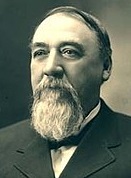
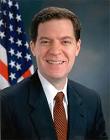


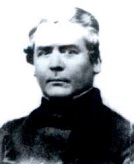






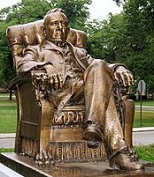


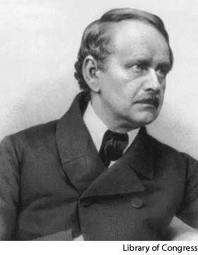

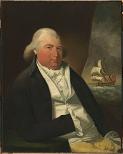
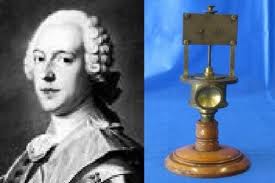

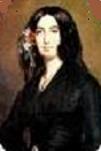





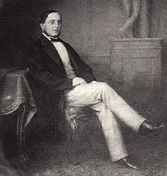
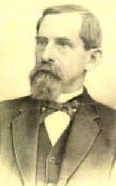
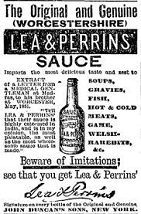
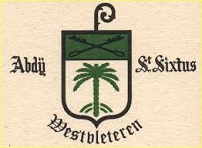
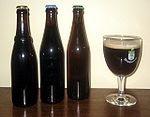
1838 On Jan. 6 Samuel F.B. Morse and Alfred Vail make their first private demonstration in Morristown, N.J. of the telegraph, sending dots and dashes through 2 mi. of coiled wire; the message is "A patient waiter is no loser". On Jan. 15 the U.S. govt. signs a treaty with the New York Indians. On Jan. 27 Abraham Lincoln gives his Lyceum Speech to the Young Men's Lyceum in Springfield, Ill., becoming his first important speech, containing the soundbyte "I know the American People are much attached to their government. I know they would suffer much for its sake. I know they would endure evils long and patiently before they would ever think of exchanging it for another. Yet, notwithstanding this, if the laws be continually despised and disregarded, if their rights to be secure in their persons and property are held by no better tenure than the caprice of a mob, the alienation of their affections from the government is the natural consequence; and to that, sooner or later, it must come." On Feb. 6 the Zulus, led by chief (since 1828) Dingaan (Dingane) sandbag and massacre Voortrekker Piet Retief (b. 1780) and his party of 55 at Weenen ("weeping) in Kwa Zulu Natal, causing the Boers under newly-arrived (last Nov.) Andries Wilhelmus Jacobus Pretorius (1798-1853) to organize a revenge army, and on Dec. 16 ("Dingane' Day") ("Day of the Vow") 10K+ Zulus attack them, and are driven back after losing 3K spear-chucking men to their guns, becoming known as the Battle of Blood River, which the whites use to create a myth of their own superiority. On Feb. 24 U.S. congressmen William Jordan Graves (1805-48) of Ky. and Jonathan Cilley (b. 1802) of Maine get in a duel with rifles at 80 paces on the Bladensburg, Md. dueling grounds, and on the 3rd round Cilley is killed, causing Congress to expel Graves and censure both of the seconds, who are also congressmen; next Feb. 20 Congress prohibits dueling in the District of Columbia. In Feb. Bible-thumping Charleston, S.C.-born abolitionist Angelina Grimke (Grimké) (1805-79) addresses a legislative committee of the Mass. State Legislature, becoming the first woman in the U.S. to address one, speaking against slavery while defending herself against male supremacists who don't think that women should have a right to petition; she follows with Letters to Catharine Beecher in 1838, while her sister Sarah Grimke pub. Letters on the Province of Woman, Addressed to Mary S. Parker. In Feb. Londoner Jane Alsop tells of seeing a bogeyman called Spring-Heeled Jack, who wears a tight-fitting white (oilskin) costume, and has big claws, devilish eyes, and flames coming from his mouth; continued reports of this bogeyman, who can leap from the street to the rooftops and back keep coming until 1904 in Liverpool? In Mar. the Anti-Corn Law League is founded in London by the principal Radical leaders in the House of Commons, incl. Richard Cobden (1804-65) and John Bright (1811-89) to fight for "untaxing the poor man's loaf". On Apr. 22 the 703-ton paddle-wheel steamer Sirius, captained by Irish-born Richard Roberts (-1841) arrives from London with 100 passengers in New York City after leaving Cork, Ireland on Apr. 2, traveling 2,897 nautical mi. at an avg. of 161 nautical mi. per day, becoming the first scheduled passenger-carrying Europe-to-Am. steamer; on Apr. 23, 18 hours after its arrival the slowpoke 1,440-ton steamer Great Western arrives from Bristol after a 15-day crossing, after which nobody remembers them?; too bad, Capt. Roberts goes down with his crew in the steamer President while returning from New York in Mar. 1841, and the Sirius sinks in Ware Cove on its 2nd New York trip with new capt. Stephen S. Moyle on Jan. 16, 1847. On Apr. 26 Joseph Smith Jr. receives a revelation renaming his Church of the Latter Day Saints (the Church of Christ before May 1834) to the Church of Jesus Christ of Latter Day Saints; in 1851 it is incorporated by the legislature of the provisional State of Deseret as the Church of Jesus Christ of Latter-day Saints; in 1876 a new ed. of "Doctrine and Covenants" decides to capitalize the word "The". In Apr. a new Portuguese Constitution is promulgated in Portugal, with three branches of govt. and a chamber of deputies directly elected by limited male suffrage - you better hold 'em? On May 23 despite protests by outraged U.S. citizens to Congress, the 16K-person Cherokee Nation of the Five Civilized Tribes is forcibly removed from their homeland in the Appalachians by U.S. troops under Gen. Winfield Scott along the bad news Trail of Tears to Okla., and 3K die along the way; women and children are seized first to force the men out of hiding; many are evacuated suddenly from their homes sans warm clothing, leading to deaths from pneumonia; the Yankees dig up family graves looking for silver jewelry; the wagon trains stop each day for roadside burials; they are interned in Fort Payne in Ala. before relocation to Okla.; a few Cherokees (the eastern band) hold out in the mountains and eventually acquire title to federal lands in N.C.; on Dec. 19, 2009 Pres. Obama signs the Brownback Native Am. Apology Resolution apologizing to the Cherokees and all Native Am. tribes for past wrongs, sponsored by U.S. Sen. (R-Kan.) (1996-2011) Samuel Dale "Sam" Brownback (1956-). On June 17 after Joseph Smith Jr. and his followers move to Far West, Caldwell County, NW Mo., and found the Danites vigilante group in June, declaring a site in Daviess County 5 mi. S of Jameson along the E bluffs above the Grand River to be Adam-ondi-Ahman (Diahman), the place where Adam and Eve lived after their expulsion from the Garden of Eden, claiming that it will be the gathering spot for the Mormon priesthood and prophets and righteous people before the Second Coming of Christ, dedicating it in Oct. and planning on building a temple there, Mormon leader Sidney Rigdon preaches the Salt Sermon in Far West, condemning dissenters Oliver Cowdery, David Whitmer and John Whitmer, William Wines Phelps et al. by comparing them with Matt. 5:13 ("If salt have lost its savor, wherewith shall it be salted? It is thenceforth good for nothing, but to be cast out, and to be trodden under foot of men"), after which on June 19 80 Mormons sign the Danite Manifesto, warning dissenters to "depart, or a more fatal calamity shall befall you"; too bad, the evacuating dissenters spread stories that whip-up anti-Mormon feeling, leading to the 1838 Missouri Mormon War; after Christian Whitmer and Peter Whitmer Jr. die in 1835 and 1836, the remaining members of the Whitmer family (a big part of the Eight Witnesses) fall out with Smith and are excommunicated along with other dissenters, fleeing Caldwell County after receiving an ultimatum from the Danites and never joining an LDS group again. On June 28 Queen Victoria is crowned in Westminster Abbey - no tears, you're white? In summer the Second Rendezvous for mountain men is held in Riverton, Wyo. at the confluence of the Big River and Little Wind River (first in 1830). On July 1 novelist (friend of Washington Irving) James Kirke Paulding (1778-1860) becomes U.S. Navy secy. #11 (until Mar. 4, 1841), going on to stink himself up by his opposition to steam-propelled warships, with the soundbyte "I would never consent to let our old ships perish, and transform our Navy into a fleet of sea monsters." On July 5 Va.-born Felix Grundy (1777-1840) becomes U.S. atty. gen. #13 (until Jan. 10, 1840). On July 15 Ralph Waldo Emerson gives an Address to Harvard Seniors, one of whom is Henry David Thoreau, who begins (at Emerson's suggestion) keeping a journal; Thoreau graduates this year, and becomes a schoolteacher in Concord, Mass., but is reprimanded by the supervising deacon for not caning his students, after which he picks six at random, flogs them, then resigns. On Aug. 1 all slaves in the British Empire are freed after the period of forced apprenticeship under the 1833 Slavery Abolition Act ends; of 4M African slaves imported to the British West Indies to work sugar plantations, only 400K remain. On Aug. 6 after Joseph Smith Jr. and his followers move to Far West, Mo., and found the Danites vigilante group in June, declaring a site in Daviess County 5 mi. S of Jameson along the E bluffs above the Grand River to be Adam-ondi-Ahman (Diahman), the place where Adam and Eve lived after their expulsion from the Garden of Eden, claiming that it will be the gathering spot for the Mormon priesthood and prophets and righteous people before the Second Coming of Christ, dedicating it in Oct. and planning on building a temple there, the 1838 Missouri Mormon War in a corridor 100 mi. E and NE of modern-day Kansas City, Mo. begins with an election battle in Gallatin County; on Oct. 24 the Battle of Crooked River sees the Mormons defeated by the Mo. state militia, resulting on Oct. 27 in Mo. Executive Order 44 ("Extermination Order") by Mo. Dem. Gov. #6 (1836-40) Lilburn Williams Boggs (1796-1860), calling for the expulsion of Mormons from Mo., with the soundbyte that Mormons were guilty of "open and avowed defiance of the laws, and of having made war upon the people of this State... The Mormons must be treated as enemies, and must be exterminated or driven from the State if necessary for the public peace - their outrages are beyond all description"; on Oct. 30 (4:00 p.m.) the Haun's (Hawn's) Mill Massacre in E Caldwell County, Mo. sees a mob of 240 incl. unathorized Mo. state militiamen and Mo. Regulators from Livingston County attack 30 Mormon families who had been disarmed by anti-Mormon raiders, causing the women and children to flee to the woods while the men hole-up in a blacksmith shop with widely-spaced logs, allowing the mob to fire 100+ rifles into the bldg. for 30-60 min., firing 1.6K rounds until dusk sets in at 5:16 p.m., killing 17 and injuring 15; on Nov. 1 Joseph Smith Jr. surrenders in Far West after 22 are killed, incl. 21 Mormons, causing the rest (10K) to move to Nauvoo, Ill. (Heb. "they are beautiful", based on Isaiah 52:7) (formerly Quashquema, Venus, and Commerce) in Hancock County on the Mississippi River near Fort Madison, Iowa, buying it in late 1839 and renaming it in Apr. 1840, growing to 12K pop. by 1844; the Nauvoo Legion starts out as a state authorized militia, turning into Gen. Joseph Smith Jr.'s personal army; meanwhile in 1838 Mormon Church co-founder Oliver Cowdery leaves the church and is excommunicated, becoming a Methodist, then returns in 1848. On Sept. 3 literate Am. mulatto slave Frederick Douglass (Frederick Augustus Washington Bailey) (1817-95) makes his celebrated escape to freedom from Baltimore, Md. to Philly. On Sept. 7 Grace Darling (1815-42) becomes a celeb when she helps her lighthouse keeper daddy rescue nine survivors of a shipwreck off the Farne Islands off the coast of Northumberland, England. On Oct. 5 Cherokee Indians pissed-off at the Anglo abrogation of their 1837 treaty with Sam Houston massacre settlers in East Tex. in the Killough Massacre, killing or kidnapping 18 incl. Isaac Kilough Sr. and his family, who arrived from Talladega County, Ala. on Dec. 24, 1837, becoming the largest and last Native Am. attack on white settlers in East Tex.; eight escape on horseback. On Nov. 9 Ft. Gatlin in C Fla. (modern-day pop. 238K/3.1M) is established by the 4th U.S. Artillery led by Ltc. Alexander C.W. Fanning for use in the Second Seminole War, named after Army physician Dr. John S. Gatlin, who was KIA in Dade's Massacre on Dec. 26, 1835; in 1838 the fort is abandoned, and settlers found the town of Jernigan, named after cattlemen Isaac and Aaron Jernigan; in 1856 it becomes the county seat of Orange County; in 1857 it is renamed Orlando, after a local grave of a man named Orlando Reeves who died in 1835; it was really named after a char. in Shakespeare's "As You Like It"?; it goes on to become known as "the City Beautiful" and "Theme Park Capital of the World" after Walt Disney World opens in 1971 and Universal Orlando Resort opens in 1999. On Nov. 27 the Pastry (First Franco-Mexican) War with France begins over debts and reparations claimed from Mexico from all their political fighting (ends Mar. 9, 1839), named after a French pastry shop owned by Monsieur Remontel that was sacked by drunken army troops in 1828; after the Mexican govt. refuses to pay the 600K pesos demanded, the French start shelling Ft. San Juan de Ulua in Veracruz, after which Mexico declares war on France, and the French capture the city, causing Antonio Lopez de Santa Anna to leave his ranch near Veracruz to rush to the defense. On Dec. 10 rebuffed in their efforts at annexation by the Van Buren admin., the Texans elect Ga.-born Mirabeau Buonaparte Lamar (1798-1859), cavalry cmdr. at the Battle of San Jacinto as pres. #2 of the Repub. of Texas (until Dec. 13, 1841), becoming known for talking of expanding to the Pacific and rivaling the U. Stinks, er, U.S., creating the Second Texas Navy; France and Britain recognize Texas and begin developing trade relations. The price on our tag is the price you pay, not a penny more? France recognizes the independence of Haiti in exchange for a financial indemnity of 90 gold francs to compensate plantation owners; most nations incl. the U.S. shun Haiti for the next 40 years, fearful that its example of uppity black men will spread. The Treaty of Balta Liman is signed by the Ottomans and Britain to regulate trade, setting duties at 7% on imports, 16% on exports, and 8% on transiting goods, with the Ottomans agreeing to abolish all monopolies; the start of major Euro power interference in the Ottoman Empire? The Chartists, an English working class radical movement collects and submits a People's Charter to Parliament, demanding annual parliaments, universal manhood suffrage, equal electoral districts, and other reforms considered extravagant at the time. The Federation of Central American States (El Salvador, et al.) of 1821 is disbanded. The Irish Poor Law establishes the English system of 1834 in Ireland, although Irish MPs object that there are too many poor to be provided for in workhouses. N.Y. passes the Free Banking Act, allowing anyone to open a bank who complies with certain legal conditions; other states soon follow suit, issuing their own money. Converted Jew Sir Francis Palgrave (1788-1861) founds the Public Records Office in Britain after being appointed its first deputy keeper, issuing 22 annual reports until his death. The Panic of 1837 is eased this year by a bad British wheat harvest which causes them to buy American wheat. By now every E U.S. state except Vt. has railroads. Pitcairn Island of 1790 "Mutiny in the Bounty" fame is annexed as a British colony. Boston, Mass. establishes a police force; it takes New York City until 1845. A U.S. branch mint is established in Dahlonega, Ga.; by the time it closes in 1861 it receipts over $6M in gold. Britain jas 90 ships of the line in naval service, Russia 50, France 49, the U.S. only 15. The South Seas (Wilkes) Exploring Expedition (ends 1842) (first U.S. govt.-sponsored scientific maritime venture?), led by U.S. Navy Lt. Charles Wilkes (1798-1877) leaves with six ships and 246 men to explore the Pacific Ocean from top to bottom, incl. the Pacific Northwest and the Sulu Sea, eventually mapping 280 Pacific islands, discovering Antarctica, and founding the science of plate tectonics - the Lewis and Clark expedition of the sea? An expedition by the Astrolabe and Zelee, captained by gout-ridden Jules Sebastien Cesar Dumont d'Urville (1790-1842) (which left last year) discovers Palmer Land and Joinville Island in the Antarctic. London is linked to Birmingham, causing the original Liverpool and Manchester Railway to contain the first trunk system. The Public Record Office is founded in London. The first traveling post office is established in England, running between Liverpool and Birmingham. The town of McAlester, Okla. at the intersection of the Calif. Road and Tex. Road is founded on land owned by the Choctaw Nation by Miss. immigrant Alyssia Young, originally called Perryville, becoming the capital of the Choctaw Nation; it is later renamed after Okla. lt. gov. #2 (1911-15) James Jackson "J.J." McAlester (1842-1920), who is a char. in the 1968 Charles Portis novel "True Grit". Horace Mann (1796-1859) becomes secy. (until 1848) of the Mass. Board of Education (first in the U.S.), which as a state sen. (1833-7) he helped create, and after an 1843 visit to Europe begins educational reforms, reversing the Bible-based philosophy (incl. corporal punishment), and fathering the secular nonsectarian state (public) tax-supported school movement - grab your coats, children? Acadia U. (Queen's College until 1841, then Acadia College until 1891) is founded in Wolfville, Nova Scotia, Canada. Duke U. is founded in Brown's Schoolhouse in Trinity, N.C. by the Union Inst. Society of Methodists and Quakers, becoming the Union Inst. Academy in 1841, Normal College in 1851, and Trinity College in 1859; in 1892 it moves to Durham, N.C. after donations by rich Methodist tobacco magnate George Washington Duke (1820-1905). The Camden Society is founded in London to pub. historical and antiquarian documents. After becoming one of the Am. intelligentsia who receive Alexis de Tocqueville during his 1831-2 visit to the U.S., helping load his brain with disinfo., er, info., Willington, Conn.-born Unitarian minister Jared Sparks (1789-1866) becomes the first McLean Professor of Ancient and Modern History at Harvard U., endowed by the will of wealthy merchant John McLean (1761-1823), becoming the first academic encouragement of original research in Am. history; in 1849-53 he becomes pres. of Harvard U.; "It was not until Jared Sparks began his important labors in 1818 that scholars undertook the study of the history of the English race in America with a serious spirit." (Albert Bushnell Hart) The secret Danites org. is formed by the Mormons to defend the church with violence. The clergy-free Peculiar Sect is founded in Britain to take Titus 2:14 seriously and reject all medical aid. Lebanon, N.H.-born Phineas Parkhurst Quimby (1802-66) attends the lectures of French mesmerist Charles Poyan in Belfast, Maine, and becomes a believer, going on to promote the mind as the basis of healing, with the soundbyte: "The trouble is in the mind, for the body is only the house for the mind to dwell in... Therefore, if your mind had been deceived by some invisible enemy into a belief, you have out into it the form of a disease, with or without your knowledge. By my theory or truth, I come in contact with your enemy, and restore you to health and happiness. This I do partly mentally, and partly by talking till I correct the wrong impression and establish the Truth, and the Truth is the cure." Nakayama Miki (1798-1887) (AKA Oyasama), wife of a poor peasant farmer founds the popular panentheistic ecstatic-dancing faith-healing Tenrikyo (Jap. "teaching of divine reason") sect in Japan. Charles Darwin goes through a crisis of faith when he compares humans to orangutans, saying "It is absurd to talk of one animal being higher than another" - so why don't you marry one? The Daguerre-Niepce method of photography is presented by physicist Francois Jean Dominique Arago (1786-1853) to the Academie des Sciences and the Academie des Beaux Arts in Paris - when did they make the first open box shots? The London Nat. Gallery opens. English comedic actor Henry Compton (1805-77) joins the co. at the Theatre Royal in Drury Lane, London, going on to become the #1 Shakespearean clown of Victorian England, especially known for playing Touchstone in "As You Like It". French actress Elisa Felix Rachel (1821-58) debuts at the Theatre Francais in Paris in Pierre Corneille's "Horace". Jenny Lind (1820-87), "the Swedish Nightingale" debuts in Stockholm in Carl Maria von Weber's "Der Freischutz". George Sand moves up and joins an artistic circle incl. Chopin, Balzac, Liszt, Delacroix, and Lamennais, and begins a romantic liaison with Chopin (ends 1847), whom she meets through Franz Liszt; too bad her artistic development is arrested (until 1841)? The New York Herald becomes the first U.S. newspaper to employ European correspondents. Am. geologist Ebenezer Emmons (1799-1863) coins the name "Adirondacks" for the mountains in NE New York state, after the Mohawk word "ratirontaks", meaning "they eat trees", referring to their enemies the Alonquians, who they accused of always being so hungry that they would eat anything. Lea & Perrins brand Worcestershire sauce is introduced by pharmacists John Wheeley Lea (1791-1874) and William Henry Perrins (1793-1867) of Worcestershire, England, whose initial batch was so strong it was abandoned in the basement, but later found to be marketable after it ferments and mellows; in 1930 it is acquired by HP Foods, which in 1967 is acquired by the Imperial Tobacco Co., which is sold in 1988 to Damone, followed in 2005 by Heinz. Westvleteren Brewery in Vleteren, Belgium is founded by the Trappist Abbey of Saint Sixtus near the hop-producing town of Poperinge, producing three beers that become known for taste and quality, lucking-out during WWI and WWII by being allowed to keep their copper vessels; it only begins selling beer to the public in 1931, and in 1945 begins selling bottles sans labels, with legal info. printed on the crown caps; too bad, they don't advertise, brew only to order, and require the customer to pick it up at the door, which is only done once a week. Sports: The Queen's Vase 2 mi. race for 3-y.-o. Thoroughbreds is founded at Ascot, England, opening to older horses in 1840. Architecture: On Oct. 3 Mount Hope Cemetery in Rochester, N.Y. is dedicated, becoming the oldest municipal park-garden graveyard in the U.S. in modern times. The 135-ft. Earl Grey Monument in Newcastle upon Tyne is erected to honor Charles Grey, 2nd Earl Grey of tea fame; Gateshead fiddler James Hill (1811-56) composes the song Earl Grey to commemorate it. The Strasbourg Clock (built 1574) is replaced by a new one built by Jean Baptiste Schwilgue (Schwilgué) (1776-1856) (finished 1843). The Grand Kremlin Palace in Moscow is begun. Inventions: Charles Babbage of England invents the Cow Catcher, attached to the front of a train to clear obstacles off the track. David Bruce of New York City invents the Pivotal Typecasting Machine, capable of producing 6K pieces of type an hour, revolutionizing the biz by replacing men who acted as handcasters, causing a mini Luddite revolt; he patents it in 1845. Moritz Hermann Jacobi of St. Petersburg, Russia invents Electrotyping (Galvanoplastics) to make duplicate plates for relief printing. Sir Charles Wheatstone invents the Stereoscope. Science: The Bedford Level Experiment sees English inventor Samuel Birley Rowbotham (1816-84) use a 6-mo. stretch of the Old Bedord River in Cambridgeshire, U.K. to prove that the Earth is flat, later pub. the book "Zetetic Astronomy: Earth Not a Globe" under the alias Parallax (1849), containing the soundbyte: "The Earth is an enclosed plane, centered at the North Pole and founded along its outward edge by a wall of ice, with the Sun, Moon, planets, and stars only about 3,000 miles above the surface of the Earth (4,800 km) and the Glass Firmament at about 3,100 miles (5,000 km), only about 100 miles away from the Sun and the Moon." in 1870 Alfred Russel Wallace claims that atmospheric refraction is consistent with a spherical Earth. Atronomers Friedrich Wilhelm Bessel (1784-1846) of Germany, Friedrich Georg Wilhelm von Struve (1793-1864) of Germany, and Thomas Henderson (1798-1844) of Scotland measure stellar parallax for the first time this year and next in binary star system 61 Cygni with measurements 6 mo. apart, giving the heliocentric theory its final proof. French philosopher Auguste Comte (1798-1857) gives Sociology its name - if not its substance? Charles M. Hovey of Mass. introduces a strawberry grown from seed produced by hybridization, becoming a first for the North Am. continent. Dutch chemist Fox Mulder, er, Gerardus Johannes Mulder (1802-80) finds nitrogen and sulfur atoms in albuminoids, and decides that their structure is more complex than carbohydrates and lipids, causing Jons Jakob Berzelius to suggest the name "protein", from the Greek word for "of primary importance". Samuel Birley Rowbotham (1816-84) (AKA Parallax), founder of the English Flat Earth Society conducts the Bedford Level Experiment on the 6-mi.-long Old Bedford River in Norfolk, claiming to prove that the Earth is flat, and pub. the book Earth Not a Globe in 1849 (2nd ed. 1865); in 1870 planist John Hampden offers a wager on the truth of this experiment, which is taken up by Alfred Rusell Wallace, and when he disproves Rowbotham, Wallace claims that he cheated and sues, ending up in priz for libel. German botanist Matthias Jakob Schleiden (1804-81) pub. "Failures to Contribute to Phytogenesis", announcing that plants are composed of cells. French engineer-physicist Baron Charles Cagniard de la Tour (1777-1859) theorizes that yeast is composed of tiny living spherules which bud and produce more spherules. After reading Thomas Malthus' "An Essay on the Principle of Population" (1798), French mathematician Pierre Francois Verhulst (1804-49) pub. the Logistic Equation to model pop. growth; in 1925 Alfred J. Lotka names it the Law of Pop. Growth. Nonfiction: James Audubon (1785-1851), The Birds of America, vol. 4 of 4. English linguist George Henry Borrow (1803-81) pub. the Gospel of Luke in Gitano (Gypsy) in Spain, prompting one scared Roman Catholic bishop to remark, "He will convert all Spain by means of the gypsy language"; he also pub. the same gospel in Spanish Basque. Cesare Cantu (1804-95), Storia Universale (35 vols.); a big hit; a 19th cent. attempt at a Great Track of Time? Thomas Carlyle (1795-1881), Scott. Antoine Augustin Cournot (1801-77), Researches into the Mathematical Principles of the Theory of Wealth; founds modern economic analysis, introducing functions and probability into economics, deriving the first equation for supply and demand as a function of price and becoming the first to graph supply-demand curves, and proposing the Cournot Duopoly (Competition) Model, where firms are free to set the amount of output they produce, proposing the concepts of Nash Equilibrium, Monetary Policy Reaction Function, and Best Response Dynamics. James Fazy, Histoire de Geneve (1838-40). Ludwig Feuerbach (1804-72), Pierre Bayle. William Ewart Gladstone (1809-98), The State in Its Relations With the Church; how the Anglican state church is the good life, full of fun, seems to be the ideal?; "The aim is to show that the highest duty and highest interest of a body politic tend to place it in close relations of cooperation with the Church of Christ." Joseph Grimaldi (1778-1837), Memoirs (2 vols.); ed. by Charles Dickens. The struggle for emancipation in the U.S. becomes very grim, thumping the Bible to prove its point? Angelina Grimke (1805-79), An Appeal to the Christian Women of the South; pub. by the American Anti-Slavery Society; first and only appeal written by a Southern woman to other Southern women appealing for the abolition of slavery; "Did not Jesus condemn slavery? Let us examine some of his precepts. "Whatsoever ye would that men should do to you, do ye even so to them." Let every slaveholder apply these queries to his own heart; Am I willing to be a slave - Am I willing to see my wife the slave of another - Am I willing to see my mother a slave, or my father, my sister or my brother? If not, then in holding others as slaves, I am doing what I would not wish to be done to me or any relative I have; and thus have I broken this golden rule which was given me to walk by." Sir Charles Lyell (1797-1875), Elements of Geology (2nd ed.) in Aug.; becomes the std. student textbook. Augustus De Morgan (1806-71), An Essay on Probabilities, and Their Application to Life Contingencies and Insurance Offices. Luigi Edoardo Pellegrino, Count Rossi (1787-1948), Cours d'Economie Politique (1838-54); the doctrines of Say, Rousseau, and Malthus for dummies. John Lloyd Stephens (1805-52), Incidents of Travel in Greece, Turkey, Russia and Poland. David Friedrich Strauss (1808-74), In Defense of My Life of Jesus against the Hegelians; divides Hegelians into Right, Left, and Center, and disses opponent Bruno Bauer as a Right Hegelian, earning him a lifelong enemy, who later puts Friedrich Nietzsche up to criticizing him. Madame Marie Tussaud (1761-1850), Memoirs. Wilhelm Weitling (1808-71), Die Menschheit. Wie Sie ist und Wie Sie Sein Sollte (1838-9). Christian Gottlob Wilke, Der Urevangelist; proposes the Marcan Hypothesis that the Gospel of Mark is the original narrative. Music: Hector Berlioz (1803-69), Benvenuto Cellini (opera) (Grand Opera, Paris) (Sept. 3); how he cast his masterpiece statue of Perseus in 1545-54. Jacques Fromental Halevy, Guido et Ginevra. Heinrich Marschner (1795-1861), Der Babu, Op. 98 (opera). Johann Strauss I (1804-49), Paris Waltz, Op. 101. Art: George Catlin, Portrait of Osceola; as a POW in Ft. Moultrie, S.C. William Sidney Mount, The Painter's Triumph. Bertel Thorvaldsen (1770-1844), Christ and the Twelve Apostles (1819-38) (Frauenkirche, Copenhagen). Plays: Almeida Garrett (1799-1854), Auto de Gil Vincente. Robert Browning, Strafford. Edward George Bulwer-Lytton (1803-73), The Lady of Lyons (London, Covent Garden). Casimir Delavigne (1793-1843), La Popularite (Popularité). Christian Dietrich Grabbe, Hermannsschlacht (Herman's Battle) (tragedy). Franz Grillparzer (1791-1872), Weh dem, der Lugt (comedy) (Mar. 6) (Wiener Burgtheater); the hero wins by always telling the truth because his enemies expect him to always lie; a flop. Victor Hugo (1802-85), Ruy Blas (verse drama) (Nov. 8) (1st play produced at the Theatre de la Renaissance, Paris); his best drama?; about commoner poet Roy Blas, who is dressed up as a noble by his boss Don Sallustio to get revenge on Charles II's queen, but it backfires and his intellect causes the queen to fall for him and get him appointed PM; Sallustio then gets him to expose his servant origins by ordering him to close the window and pick up his handkerchief, pissing Blas off enough to kill him, after which he is saved from suicide by the queen, who forgives him and declares her love; Felix Mendelssohn writes the Ruy Blas Overture based on it, although he hates the play; trans. into English in 1858 by Edmund Falconer. Fanny Kemble (1809-93), The Star of Seville. Poetry: Elizabeth Barrett Browning (1806-61), The Seraphim and Other Poems; her first work to gain critical attention. Baroness Annette Elisabeth von Droste-Hulshoff (1797-1848), Gedichte - what revolution? James Henry Leigh Hunt (1784-1859), Abou Ben Adhem; about an Arab Muslim Sufi mystic who died in 777, and how on the Islamic night of Shab-i-Barat, the Night of Records, "Allah takes the golden book of mankind and crosses off the names of those whom he is calling to him in the coming year, those whom he loves", with you know who's name at the top of the list. Nikolaus Lenau (1802-50), Neuere Gedichte; pants over his friend's wife Sophie von Lowenthal. Mikhail Lermontov (1814-41), The Loss of Pushkin; blames court officials for complicity in his murder, after which they send him off to the Caucasus in the army. Johan Olof Wallin (1779-1839), Angel of Death. Novels: Anon., Missing One's Coach: An Anachronism (Dublin Lit. Mag.); a man waiting for a coach is transported back in time to visit Venerable Bede. Cesare Cantu (1804-95), Margherita Pusterla; fellow prisoner blows him away? Charles Dickens (1812-70), The Life and Adventures of Nicholas Nickleby (1838-9); young Nicholas must support his mother and sister after his father dies while dealing with Uncle Ralph, who thinks he's a bum because he goes around rescuing victims of improbable cruelty; Wackford Squeers of Dotheboys Hall. Alexandre Dumas pere (1802-70), Le Capitaine Paul. Theodore Edward Hook (1788-1841), Gurney Married. Karl Immermann (1796-1840), Munchhausen: A Story in Arabesques (4 vols.) (1838-9); contains Der Oberhof, a famous idyllic portrait of village life. John Pendleton Kennedy (1795-1870), Rob of the Bowl: A Legend of St. Inigoes; colonial Md. in the days of the 2nd Lord Baltimore. Edward William Lane (1801-76) (tr.), The Thousand and One Nights (1838-40); first accurate English trans. Charles Nodier (1780-1844), Ines de la Sierras; Legende se Sour Matrix. James Kirke Paulding (1778-1860), A Christmas Gift from Fairy Land. Edgar Allan Poe (1809-49), The Narrative of Arthur Gordon Pym of Nantucket (July) (first and only novel); a young man stows away aboard the whaling ship Grampus, witnessing mutiny, shipwreck, and cannibalism before being saved by the Jane Guy, on which he and Dirk Peters sail S to the South Pole; he does much better with short stories and poetry? George Sand (1804-76), L'Uscoque; L'Oreo; La Derniere Aldini; Les Maitres Mosaistes. Gustav Schwab (1792-1850), Die Schonsten Sagen des Klassischen Altertums. Robert Smith Surtees (1803-64), Jorrocks' Jaunts and Jollities; illustrated by "Phiz"; a sporting-vulgarity-spitting cockney grocer; the basis of Dickens' "Pickwick Papers". Heinrich Daniel Zschokke (1771-1848), Ausgewahlte Novellen und Dichtungen (16 vols.) (1838-9). Births: Am. 3'3" celeb General Tom Thumb (Charles Sherwood Stratton) (d. 1883) on Jan. 4 in Bridgeport, Conn.; husband (1863-) of Lavinia Warren Stratton (1841-1919). French mathematician Marie Ennemond Camille Jordan (d. 1922) on Jan. 5 in Lyon. German "Violin Concerto No. 1 in G minor" Romantic composer (Protestant) Max Christian Friedrich Bruch (d. 1920) on Jan. 6 in Cologne. Am. Franciscan nun Mother Marianne Cope (Maria Anna Barbara Koob) (St. Marianne of Molokai) (d. 1918) on Jan. 23 in Heppenheim, Germany; emigrates to the U.S. at age 3. Am. physicist Edward Williams Morley (d. 1923) on Jan. 29 in Newark, N.J.; educated at Williams College; collaborator of A.A. Michelson (1852-1931). German neurologist Eduard Hitzig (d. 1907) on Feb. 6; educated at the U. of Berlin and U. of Wurzburg. English Shakespearean stage actor-mgr. (Freemason) Sir Henry Irving (John Henry Brodribb) (d. 1905) on Feb. 6 in Keinton Mandeville, Somerset; cousin of W.H. Davies (1871-1940); father of actor Harry Brodribb Irving (1870-1919) and dramatist Laurence Irving (1871-1914); grandfather of Laurence Irving (1897-1988); knighted in 1895 (first actor); inspiration for Bram Stoker's "Dracula". British field marshal Sir Evelyn Wood (d. 1919) on Feb. 9 in Cressing (near Braintree), Essex; educated at Marlborough College; brother of Katharine Parnell (1846-1921); first British Sirdar of Egyptian army - how fast does he read? Am. New Thought leader Julius A. Dresser (d. 1893) on Feb. 12 in Portland, Maine; husband of Annetta Seabury Dresser; father of Horatio Willis Dresser (1866-1954). Am. "The Education of Henry Adams" historian (anti-Semitic) Henry Brooks Adams (d. 1918) on Feb. 16 in Boston, Mass.; 3rd son of diplomat (Pres. Lincoln's ambassador to London) Charles Francis Adams (1807-86), son of U.S. pres. John Quincy (J.Q.) Adams (1767-1848); great-grandson of U.S. pres. John Adams (1735-1826); educated at Harvard U.; as a boy is told he will grow up to be pres. too, but can't stand the corruption of the Grant admin., becoming a Harvard historian instead; member of the Five of Hearts friends circle incl. his wife Clover Adams, geologist Clarence King, secy. of state John Hay, and his wife Clara. Am. brown paper bag inventor Margaret E. Knight (d. 1914) on Feb. 14 in York, Maine. English Pre-Raphaelite painter Valentine Cameron "Val" Prinsep (d. 1904) on Feb. 14 in Calcutta, India. Austrian physicist-philosopher Ernst Waldfried Josef Wenzel Mach (d. 1916) on Feb. 18 in Brno-Chrlice (Chirlitz), Moravia; educated at Charles U. Am. Art Nouveau founder Samuel Siegfried Bing (d. 1905) on Feb. 26 in Hamburg, Germany. Am. physician (first U.S. head and neck surgeon) Jacob da Silva Solis-Cohen (d. 1927) on Feb. 28 in New York City; brother of Solomon Solis Cohen (1857-1948). Italian Passionist clerical student (St.) Gabriel of Our Lady of Sorrows (Francesco Possenti) (d. 1862) on Mar. 1 in Assisi. Am. "Barriers Burned Away", "The Earth Trembled" Presbyterian pastor-novelist Edward Payson Roe (d. 1888) on Mar. 7 in Moodna, Orange County, N.Y.; educated at Williams College and Auburn Theological Seminary; coaxes New England Puritans into reading fiction because of its high moral-religious purpose. English aniline dye chemist Sir William Henry Perkin (d. 1907) on Mar. 12 in East London; educated at the Royal College of Chemistry, London; pupil of August Wilhelm von Hofmann; knighted in 1906. Irish historian William Edward Hartpole Lecky (d. 1903) on Mar. 26 in Newtown Park (near Dublin); educated at Cheltenham College, and Trinity College, Dublin. French PM #37 (1881-2) Leon (Léon) Gambetta (d. 1882) on Apr. 2 in Cahors, Lot; Genoese father, French mother; loses left eye in accident at age 15. Am. Neo-Lamarckian zoologist-paleontologist Alpheus Hyatt (d. 1902) on Apr. 5 in Washington, D.C.; educated at Yale U. Belgian Solvay Ammonia-Soda Process chemist Ernest Solvay (d. 1922) on Apr. 16 in Rebecq. French gallingly cocky scientist Paul-Emile (Francois) Lecoq de Boisbaudran (d. 1912) on Apr. 18 in Cognac. Scottish-Am. conservationist ("John of the Mountains") ("Father of the National Parks") (co-founder of the Sierra Club) John Muir (d. 1914) on Apr. 21 in Dunbar, East Lothian; emigrates to the U.S. in 1849; educated at the U. of Wisc. Dutch jurist (Jewish) Tobias Michel Carel Asser (d. 1913) on Apr. 28 in Amsterdam. I spell it M-A-N Man? Am. "Romeo" actor and pres. assassin "Jumping" John Wilkes Booth (d. 1865) on May 10 in Bel Air, Md.; youngest son of actor Junius Brutus Booth Sr. (1796-1852); brother of actor Junius Brutus Booth Jr. (1821-83) and Edwin Booth (1833-93). British "The American Commonwealth" historian-diplomat James Bryce, 1st Viscount Bryce (d. 1922) on May 10 in Belfast, Ireland; educated at the U. of Glasgow, and Trinity College, Oxford U. U.S. Sen. (R-Mich.) (1889-1902) James McMillan (d. 1902) on May 12 in Hamilton, Ont., Canada; Scottish immigrant parents; emigrates to the U.S. in 1855. English Utilitarian moral philosopher (co-founder of the Society for Psychical Research) Henry Sidgwick (d. 1900) on May 31 in Skipton, Yorkshire; educated at Trinity College, Cambridge U. German historical school economist Gustav von Schmoller (d. 1917) on June 24 in Heilbronn. Indian Bengali "Vande Mataram" novelist Bankim Chandra Chatterji (Chatterjee) (d. 1894) on June 26 in Naihati; educated at the U. of Calcutta. German weapons manufacturer Peter Paul Mauser (d. 1914) on June 27 in Oberndorf am Neckar, Wurttemberg; brother of Wilhelm Mauser (1834-82). German gen. and airship designer Count Ferdinand Adolf Heinrich August von Zeppelin (d. 1917) on July 8 in Kanstanz, Baden-Wurttemberg. Am. merchant (dept. store innovator) John Wanamaker (d. 1922) on July 11 in Philadelphia, Penn.; eldest son of a brickmaker. Am. "Under the Gaslight" playwright-critic-mgr. ("the Autocrat of the Stage") John Augustin Daly (d. 1899) on July 20 in Plymouth, N.C. English historian-statesman Sir George Otto Trevelyan, 2nd Baronet (d. 1928) (pr. tri-VIL-yun) on July 20 in Rothley Temple, Leicestershire; father of historian George Macaulay Trevelyan (1876-1962); educated at Harrow and Trinity College, Cambridge U. German liberal politician-journalist Eugen Richter (d. 1906) on July 30 in Dusseldorf; Bismarck's chief opponent. Am. U.S. marshal (black) Bass Reeves (d. 1910) in July in Crawford County, Ark.; born a slave, property of Ark. state rep William Steele Reeves; grows up in Grayson County, Tex. French rev. leader Gustave Flourens (d. 1871) on Aug. 4 in Paris; son of Jean Pierre Flourens (1794-1867); brother of Emile Flourens (1841-1920). French Bourbon head (1883-94) Louis-Philippe Albert of Orleans, Comte de Paris (d. 1894) on Aug. 24; son of Prince Ferdinand-Philippe (1810-42); grandson of Louis-Philippe I (1773-1850); father of Louis Philippe Robert (1869-1926). English chemist Henry George Madan (d. 1901) on Sept. 6 in Cam Vicarage, Glouchestershire; educated at Marlborough College, and Corpus Christi College, Oxford U.; brother of Falconer Madan (1851-1935), grandfather of Pluto namer Venetia Burney (1918-2009). Canadian-Am. railroad promoter ("Empire Builder of the Northwest") James Jerome Hill (d. 1916) on Sept. 16 in Eramosa, Ontario. Spanish statesman Gen. Valeriano Weyler Nicolau, Marquis de Tenerife (d. 1930) on Sept. 17 in Palma de Majorca; German Prussian father, Spanish mother; educated in Granada. Dutch realist landscape and animal painter Anton (Anthonij) Rudolf Mauve (d. 1888) on Sept. 18 in Zaandam; cousin and teacher of Vincent van Gogh (1853-90); like to paint shepherds following their flock along a country lane using subdued greens and greys. Am. suffragist-feminist (1872 Equal Rights Party candidate for U.S. pres.) Victoria Claflin Woodhull (d. 1927) on Sept. 23 in Homer, Licking County, Ohio. Am. architect Henry Hobson Richardson (d. 1886) on Sept. 29 in St. James Parish, La.; educated at Harvard U., and Ecole des Beaux Arts (2nd-ever U.S. student). U.S. secy. of state #37 (1898-1905) and poet John Milton Hay (d. 1905) on Oct. 8 in Salem, Ind.; Abe Lincoln's secy.; educated at Ill. State U., and Brown U. English philanthropist (Disraeli's private secy. from 1866-81) Montagu William "Monty" Lowry-Corry, 1st Baron Rowton (d. 1903) on Oct. 8 in Grosvenor Square, London; educated at Harrow School, and Trinity College, Cambridge U. Am. writer and Atlantic Monthly ed. (1890-8) Horace Elisha Scudder (d. 1902) on Oct. 16 in Boston, Mass.; educated at Boston Latin School, and Williams College. Am. writer-artist-engineer Francis Hopkinson Smith (d. 1915) on Oct. 23 in Baltimore, Md.; known for his positive portrayals of the Old South. French "Carmen" composer Georges Alexandre Cesar Leopold Bizet (d. 1875) on Oct. 25 in Bougival (near Paris); son-in-law and student of Jacques Halevy (1799-1862). British (Irish) lt. gen. Sir William Francis Butler (d. 1910) on Oct. 31 in Golden, County Tipperary. Portuguese Braganza king #33 (1861-89) Luis I (O Popular) (d. 1889) on Oct. 31 in Lisbon; 2nd son of Maria II (1819-53) and Ferdinand II (1816-85); brother of Peter V (1837-61), Joao (1842-61) and Fernando (1846-61). French "Axel" symbolist novelist-poet(founder of the French Symbolist movement) (Rosicrucian) Jean-Marie-Mathias-Philippe-Auguste, Comte de Villiers de l'Isle-Adam (d. 1889) on Nov. 7 in Saint-Brieuc, Brittany. U.S. Supreme Court justice #56 (1895-1909) Rufus Wheeler Peckham (d. 1909) on Nov. 8 in Albany, N.Y. Am. sculptor Edward Virginius Valentine (d. 1930) on Nov. 12 in Richmond, Va. Am. Mormon Church pres. #6 (1901-18) Joseph Fielding Smith Sr. (d. 1918) on Nov. 13 in Far West, Mo.; nephew of Mormon founder Joseph Smith Jr. (1805-44), and last pres. to know him personally; father of Joseph Fielding Smith Jr. (1876-1972). British Virginius Affair rear adm. Sir Lambton Loraine, 11th Baronet (d. 1917) on Nov. 17; father of Sir Percy Loraine, 12th Baronet (1880-1961). Am. bottle cap and bottle opener inventor (Crown Holdings founder) William Painter (d. 1906) on Nov. 20 in Ireland; emigrates to the U.S. in 1859. Am. meteorologist (dir. #1 of the U.S. Weather Bureau) Cleveland "Old Probability" Abbe (d. 1916) on Dec. 3 in New York City. English housing reformer Octavia Hill (d. 1912) on Dec. 3 in Wisbech, Cambridgeshire; sister of Miranda Hill (1836-1910); granddaughter of Thomas Southwood Smith (1788-1861). German electrical industrialist (Jewish) Emil Moritz Rathenau (d. 1915) on Dec. 11 in Berlin; father of Walther Rathenau (1867-1922). Australian explorer John King (d. 1872) on Dec. 15 in Moy, County Tyrone, Ireland. English "Flatland" novelist-theologian Edwin Abbott Abbott (d. 1926) on Dec. 20; educated at St. John's College, Cambridge U. Russian chemist Vladimir Vasilyevich Markovnikov (Markownikoff) (d. 1904) on Dec. 22 in Knyaginino, Nizhny Novgorod; student of Richard Erlenmeyer and Hermann Kolbe. English Liberal statesman-writer John Morley, Viscount Morley of Blackburn (d. 1923) on Dec. 24 in Blackburn, Lancashire; educated at Lincoln College, Oxford U. German chemist (discoverer of germanium) Clemens Alexander Winkler (d. 1904) on Dec. 26 in Freiberg, Saxony. French "The Triumph of the Republic", "The Reader", "The Triumph of Silenus" realist sculptor Aime-Jules (Aimé-Jules) Dalou (d. 1902) on Dec. 31 in Paris; student of Jean-Baptiste Carpeaux; known for large-scale groups. French pres. #8 (1899-1906) Emile (Émile) Francois Loubet (d. 1929) on Dec. 31 in Marsanne, Drome. English sculptor James Frank Redfern (d. 1876). Russian Olivier Salad chef Lucien Olivier (d. 1883) in Belgium. Am. chocolatier Etienne Guittard (d. 1899) in Lyon, France; emigrates to the U.S. in the 1850s. Am. celeb (Wild Bill Hickock's gambler friend) Charles H. "Colorado Charlie" Utter (d. 1904) near Niagara Falls, N.Y.; friend of Wild Bill Hicock. Syrian Muslim grand mufti of Homs (1861-) Khaled Efendi al-Atassi al-Husseini (d. 1908) in Homs; father of Hashim Bay Khalid al-Atassi (1875-1960). Am. "Yale Book of American Verse" scholar-educator Thomas R. Lounsbury (d. 1915); educated at Yale U. Hawaiian monarch #8 (1891-3) and composer Liliuokalani (Lili'uokalani) (d. 1917); born Lydia Kamaka'eha to parents who are 1st cousins; sister of Kalakaua I (1836-91); wife (1863-91) of John Owens Dominis (1832-91) sister-in-law of Queen Kapiolani. Am. circus proprietor Charles Forepaugh (d. 1929). Deaths: Italian librettist Lorenzo Da Ponte (b. 1749) on Aug. 17 in New York City. Am. inventor (steam navigation) Col. John Stevens III (b. 1749) on Mar. 6. French statesman Charles Maurice de Talleyrand-Perigord (b. 1754) in May in Paris: "One must always put oneself in a position to choose between two alternatives." Spanish viceroy of New Spain #59 (1810-13) Gen. Francisco Javier Venegas (b. 1754) on Feb. 18 in Madrid. English antiquarian Sir Richard Hoare (b. 1758) on May 19 in Stourhead, Wiltshire. French orientalist Baron de Sacy (b. 1758) on Feb. 21 in Paris. English horticulturist Thomas Andrew Knight (b. 1759). German Bavarian statesman Maximilian von Montgelas (b. 1759) on June 14 in Munich. Italian-English artist-composer Maria Cosway (b. 1760) on Jan. 5 in Lodi. Hungarian Jewish rabbi Akiva Eger (b. 1761). French Empire Style architect Charles Percier (b. 1764) on Sept. 5 in Paris. German composer-organist Thomas Attwood (b. 1765) on Mar. 24 in Chelsea. Am. Sac chief Black Hawk (b. 1767) in Ft. Des Moines, Iowa, and is buried near Burlington in a shallow grave; 9 mo. later his body is stolen by local physician James Turner in a scheme to exhibit the skeleton; after the Iowa gov. makes him give it up, another physician keeps it for 13 years in his office, where Black Hawk's wife views it "with the apparent curiosity of a child"; a fire destroys it in 1853. English diarist Thomas Creevey (b. 1768) in Feb.; leaves The Creevey Papers (pub. in 1903). Scottish abolitionist Zachary Macaulay (b. 1768) on May 13 in London; a memorial in Westminster Abbey depicts a kneeling slave with the motto: "Am I not a Man and a Brother?" Am. explorer William Clark (b. 1770) on Sept. 1 in St. Louis, Mo. Scottish-born British. gov. of Canada (1819-28) Gen. George Ramsay, 9th earl of Dalhousie (b. 1770) on Mar. 21 in Midlothian, Scotland. Am. naval commodore John Rodgers (b. 1772) on Aug. 1 in Philadelphia, Penn. Am. mathematician-astronomer Nathaniel Bowditch (b. 1773) on Mar. 16. French zoologist Frederic Cuvier (b. 1773) on July 24. French chemist Bernard Courtois (b. 1777) on Sept. 27. English educator Joseph Lancaster (b. 1778) on Oct. 23. South African Boer leader Piet Retief (b. 1780) on Feb. 6 in Hlomo Amabuto; killed along with 100 Boers by the Zulus under Dingane. French-born German poet-botanist Adelbert von Chamisso (b. 1781) on Aug. 21 in Berlin. French chemist-physicist Pierre Dulong (b. 1785) on July 19. Hungarian poet Ferenc Kolcsey (b. 1790) on Aug. 24 in Cseke. German religious historian Johann Adam Mohler (b. 1796) on Apr. 12 in Munich. French explorer Rene Caillie (b. 1799) on May 17 in La Gripperie-Saint-Symphorien, Charente-Maritime (TB). Seminole leader Osceola (b. 1804) on Jan. 20 in Ft. Moultrie (near Charleston), S.C.; dies a prisoner "Ready to die... cursing the white man.. to the end of his breath" (George Catlin). Am. Houston, Tex. co-founder John Kirby Allen (b. 1810) on Aug. 15 in Houston, Tex.






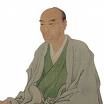
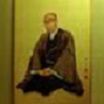






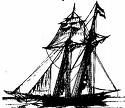


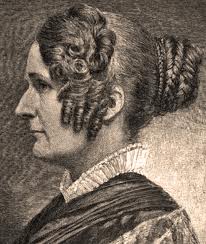

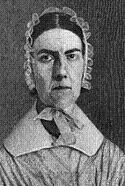
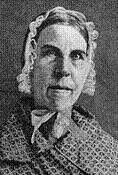

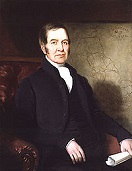




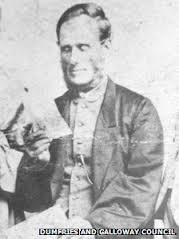





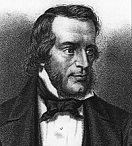

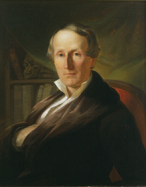

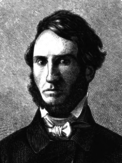











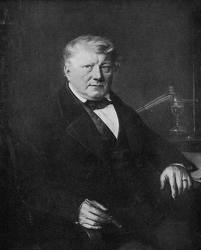

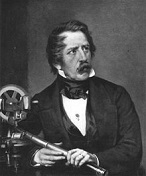
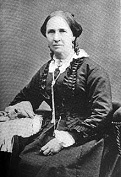

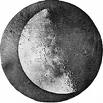
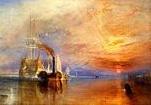
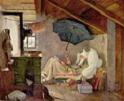
1839 On Jan. 6 the Blizzard of 1839 ravages the NE coast of the U.S. for 12 hours, destroying 20 ships and killing 40, incl. the Favorite from Wicasset, Maine, which is wrecked on Norman's Woe Reef in Cape Ann off Gloucester, Mass., becoming the subject of Henry Wadsworth Longfellow's 1842 poem The Wreck of the Hesperus. On Jan. 7 after partnering with Nicephore Niepce in 1829, French artist Louis Jacques Mande (Mandé) Dauguerre (1787-1851) gives his first public demonstration of his new photographic process, and it becomes an instant hit, launching "daguerréotypomanie"; "An hour later, all the opticians' shops were seiged, but could not rake together enough instruments to satisfy the onrushing army of would-be daguerreotypists; a few days later you could see in all the squares of Paris three-legged dark-boxes planted in front of churches and palaces." (Helmut Gernsheim); on Feb. 23 the earliest report of the Daguerrotype in the U.S. appears in the Boston Daily Advertiser, which calls it a "remarkable invention"; in Sept. Robert Cornelius of Philadelphia learns the process and begins making improvements; at least two dozen men from Norway to Brazil step forward to claim precedence over Daguerre? On Jan. 20 Chilean govt. forces under Gen. Manuel Bulnes (1799-1866) defeat Peru-Bolivian Confederation forces at the Battle of Yungay in Peru. On Jan. 29 Charles Darwin (b. 1809) marries Emma Wedgwood (b. 1808), granddaughter of pottery king Josiah Wedgwood; they have 10 children, incl. Anne Elizabeth "Annie" Darwin (1841-51), Sir George Howard Darwin (1845-1912), and Sir Francis Darwin (1848-1925) - survival of the fittest joke here? In Jan. after getting the first British consulate opened in Jerusalem, ardent Zionist Tory MP Anthony Ashley Cooper, 7th Earl of Shaftesbury (1801-85) pub. an article in the Quarterly Review proposing resettlement of Jews in Palestine, the first by a major politician, and talks British foreign secy. Henry John Temple, 3rd Viscount Palmerston (1784-1865) (AKA Pam) into stepping up plans to return Jews; next Nov. 4 he takes out a full-page ad in the Times of London addressed to the Protestant monarchs of Europe, calling for them to help restore the Jews to the Holy Land, which stirs up a group of 320 Christians to send a letter to Palmerston on Mar. 2, 1841 "to remind your Lordship that the land of Palestine was bestowed by the Sovereign of the Universe upon the descendants of Abraham as a permanent and inalienable possession nearly 4,000 years ago, and that neither conquests nor treaties among men can possibly affect their Title to it. He has also decreed that they shall again return to their country and that the Gentiles shall be employed as the means of their restoration." On Feb. 20 the Jonathan Cilley slaying of the year before spurs Congress to prohibit dueling in the District of Columbia - stick to all-out Civil War? In Feb. the bloodless Aroostook War between New Brunswick and Maine over their boundary begins; pres. troubleshooter Gen. Winfield Scott keeps the hotheads in check, an agreement in Mar. averts actual fighting, and the matter is settled in 1842 by the Webster-Ashburton Treaty. On Mar. 23 the Boston Morning Post carries the earliest use of the expression "O.K." (meaning "oll korrect"), and it enters the Am. English language as Dems. first use it to abbreviate Old Kinderhook, then the Whigs steal it to put on pro-Harrison cider barrels, claiming Andy Jackson invented it. On Mar. 29 the Young Ireland movement is founded by Protestant Thomas Osborne Davis (1814-45) at a meeting of the College Historical Society in Dublin, promoting Irish nationalism along with Catholic-Protestant unity, with the soundbyte: "The country of our birth, our educations, our recollections, ancestral, personal, national; the country of our loves, our friendships, our hopes; our country: the cosmopolite is unnatural, base - I would fain say, impossible. To act on a world is for those above it, not of it. Patriotism is human philanthropy"; he goes on to compose the influential song A Nation Once Again (July 13, 1844). In Mar. the Pastry War (begun 1838) ends after Santa Anna loses a leg trying unsuccessfully to defend Veracruz, and agree to pay the full 600K pesos demanded by the Frogs, who withdraw their fleet. In Mar. the last group of Cherokees reach Okla.; they adopt a constitution on Aug. 23. Attention please, this is a public auction notice? On Apr. 19 the Treaty of London between Britain, Austria, France, Prussia, Russia on one side, and the Netherlands on the other is signed to settle the dispute between the Dutch and their former Belgian subjects; W Luxembourg is given to Belgium, while E Luxembourg continues in union with the Netherlands, as a grand duchy and member of the German Confederation; in Article 7 Britain pledges to save the chicken, er, guard the neutrality of Belgium in the event of its invasion, beginning the Long Fuse Leading to WWI (Article 7, not Article 9, isn't it always number 9?); meanwhile the original coalition govt. in Belgium falls apart as the Roman Catholics split from the Liberals, the latter being led by utopian socialist Charles Latour Rogier (1800-85), calling for secular reforms. In Apr. Commodore Edwin Ward Moore (1810-65) becomes fleet cmdr. of the new Second Texas Navy (until July 1843), running it during its glory years, battling Mexican ironclads to keep the Texas Repub. afloat; too bad, he ends up getting fired in disgrace for piracy in 1843 by Sam Houston when he regains the presidency, and the naval vessels are sold at auction. On May 7 after the Whigs lose seats in the parliamentary election, reducing their majority to only 38, and the cabinet, able to carry a measure by a majority of only five in a full house resigns, the Bedchamber Crisis results when Whig PM Viscount Melbourne advises Victoria to appoint Tory Sir Robert Peel as his successor, and she balks at the latter's suggestion that she replace Whigs with Tories in her royal household (ladies of the bedchamber), because Peel considers them as holders of political offices, not just personal attendants; on May 13 Peel gives a speech, declining to form a ministry, and Viscount Melbourne returns against his own wishes; the rising Irish agitation for home rule causes his cabinet to fall. In May Louis Auguste Blanqui (1805-81) et al. stage an unsuccessful uprising against the French govt., and he is arrested and sentenced to life in prison, but pardoned early in 1848. On June 13 unpopular Serbian prince (since Nov. 6, 1817) Milos Obrenovic I abdicates in favor of his sickly eldest son Milos Obrenovic II (b. 1819), who spends all 26 days of his rule in a coma, dying on July 8, and his younger brother Michael (Mihailo) III Obrenovic (1823-68) becomes prince of Serbia (until Sept. 14, 1842). On June 24 after Mehmet Ali informs Britain and France on May 25, 1838 that he intends to declare independence from the Ottoman Empire, which they try in vain to stop, the Egyptians under Hafiz Pasha are badly defeated at the Battle of Nizip (Nezib) (Nessib) in S Syria (Lebanon) by Mehmet Ali, and on July 1 Ottoman sultan (since 1808) Mahmud II (b. 1785) dies of TB, and his Euro-educated French-speaking son Abdul Mecid (Mejid) I (1823-70) becomes Ottoman sultan #31 (until June 25, 1861), after which the entire Turkish fleet under Adm. Ahmed Fevzi Pasha sails to Alexandria and surrenders to Mehmet Ali on the pretext that the new sultan's advisers are owned by Russia, leading to the Second Egyptian-Ottoman (Turko-Egyptian) (Syrian) War (ends 1841), with a British-Austrian expeditionary force occupying Beirut and Acre and forcing Mehmet Ali to submit off Alexandria; on Nov. 3 under British pressure the sultan issues the Noble Rescript (Noble Edict of the Rose Chamber), declaring an end to corruption and arbitrary rule (e.g. instant death at will), and inaugurating the Tanzimat ("reorganization") Era of the Ottoman Empire (ends 1876), trying to continue his daddy's Westernization and modernization program while encouraging Ottomanism and discouraging nationalism, which, as Westerners also find out, can't be stopped; reforms start with abolition of public slave markets in the 1840s, outlawing of the turban in favor of the fez, and eventually incl. secularism and decriminalization of homosexuality, which only pisses-off the hardcore Muslims more, leading to a reactionary movement that resists all reforms. In June the 1839 Hawaiian Bill of Rights (Hawaiian Constitution) is proclaimed by Kamehameha III, providing the groundwork for a free enterprise systema and guaranteeing that the Hawaiian people won't lose their land. In the summer massive increases in state borrowing and the collapse of internal improvement projects in the W and S U.S. lead to the Crisis of 1839, beginning four years of deflation and depression in the U.S. In June-Oct. Imam Shamil and his 4K followers are sieged in their stronghold of Akhoulgo on the Andee Koisou River 10 mi. E of Gimry; after 80 days the Russians win a V after taking 3K casualties while wiping out the rebels, except Shamil, who escapes with a small party. On July 1 Spanish sloop La Amistad (Sp. "friendship"), carrying 50 African slaves recently sold in Havana, Cuba is taken over by the slaves, who kill the captain and one crewman, and hold two Spaniards captive to act as navigators to sail them back to Africa; a U.S. naval vessel intercepts them, releases the Spaniards and imprisons the Africans, and they are indicted for murder, causing U.S. abolitionists to take up their cause. On Aug. 31 the Convention (Embrace) of Vergara is signed in Vergara (Bergara), Gipuzkoa, Basque Spain by Gen. Baldomero Esartero for the Isabelinos and Gen. Rafael Maroto for the Carlists, Gen. Rafael Maroto for the Carlists, ending the First Carlist War (begun Sept. 29, 1833), recognizing the ranks and titles of 1K Carlist officers but pissing-off the Basques with its perfunctory treatment of home rule, causing Carlist gen. Ramon Cabrera y Grino (Ramón Cabrera y Griñó) (1806-77) to continue fighting in C Spain, holding out to next July, when his troops flee to France along with pretender Don Carlos Maria, waiting for the chance to return (1848). In Aug. the First Anglo-Afghan War begins (ends 1842) when the British East India Co. sends an army to dethrone Dost Mohammed and replace him with ousted Shah Shoja of the rival Sadozay clan of the Durranis, taking Kandahar and Kabul and installing him as their puppet. On Sept. 20 the ship Tory carrying the New Zealand Co. begins settling the city of Wellington, New Zealand at the SW tip of North Island between Cook Strait and the Rimutaka Range (modern-day pop. 416K) (named after Arthur Wellesley, 1st Duke of Wellington), followed next Jan. 22 by 150 more settlers on the ship Aurora; in 1865 it replaces Auckland as the capital of New Zealand, becoming the closest nat. capital to Antarctica. In Sept. the Zurich Revolt in Switzerland caused by crop failures and led by peasant-backed conservatives topples the liberal govt. On Oct. 3 the Naples-Portici Railway opens, becoming the first railway line in Italy; it goes on to carry 131K passengers by the end of the year, and 1M in one year; in 1842 it is extended to Castellammare di Stabia, and in 1844 to Nocera. On Oct. 12 after their big V at Blood River, the Boer Voortrekkers set up the independent Natalia Repub., with capital at Pietermaritzburg, which allies with the Zulu next Jan. before being annexed by Britain on May 12, 1843. On Oct. 15 after her mother and uncle get him to visit her days earlier, Victoria proposes to Prince Albert of Saxe-Coburg-Gotha, her first cousin, and the engagement is announced soon afterward. On Nov. 3 after the Chinese attempt to curb British imports of opium, detaining British ships and destroying 2.64M lbs. of British opium, the First Anglo-Chinese (Opium) War begins (ends Aug. 29, 1842); Chinese junks prove no match for British warships, so it's a cakewalk for the British, although it's a big country? Christian VIII (1786-1848) becomes king of Denmark (unti Jan. 20, 1848). On Dec. 4-8 the first 1839 Whig Nat. Convention in Harrisburg, Penn. sees Henry Clay, who declared on Feb. 7 "I had rather be right than president" lead on the first ballot, but the convention wants a Whiggish Jackson type and ends up picking Gen. William Henry Harrison of Ohio for pres., and Clay's close friend John Tyler of Va. for vice-pres.; wellborn, college-educated (U. of Penn.) Harrison is made-over into a hard cider-tippling war hero who was born in a log cabin, with the slogan "Tippecanoe and Tyler Too"; Harrison is advised to "say nothing, promise nothing" by his backers who stage countless rallies, parades, and barbecues in his honor, gaining him the title of "General Mum". The British Metropolitan Police Act of 1839 greatly increases the powers granted to London bobbies in the 1829 act, incl. powers over shipping arriving in the Port of London and on the Thames River, the power to close public houses (pubs) on Sun., Xmas, and Good Friday until 1 p.m., prohibit the sale of alcoholic drinks to minors under 16 years of age, jail drunks et al., along with the power to police "nuisances by persons in thoroughfares", incl. "furious driving", distribution of obscene lit., disturbances of the peace incl. abusive language, etc. Guatemala breaks with Spain and becomes a repub., with Rafael Carrera as virtual dictator for life (1865), backed by mestizo Indians and the Roman Catholic Church; he reinstates ecclesiastical privileges and abolishes the head tax, allowing Indians to keep their communal properties. Uruguay declares war against Argentina, launching the Uruguayan Civil War (Guerra Grande) (ends 1851). Don Carlos Maria, pretender to the throne of Spain is defeated and escapes to France. Thomas Buchanan (1808-41), white cousin of future U.S. pres. James Buchanan becomes the first pres. of Liberia, a PC way of dumping black and partly-black slaves back in Africa rather than set them free in America and let them go after our white wimmin? - white massah must get you a good start so you won't want to return? The Rebecca Riots in SW Wales begin as men dress up in women's clothing and attack the hated tollgates of the monied landowners (ends 1843). Delegates from manufacturing towns meet in London and prepare a monster petition of worker grievances, which is disregarded by the House of Commons, causing Chartism to split into violent and peaceful but defeated factions. The British capture Aden in S Yemen and make it into a major port. The U.S. Congress begins employing young people in a clerical capacity as pages. U.S. Rep. John Quincy Adams introduces a bill to abolish slavery in the U.S., which doesn't get anywhere; next is on Dec. 14, 1863. After the site is chosen to replace Houston as the new capital of Tex., the city of Austin, Tex. (Lat. "magnificent") (modern-day pop. 2.0M/967K) on the Colorado River is incorporated, named after Stephen F. Austin "the Father of Texas" (first Tex. secy. of state); it goes on to become known as "the City of the Violent Crown" (sunset light on the hills), "the Live Music Capital of the World", and "Silicon Hills". After a Mo. tax collector in the new Iowa Territory cuts down three hollow trees containing honey bee hives in lieu of taxes, and Clark County, Mo. sheriff Uriah S. "Sandy" Gregory is arrested by the sheriff of Van Buren County, Iowa for attempting to collect Mo. taxes, the Honey War between Iowa and Mo. begins, with militias assembling at the border; in 1849 after Iowa enters the Union in 1846, the U.S. Supreme Court upholds the Sullivan Line ending at the Des Moines River as the border. After being chased from Mo. during the winter, Joseph Smith and his 12K Mormons found the city of Nauvoo, Ill. in Hancock County on the Mississippi River 100 mi. upriver of St. Louis, Mo. The town of Pietermaritzburg in South Africa 41 mi. W of the Indian Ocean and 73 mi. WNW of Durban is founded as the capital of Natal. My name is Earl, but wrong coast? After an earlier visit, Rev. Jason Lee (1803-45) rounds up a party of white settlers from Peoria, Ill. to settle Oregon, with the avowed goal to "raise the American flag and run the Hudson's Bay Company out of the country"; Oregon Fever begins. The British ships Erebus and Terror, commanded by James C. Ross and F.R.M. Crozier set out on a voyage of the Antarctic. Am. travellers John Lloyd Stephens (1805-52) and Frederick Catherwood (1799-1854) (an artist) discover and explore the ancient Mayan ruins in Central Am. Lydia Maria Child (1805-80), Lucretia Mott (1793-1880), and Maria Weston Chapman (1806-85) are elected to the exec. committee of the Anti-Slavery Society, pissing-off some of the men. The British reform their postal system, dropping rates by 85%; the U.S. Post Office, ever-known for waste faces its first competition by private companies, causing Congress to keep lowering postal rates a total of 80% by 1851 to drive them out of business. The Custody of Children Act gives British mothers not guilty of adultery the right to custody of their children under age seven. The seaport of Fort-de-France, capital of Martinique in the French West Indies is hit by an earthquake. The Korean govt. begins persecuting Roman Catholics again. The Japanese govt. clamps down on scholars of Rangaku ("Dutch Learning") (Western learning), imprisoning leading scholars Watanabe Kazan (1793-1841) and Takano Choei (1804-50); meanwhile Sakuma Shozan (1811-64) laps up Western science and Chinese philosophy at the same time, coining the phrase, "Eastern morality and Western technology" - be patient, Grasshopper? A bumper cotton crop overloads the market, setting off a depression in the U.S. cotton industry until the mid 1840s. James K. Polk becomes gov. of Tenn. (ends 1841). The Hungarian Diet passes legislation to make Indo-Altaic (Ugric) Magyar (pr. MODE-YAR) language (which traces back to Mongolia) the official language of Hungary, and to free peasant holdings from feudal obligations. Residence and work requirements for Chinese are removed in the Philippines, leading to an increase in the Chinese pop. John Stokes discovers Darwin Bay in Australia. The city of Corpus Christi, Tex. (Lat. "Body of Christ") (modern-day pop. 305K/320K) in coastal S Tex. is founded by Col. Henry Lawrence Kinney (1814-62) as Kinney's Trading Post to sell supplies to a Mexican rev. army. The Ecclesiological Society (originally the Cambridge Camden Society until 1845, named after 16th cent. antiquary William Camden) is founded by undergraduate students of Cambridge U. to promote "the study of Gothic Architecture, and of Ecclesiastical Antiques", going on in Oct. 1841 to pub. the monthly journal The Ecclesiologist, which advocates a return to the medieval style of church architecture in England, growing to 700+ members in the 1840s; in 1841 the society pub. the pamphlet "A Few Words to Church-Builders", recommending the early English style for small chapels and the decorated (perpendicular) style for large ones, recommending the later for all churches in the 3rd (1844) ed.; too bad, Anglican members begin suspecting the motives of Roman Catholic and Quaker members. Ceylon begins minting quarter farthing (one-sixteenth of a penny) coins (until 1853), which end up becoming part of the British mintage even though they are too small for practical use. The prickly pear is introduced to Australia for use as hedging, but it grows out of control and by 1925 infests 60M acres, until Am. caterpillars get it under control. After Queen Victoria grants him the first license to haul mail across the Atlantic, Sir Samuel Cunard (1787-1865) founds the British and North Am. Royal Mail Steam Packet Co., later known as the Cunard Line, which later bills itself as "the most famous ocean liners in the world". The first railway is opened in Wales. The first newspapers with photographs appear. The phrase "don't give a tinker's damn" first appears. After Ross' Landing was used last year by the U.S. Army as the site one of three large internment camps (along with Fort Payne, Ala. and Ft. Cass, Tenn.) for Cherokees on their way down the Trail of Tears, the city of Chattanooga, Tenn. (modern-day pop. 168K/548K) in SE Tenn. on the Tennessee River 120 mi. NW of Atlanta, Ga., 120 mi. SW of Knoxville, Tenn., 135 SE of Nashville, Tenn., 120 mi. NE of Huntsville, Ala., and 148 mi. NE of Birmingham, Ala. is incorporated, becoming a boom town after the arrival of the railroad in 1850, with the slogan "Where cotton meets corn". Swiss watchmaker Patek Philippe is founded in Geneva. John Lowell Jr. (1799-1836), son of Francis Cabot Lowell founds the Lowell Inst. in Boston, Mass. to provide free public lectures by eminent scholars. Framingham State Teachers College in Lexington, Mass. is founded, becoming the first teachers college in the U.S.; in 1852 it is moved to Framingham, Mass. 21 mi. WSW of Boston. Longwood U. in Farmville, Va. (2 mi. from the Israel Hill community of free black people formed about 1800) is founded on Mar. 5 by Methodist minister Solomon Lea as the Farmville Female Seminary Assoc. (until June 5, 1875); in early Apr. the Union and Confed. armies march past the N end of the campus before the Apr. 9, 1865 Battle of Appomattox Court House; in 1951 a student strike at Robert Russa Moton H.S. at the S end of the campus helps lead to the U.S. Supreme Court case Brown v. Board of Education; it goes coed in June 1976. State-supported Virginia Military Inst. (VMI) is founded at the state arsenal in Lexington, Va., becoming known as "the West Point of the South". French Socialist Jean Joseph Charles Louis Blanc (1813-82) founds the Socialist periodical Revue du Progres. Hunt's Merchants' Mag. and Commercial Review begins pub. (until 1870), becoming the first of its kind in the U.S. Charles Darwin becomes secy. of the Geological Society of London (until 1841). Brainy Providence, R.I. school principal and language teacher Sarah Margaret Fuller begins running meetings for women in Boston, allowing her to gather material to prove that women deserve equal rights. The Am. Journal of Dental Science is founded by Chapin Aaron Harris (1806-60). The Nurse Society of Philadelphia in Penn. is founded by Quaker physician Joseph Warrington, who pub. "The Nurse's Guide, Containing a Series of Instruction to Females Who Wish to Engage in the Important Business of Nursing Mother and Child in the Lying-In Chamber", employing 50 nurses by 1850, who are sent to care for patients in their homes. Harriet Martineau is declared fatally ill by physicians, but is cured in 1844 by Mesmerism? Joseph Smith Jr. sends the Quorum of the Twelve Apostles on a mission to the British Isles (ends 1841); Orson Pratt Sr. (1811-81) preaches in Scotland, and pub. the tract "An Interesting Account of Several Remarkable Visions", containing the first pub. of Smith's First Vision, along with parts of Smith's 1842 Articles of Faith; meanwhile Smith gives a sermon, in which he teaches that Adam is actually archangel Michael, and that he held the First Presidency in his pre-mortal life, and now holds "the keys of the Universe", hence all priesthood keys (abilities to unlock various priesthood powers) are revealed from heaven; next year he adds that Adam is the one "through whom Christ has been revealed from heaven, and will continue to be revealed from henceforth"; he finally goes all the way and claims that God was once a man "like one of us" in his 1844 King Follette discourse; Brigham Young becomes a big fan of this Looney Tunes doctrine; Smith also teaches belief in the Heavenly Mother, telling Zina Diantha Huntngton Jacobs Smith Young (1821-1901) after her mother died: "Not only would she know her mother again on the other side, but 'more than that, you will meet and become acquainted with your eternal Mother, the wife of your Father in Heaven'"; Zina later marries Joseph Smith Jr. and Brigham Young while still married to her first husband Henry Jacobs, and becomes pres. #3 of the LDS Relief Society in 1888-1901. French artist Alexandre Gabriel Decamps (1803-60) gets three of his paintings exhibited in the Salon, and receives the Legion of Honor, making him BMOC in France. Failed novelist Nathaniel Hawthorne (b. 1804) gets a job as a weigher in the Boston, Mass. customhouse (until 1841). Felix Mendelssohn conducts the first performance of Franz Schubert's 1828 "Great" Symphony in C major in the Leipzig Gewandhaus. Moravian-born Bohemian historian Francis Palacky (1798-1876) is appointed historiographer of Bohemia by the Austrian govt., and goes on to serve in the Austrian parliament, where he fights for an autonomous federated Czech state consisting of Moravia, Bohemia, and Silesia - you can't hurry love, you just have to wait? English poet laureate Robert Southey marries poet Caroline Anne Bowles (1786-1854) two years after his first wife Edith dies. Sports: On Feb. 18 the Detroit Boat Club is founded. In July the Henley Royal Regatta at Henley-on-Thames is first staged, becoming the #1 English amateur rowing event; it takes until 1914 for a U.S. team to win it (Harvard College). Abner Doubleday (1819-93) allegedly invents Baseball in Cooperstown, N.Y., although he is enrolled at West Point from 1838-42 and cadets are not allowed to leave campus in their early years; becoming a famous Union Civil War. gen. who fired the first Union shot at Ft. Sumter probably helped him grab the credit - if he even did that? Inventions: On Feb. 24 Pelham, Mass.-born William Smith Otis (1813-39) of Philly (older cousin of elevator man Elisha Otis) patents the Steam Shovel, then dies on Nov. 13. English-born Am. scientist John William Draper (1811-82) becomes the first person in N.Y. to use the Daguerre process, and makes photographs of the Moon; a photo he makes next year of his sister Dorothy Catherine Draper becomes the oldest photographic portrait to survive to modern times; meanwhile after Louis Daguerre's invention is announced in Jan., English inventor William Henry Fox Talbot (1800-77) claims priority (1835) over Daguerre in photography and argues his case before the Royal Society. Am. inventor Charles Goodyear (1800-60) invents the Vulcanization Process for Rubber, which he patents on June 15, 1844, leading to the mass production of rubbers, AKA condoms; denture bases, previously made of gold, become affordable to the masses; too bad, English scientist Thomas Hancock (1786-1865) patents vulcanization of rubber on May 21, 1844, and Goodyear only comes up with his 1839 story in his 1853 autobio. Gum-Elastica; starting in 1890 Brazil experiences a rubber boom, going from 31 tons exported this year to 27K tons in 1900. In 1839 Welsh inventor Sir William Robert Grove (1811-96) invents the Platinum-Zinc Battery (Grove Cell), and uses it to power an electric arc light in the Finsbury Circus in London. The Velocipede, a Draisienne with pedals on the rear wheels (first true bicycle) is invented by Scottish blacksmith Kirkpatrick Macmillan (1810-78). German physicist Carl August von Steinheil (1801-70) uses silver chloride and a cardboard camera to take negative photos at the Museum of Art and the Munich Frauenkirche, taking another photo of the negatives to produce positives on 4 cm. round stock, becoming known as the Steinhell Method, the first daguerreotypes in Germany; he goes on to discover ground electicity and invent the electric clock and a method of silver-coating curved glass surfaces (with Leon Foucault). Science: French Parisian physicist Antoine Cesar Becquerel (1788-1878) and his son Alexandre Edmond Becquerel (1820-91) discover the Photoelectric (Photovoltaic) Effect. German philologist Franz Bopp claims that Celtic (Gaelic) is a part of the Indo-European language family - he's fighting for their free-ee-dom? German scientist Heinrich Wilhelm Dove (1803-79) discovers how Binaural Beats, slightly different frequencies played separately to each ear can be used to induce relaxation. German chemist Justus von Liebig works out a description of the process of fermentation which discounts the possibility that yeast consists of living microorganisms. German mad scientist Baron Karl Reichenbach goes off the deep end and falls for the works of Franz Anton Mesmer, coming up with Odic Force to explain the life force that permeates and connects all living things - Odic Wan Kenobe joke here? Czech physiologist Jan Evangelista Purkinje (Purkyne) (1787-1869) coins the term "protoplasm" for the fluid substance of a cell. Swiss chemist Carl Gustav (Gustaf) Mosander (1797-1858) discovers the rare-earth metallic element Lanthanum (La) (#57) (Gr. for hidden). Ozone (O3) (gr. "ozein" = to smell) is discovered and named by German-Swiss scientist Christian Friedrich Schoenbein (Schönbein) (1799-1868), co-inventor of the fuel cell in 1838; its molecular structure and formula is determined in 1865 by Swiss chemist Jacques-Louis Soret (1827-90), which are confirmed by Schoenbein in 1827. The vitalist theory of animal life is dumped, and the cell-growth theory of biology is boosted by German histologist Theodor Schwann (1810-82) with his discovery of animal cells, consisting of protoplasm separated by membranes, all mature tissues of animals being traceable to embryonic, nucleated cells; he discovers yeast cells, and generalizes that cells are the common structural and functional unit of all living organisms - and likes to paint his trucks mustard yellow? Berlin apothecary Eduard Simon discovers Polystyrene in storax, the resin of the Turkish sweetgum tree Liquidambar orientalis. Eugene Soubeiran and Hyacinthe Captaine discover Cubebin. The acute disease of bends (caisson disease) (aeroembolism) is first observed. Nonfiction: Anon., The Prophecy of Orval; allegedly by Nostradamus. George Bancroft, History of the Colonization of the United States. Louis Blanc (1813-82), L'Organisation du Travail; argues for state-financed producers' assocs.; contains the immortal soundbyte: "To each according to his needs, from each according to his abilities." George Bradshaw (1800-53), Bradshaw's Railway Time Tables and Assistant to Railway Travelling (Oct. 19); first railway timetable compilation. Joseph Stevens Buckminster (1784-1812), Collected Sermons (posth.). Thomas Carlyle (1795-1881), Chartism; the evils of British capitalism. Theodore Dwight (1764-1846), The Character of Thomas Jefferson as Exhibited in His Own Writings; makes Abraham Lincoln "hate him as a man." (William Herndon) Michael Faraday (1791-1867), Experimental Researches in Electricity (1839-55). Johann Wolfgang von Goethe (1749-1832), Complete Works (40 vols.) (posth.) (1839-40); ed. Johann Peter Eckermann and Friedrich Wilhelm Riemer. Sylvester Graham (1794-1851), Lectures on the Science of Human Life (2 vols.). Chapin Aaron Harris (1806-60), The Dental Art (Principles and Practice of Dental Surgery). Eliphas Levi (1810-75), Of the Moral Customs and Doctrines of Rationalism in France. William Hamilton Maxwell (1792-1850), Life of the Duke of Wellington (1839-41). Jules Michelet (1798-1874), Histoire Romaine. Samuel George Morton (1799-1851) and George Combe (1788-1858), Crania Americana: or, A Comparative View of the Skulls of Various Aboriginal Nations of North and South America: To which is Prefixed an Essay on the Varieties of the Human Species (3 vols.) (1839-49); claims after making his own measurements that Caucasians have the biggest brains of all races, and Negroes the smallest, proving racial superiority and inferiority, respectively; claims that the ancient Egyptians were Caucasian based on brain sizes despite frequent Negroid facial features; backs the creation story in Genesis, but claims that God created the different races via a series of multiple racial creations AKA polygenism, and that they are therefore fixed, making him "the Father of Am. Physical Anthropology", giving scientific racism its foundation and making big fans of Southern Ams. who want to keep the races separated with whitey as the massuh; too bad, Charles Darwin's 1859 "The Origin of Species" upends the debate. John Muir (1810-82), Mataparika: Sketch of the Argument for Christianity and Against Hinduism; is sympathetic to Hinduism and the "Hindu genius" while claiming Christianity is superior, pissing-off Indian scholars, who churn out works claiming the reverse. Theodor Schwann (1810-82), Mikroskopische Untersuchungen uber die Ubereinstimmung in der Structur und dem Wachsthum der Thiere und Pflanzen. Jean Charles Leonard Simonde de Sismondi (1773-1842), Precis de l'Historie des Francais. Jared Sparks (1789-1866), Life of Washington. John K. Townsend, Narrative of a Journey across the Rocky Mountains to the Columbia River; sparks Oregon Fever. Theodore Dwight Weld (1803-95) et al., American Slavery As it As: Testimony of a Thousand Witnesses; makes a fan of Harriet Beecher Stowe; 2nd most influential anti-slavery book after her "Uncle Tom's Cabin". Music: John Barnett (1802-90), Farinelli (opera). Frederic Chopin (1810-49), Piano Sonata No. 2 in B-flat minor, Op. 35 ("Funeral March"). Alexander Dargomyzhsky (1813-69), Esmeralda (first opera); based on Victor Hugo's "Notre Dame de Paris". Fromental Halevy (1799-1862), Les Treize (opera); Le Sherif (opera); Le Drapier (opera). Samuel Lover (1797-1868), Songs and Ballads; incl. Rory O'More; The Low-backed Car; Molly Bawn; The Angel's Whisper. Carl Otto Nicolai (1810-49), Enrico II (opera) (Trieste). Giuseppe Verdi (1813-1901), Oberto, Conte di San Bonifacio (2-act opera) (first opera) (Nov. 17) (Teatro alla Scala, Milan); libretto by Temistocle Solera; British debut in Feb. 1982 in Bloomsbury Theatre, London. Art: Karl Spitzweg (1808-85), The Poor Poet (Der Arme Poet). J.M.W. Turner (1775-1851)), The Fighting Temeraire Tugged to Her Last Berth to be Broken Up; the famous 98-gun British ship is headed to East London to be scrapped; his masterpiece? Plays: Edward Bulwer-Lytton (1803-73), Richelieu; Or the Conspiracy; "The pen is mightier than the sword". Casimir Delavigne (1793-1843), La Fille du Cid. Alexandre Dumas pere (1802-70), L'Alchimiste. Poetry: John Galt (1779-1839), The Demon of Destiny and Other Poems. Yevhen Hrebinka (1812-48), A Ukrainian Melody; Getman Virgovskii. Alphonse de Lamartine (1790-1869), Recueillements Poetiques. Henry Wadsworth Longfellow (1807-82), Voices of the Night. John Sterling (1806-44), Poems. Johan Sebastian Welhaven (1807-73), Poems. Novels: William Harrison Ainsworth (1805-82), Jack Sheppard; London highwayman Jack Sheppard (1702-24). Nicolaas Beets (1814-1903), Camera Obscura; pub. under the alias "Hildebrand"; he keeps adding to it until 1851; a 1-shot wonder? William Carleton, Fardorougha the Miser. Joseph von Eichendorff (1788-1857), Die Entfuhrung. Theodor Fontane (1819-98), Sibling Love (Geschwisterliebe) (first novel); about incest; a flop, causing him to give up novel-writing until he turns 57 (1878). Mikhail Lermontov (1814-41), A Hero of Our Times (Geroi Nashevo Vremeni) (only novel). Charles James Lever (1806-72), The Confessions of Harry Lorrequer; makes him an instant success. Henry Wadsworth Longfellow (1807-82), Hyperion: A Romance (first novel); Am. traveler Paul Flemming in Germany. Edgar Allan Poe (1809-49), Tales of the Grotesque and Arabesque; incl. William Wilson, The Fall of the House of Usher; Roderick's sister Madeline is in a catatonic trance. George Sand (1804-76), Pauline. Jules Sandeau (1811-83), Marianna; about his babe George Sand. Stendhal (1783-1842), The Charterhouse of Parma (La Chartreuse de Parme); young Italian nobleman Fabrice del Dongo from his 1798 birth his death, incl. his upbringing in a castle on Lake Como, his attempt to join Napoleon's army in Mar. 1815 (the Hundred Days), and his witnessing of the June 18, 1815 Battle of Waterloo. Births: Am. "Maryland, My Maryland" poet-journalist James Ryder Randall (d. 1908) on Jan. 1 in Baltimore, Md.; educated at Georgetown U. Am. Civil War Confed. Maj. (founder of the Kansas City Times) John Newman Edwards (d. 1889) on Jan. 24 in Warren County, Va.; grows up in Lexington, Mo.; adjutant to Gen. Joseph O. Shelby. English novelist Ouida (Marie Louise de la Ramee) (Ramée) (d. 1908) (pr. WEE-da) on Jan. 7 in Bury St. Edmunds; French father, English mother; pen name is her childhood pronunciation of "Louisa"; known for chars. who rebel against Victorian morality. U.S. Copper King Sen. (D-Mont.) (1899-1907) William Andrews Clark Sr. (d. 1925) on Jan. 8 in Connellsville, Penn.; father of William Andrews Clark Jr. (1877-1934). French Post-Impressionist painter Paul Cezanne (Cézanne) (d. 1906) on Jan. 19 in Aix-en-Provence; likes to play the "provincial" artist, with big beard and Provencal red belt, in a "country bumpkin goes to the city" act when in Paris?; makes Mont Sainte-Victoire in S France famous, along with his babe Marie-Hortense Fiquet (1850-1922); known for repetitive, small exploratory brush strokes, and planes of color. French animal sculptor Alfred "Alf" Barye (Le Fils) (d. 1882) on Jan. 21 in Paris; son of Antoine-Louis Barye (1796-1875). Am. "Margaret Fleming" playwright ("the American Ibsen") James A. Herne (Ahearn) (d. 1901) on Feb. 1 in Cohoes, N.Y.; Irish immigrant parents. Am. physicist ("Founder of Chemical Thermodynamics") (co-inventor of vector analysis with Oliver Heaviside) Josiah Willard Gibbs (d. 1903) on Feb. 11 in New Haven, Conn.; son of Josiah Willard Gibbs; educated at Yale U.; awarded the first Ph.D. in engineering in the U.S. from Sheffield Scientific School at Yale U. Am. telephone exchange inventor Almon Brown Strowger (d. 1902) on Feb. 11 in Penfield (near Rochester), N.Y.; starts out as an undertaker. German mathematician Christian Gustav Adolph Mayer (d. 1907) on Feb. 15 in Leipzig; educated at the U. of Leipzig, U. of Gottingen, U. of Heidelberg, and U. of Konigsberg; teacher of Friedich Engel, Felix Hausdorff, and Gerhard Kowalewski. English palaeontologist Harry Govier Seeley (d. 1909) on Feb. 18 in London; educated at Sidney Sussex College, Cambridge U. Spanish Battle of Santiago de Cuba adm. Pascual Cervera y Topete (d. 1909) on Feb. 18 in Medina-Sidonia, Cadiz. Am. "Yes, Virginia, there is a Santa Claus" newspaper ed. Francis Pharcellus Church (d. 1906) on Feb. 22 in Rochester, N.Y.; educated at Columbia U. German archeologist Reinhard Kekule (Kekulé) von Stradonitz (d. 1911) on Mar. 6 in Darmstadt; nephew of Friedrich August Kekule von Stradonitz (1829-96); educated at the U. of Erlangen, and U. of Berlin; student of Enrico Brunn (1822-94). German-English chemical industrialist (Jewish) Ludwig Mond (d. 1909) on Mar. 7 in Cassel; son of Meyer Mond (1811-); marries his cousin Frida, heiress of a Jewish banker in Cologne; father of Sir Alfred Mond, 1st Baron Melchett. Am. dishwasher inventor Josephine Garis Cochran (Cochrane) (d. 1913) on Mar. 8 in Ashtabula County, Ohio. Am. chemist James Mason Crafts (d. 1917) on Mar. 8 in Boston, Mass.; educated at Harvard U.; first prof. of chemistry at Cornell U. (1868-70). Am. printer and book-art collector (inventor of the rotary art press) Robert Hoe III (d. 1909) on Mar. 10 in New York City; nephew of Richard March Hoe (1812-86). English antiquarian-writer and fencer Capt. Alfred Hutton (d. 1910) on Mar. 10 in Beverley, Yorkshire; educated at Univ. College, Oxford U. British Adm. (CIC of the Australian Squadron and China Squadron) Sir Cyprian Arthur George Bridge (d. 1924) on Mar. 13 in St. John's Newfoundland; knighted in 1899. Am. artist Daniel Ridgway Knight (d. 1924) on Mar. 15 in Chambersburg, Penn.; known for painting peasant women outdoors. Am. marathon walker ("the Father of Modern Pedestrianism") Edward Payson Weston (d. 1929) on Mar. 15 in Providence, R.I. French poet-novelist Rene Francois Armand (Sully) Prudhomme (d. 1907) on Mar. 16 in Paris; awarded first Nobel Lit. Prize. Irish portraitist John Butler Yeats (d. 1922) on Mar. 16 in Lawrencetown, County Down; educated at Trinity College, Dublin; father of poet William Butler Yeats (1865-1939) and Jack Butler Yeats (1871-1957) - the butler did it? Russian #1 "Boris Godunov", "A Night on Bald Mountain" composer (alcoholic) Modest Petrovich Mussorgsky (Moussorgsky) (d. 1881) on Mar. 21 (Mar. 9 Old Style) in Karev. Am. inventor William Bell Wait (d. 1916) on Mar. 25 in Amsterdam, N.Y. Am. black hero Robert Smalls (d. 1915) on Apr. 5 in Beaufort, S.C. Russian explorer (Central Asia) Nikolai Mikhaylovich Przhevalski (d. 1888) on Apr. 12 (Mar. 31 Old Style) in Smolensk; Ruthenian parents; namesake of Przhevalski's (Mongolian or Asian) wild horse. Am. anthropologist Frederick Ward Putnam (d. 1915) on Apr. 16 in Salem, Mass. Italian PM (1891-2, 1896-8) Antonio Starabba, Marchese di Rudini (d. 1908) on Apr. 16 in Palermo. Australian poet Thomas Henry Kendall (d. 1882) on Apr. 18 in Yatte Yattah (near Ulladulla), N.S.W. Romanian king (1866-1914) Carol I (d. 1914) on Apr. 20 in Sigmaringen, Germany. German Eichler System botanist August Wilhelm Eichler (d. 1887) on Apr. 22 in Neukirchen, Hesse; educated at the U. of Marburg. Am. Hammond typewriter inventor James Bartlett Hammond (d. 1913) on Apr. 23 in South Boston, Mass.; educated at Boston Latin School, Phillips Academy, U. of Vt., Union Theological Seminary, and U. of Halle. Am. "Are You Washed in the Blood?" hymnodist and Presbyterian minister Elisha Albright "E.A." Hoffman (d. 1929) on May 7 in Orwigsburg, Penn.; German descent parents. educated at Union Seminary. Canadian judge Sir Adolphe-Basile Routhier (d. 1920) on May 8 n Sait-Placide, Quebec; educated at Universite Laval. Paraguayan pres. (1881-6) Juan Bernardino Caballero de Anasco (Añasco) y Melgarejo (d. 1912) on May 20 in Ybycui. Italian Verist novelist-playwright-journalist Luigi Capuana (d. 1915) on May 28 in Mineo. English Pre-Raphaelite artist Henry Holiday (d. 1927) on June 17 in London; uncle of Gilbert Holiday (1879-1937). Brazilian #1 novelist-poet Joaquim Maria Machado de Assis (d. 1908) on June 21 in Rio de Janeiro; mulatto father, Portuguese mother. Am. meat packing king Gustavus Franklin Swift (d. 1903) on June 24 in West Sandwich (Sagamore), Mass. Am. industrialist-philanthropist (Standard Oil founder) (Jewish) John Davison "J.D." Rockefeller Sr. (d. 1937) on July 8 in Richford, N.Y.; 2nd son of salt-timber trader and vagabond William Avery "Big Bill" Rockefeller Sr. (1810-1906) and Eliza Davison (1813-89); brother of William Avery Rockefeller Jr. (1841-1922); father of John Davison Rockefeller Jr. (1874-1960); grows up in Cleveland, Ohio; his Jewish ancestors started out as Sephardic Jews from Spain who fled to Turkey in 1492 then Rockenfeld, Germany under the name Rockenfeller, then passed themselves off as French Huguenots under the name de Roquefeuillie before migrating to Ringoes, N.J. in 1723 and Germantown, N.J. in 1735?; or are they really just areligious Illuminati/Freemasons? Am. Budweiser co-founder Adolphus Busch (d. 1913) on July 10 in Mayence-on-the-Rhine, Kastel (Hesse) Germany; youngest of 21 childen in a wealthy wine-beer wholesaling family; educated at the Collegiate Inst. of Belgiium; emigrates to the U.S. in 1857; serves in the Union Army in N Mo. for 14 mo. Irish scholar-educator-wit Rev. Sir John Pentland Mahaffy (d. 1919) on July 12 in Vevey, Switzerland; educated at Trinity College, Dublin; teacher of Oscar Wilde, who learns about Greek homosexuality from him. Am. legal scholar-atty. John Chipman Gray (d. 1915) on July 14 in ?; half-brother of Horace Gray (1828-1902). Am. Moffat Tunnel financier David Halliday Moffat (d. 1911) on July 22 in Washingtonville, N.Y. French soldier-explorer (of China) Marie Joseph Francis (Francois) Garnier (d. 1873) on July 25 in St. Etienne. Cuban rev. gen. Calixto Garcia y Iniguez (Íñiguez) (d. 1898) on Aug. 4 in Holguin, Santiago. Am. Civil War Union lt. gen. Nelson Appleton Miles (d. 1925) on Aug. 8 in Westminster, Mass. French philologist Bruno Paulin Gaston Paris (d. 1903) on Aug. 9 in Avenay, Marne. Scottish geologist James Geikie (d. 1915) on Aug. 23; educated at the U. of Edinburgh; brother of Sir Archibald Geikie (1835-1924). Am. "Progress and Poverty" political economist (single tax advocate) Henry George (d. 1897) on Sept. 2 in Philadelphia, Penn. Am. philanthropist (abolitionist) Laura Celestia "Cettie" Spelman Rockefeller (d. 1915) on Sept. 9 in Wadsworth, Ohio; descendant of the Puritans; wife (1864-1915) of John D. Rockefeller (1839-1937). Am. philosopher-logician-scientist ("the Father of Pragmatism") Charles Sanders Peirce (d. 1914) (pr. like purse) on Sept. 10 in Cambridge, Mass.; son of Benjamin Peirce (1809-80); educated at Harvard U. Am. Roman Catholic archbishop John Joseph Keane (d. 1918) on Sept. 12 in Ballyshannon, County Donegal, Ireland; emigrates to the U.S. in 1846, is educated in Baltimore, Md., then becomes a priest in 1866, curate of St. Patrick's Church in Washington, D.C. until 1878, then bishop of Richmond, Va. Anglo-Am. "The Morning Breaks, the Shadows Flee" Mormon composer-conductor George Edward Percy Careless (d. 1932) on Sept. 24 in London; educated at the Royal Academy, London; emigrates to the U.S. in 1864. Am. temperance and suffragist leader (pres. of the Woman's Christian Temperance Union in 1879-98) (lesbian) Frances Elizabeth Caroline "Frank" Willard (d. 1898) on Sept. 28 in Churchville, N.Y.; companion of Anna Adams Gordon (1853-1931). German Symbolist painter Hans Thoma d. 1924) on Oct. 2 in Bernau, Black Forest. Am. rear adm. Winfield Scott Schley (d. 1911) on Oct. 9 near Frederick, Md. Am. Dem. politician William Everett (d. 1910) on Oct. 10 in Watertown, Mass.; son of Edward Everett (1794-1865); educated at Harvard U. and Trinity College, Cambridge U. U.S. 6'1 300 lb. Rep. (R-Maine) (1877-99) and House Speaker (1889-91, 1895-9) Thomas Brackett "Czar" Reed (d. 1902) on Oct. 18 in Portland, Maine; educated at Bowdoin College. French impressionist landscape painter Alfred Sisley (d. 1899) on Oct. 30 in Paris; of English parentage. Tahitian king (last) (1877-80) Pomare V (d. 1891) on Nov. 3. English ceramic artist William Frend De Morgan (b. 1917) on Nov. 16 in London; son of Augustus De Morgan (1806-71). German physicist August Adolph Eduard Eberhard Kundt (d. 1894) on Nov. 18 in Schwerin, Meclenburg; educated at Berlin U. Austrian dramatist-novelist-poet Ludwig Anzengruber (d. 1889) on Nov. 29 in Vienna. Am. blonde-haired blue-eyed (pea-brained?) "boy general" George Armstrong Custer (d. 1876) on Dec. 5 in New Rumley, Ohio - his portraits bears a striking resemblance to Hollywood actor Sean Penn (1960-)? British gen. Sir Redvers Henry Buller (d. 1908) on Dec. 7 in Crediton, Devon. U.S. Rep. (R-Ind.) (1881-9) and Okla. Territory gov. #1 (1890-1) George Washington Steele (d. 1922) on Dec. 13 in Fayette County, Ind.; educated at Ohio Wesleyan U. English sculptor John Warrington Wood (d. 1886). English essayist-critic Walter Horatio Pater (d. 1894) in London. Brazilian composer Antonio Carlos Gomez (d. 1896) in Campinas, Sao Paulo. Iranian Shiite Pan-Islamic activist Jamal al-Din al-Afghani (d. 1897) - why can't we all just get along and fight the *!?*! Crusaders? Cameroon Duala king (1859-97) Ndumbe Lobe Bell (d. 1897); son of Lobe a Bebe; father of Manga Ndumbe Bell (1851-1908). Am. composer-organist-musicologist John Knowles Paine (d. 1906). Japanese artist Tsukioka Yoshitoshi (d. 1892); last great master of the Japanese woodblock print. English "Dorothy" lyricist-librettist Benjamin Charles "B.C." Stephenson (d. 1906). Am. Colo. first lady (1876-9, 1891-3) (suffragist) Eliza Pickrell Routt (nee Eliza Franklin Pickrell) (d. 1907) in Springfield, Ill.; wife (1874-) of Col. John Long Rutt (1826-1907). German Johne's Disease pathologist Heinrich Albert Johne (d. 1910); studies Johne's intestinal disease of cattle, caused by a cousin of the TB bacillus, which is incurable until the 1949 discovery of neomycin. English Quaker Liberal social reformer and chocolate manufacturer George Cadbury (d. 1922) in Edgbaston, Birmingham; 3rd son of John Cadbury (1824-89) - the original Willy Wonka? Spanish Catalonian impresario Joseph Oller (d. 1922) in Terrassa, Catalonia; emigrates to France as a child; inventor of Parimutuel Betting (1867), and founder of the Moulin Rouge cabaret in Paris (1889). English artist Henry Holiday (d. 1927). Deaths: English politician-judge William Adam of Blair Adam (b. 1751) on Feb. 17 in Edinburgh. English portrait painter Sir William Beechey (b. 1753) on Jan. 28 in London. English diplomat Alleyne FitzHerbert, 1st baron of St. Helens (b. 1753) on Feb. 19 in Grafton St., London; dies without an heir; namesake of Mount St. Helens. English gas lamp inventor William Murdock (b. 1754) on Nov. 15. French mathematician Gaspard de Prony (b. 1755) on July 29. Am. publisher-economist Mathew Carey (b. 1760) on Sept. 16 in Philadelphia, Penn. French statesman-cardinal Joseph Fesch (b. 1763) on May 13 in Rome. Am. politician-gen. Stephen Van Rensselaer III (b. 1764) on Jan. 26. Am. playwright William Dunlap (b. 1766) on Sept. 28. Austrian landscape painter Joseph Anton Koch (b. 1768) on Jan. 12 in Rome. English "Father of English Geology" William Smith (b. 1769) on Aug. 28 in Northampton. English writer James Smith (b. 1775) on Dec. 24 in London. English eccentic Lady Hester Stanhope (b. 1776) on June 23 in Djoun (near Sidon), Lebanon. Sardinian mountaineer Marie Paradis (b. 1778) in Chamonix. Catalan composer Fernando Sor (b. 1778). Scottish novelist John Galt (b. 1779) on Apr. 11. Swedish poet-archbishop Johan Olof Wallin (b. 1779) on June 30 in Uppsala. Sikh kingdom founder Ranjit Singh (b. 1780). Corsican queen of Naples-Sicily Carolina Bonaparte Murat (b. 1782) on May 18 in Florence. Turkish Ottoman sultan (1808-39) Mahmud II (b. 1785) on July 1 in Constantinople (TB). English botanist-explorer Allan Cunningham (b. 1791) on July 27 in Sydney, Australia (consumption); namesake of Allan, Queensland, Australia. French tenor-composer Adolphe Nourrit (b. 1802) on Mar. 8 in Naples. English poet Winthrop Mackworth Praed (b. 1802) on July 15 in Chester Square, London (TB). Am. steam shovel inventor William Smith Otis (b. 1813) on Nov. 13. Am. sculptor-writer William Wetmore Story (b. 1819).